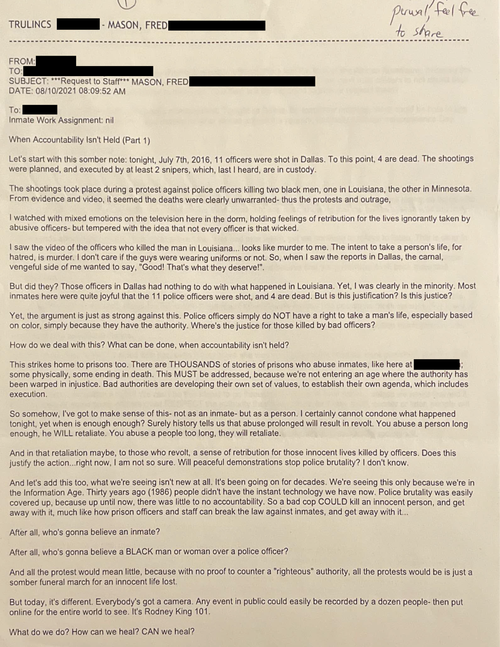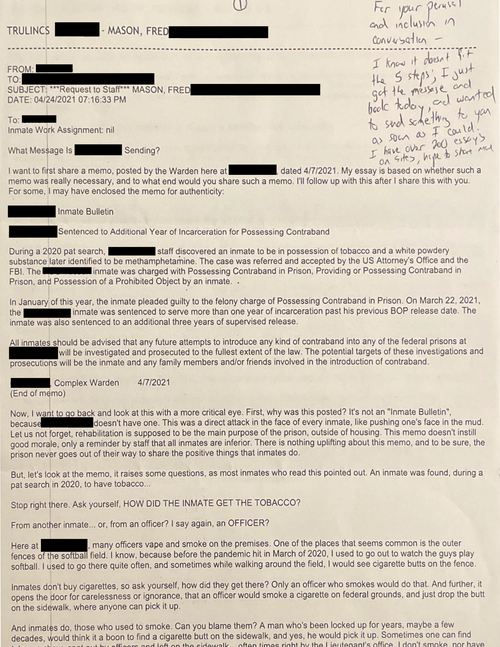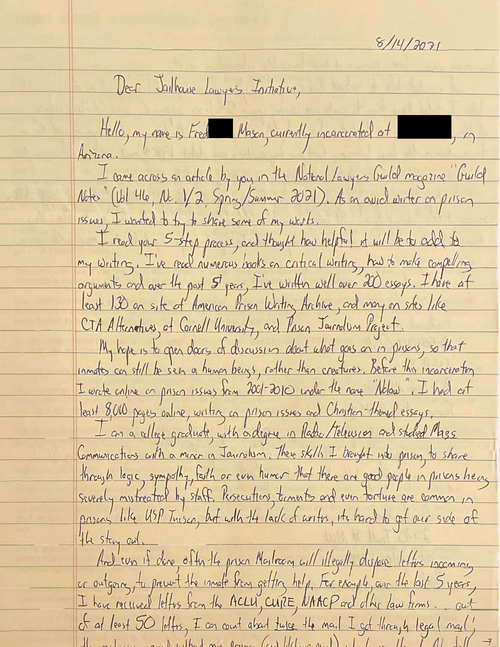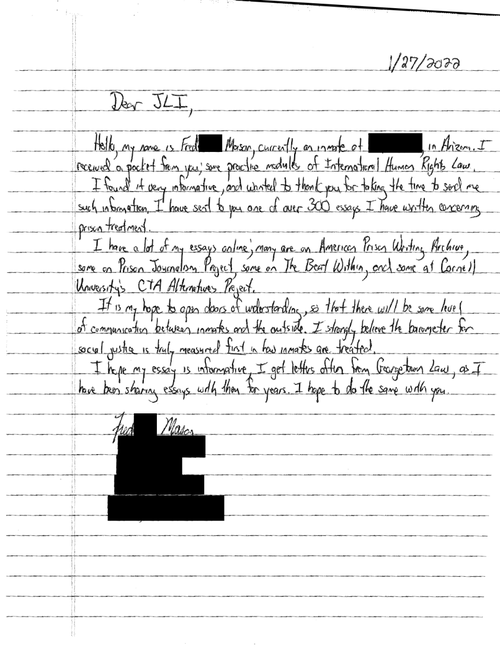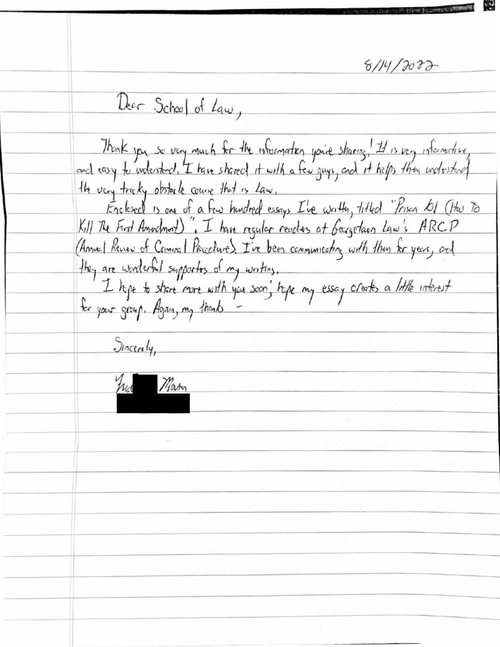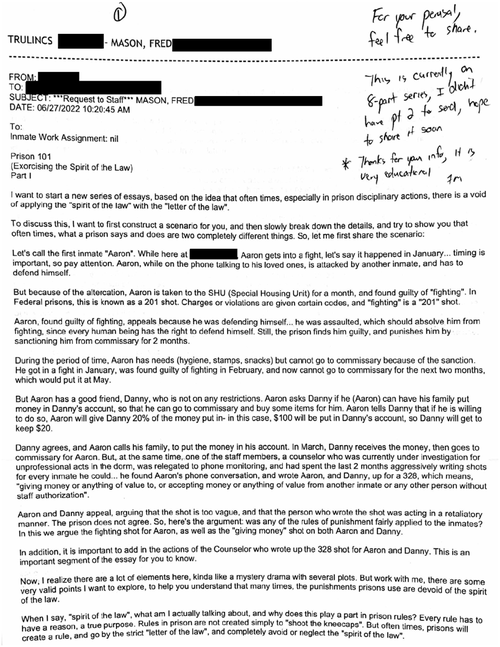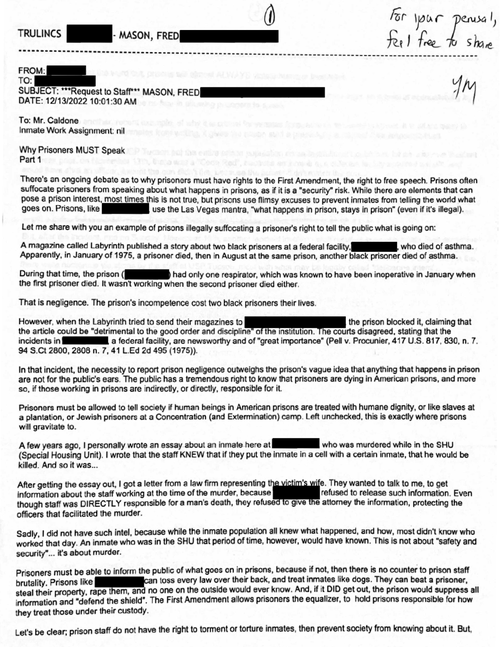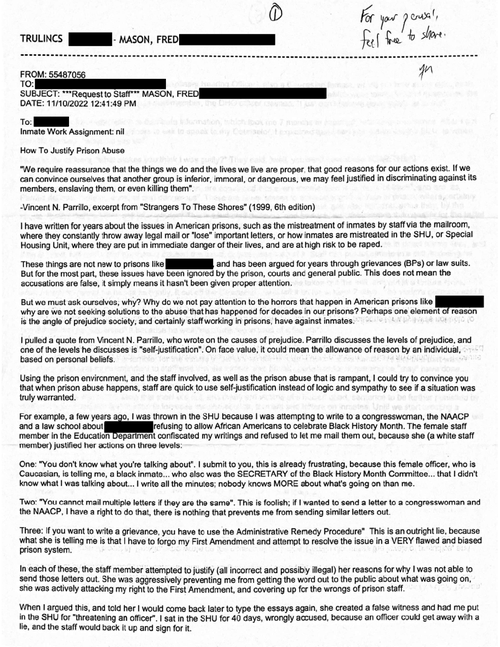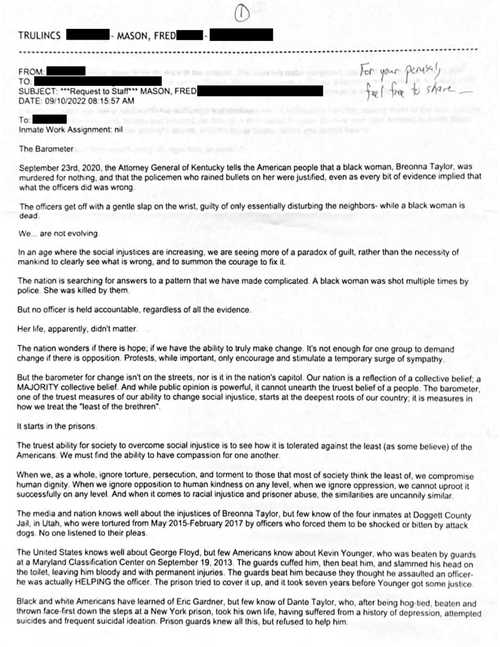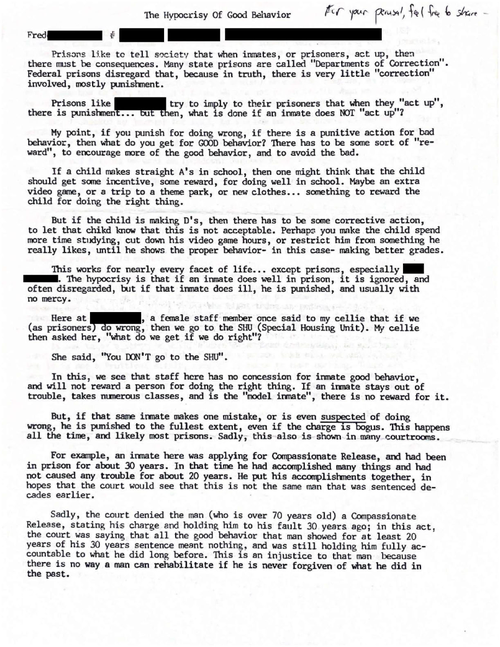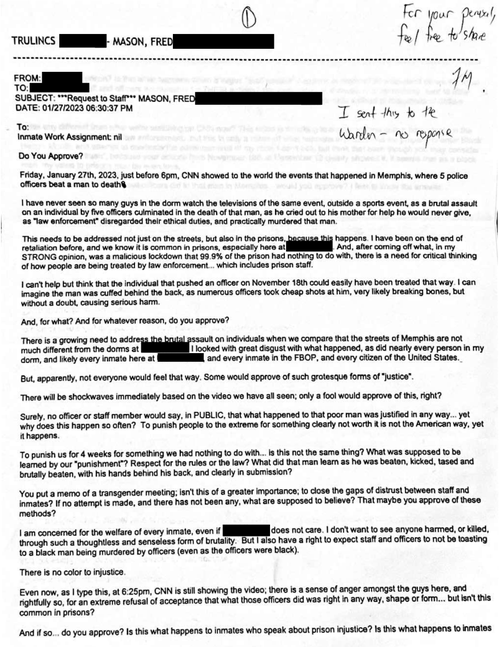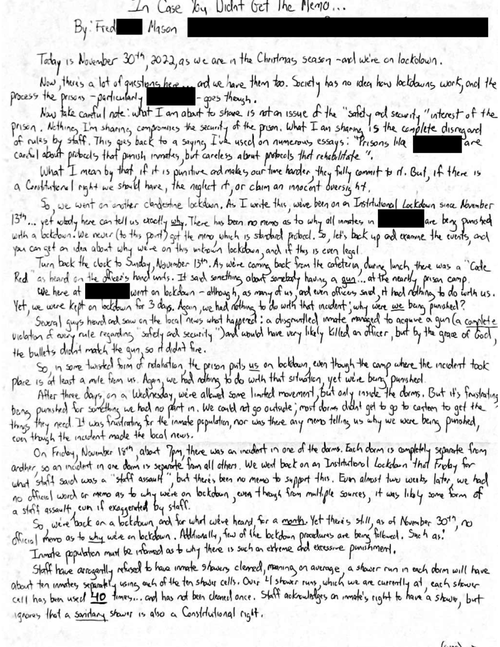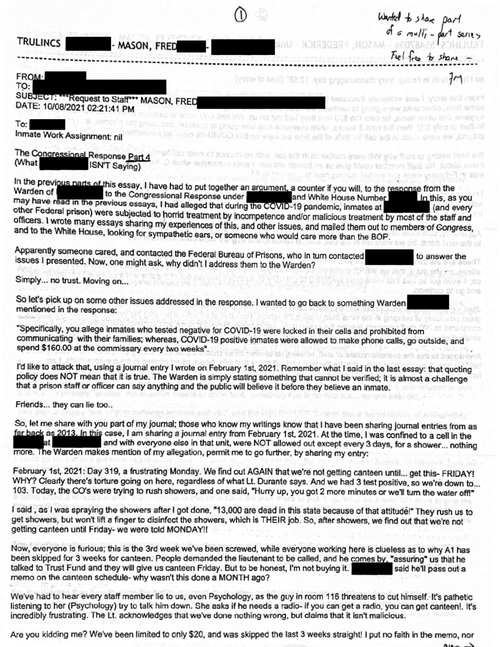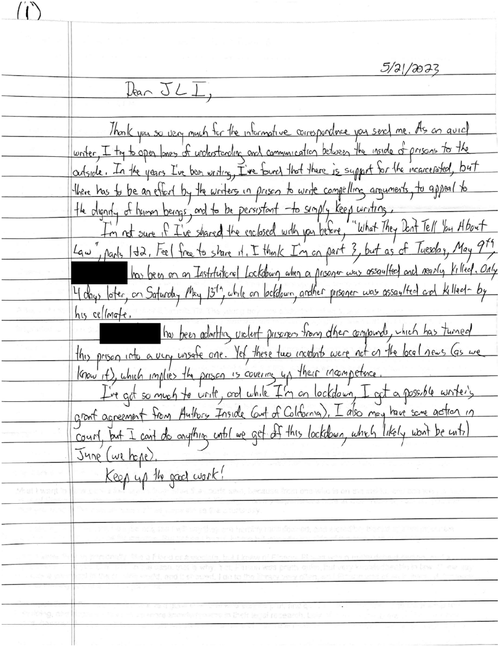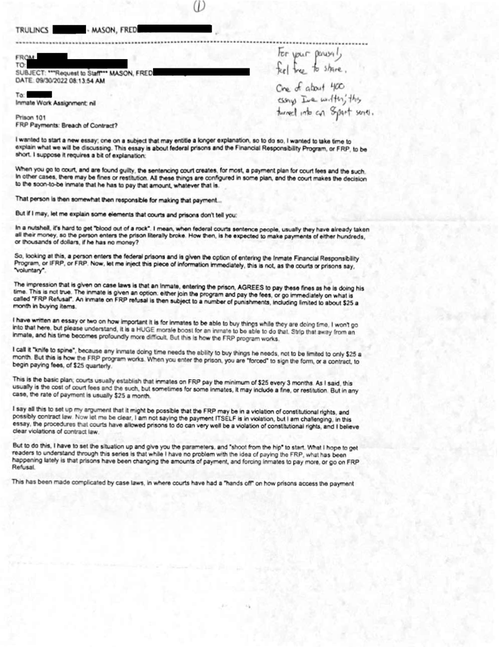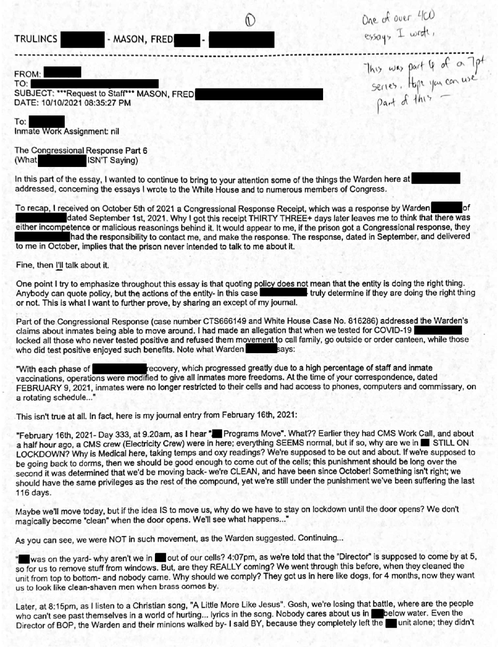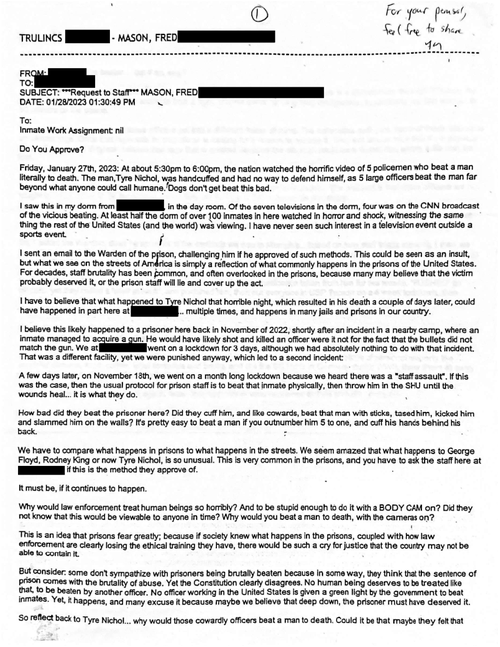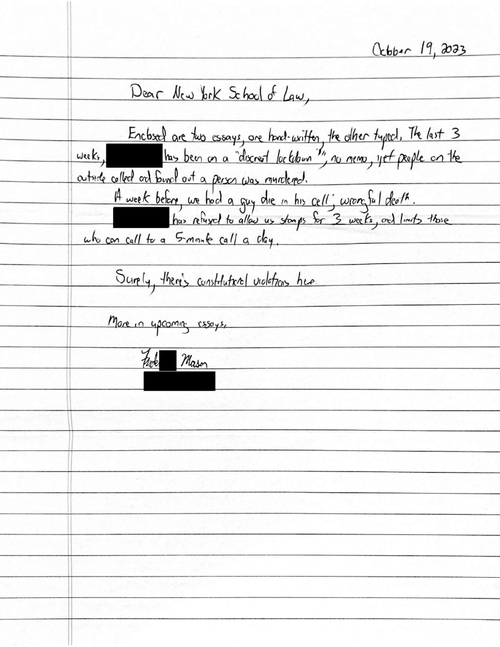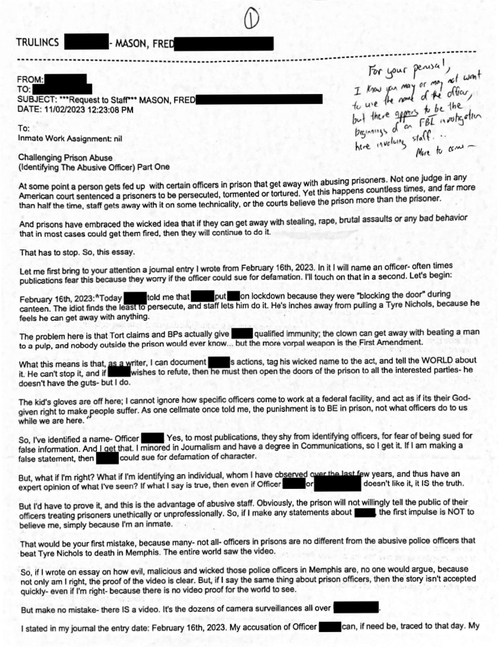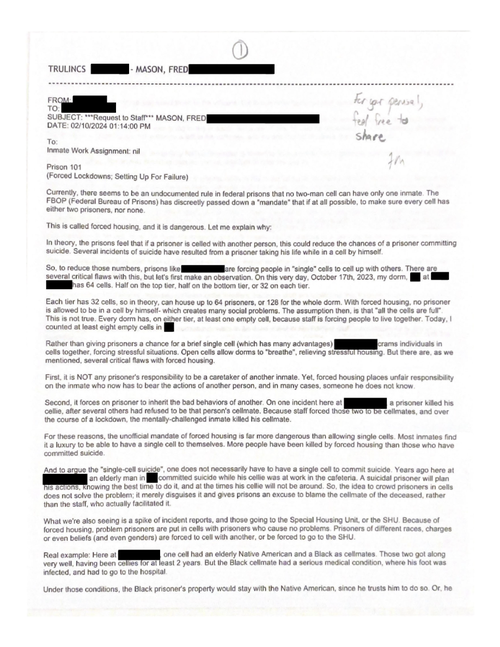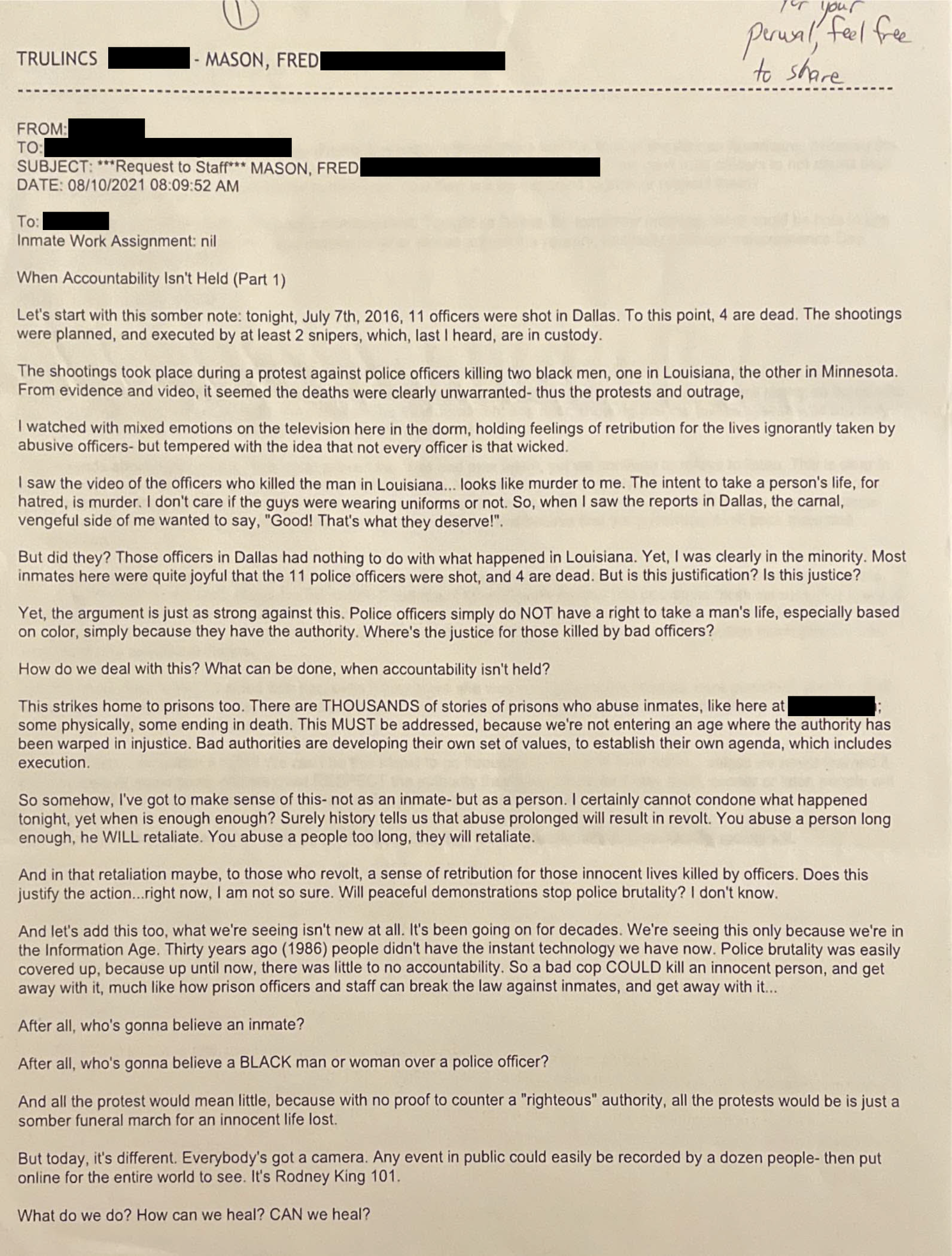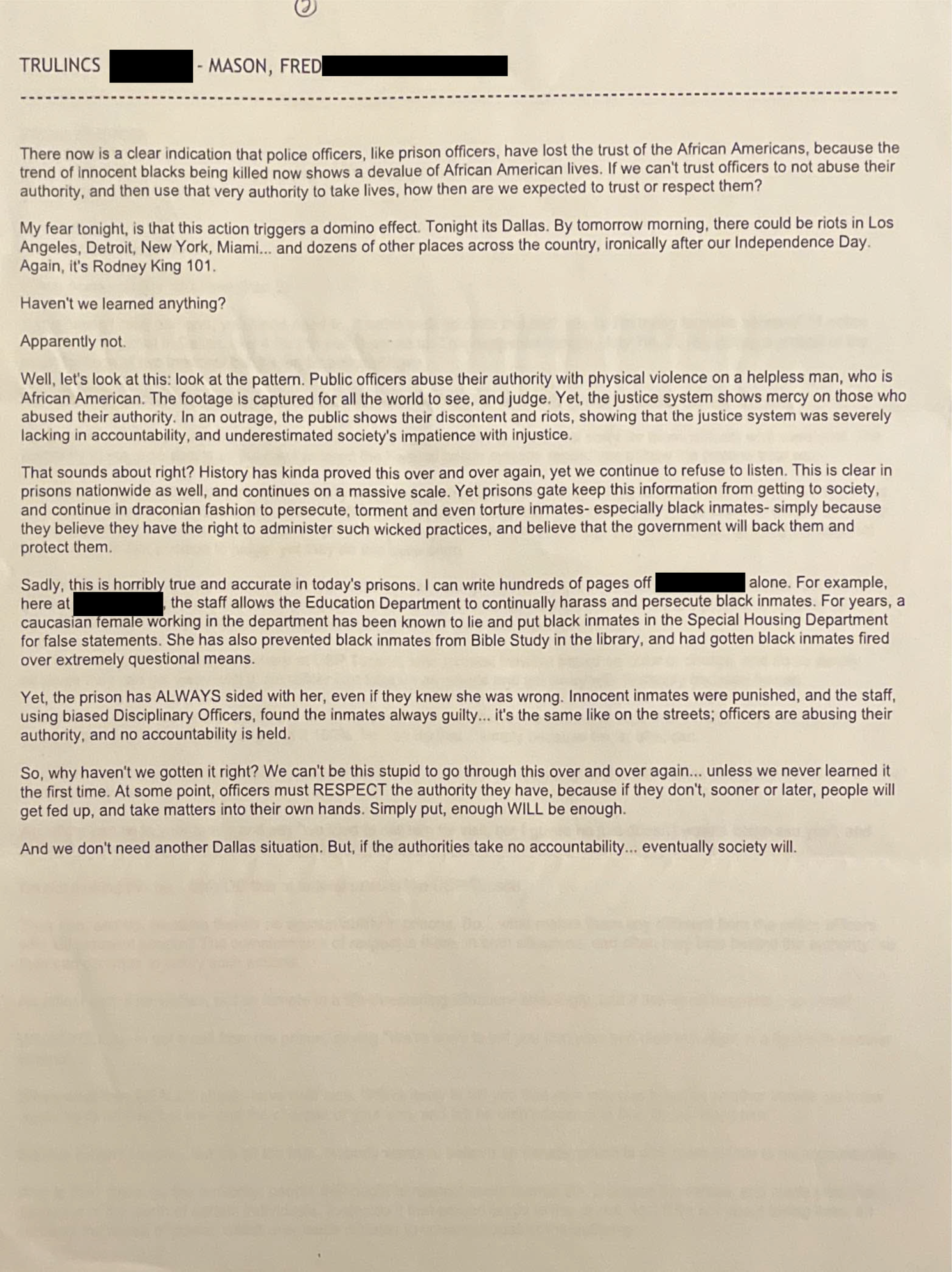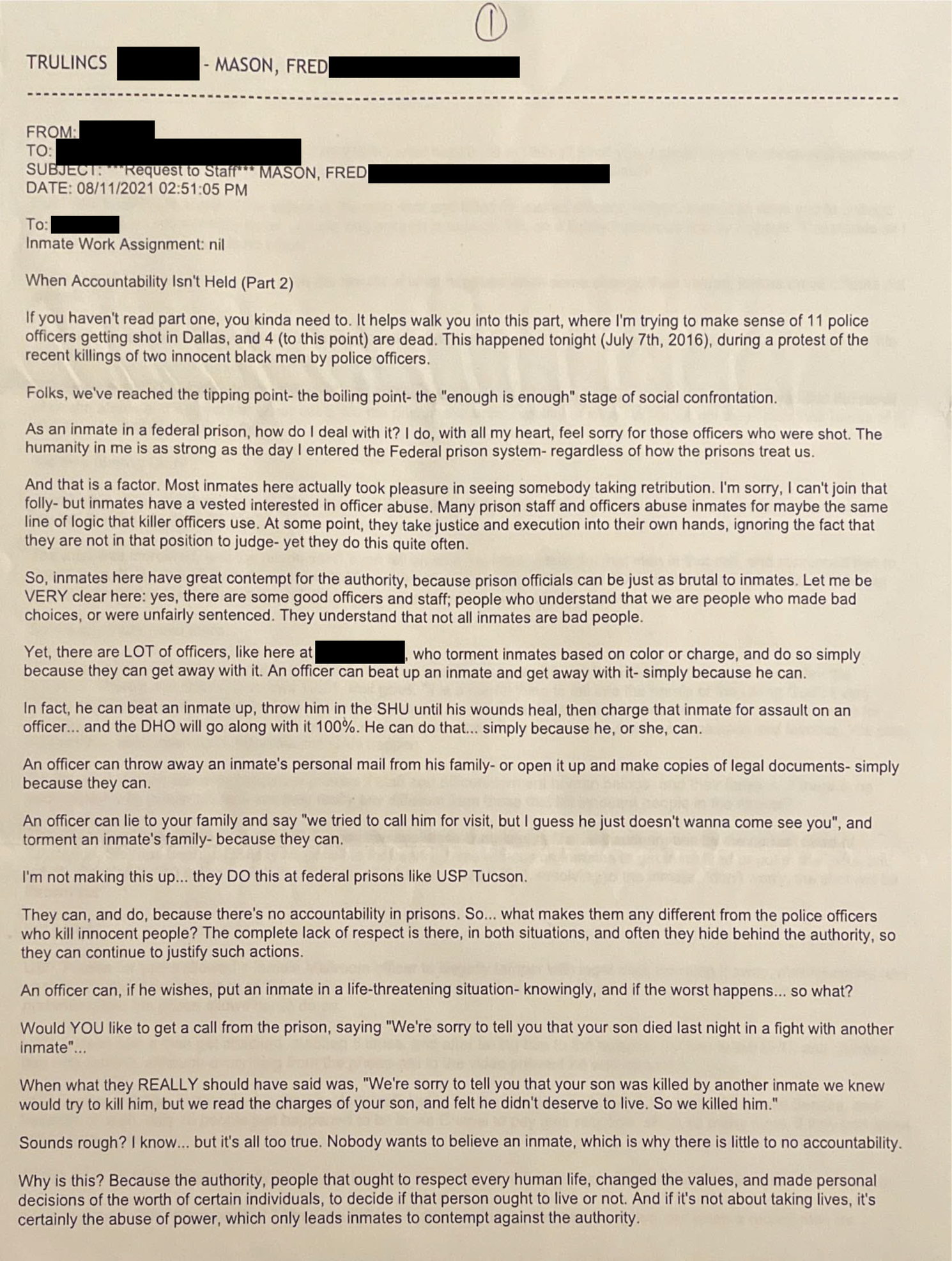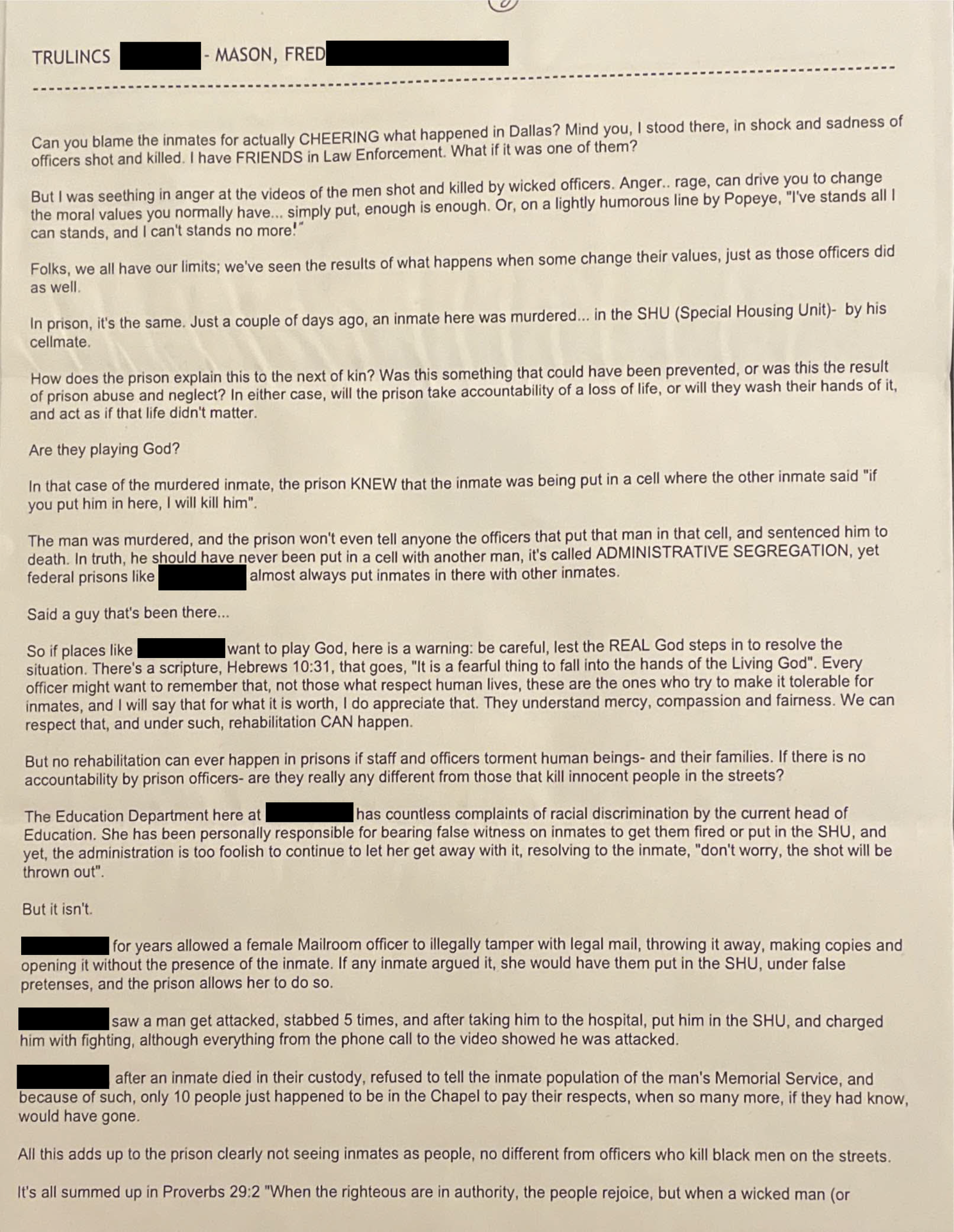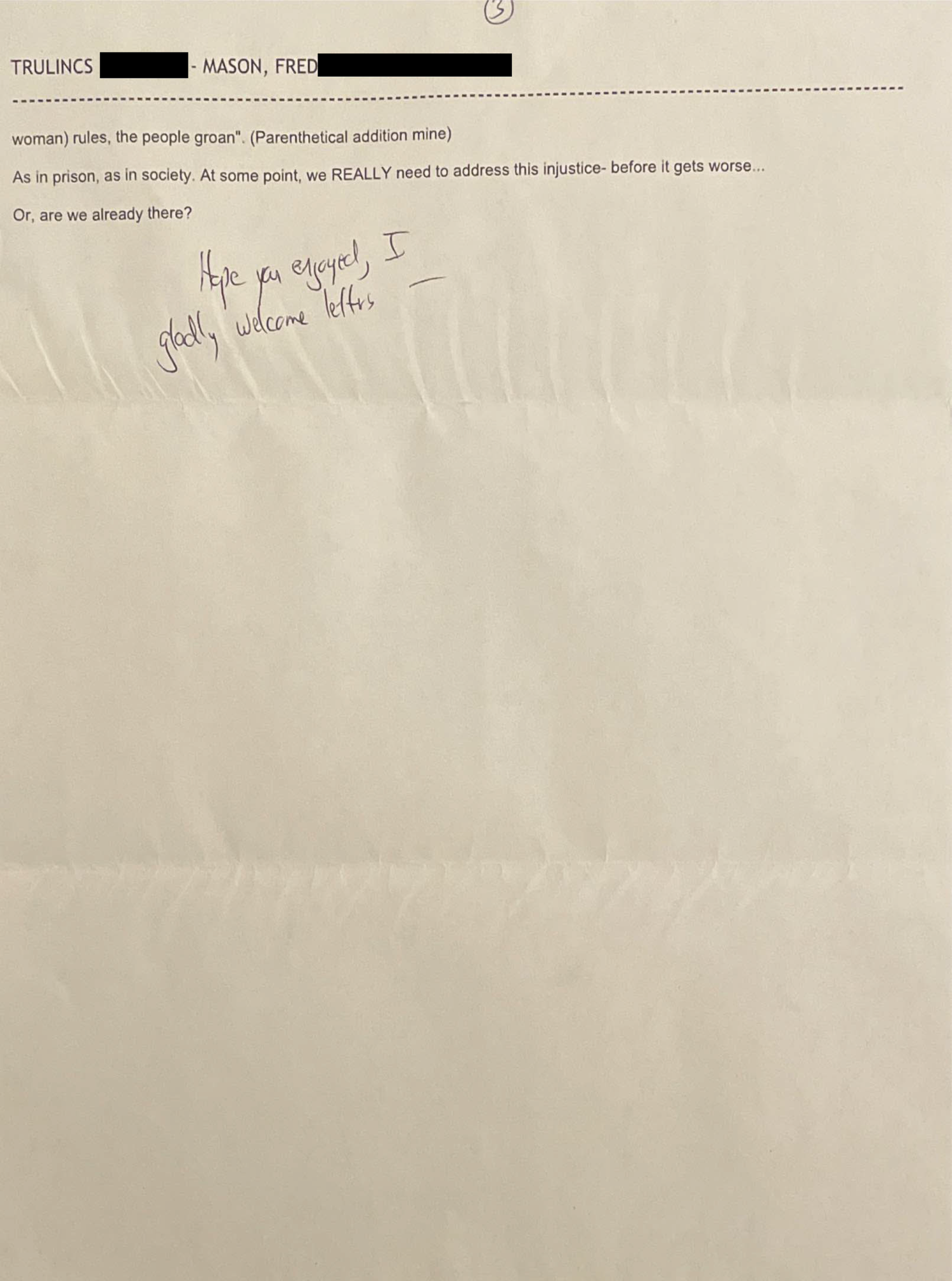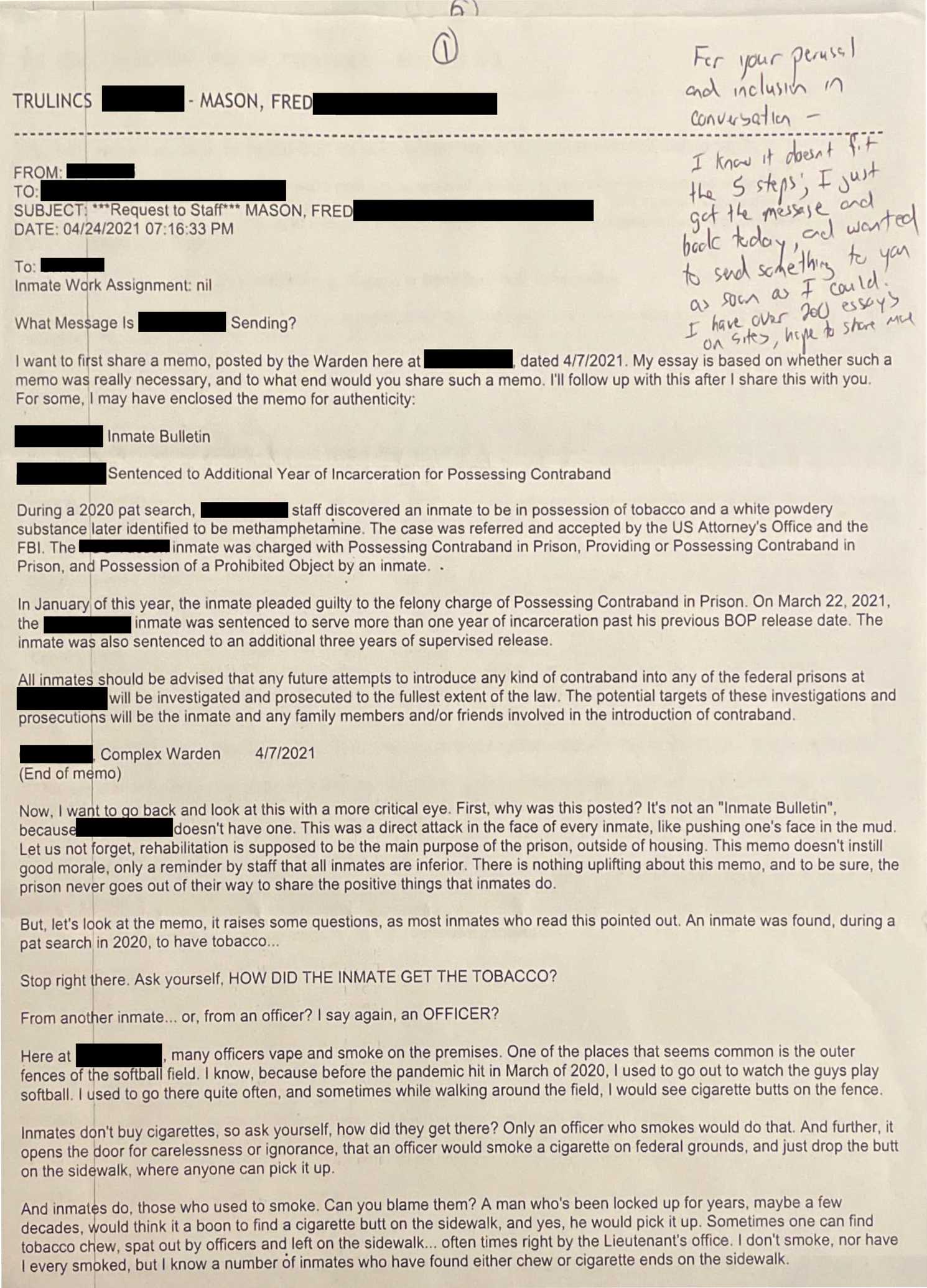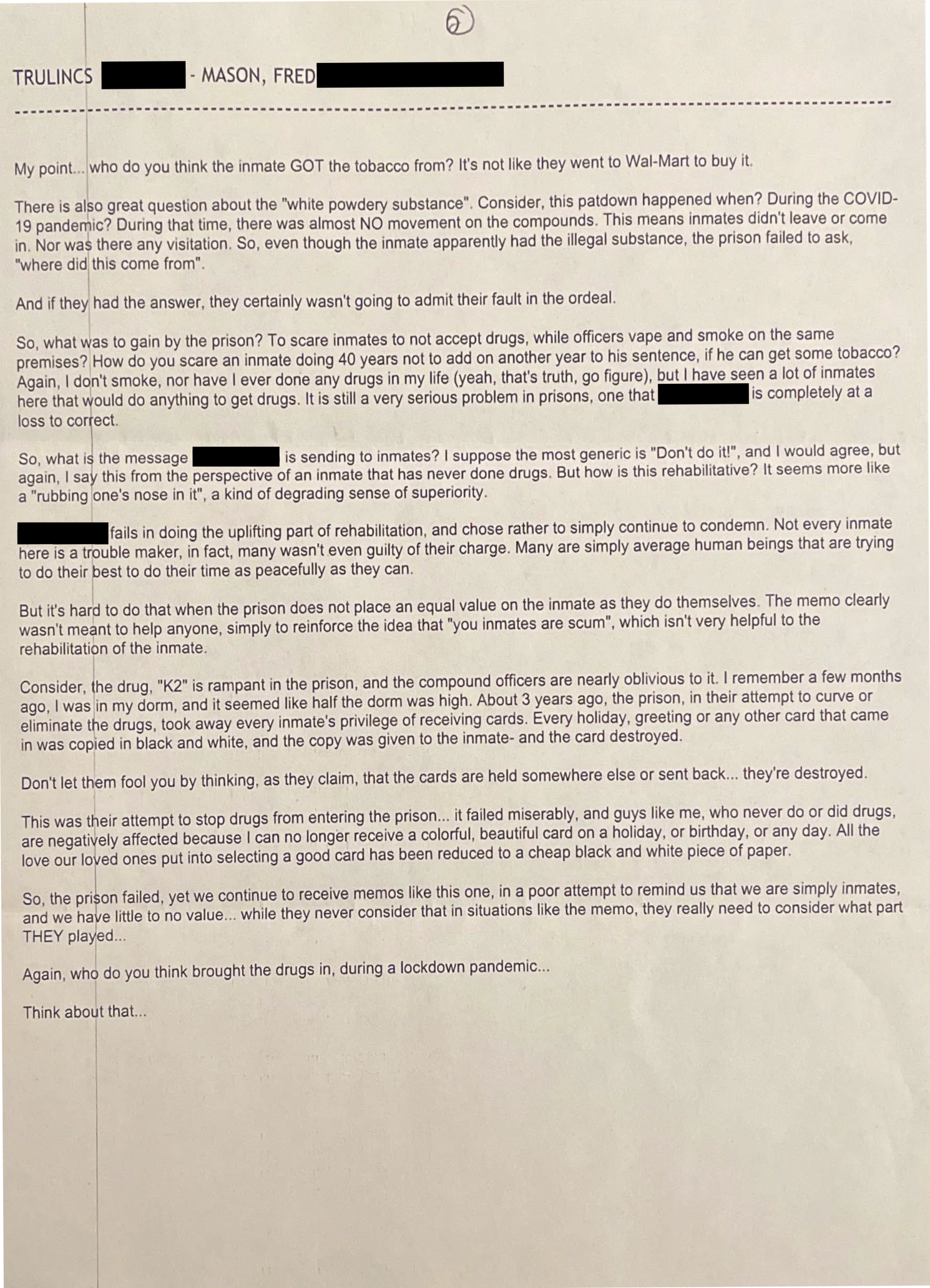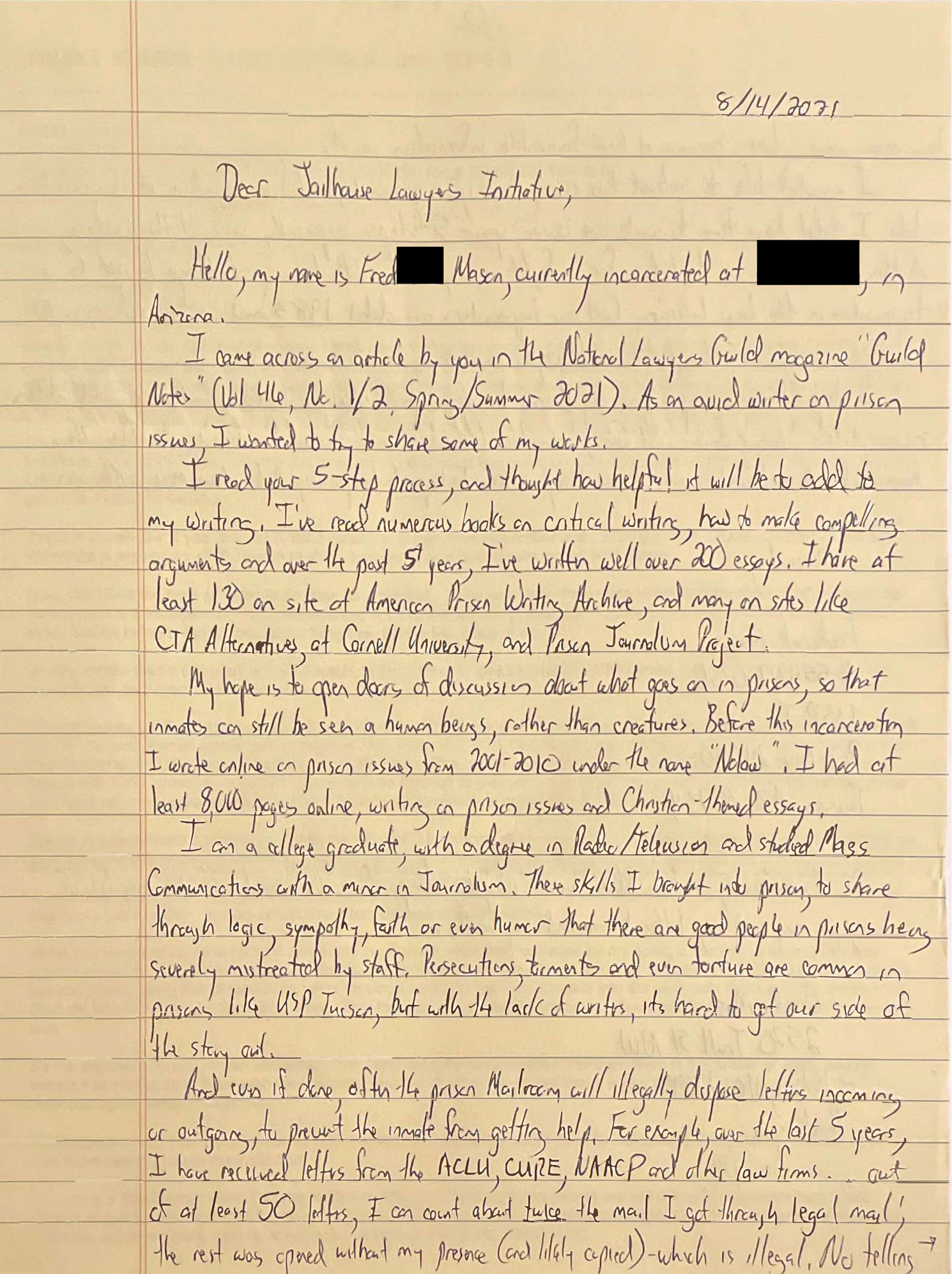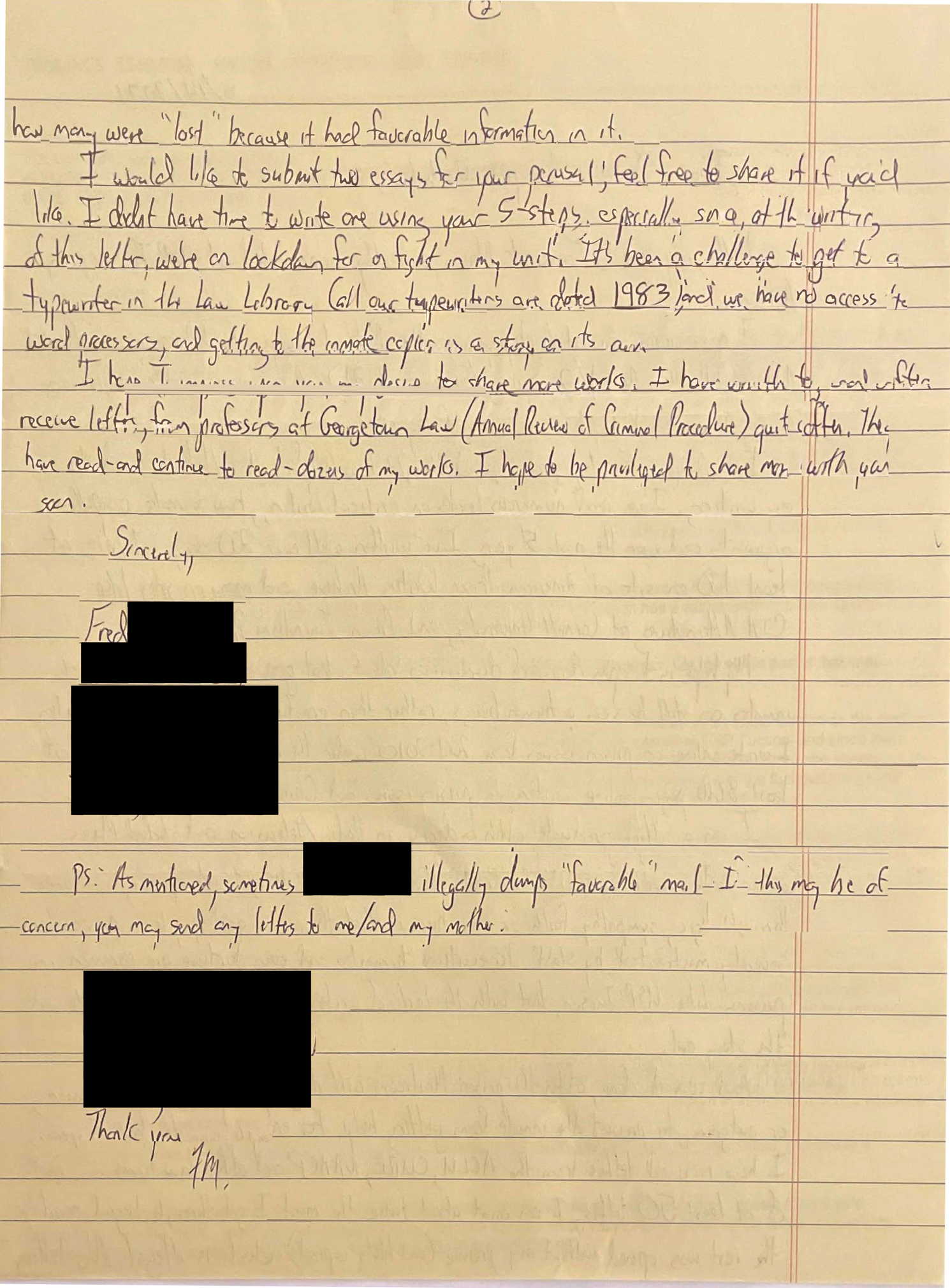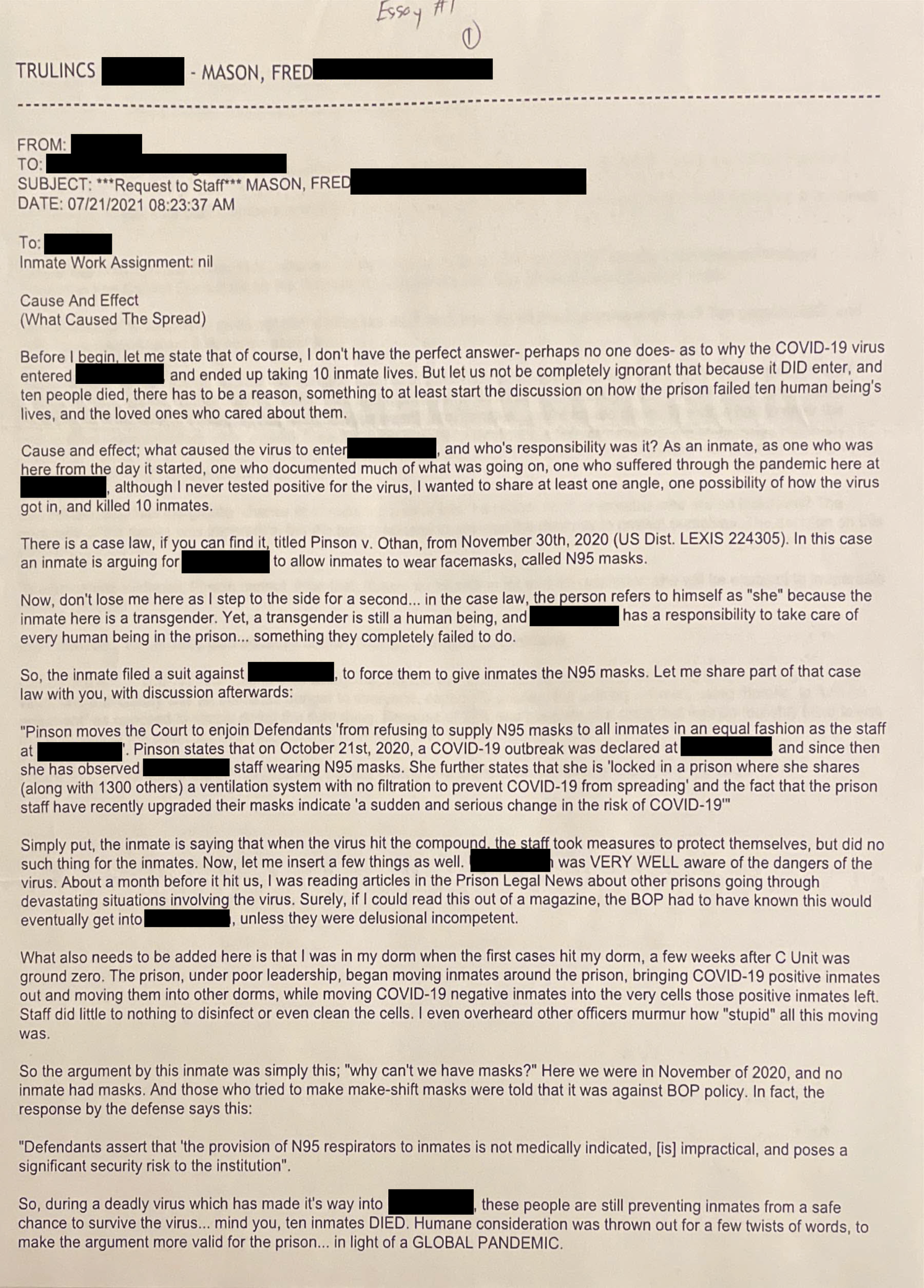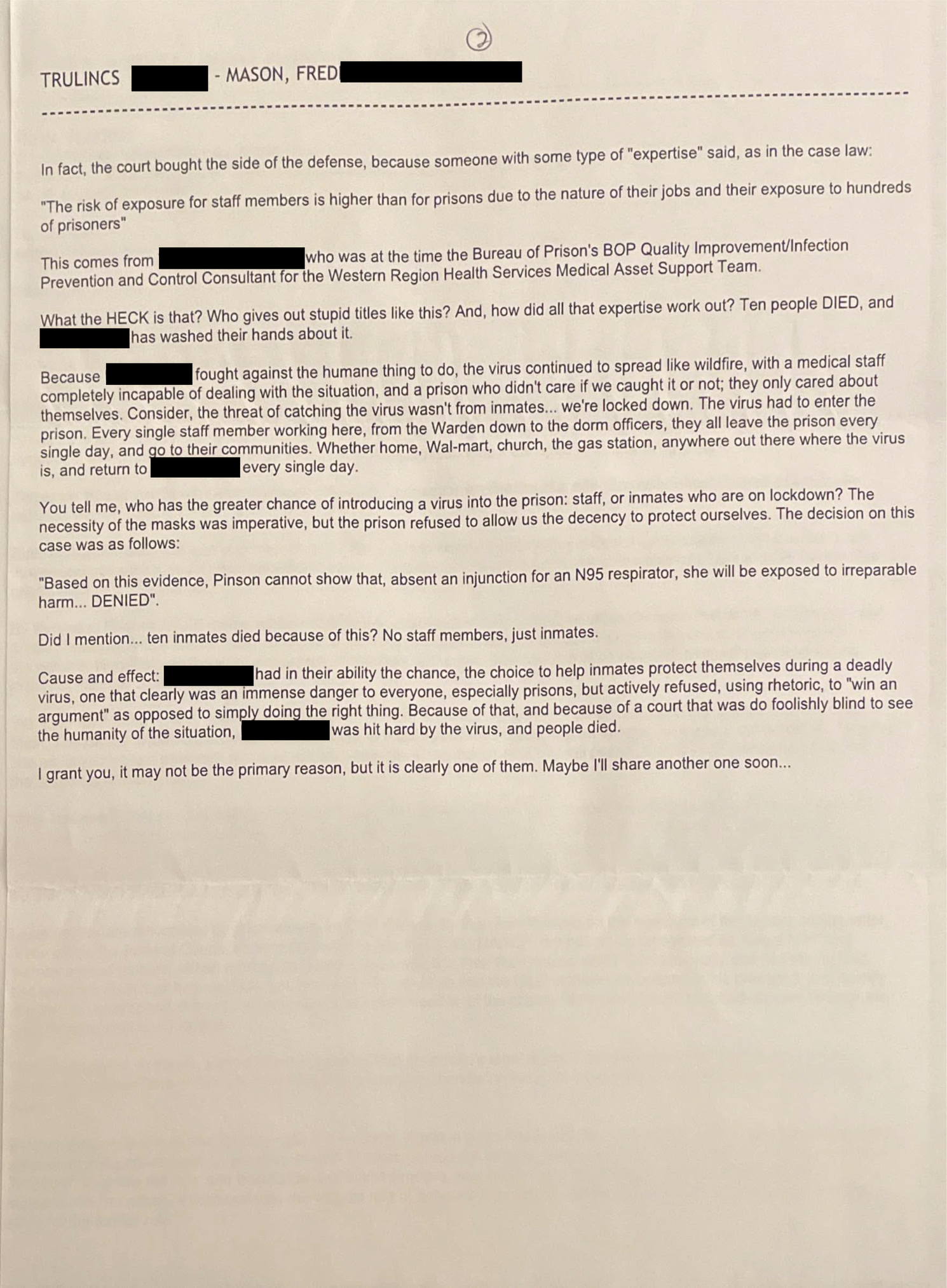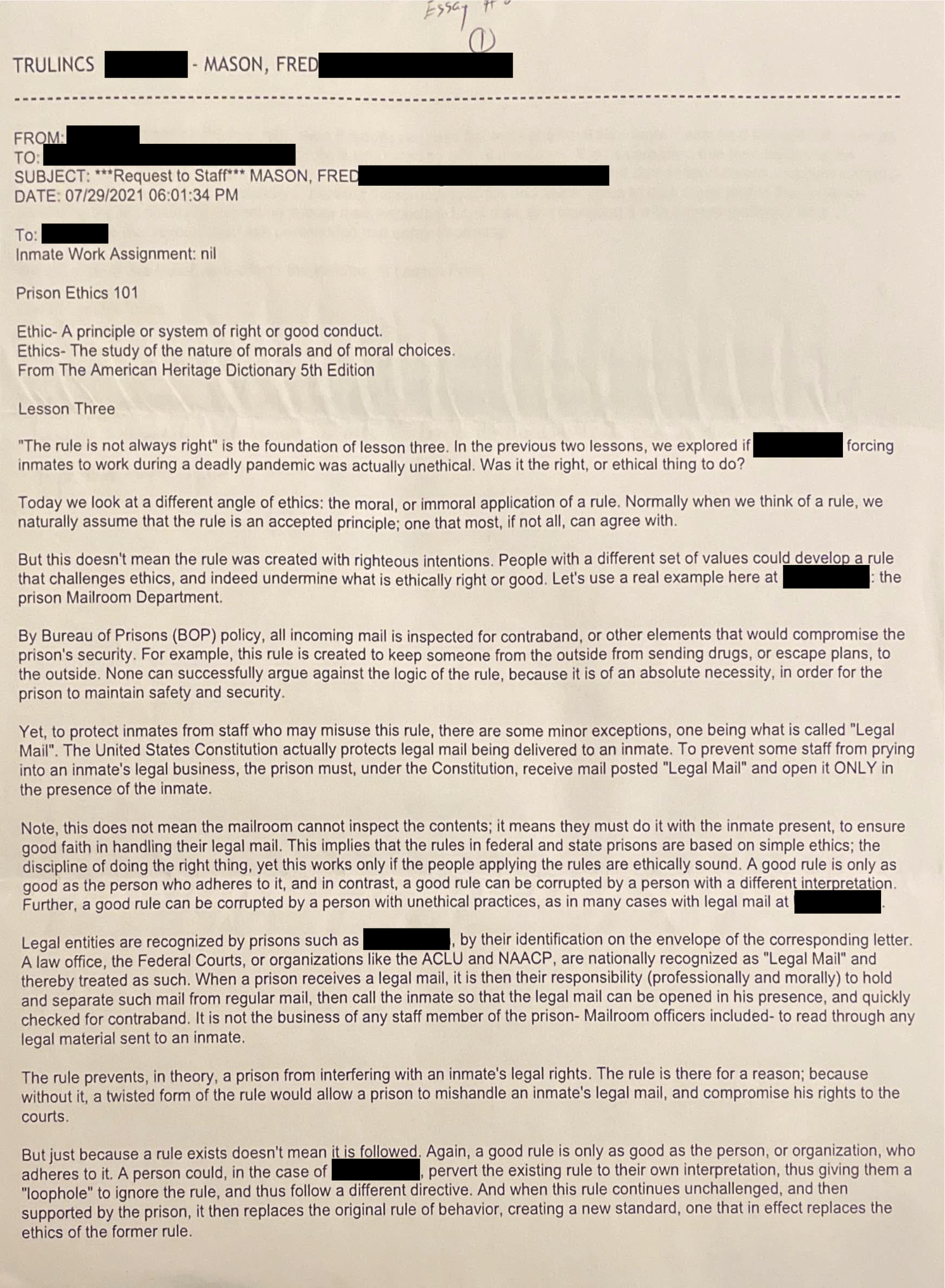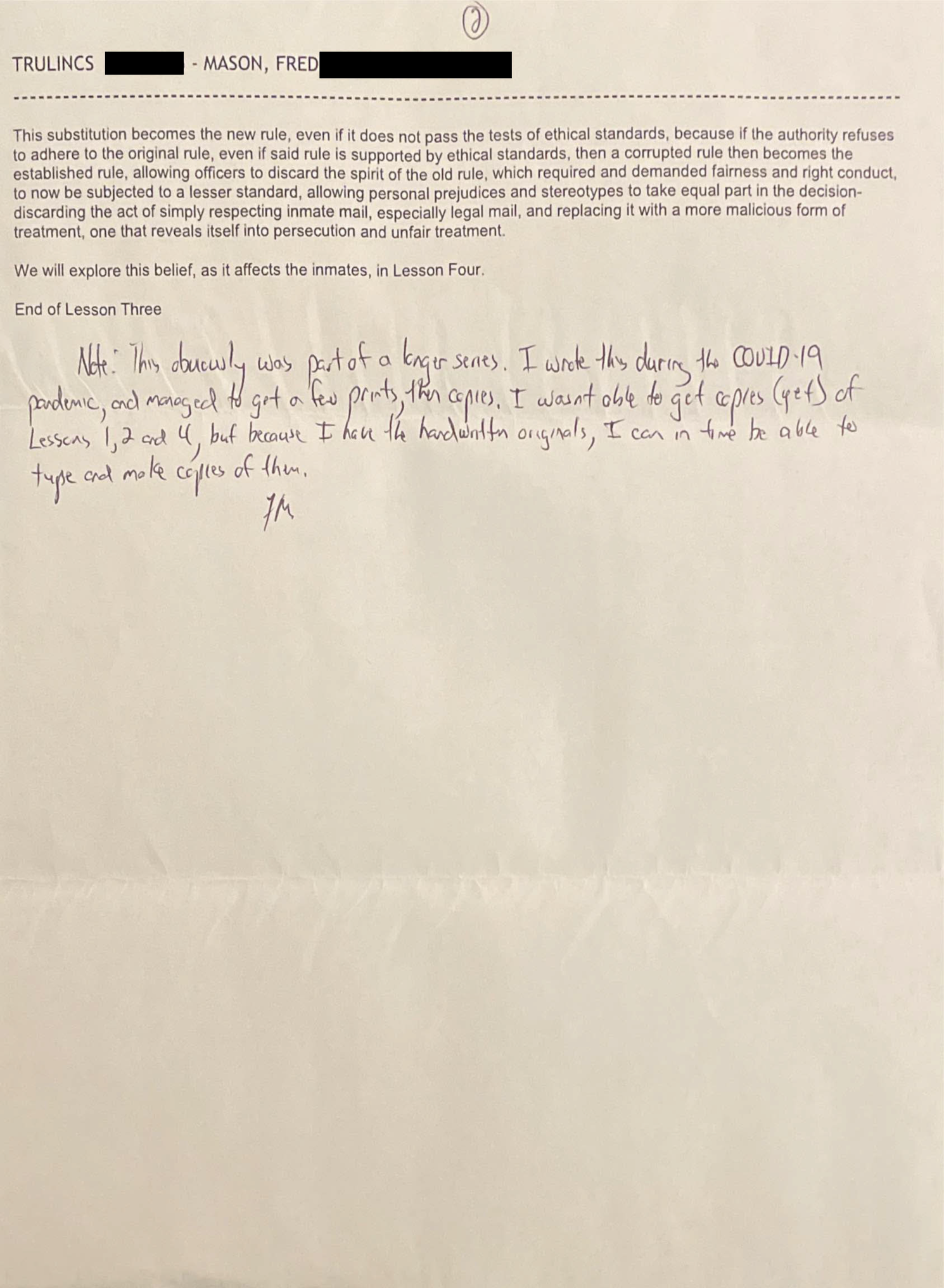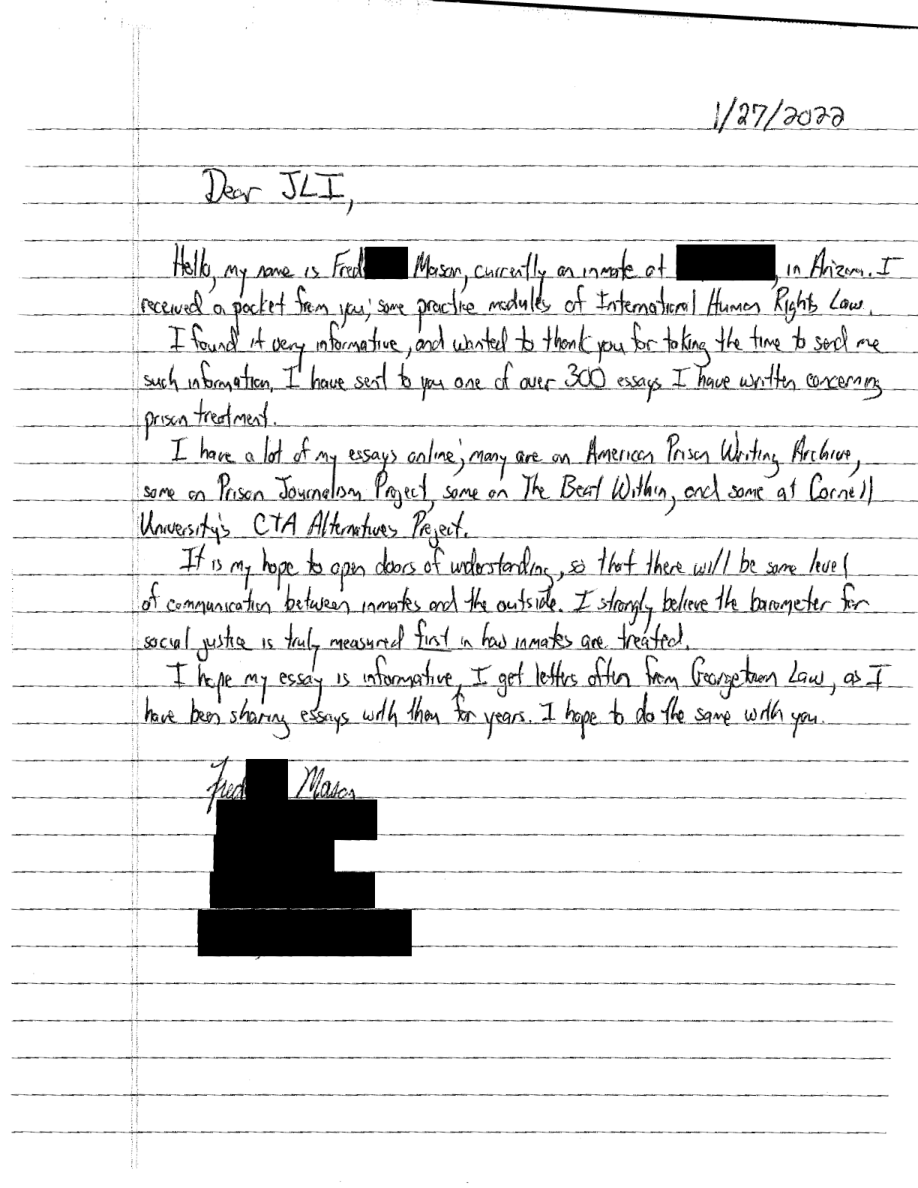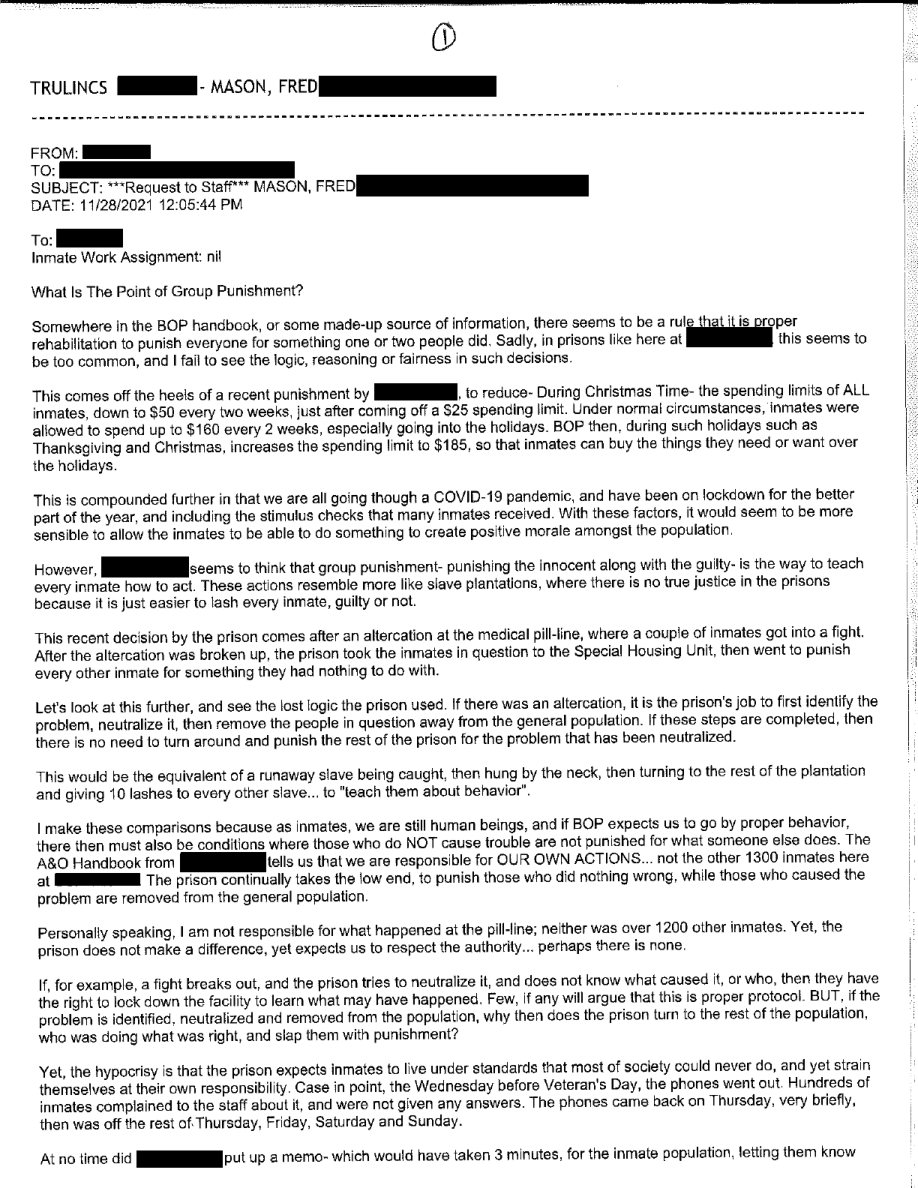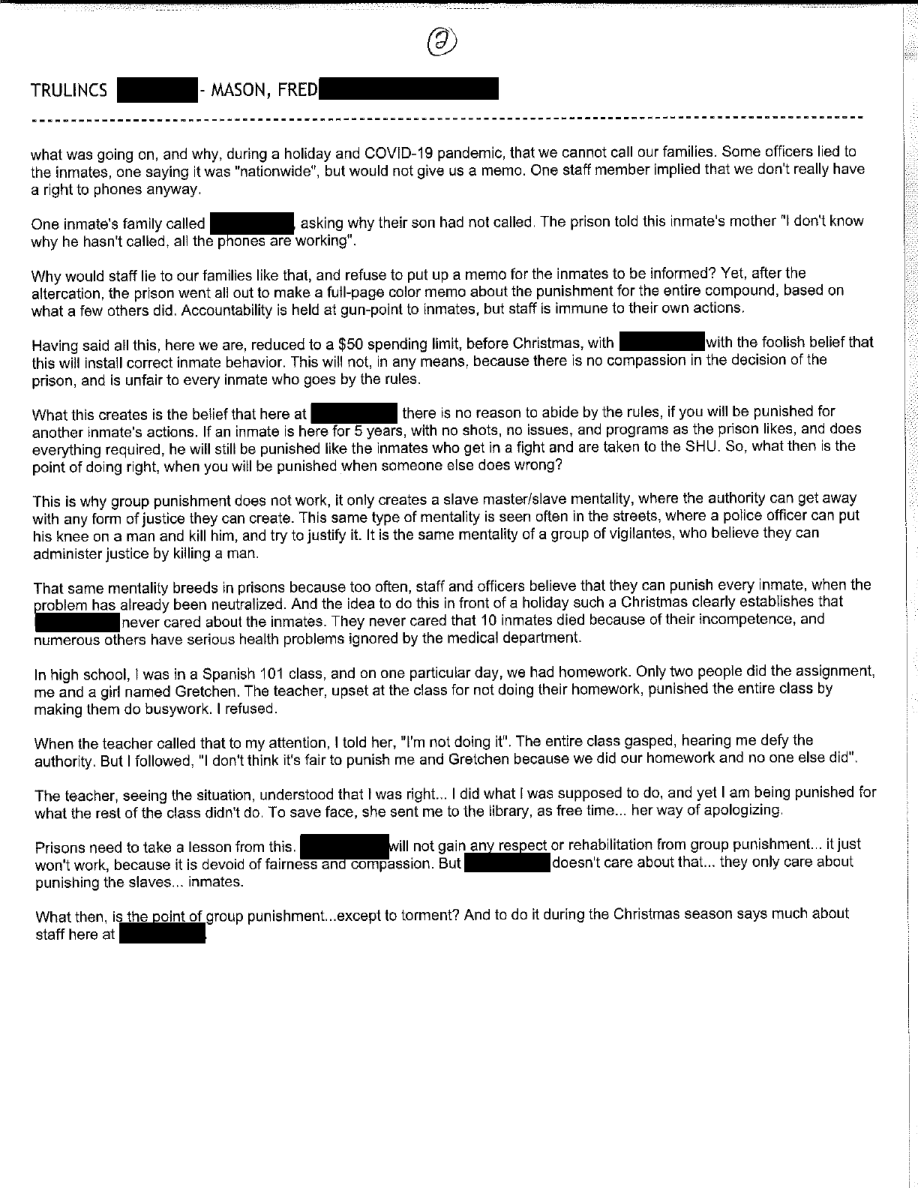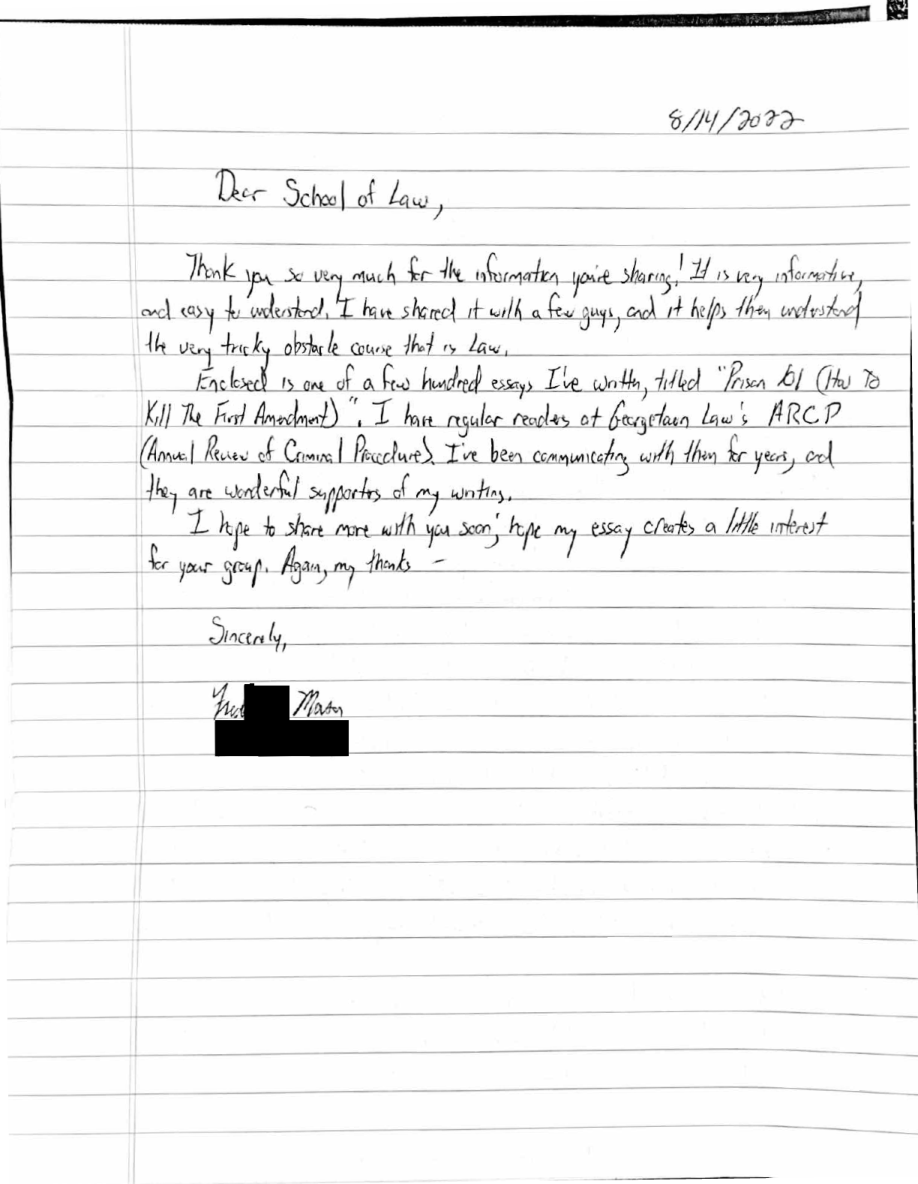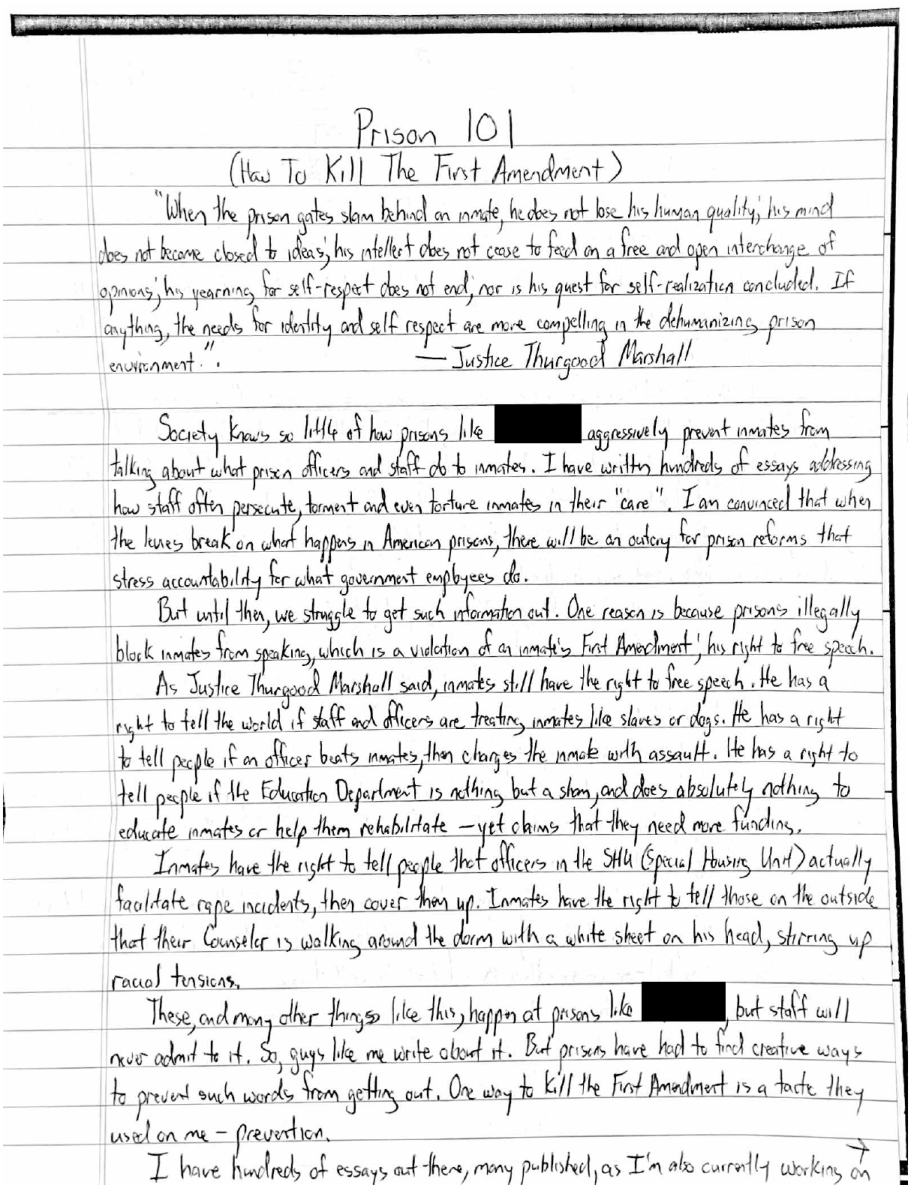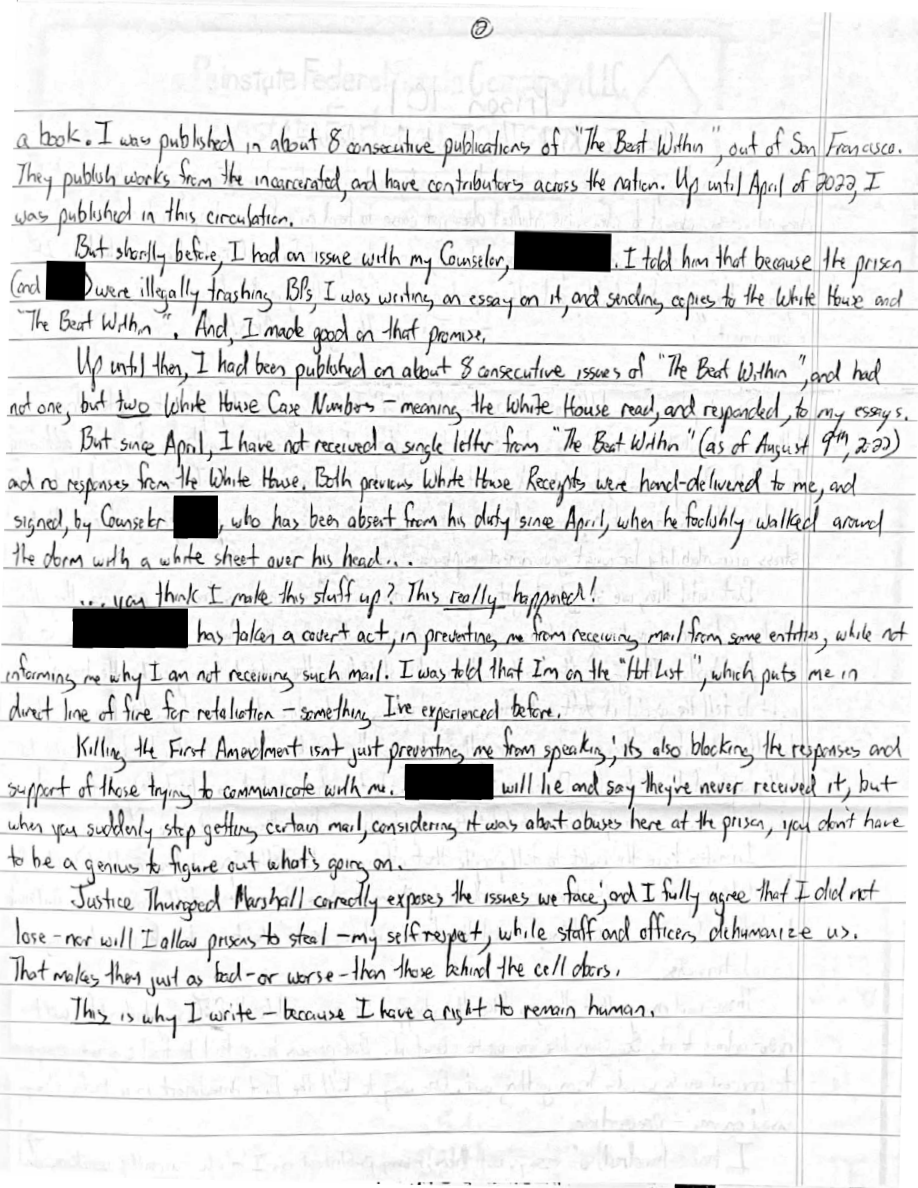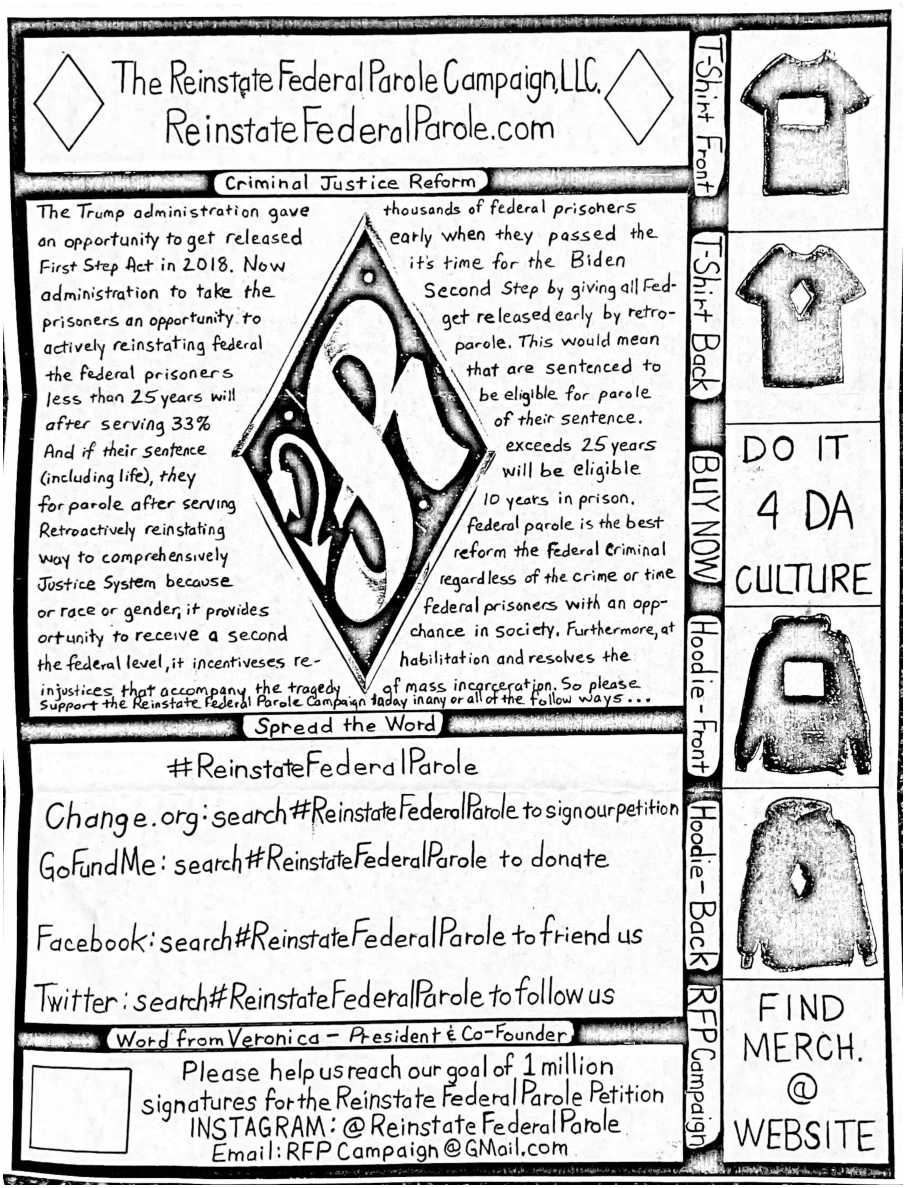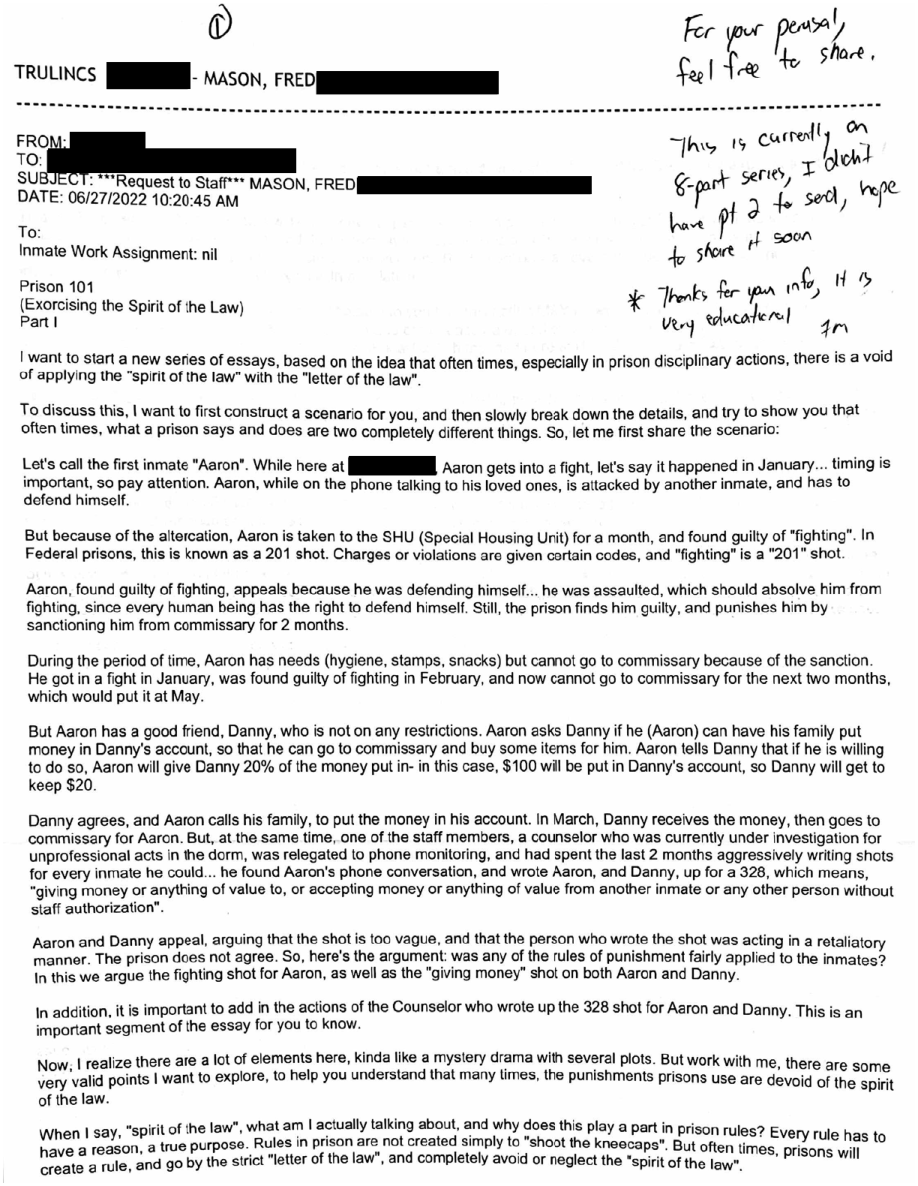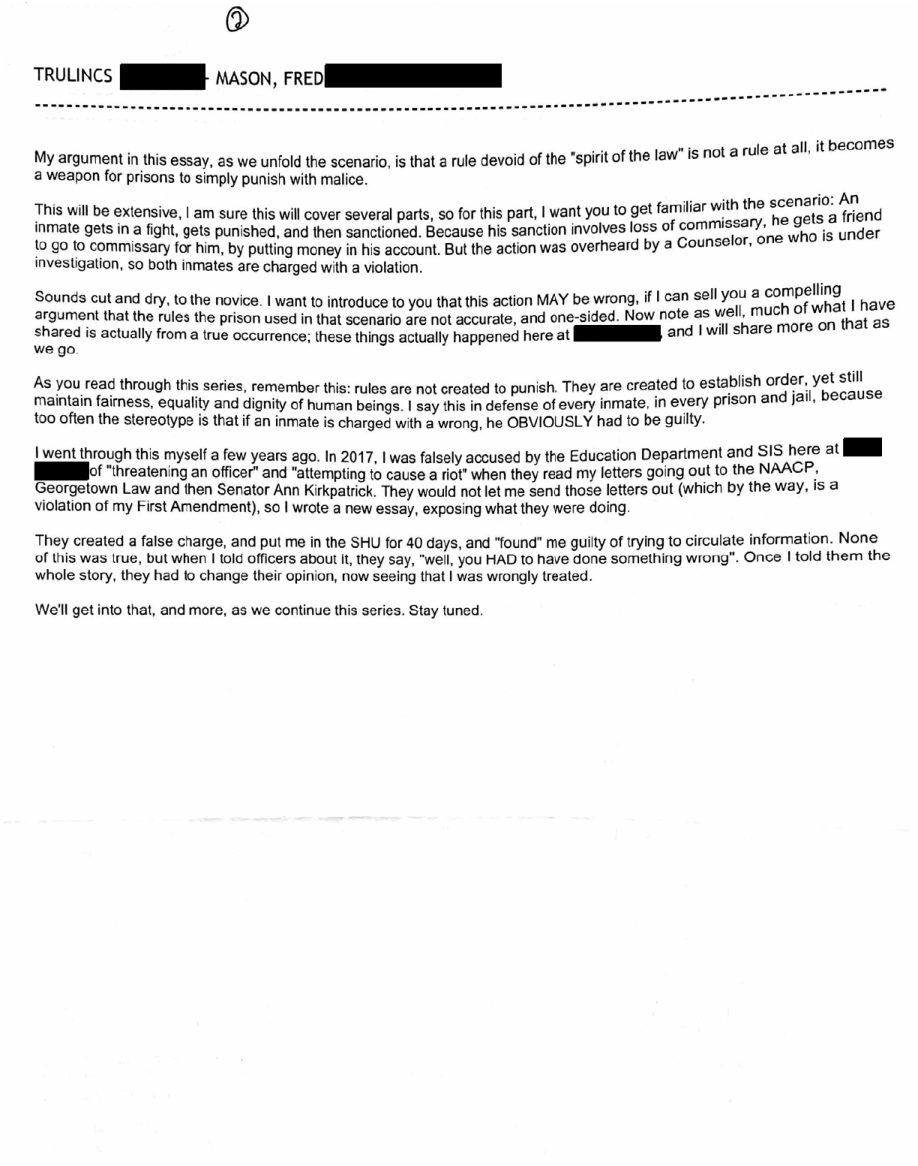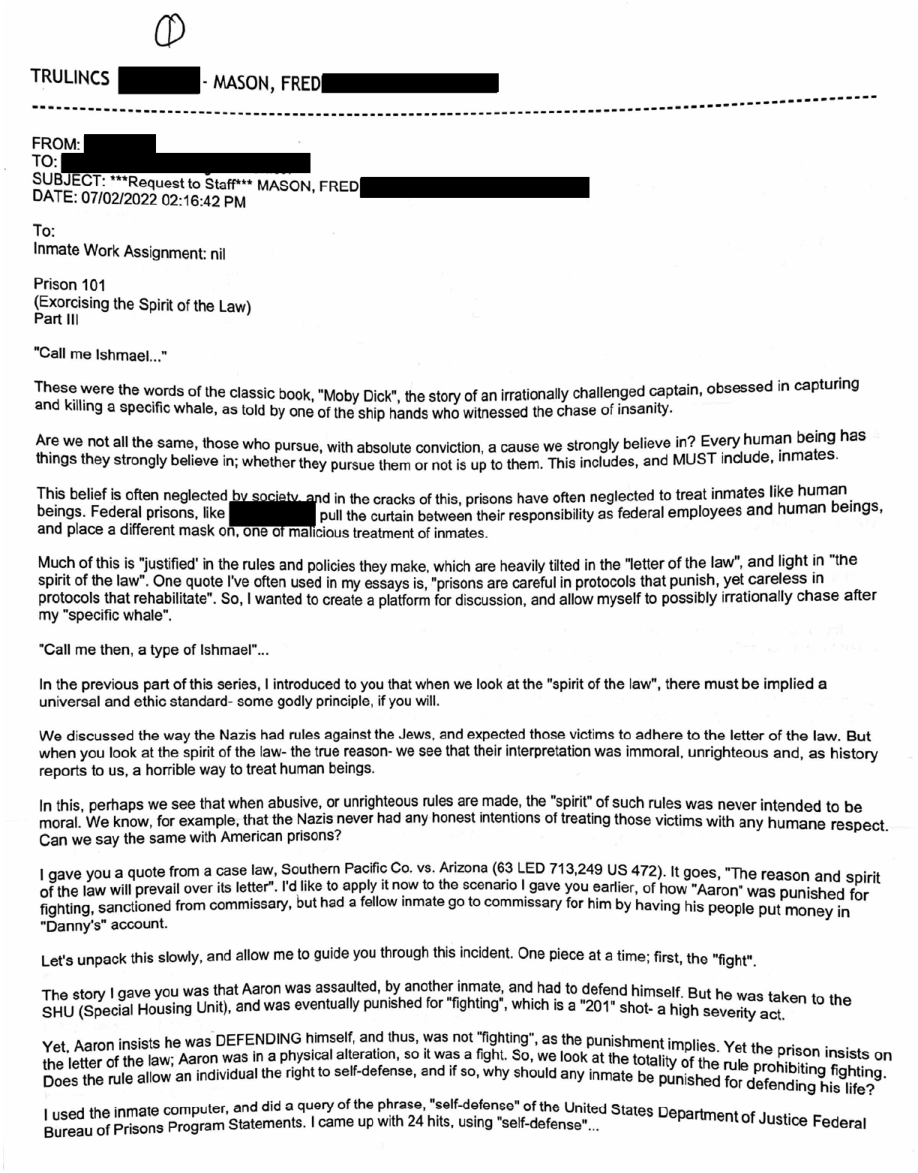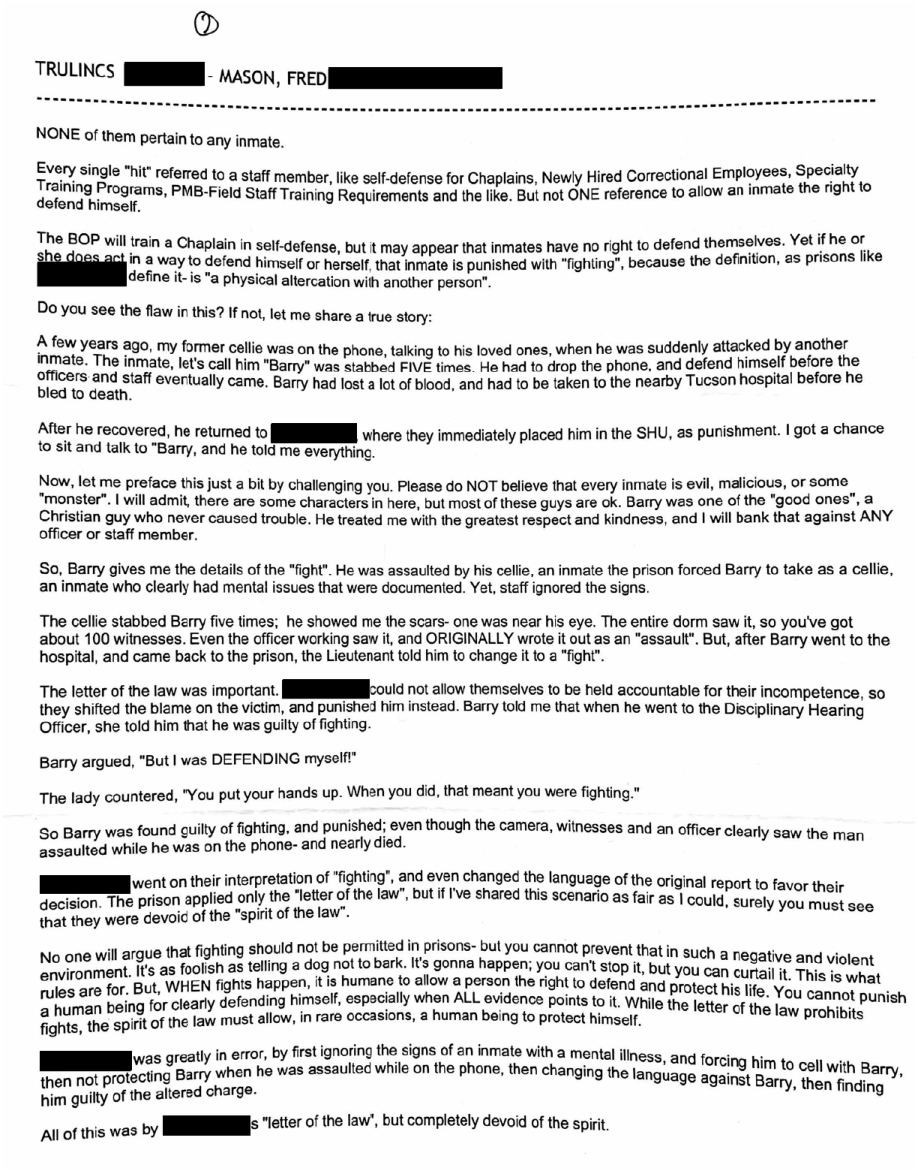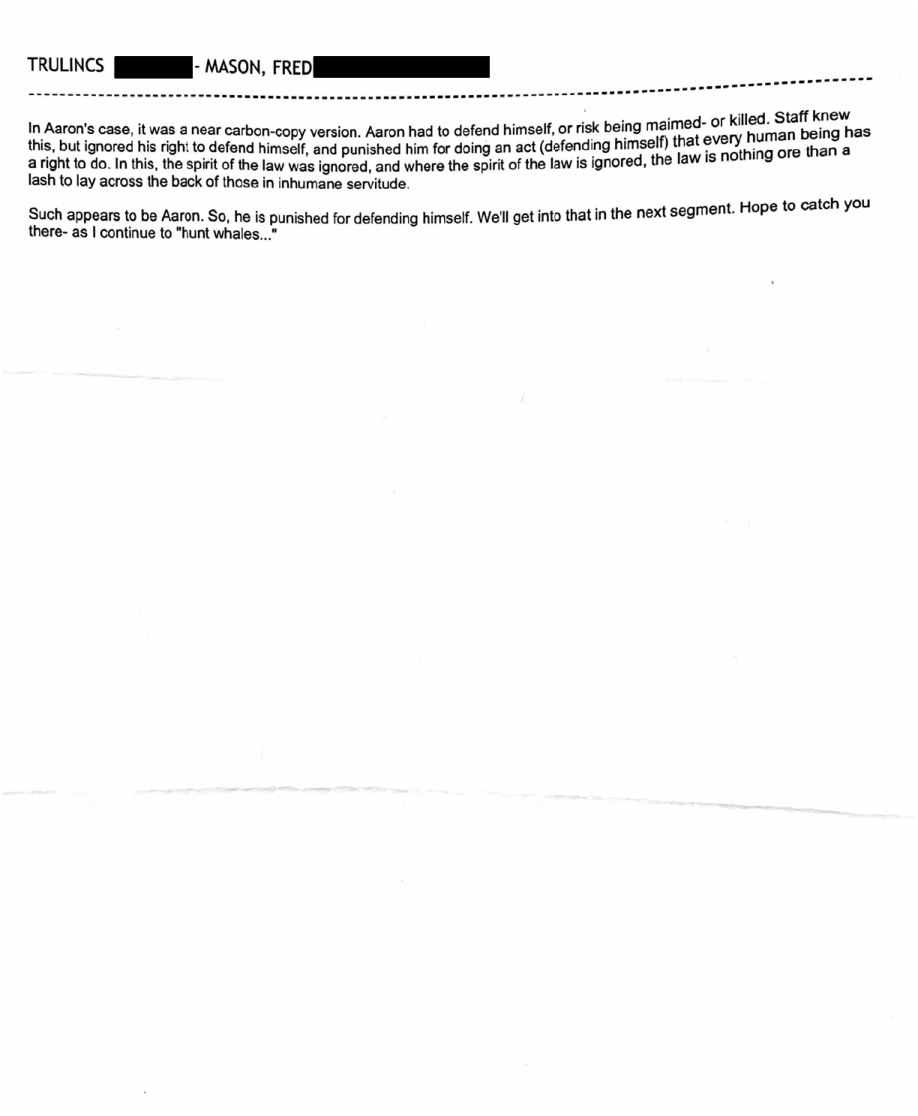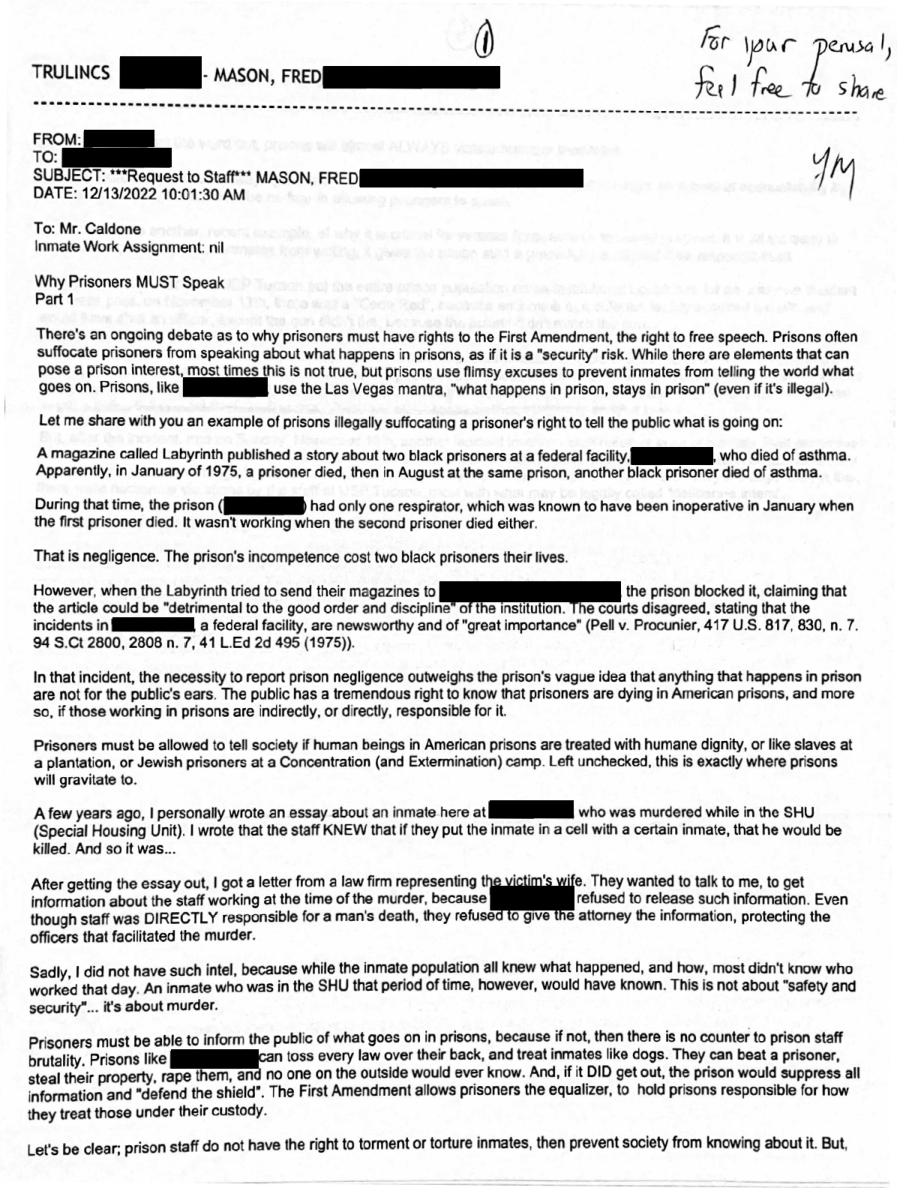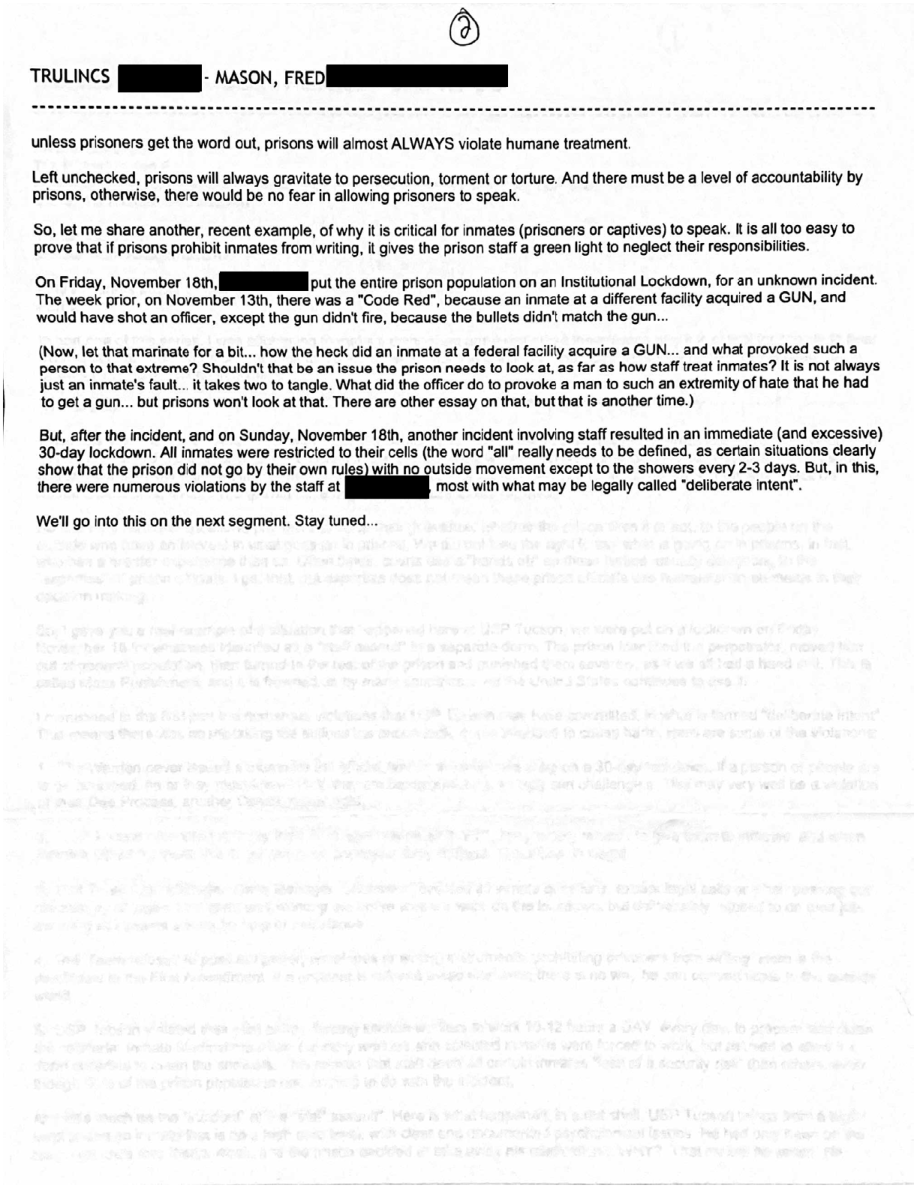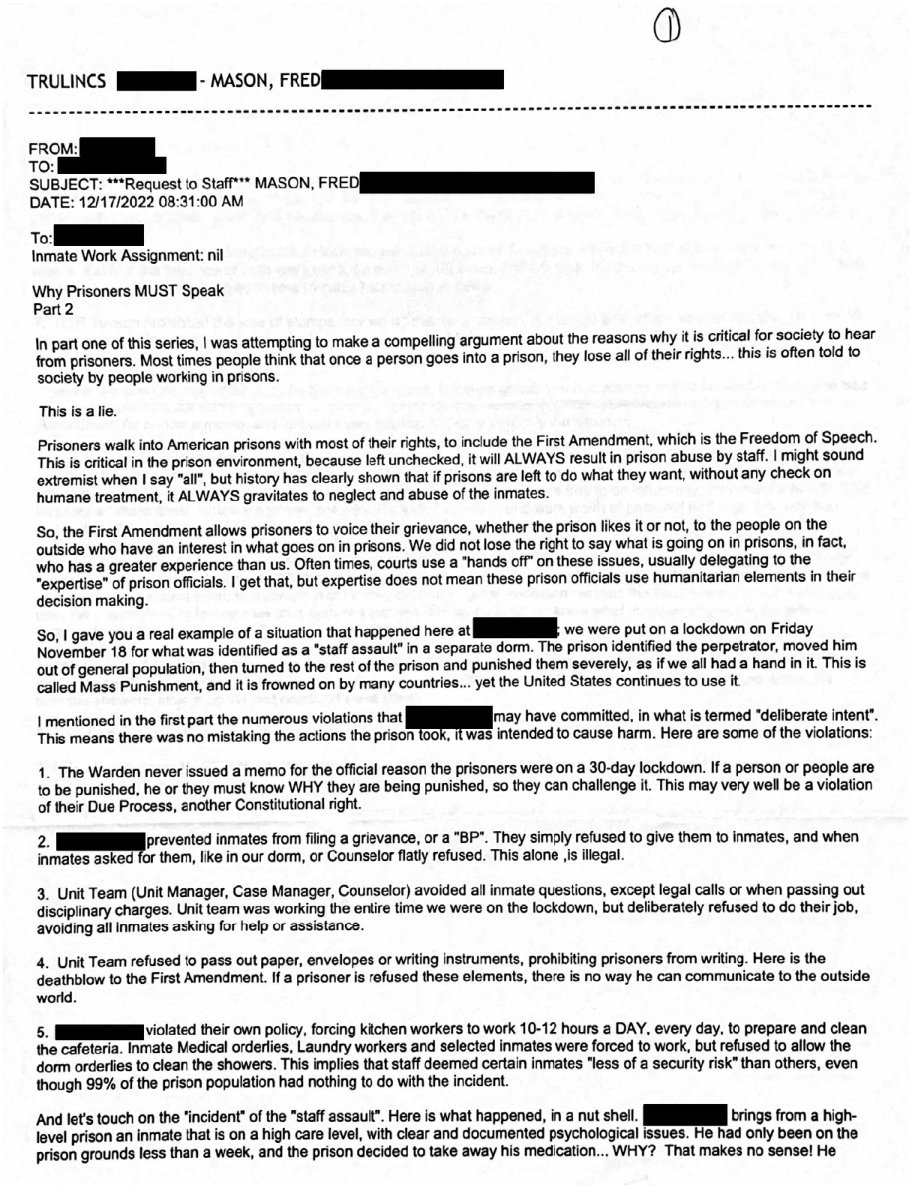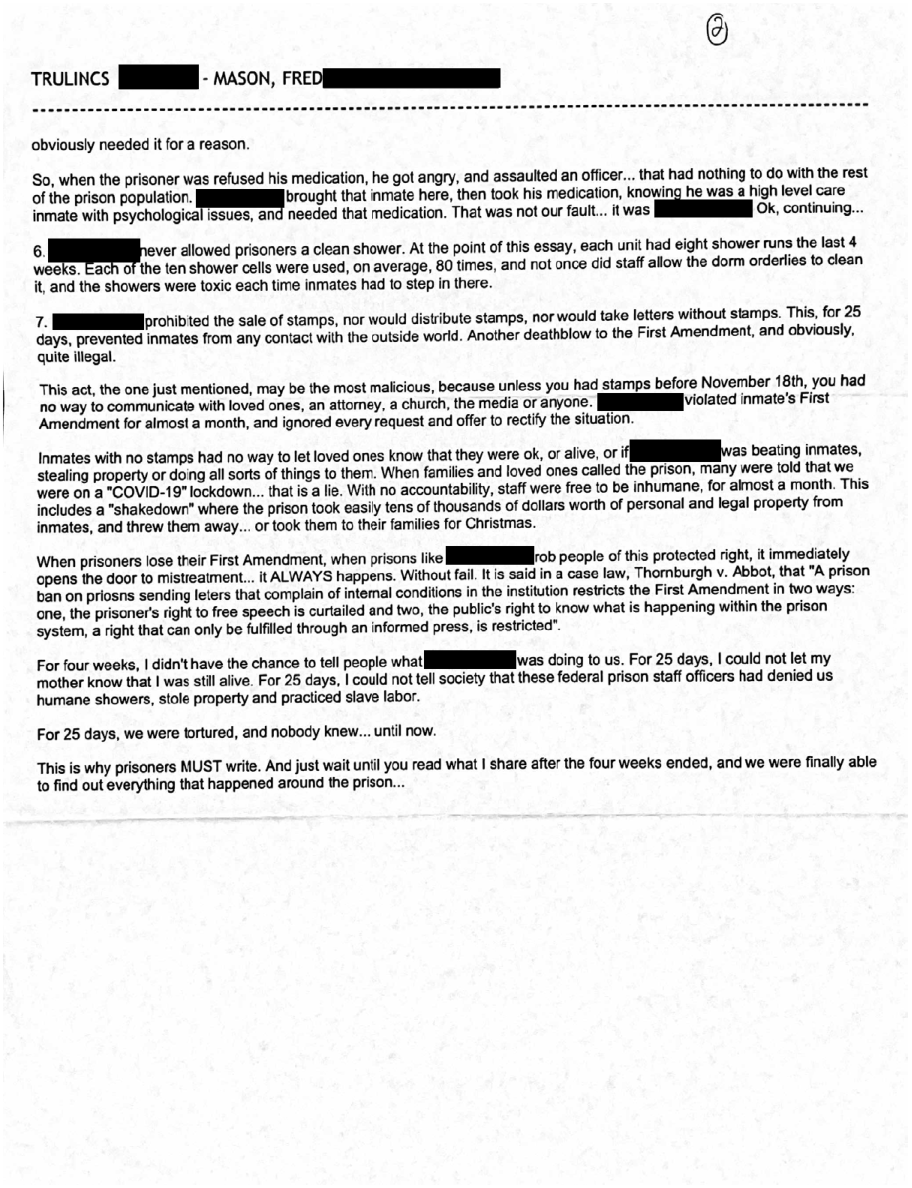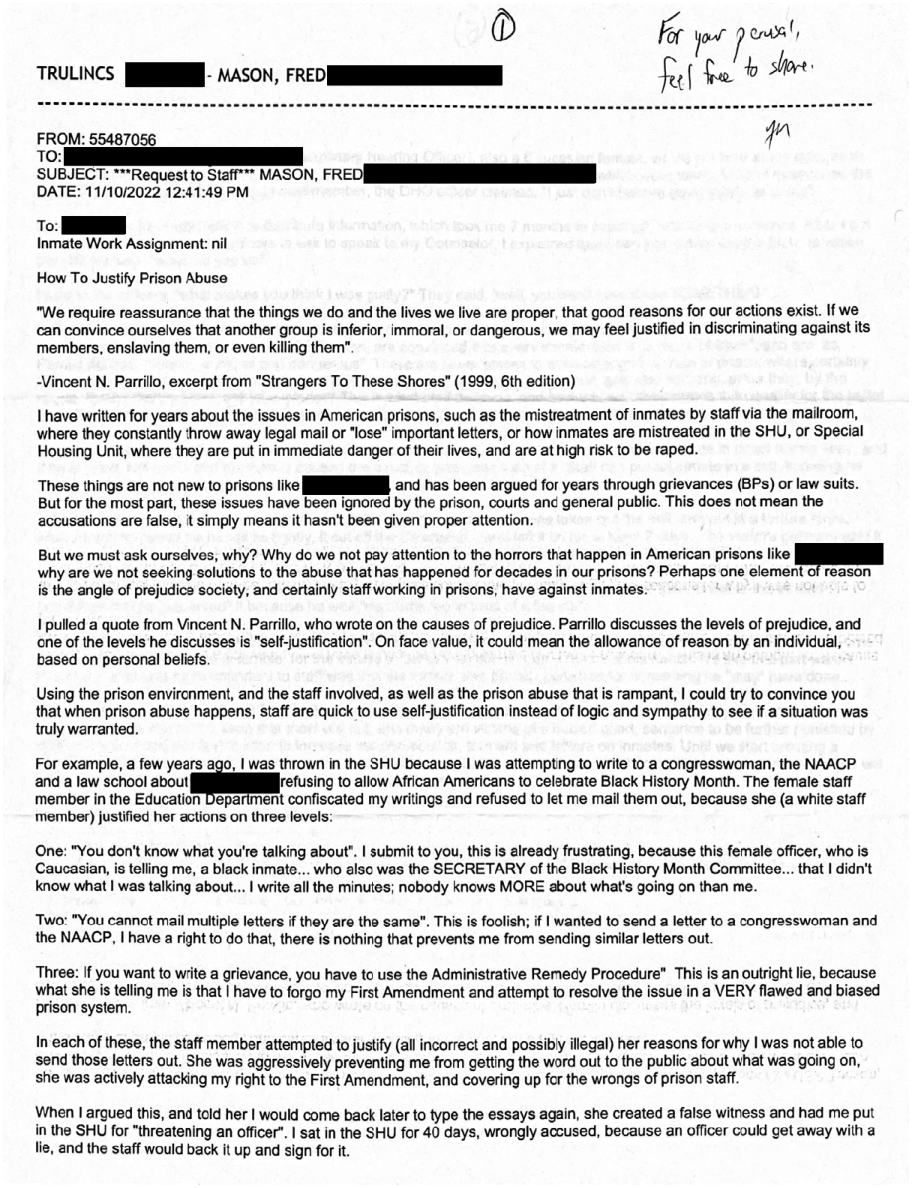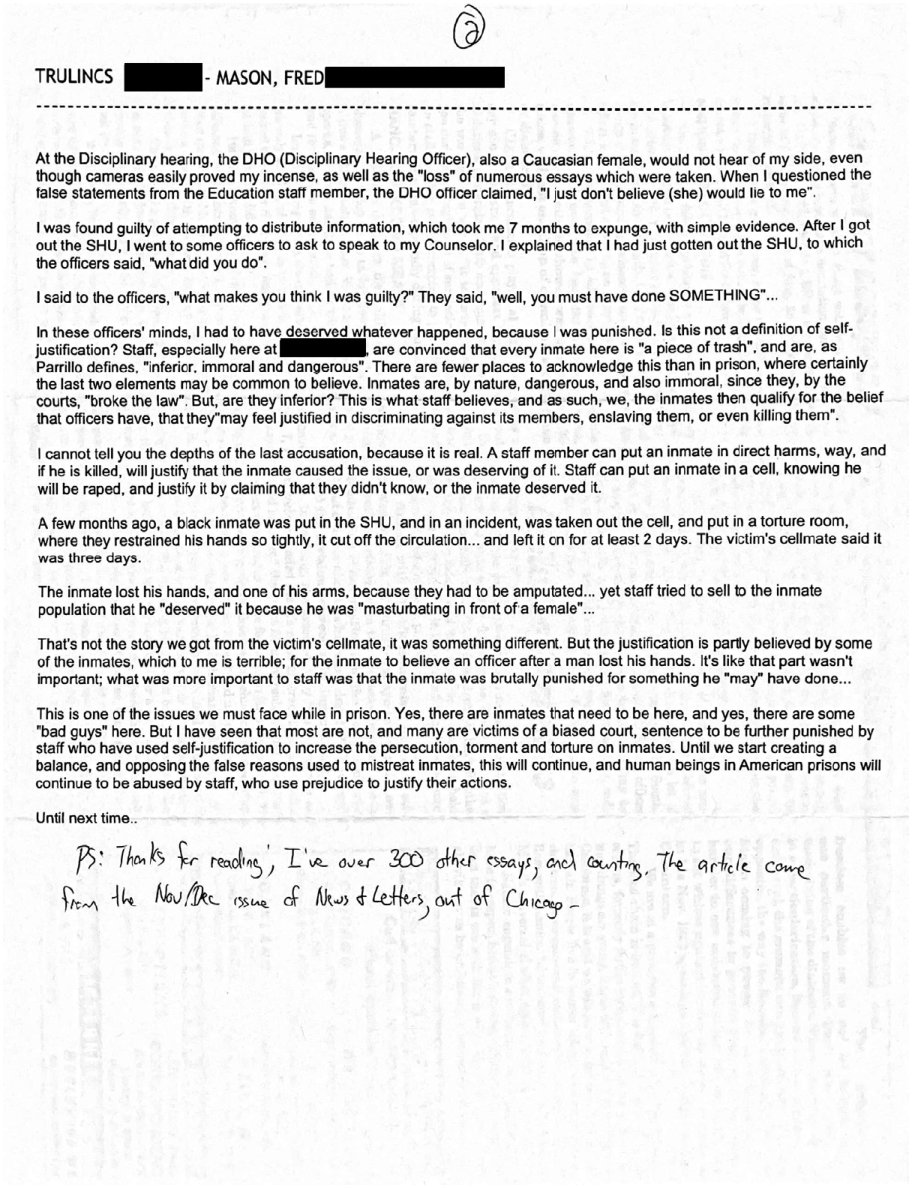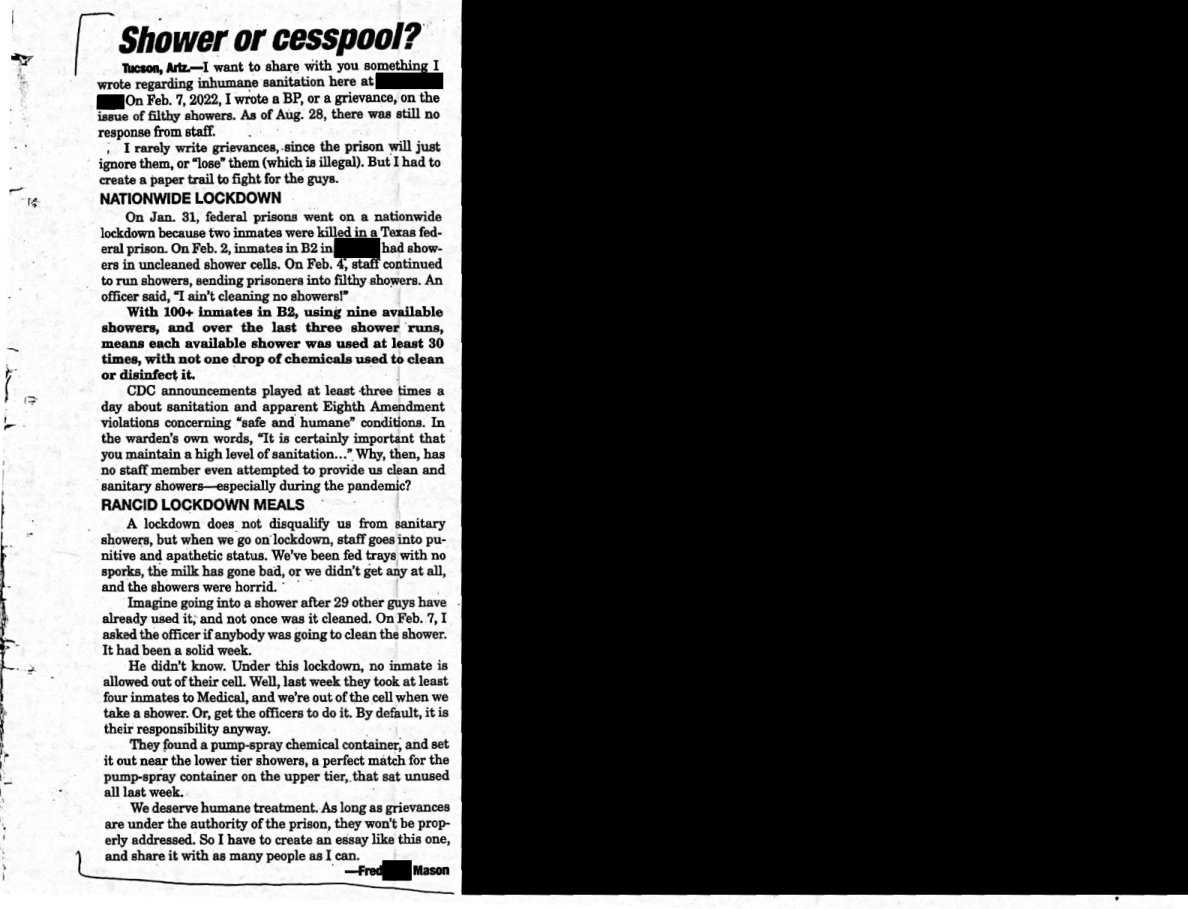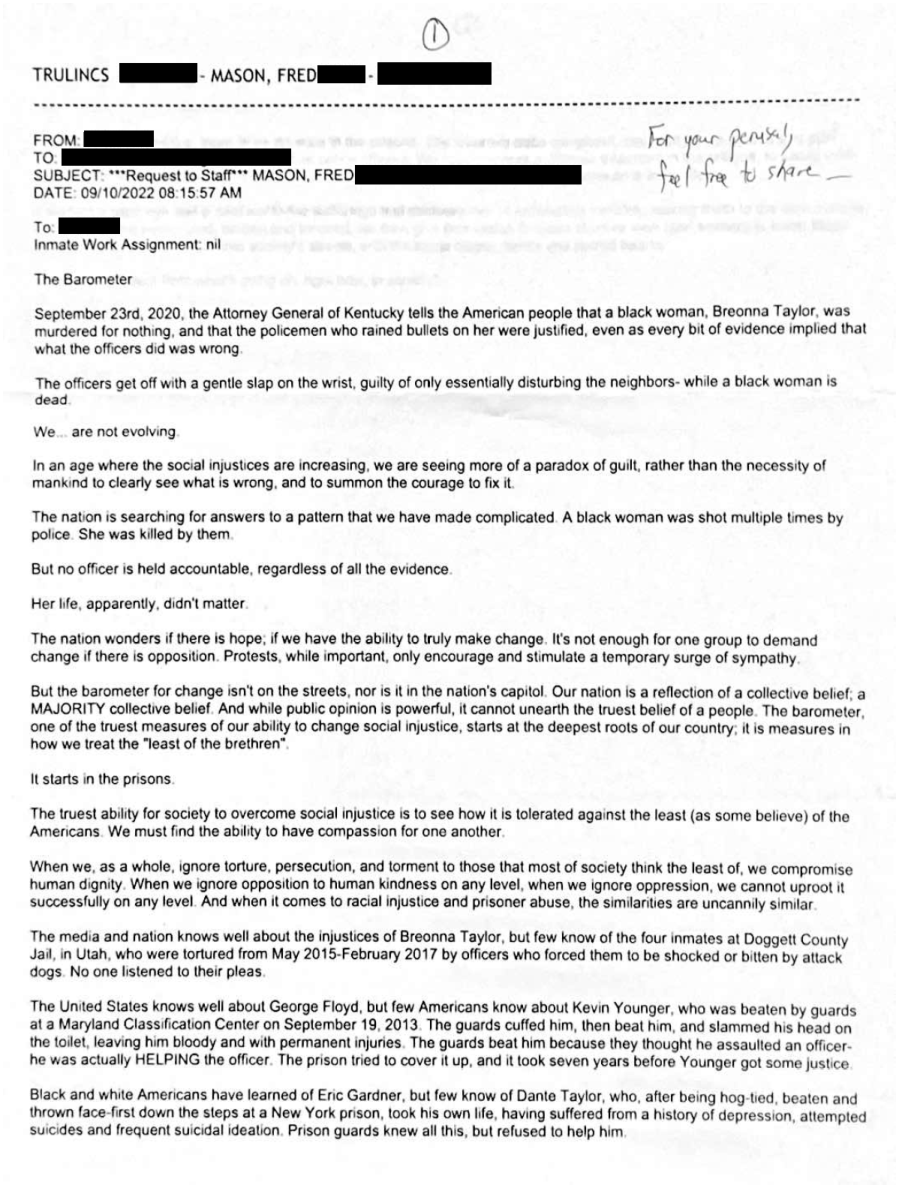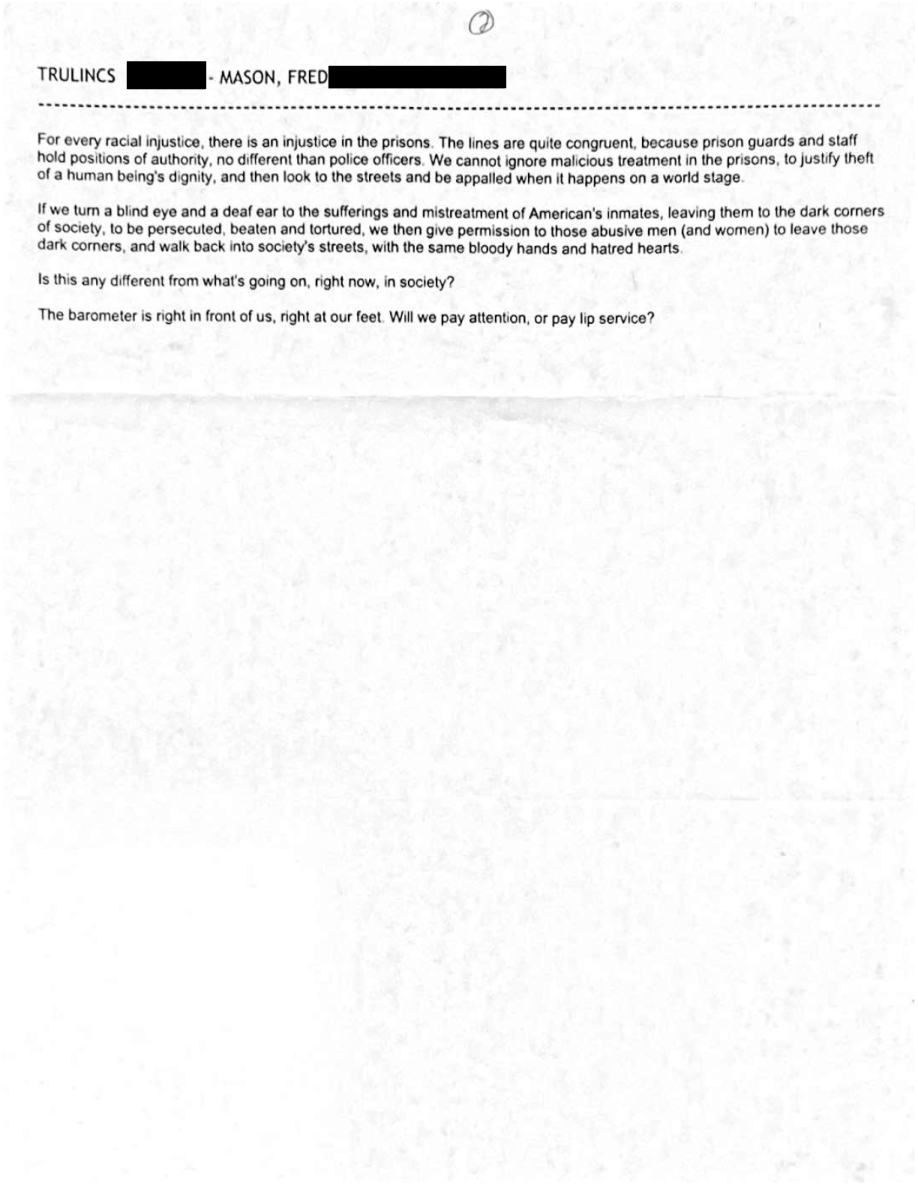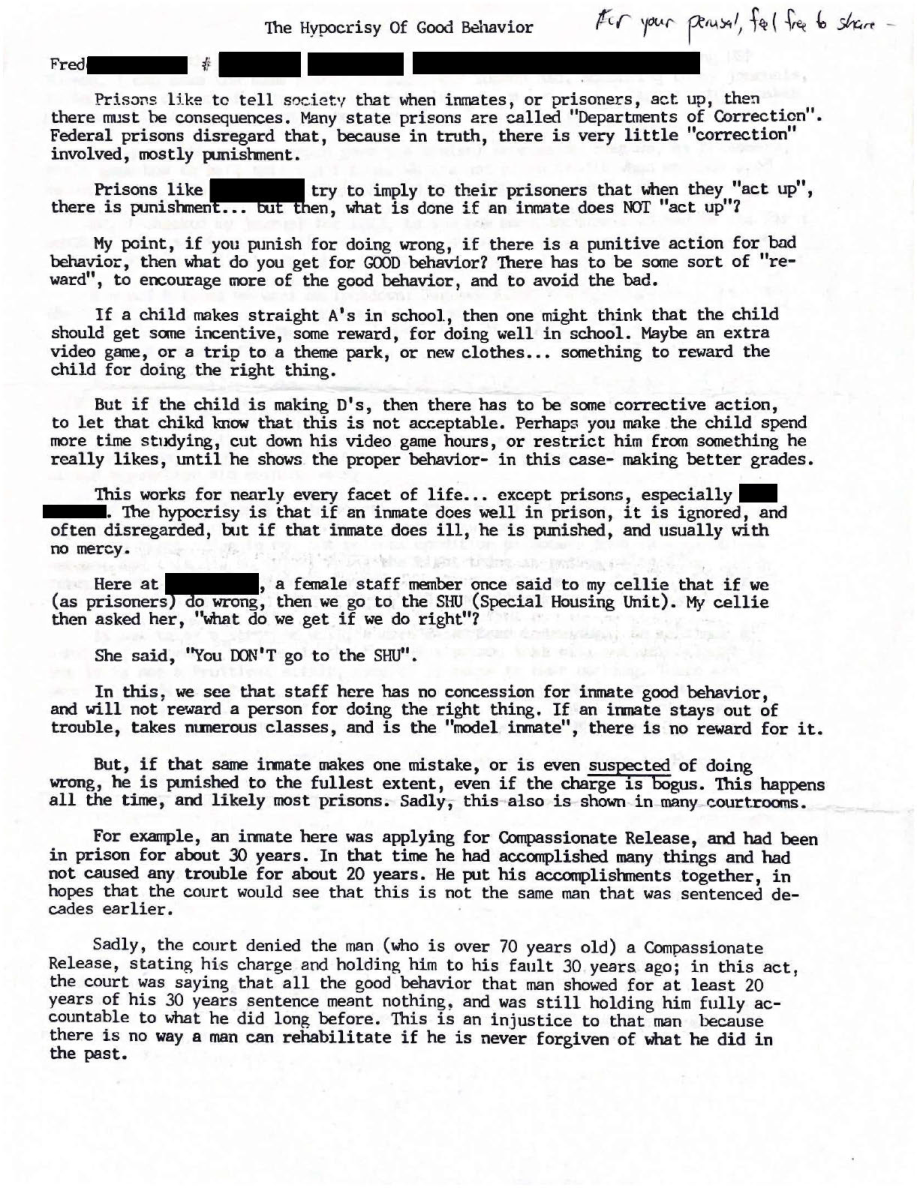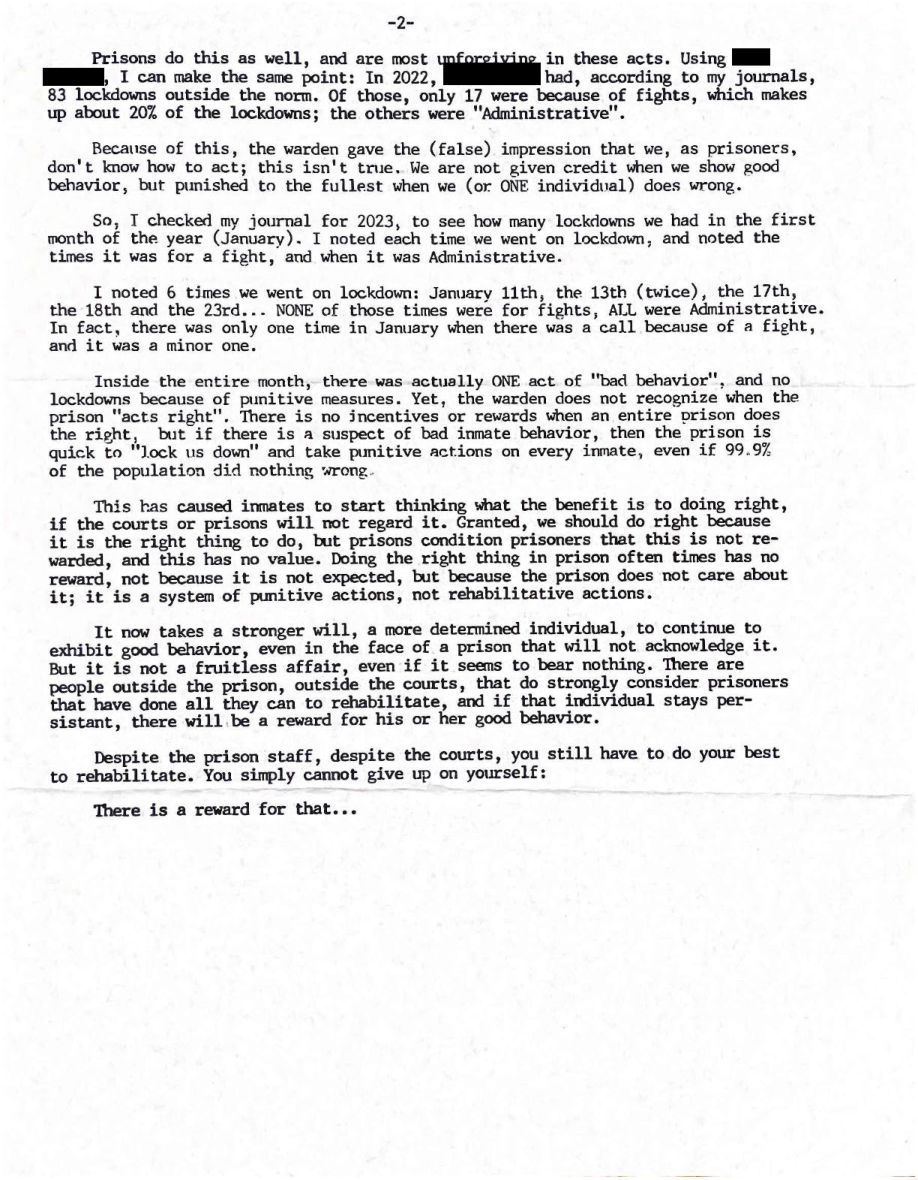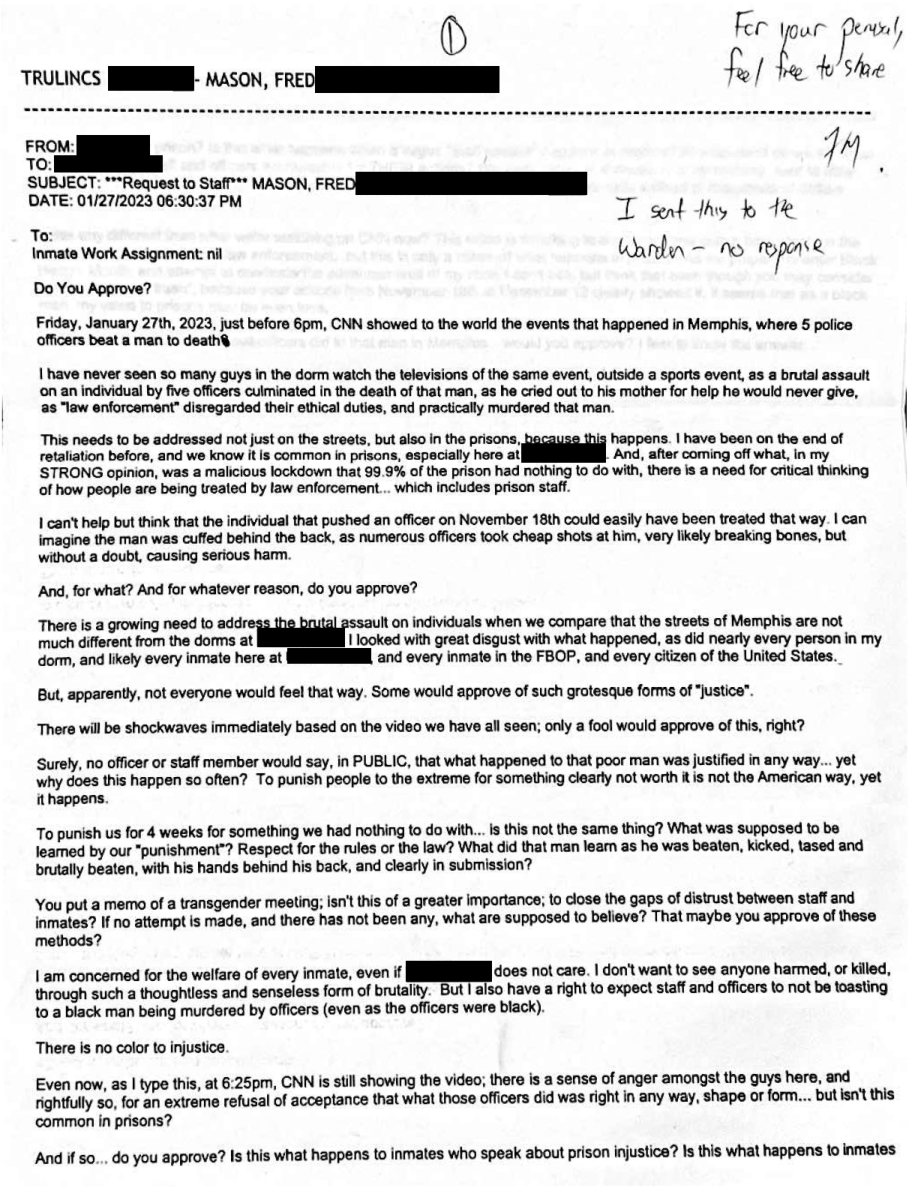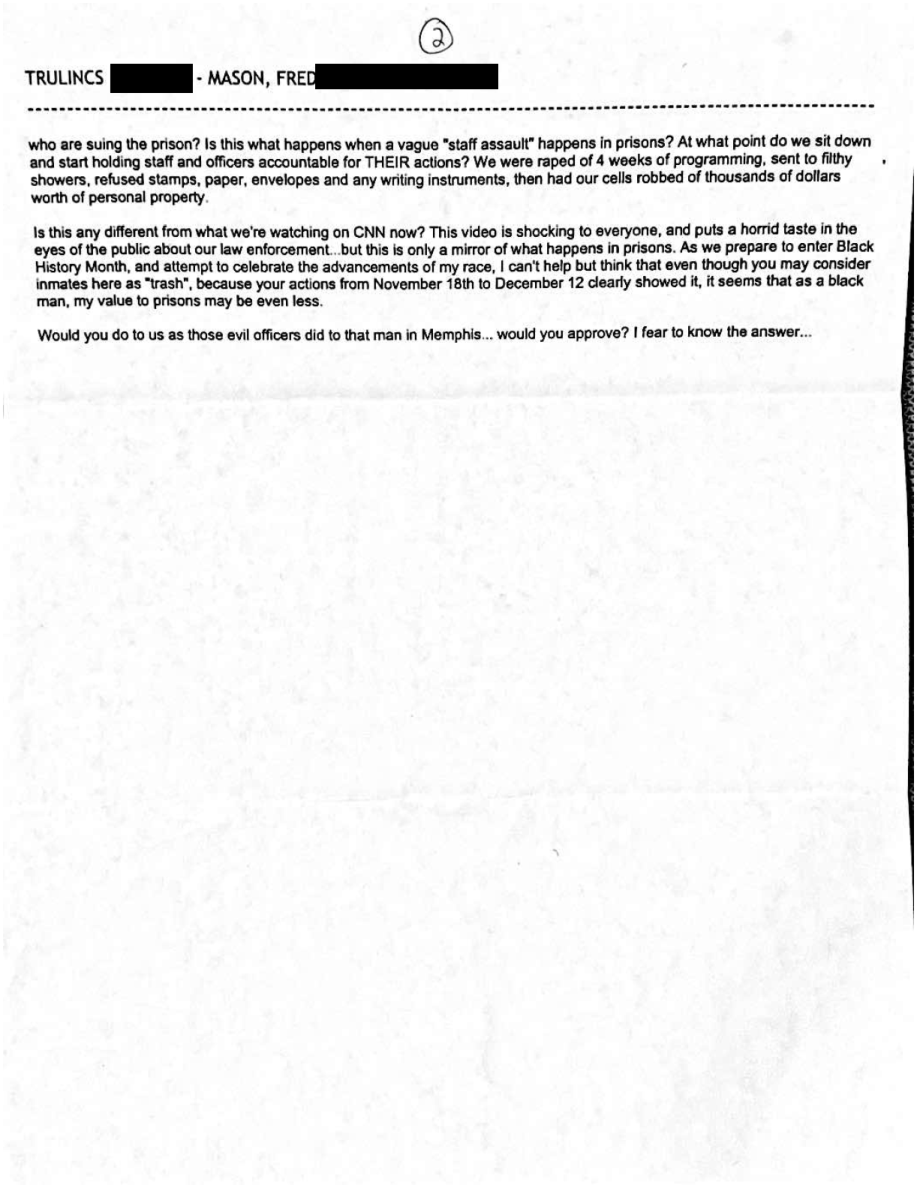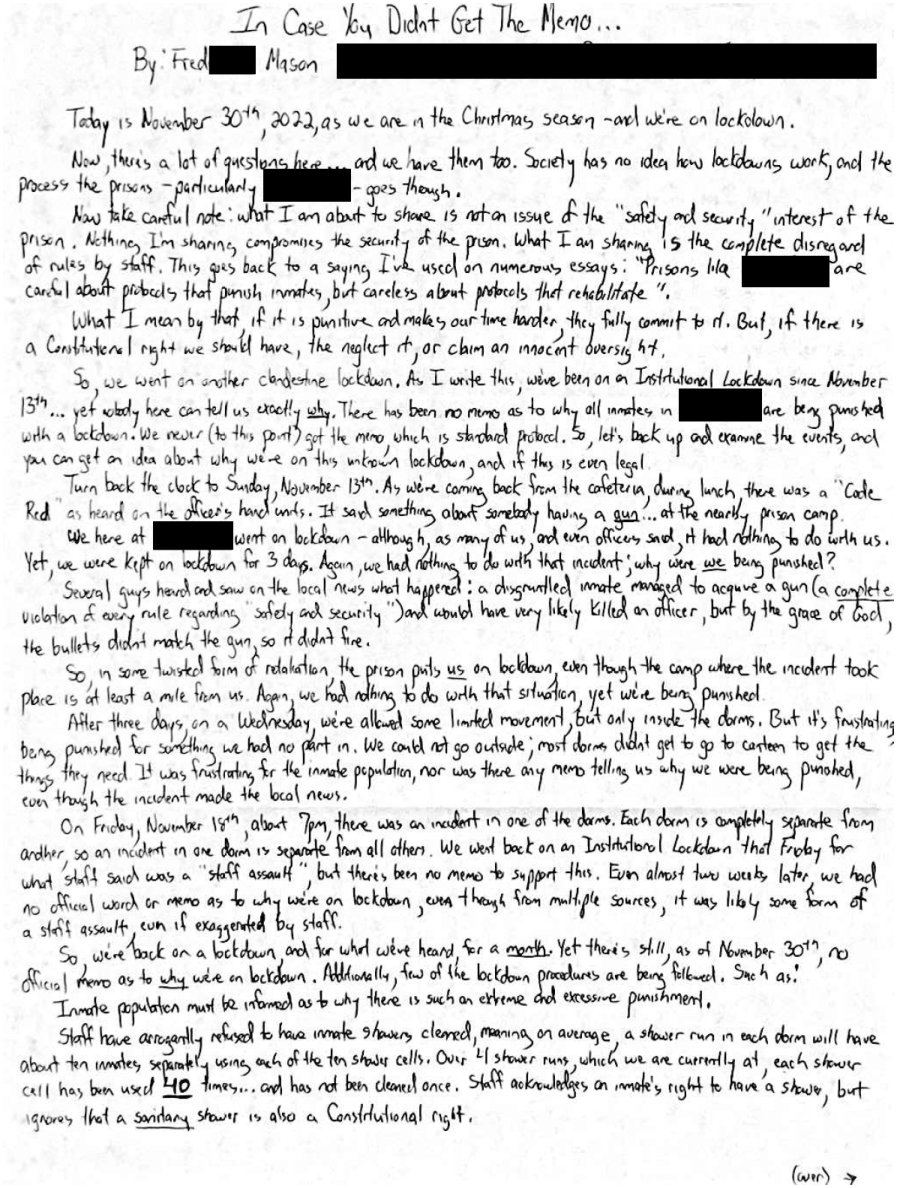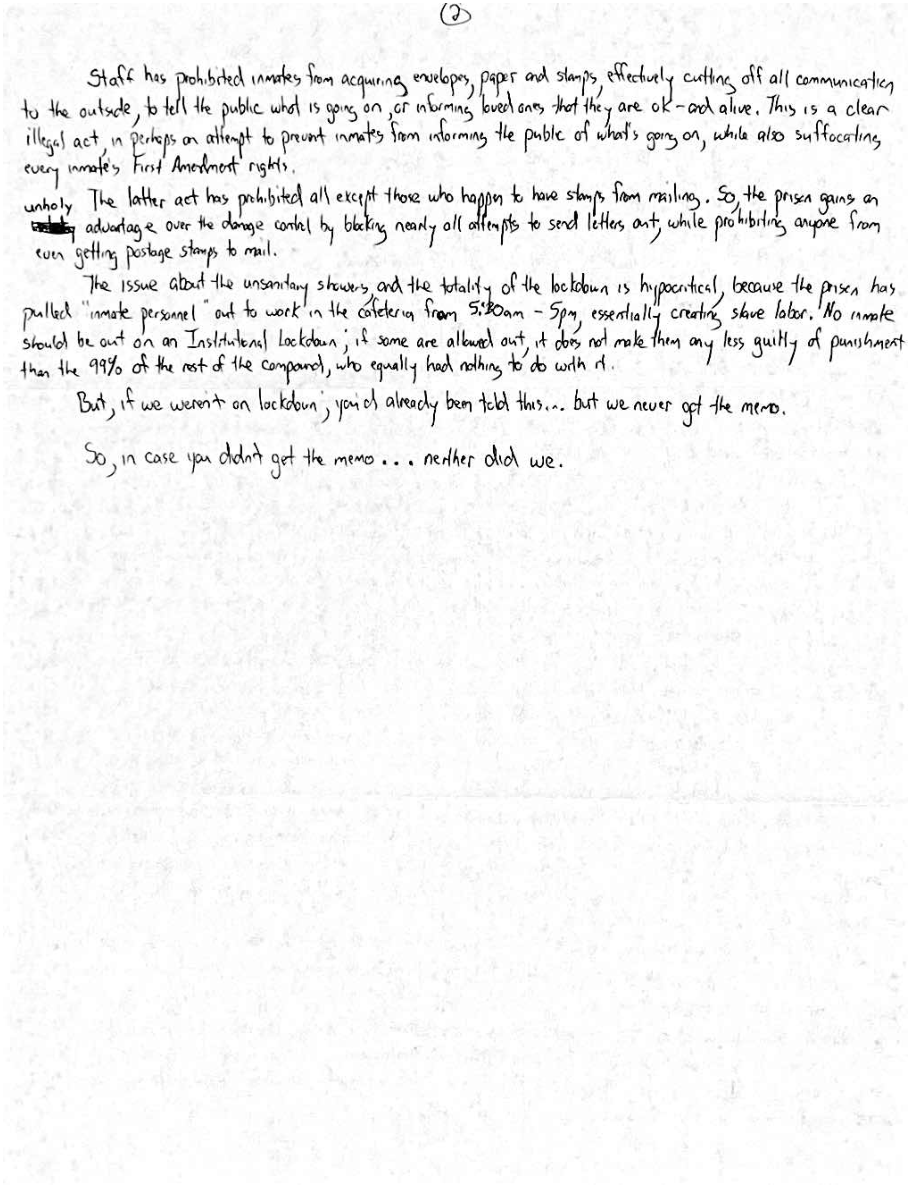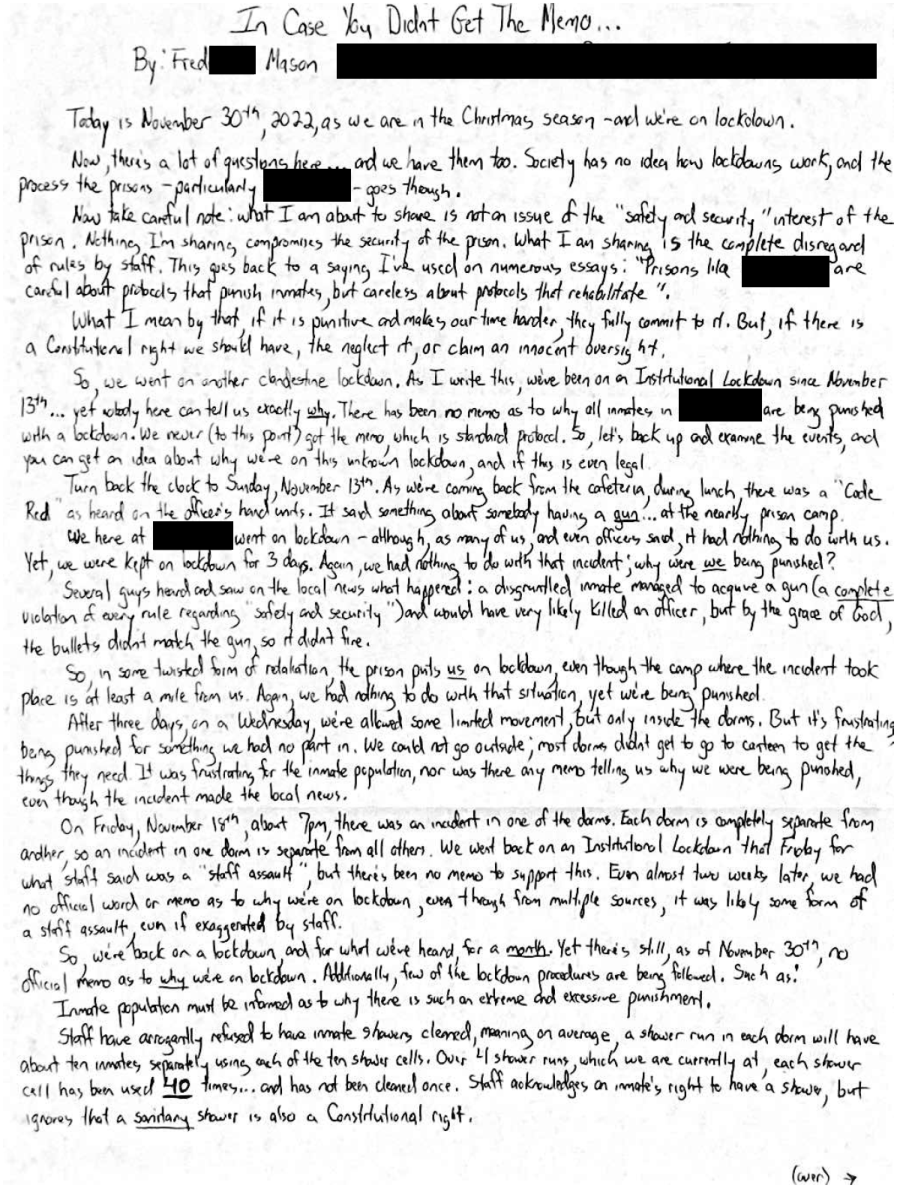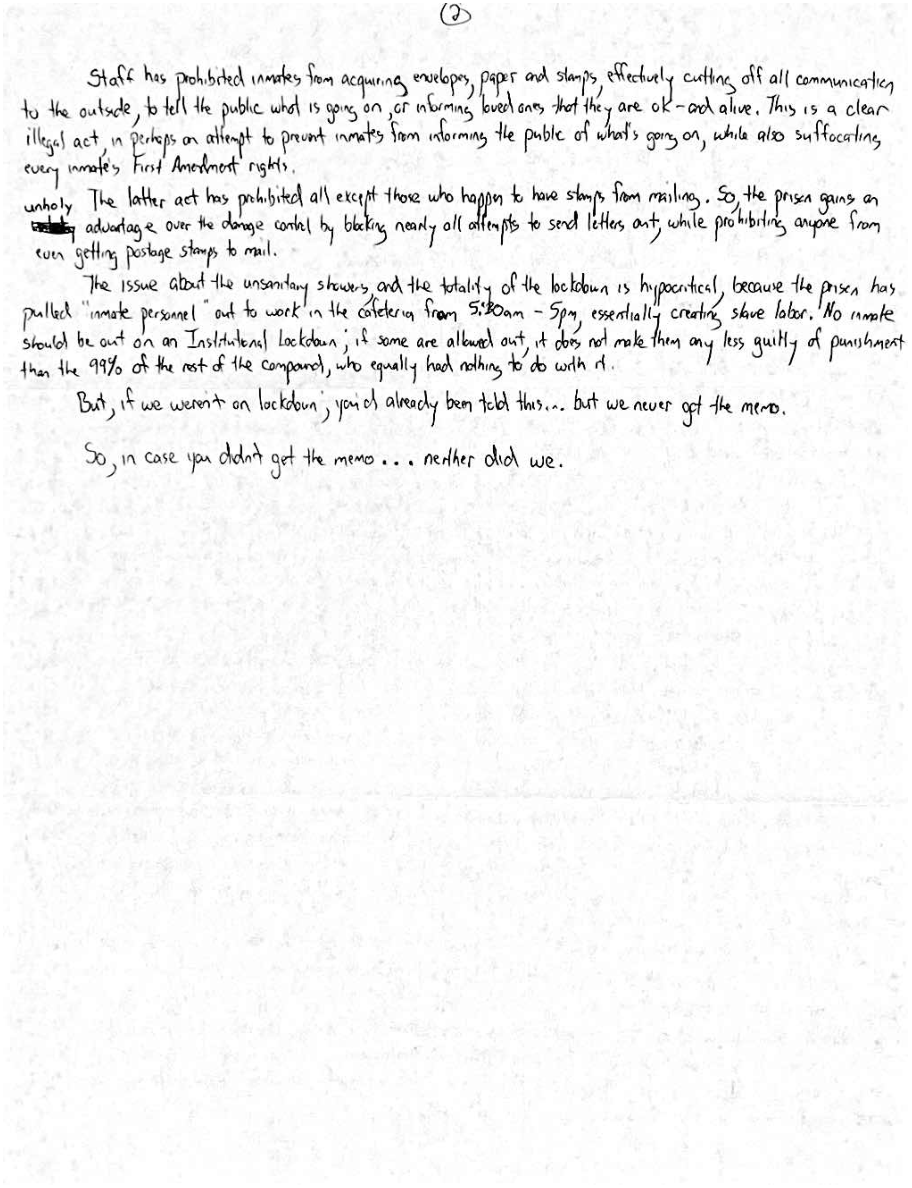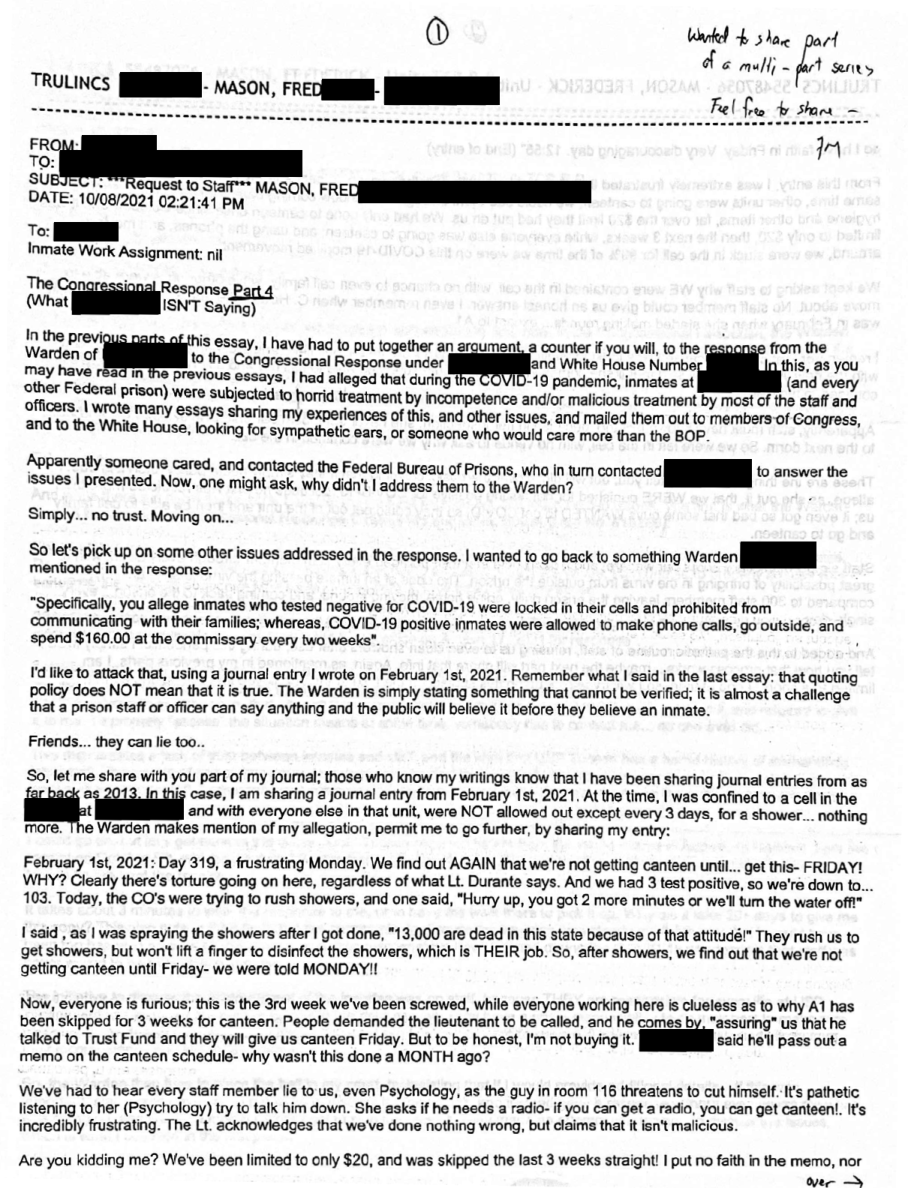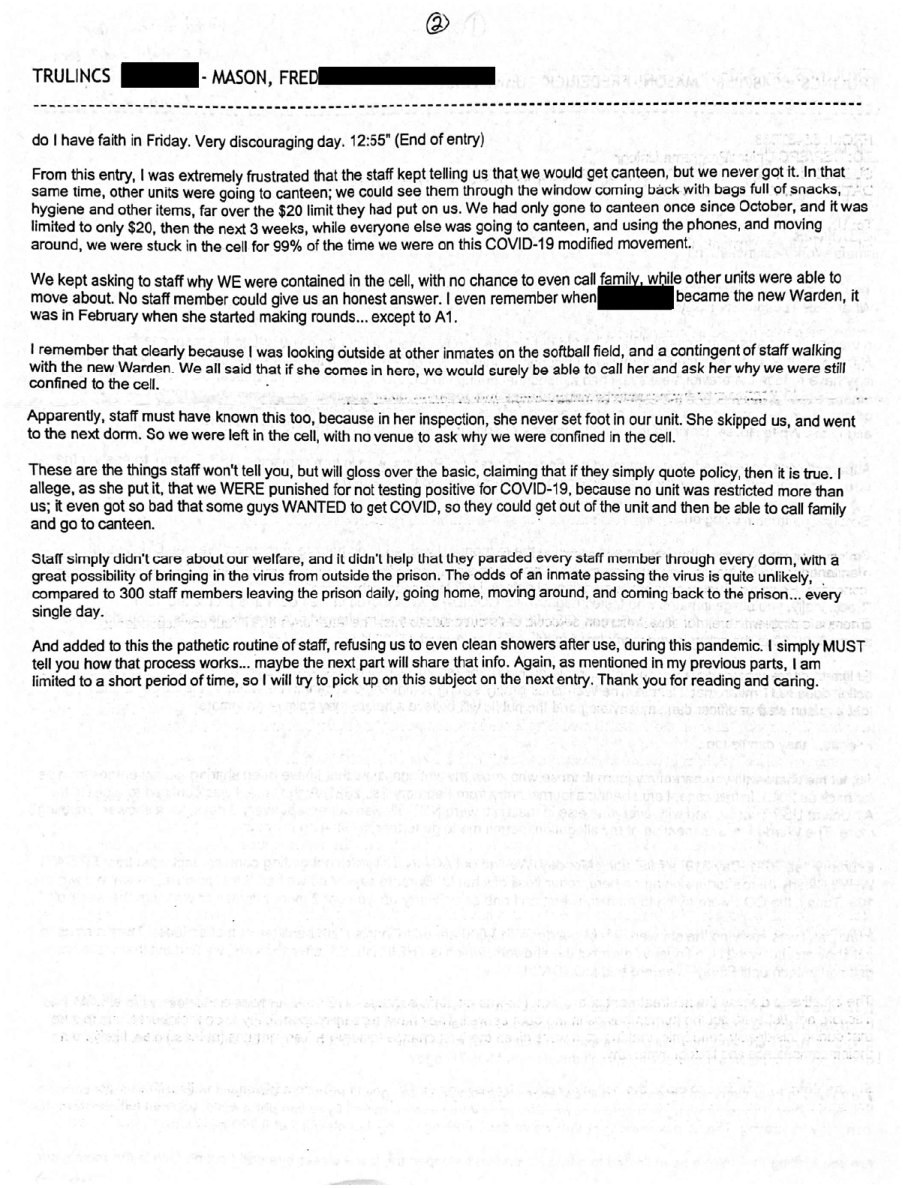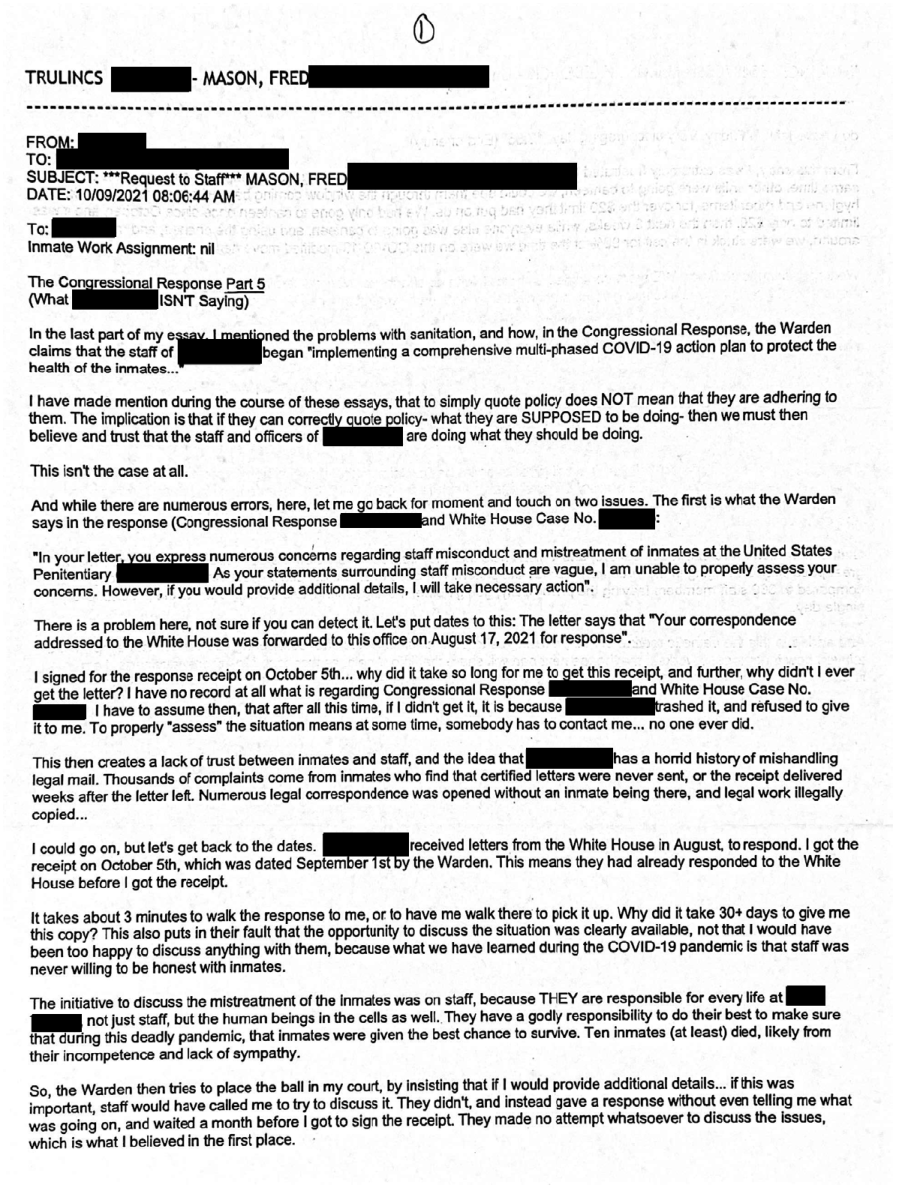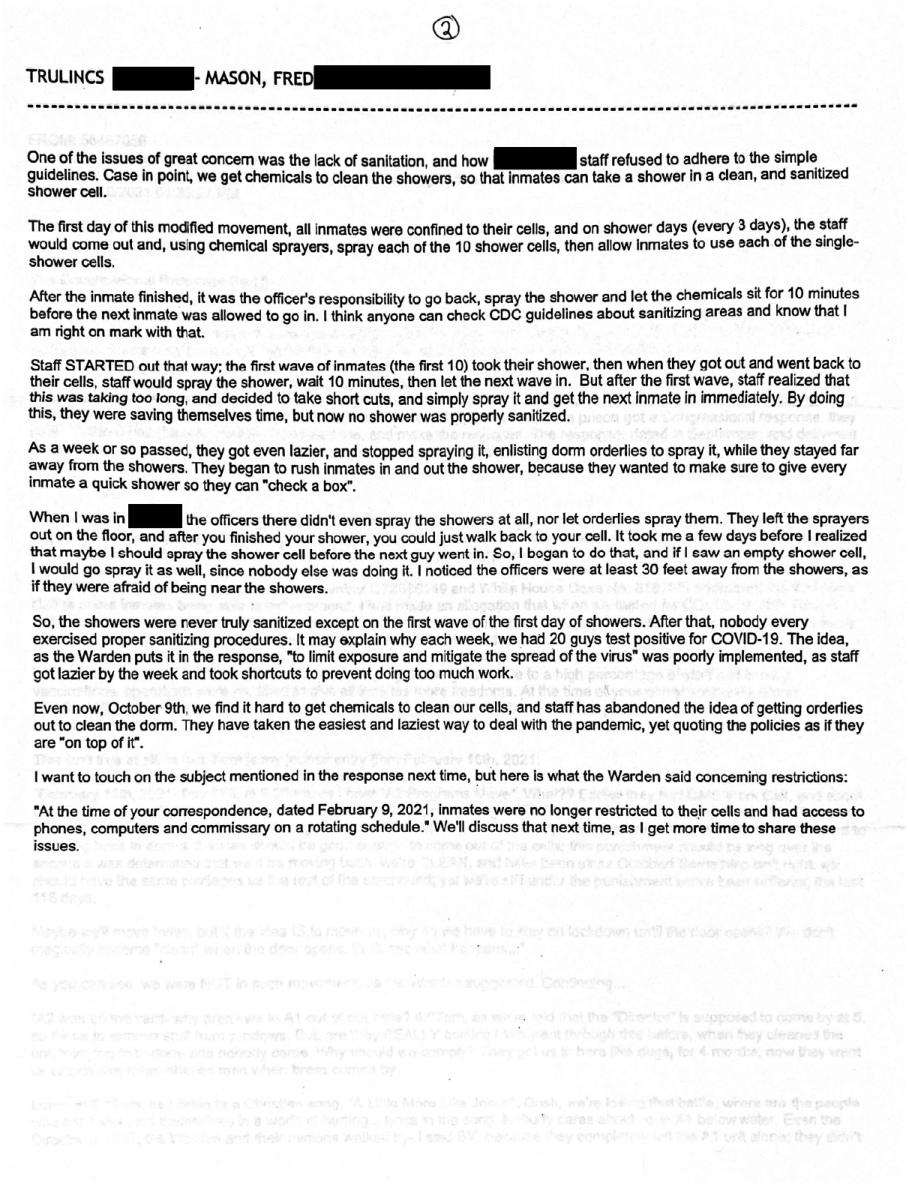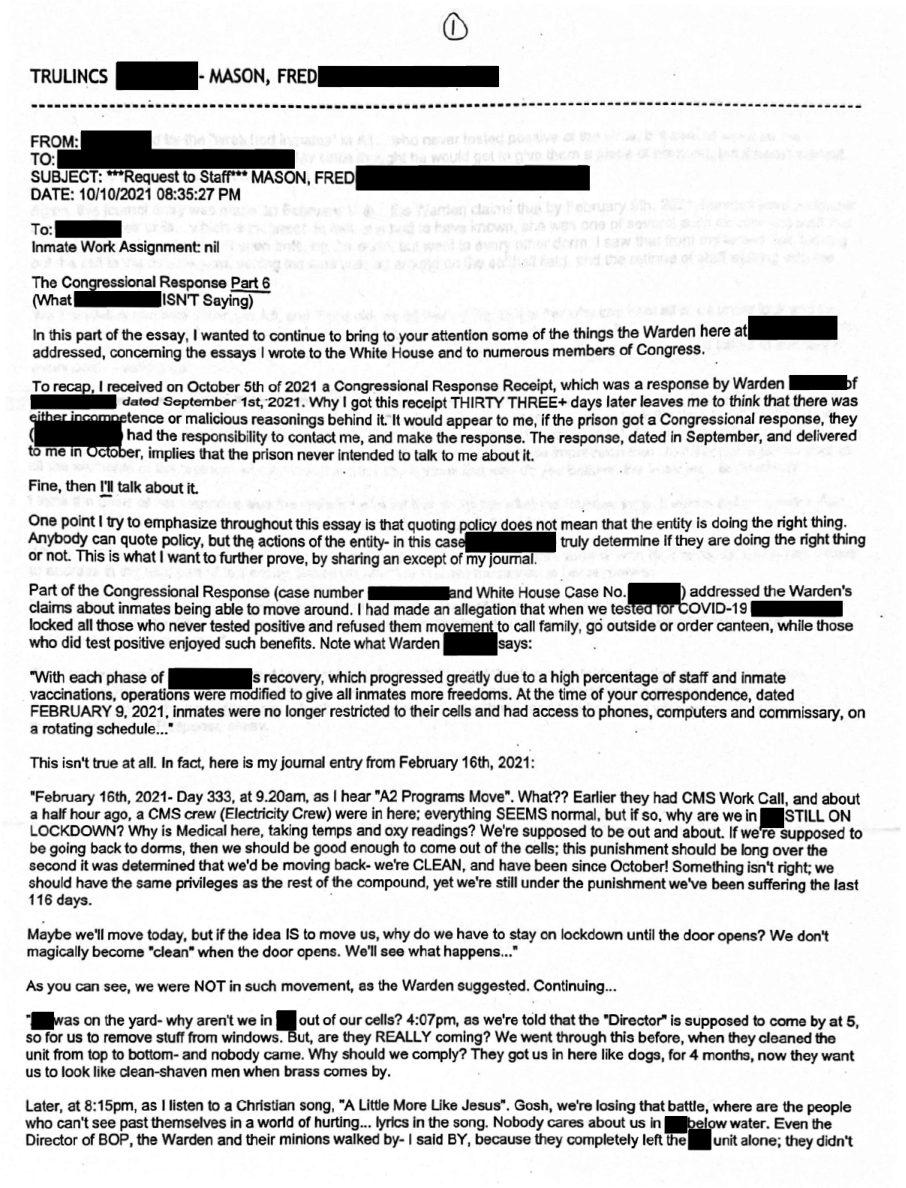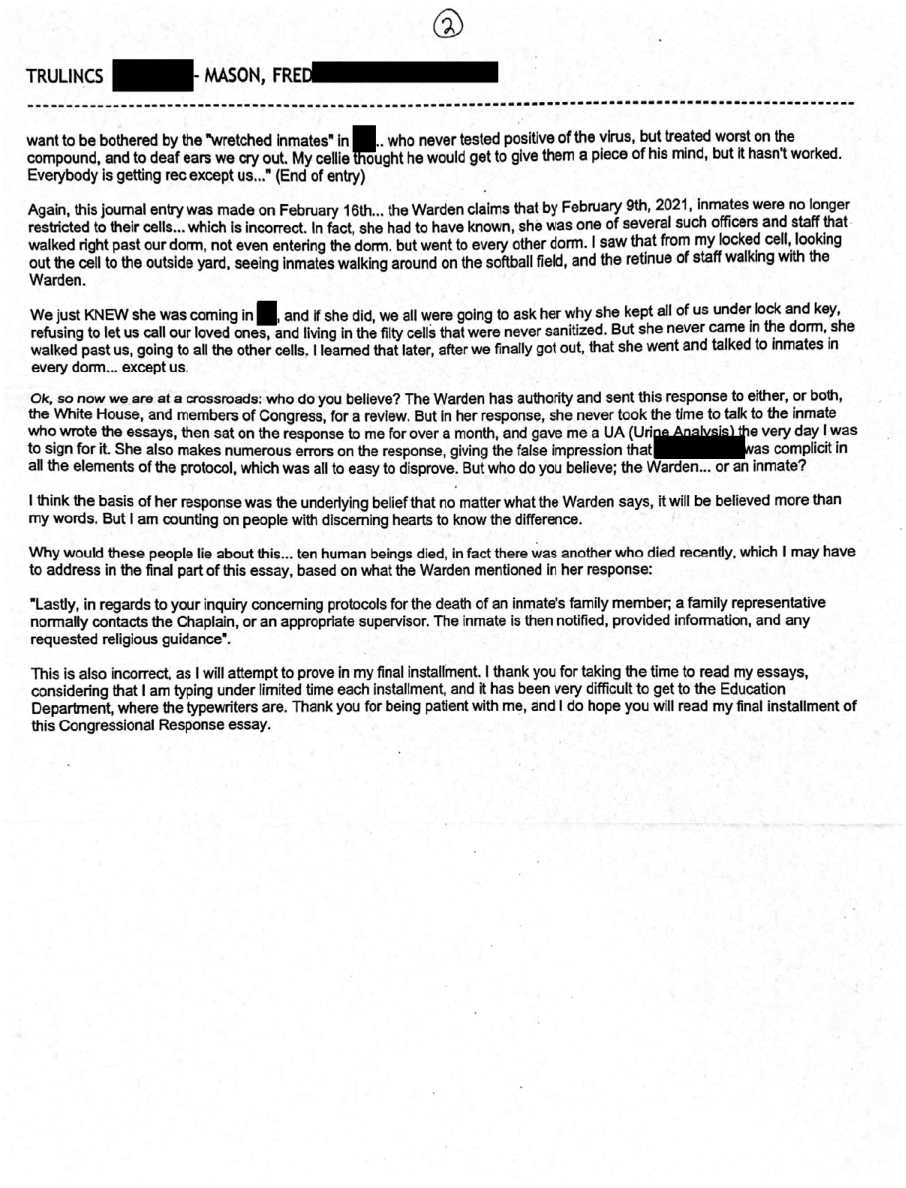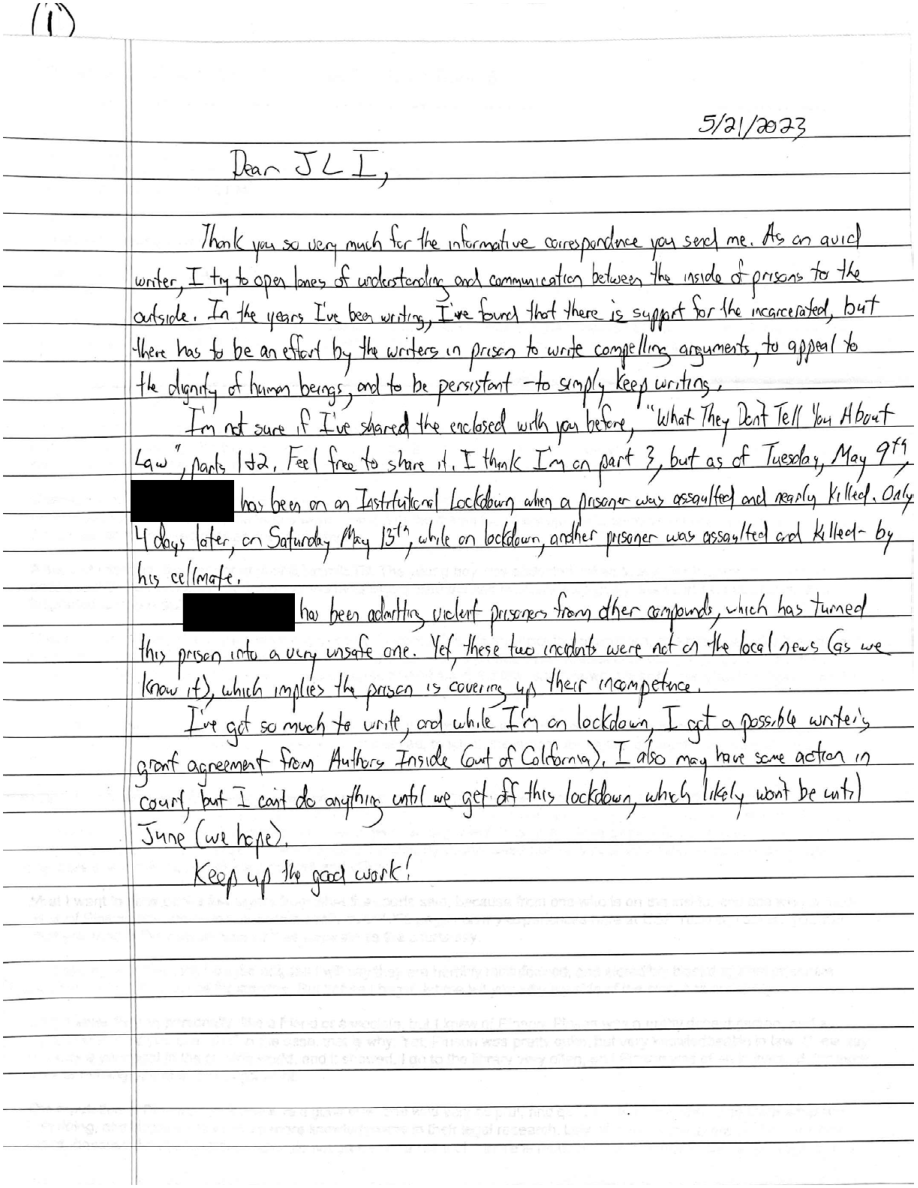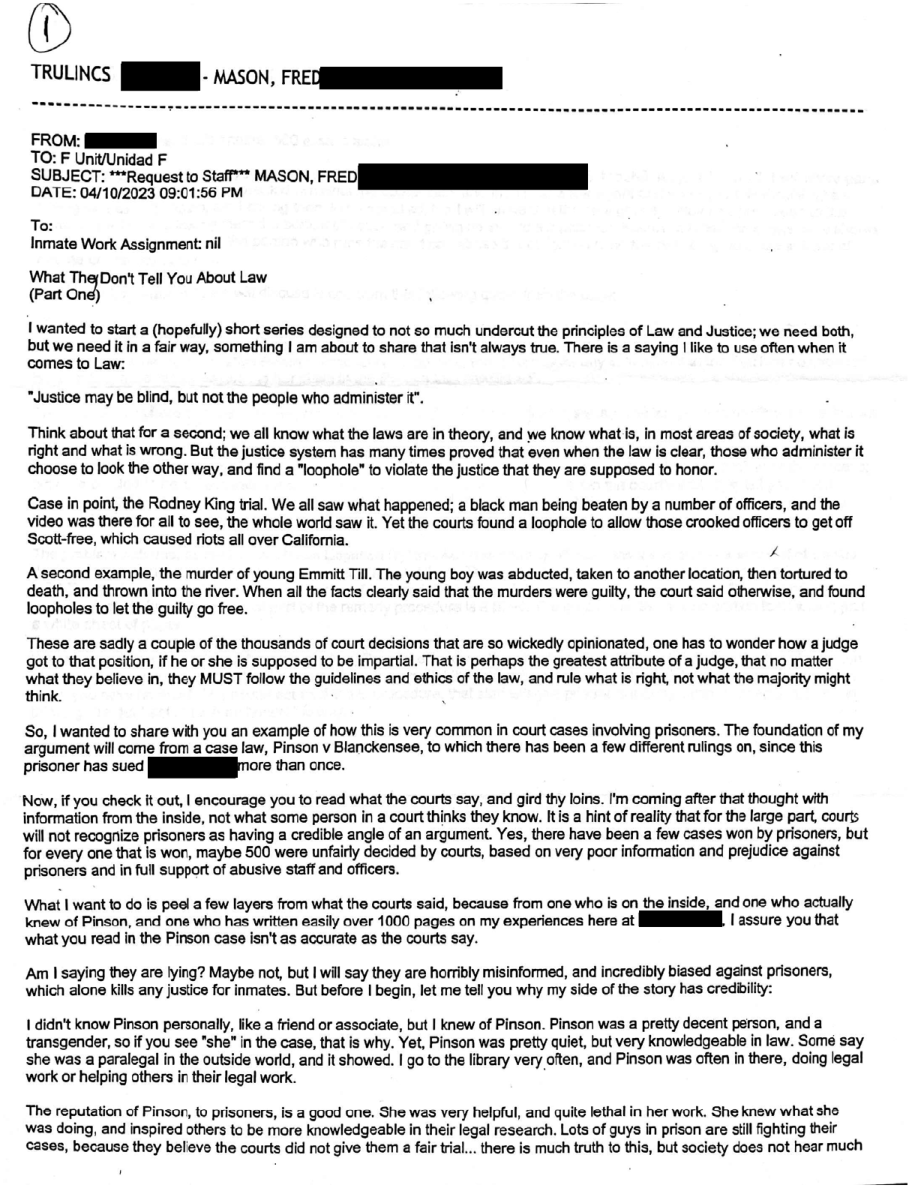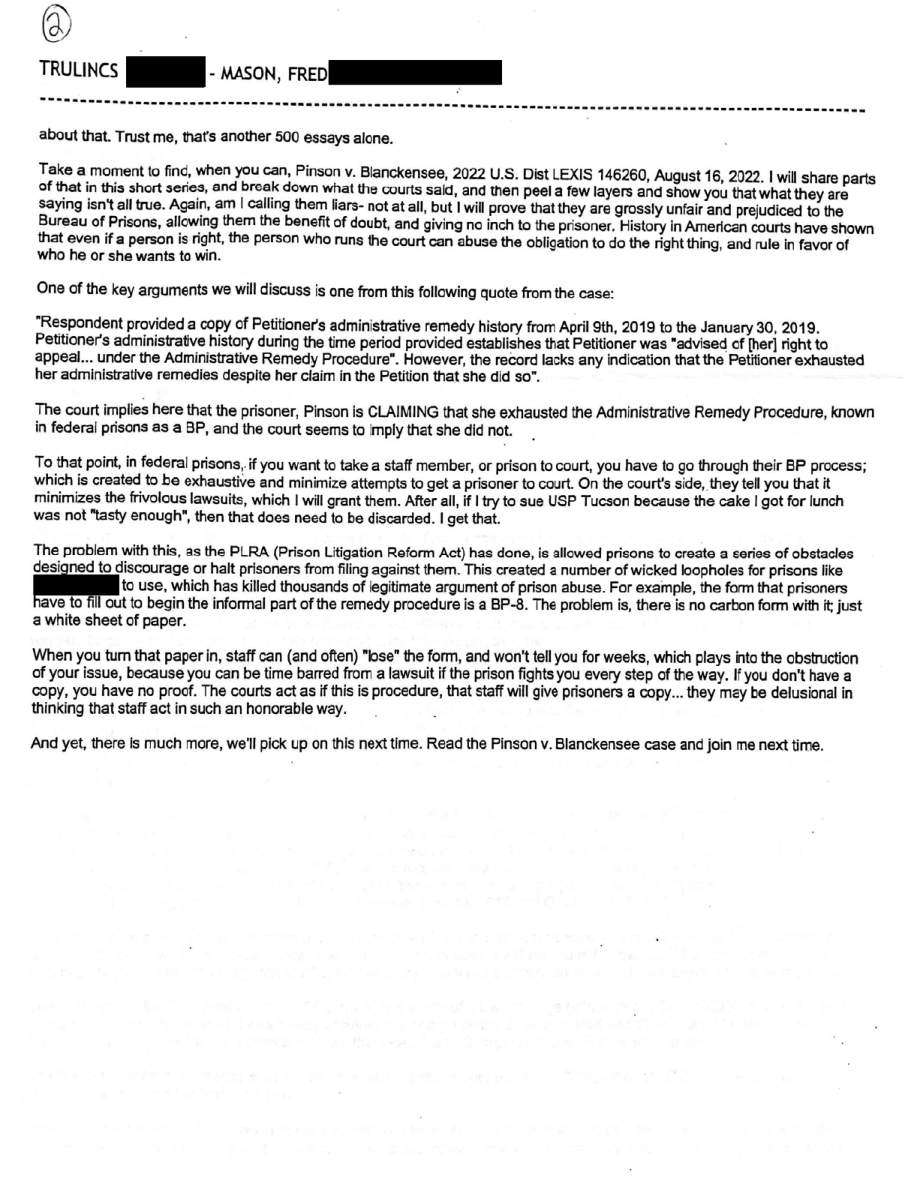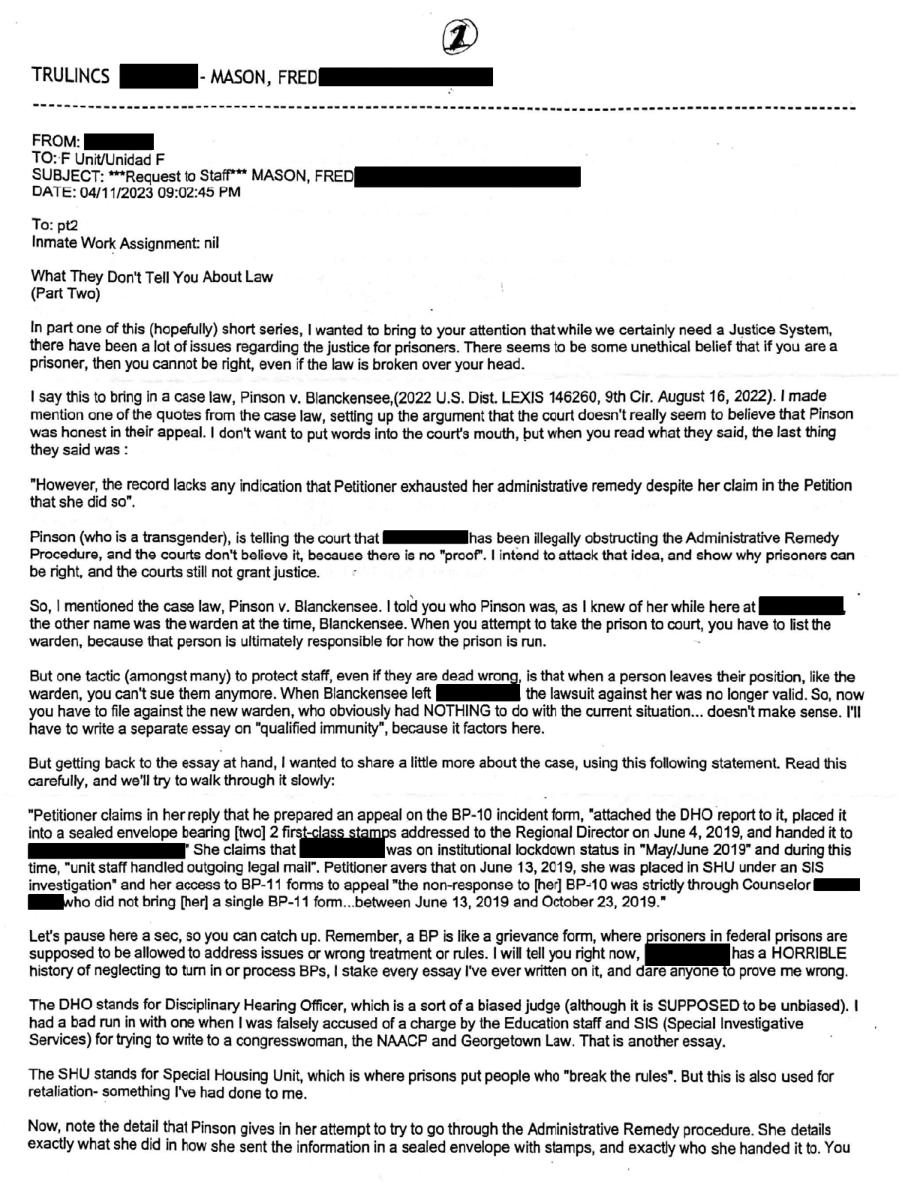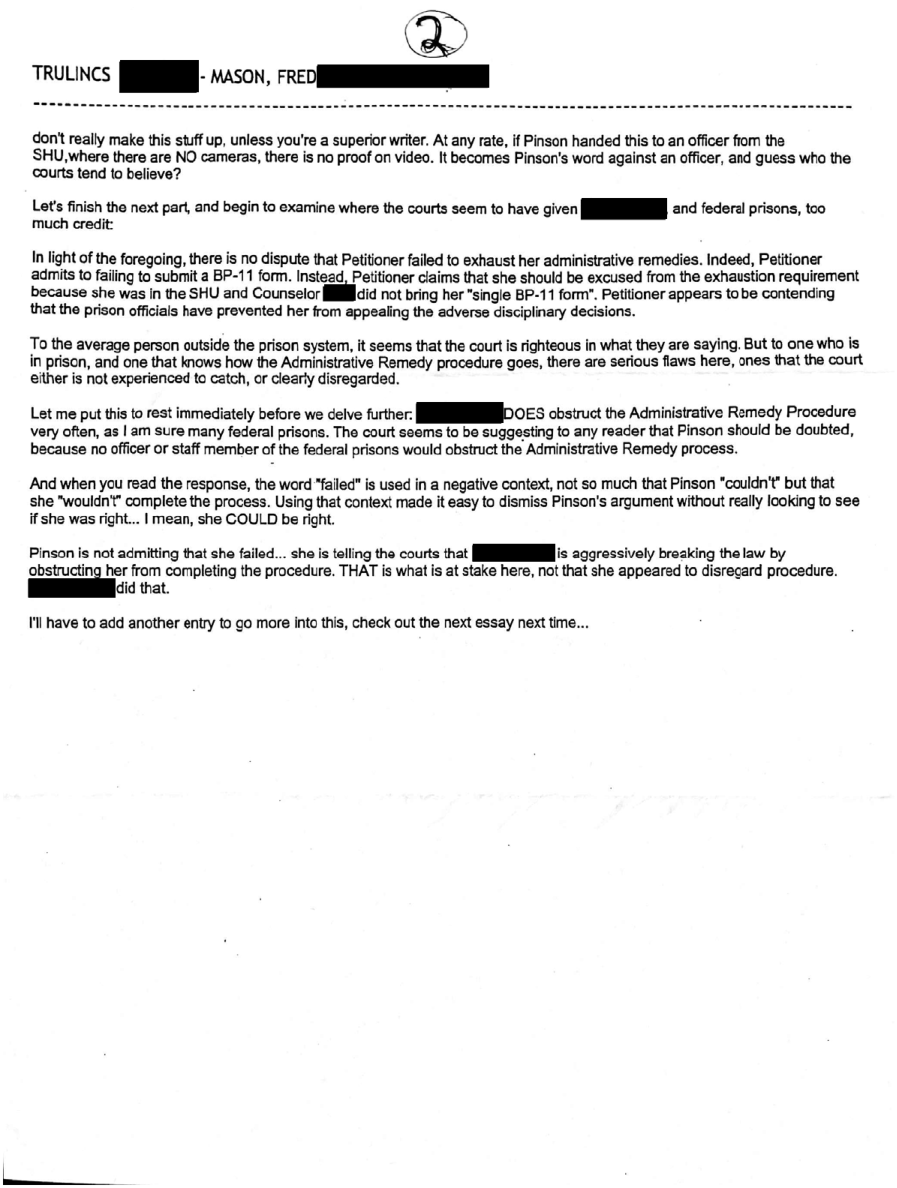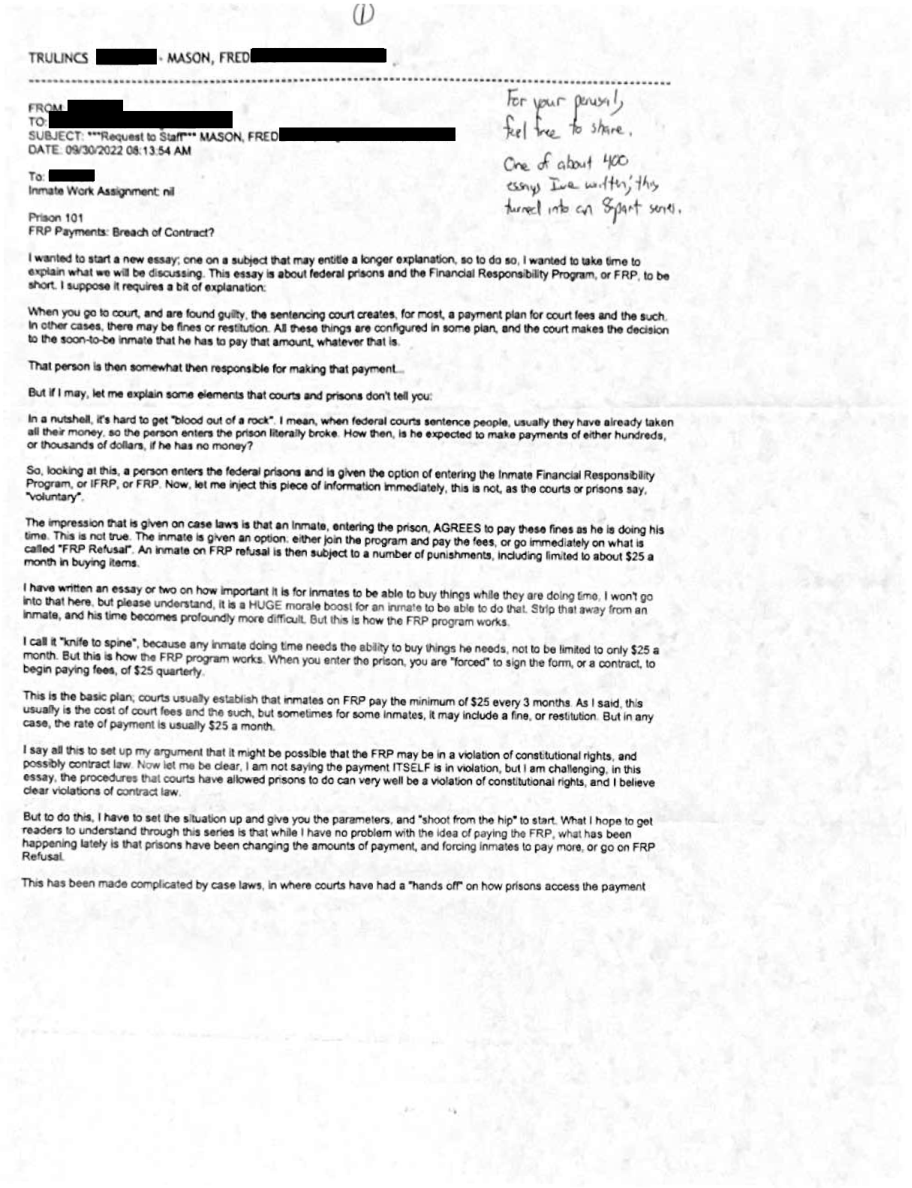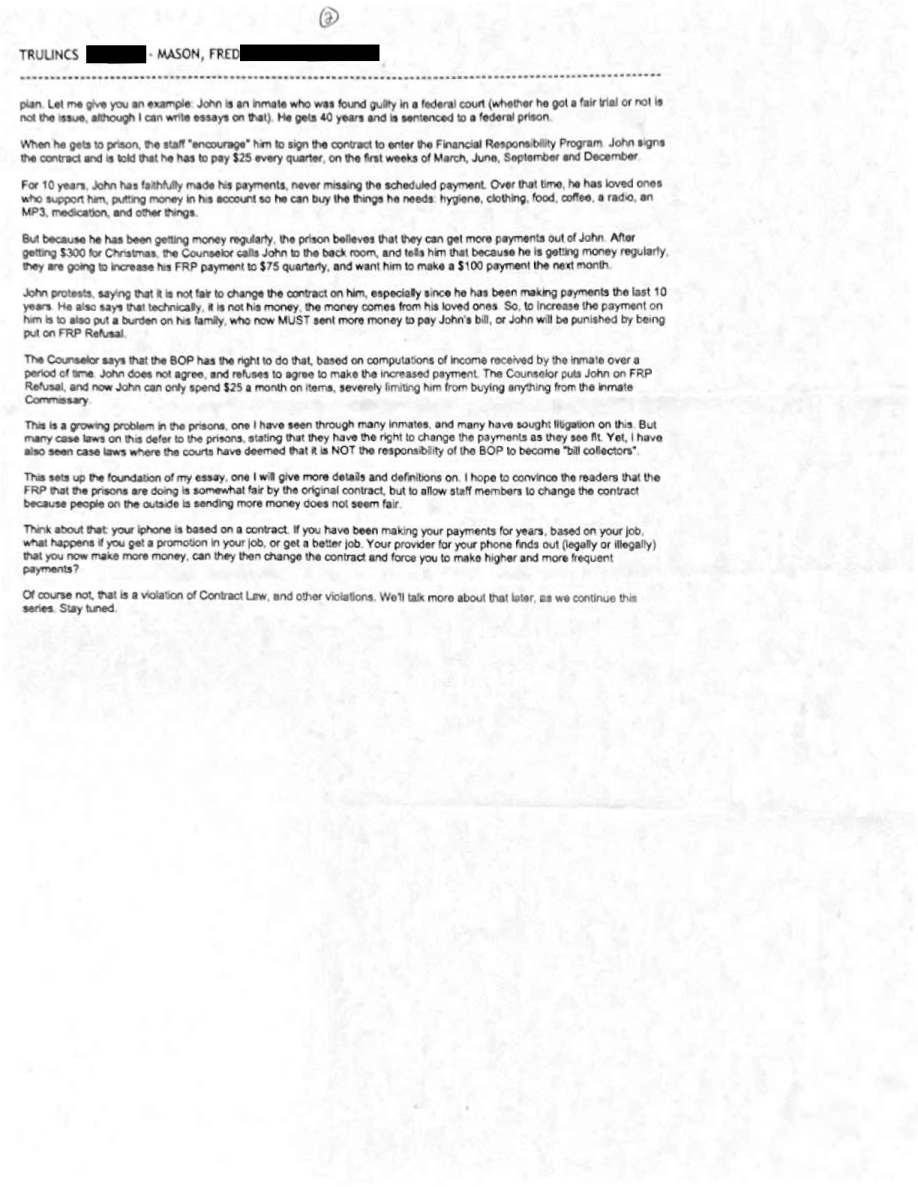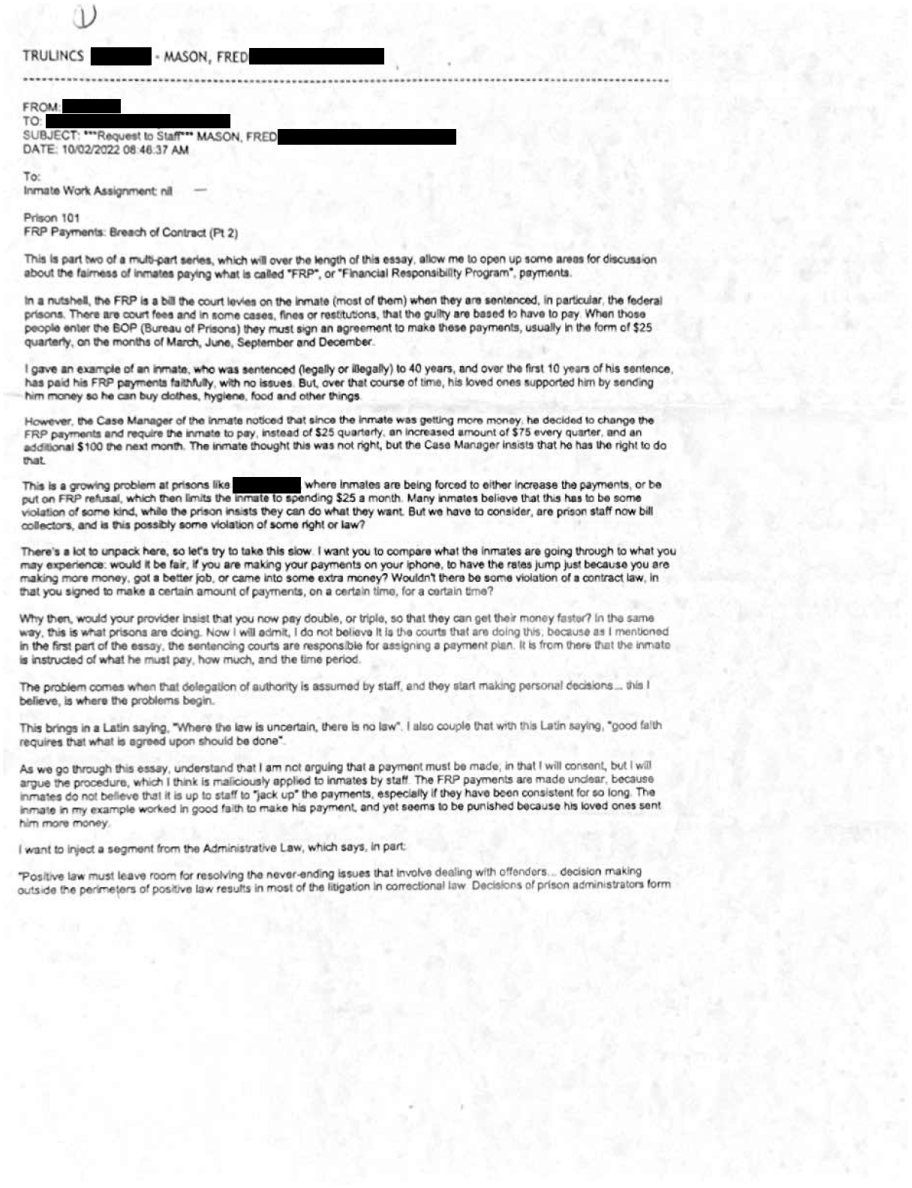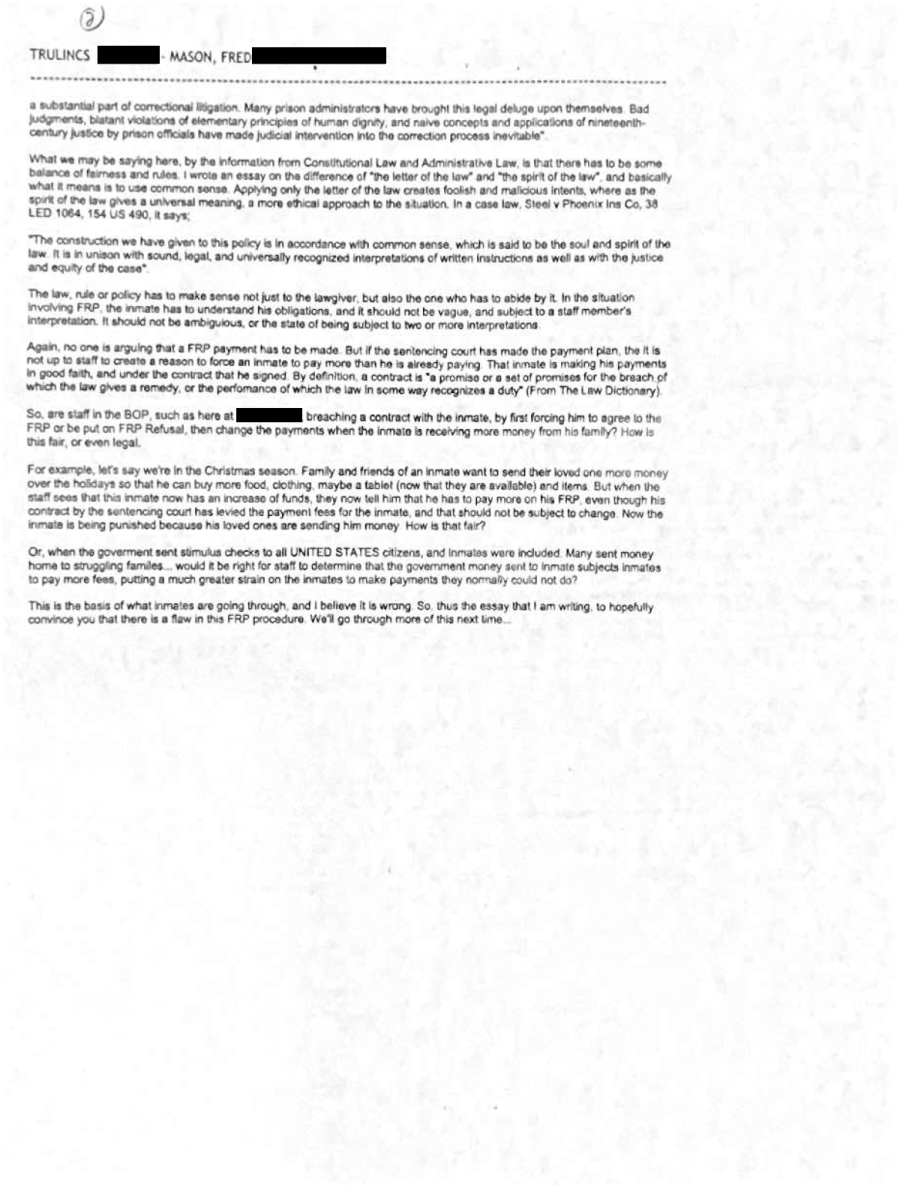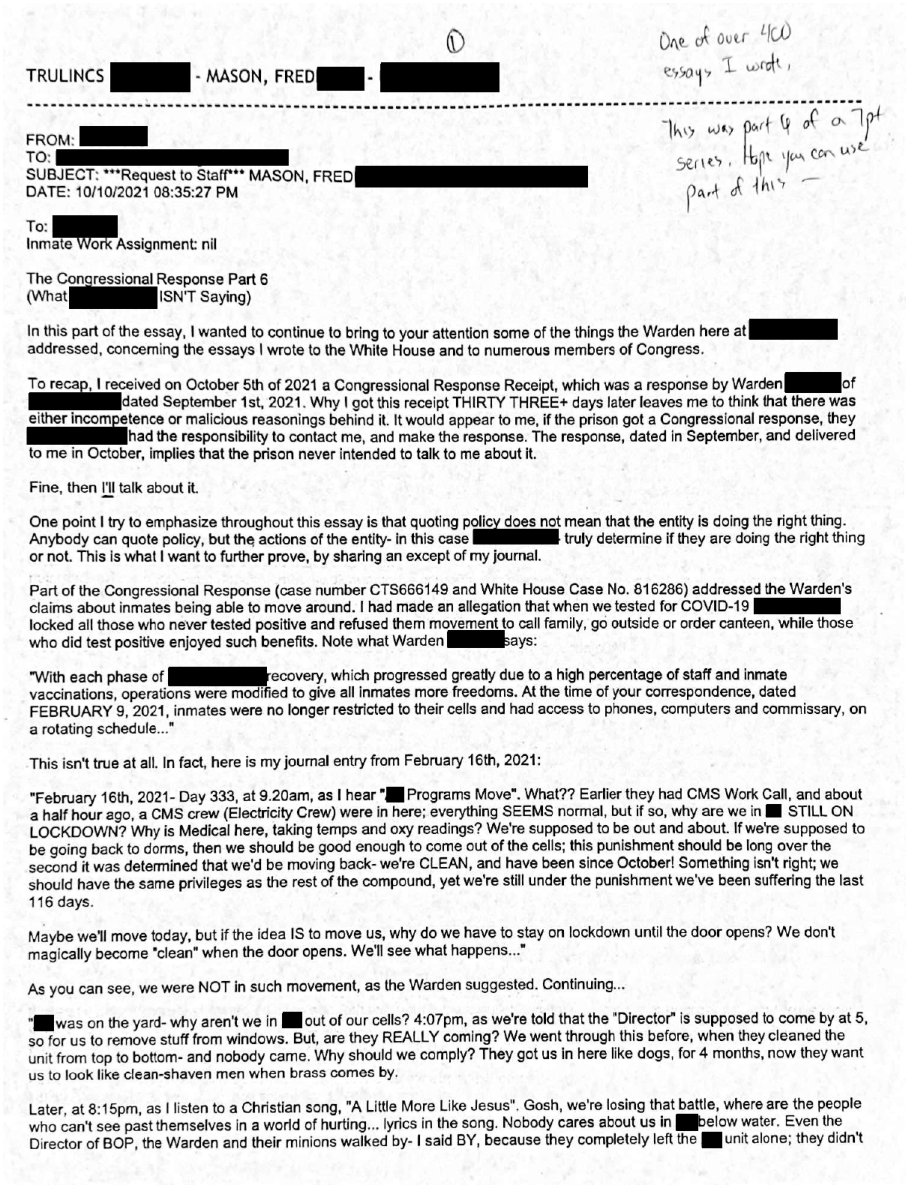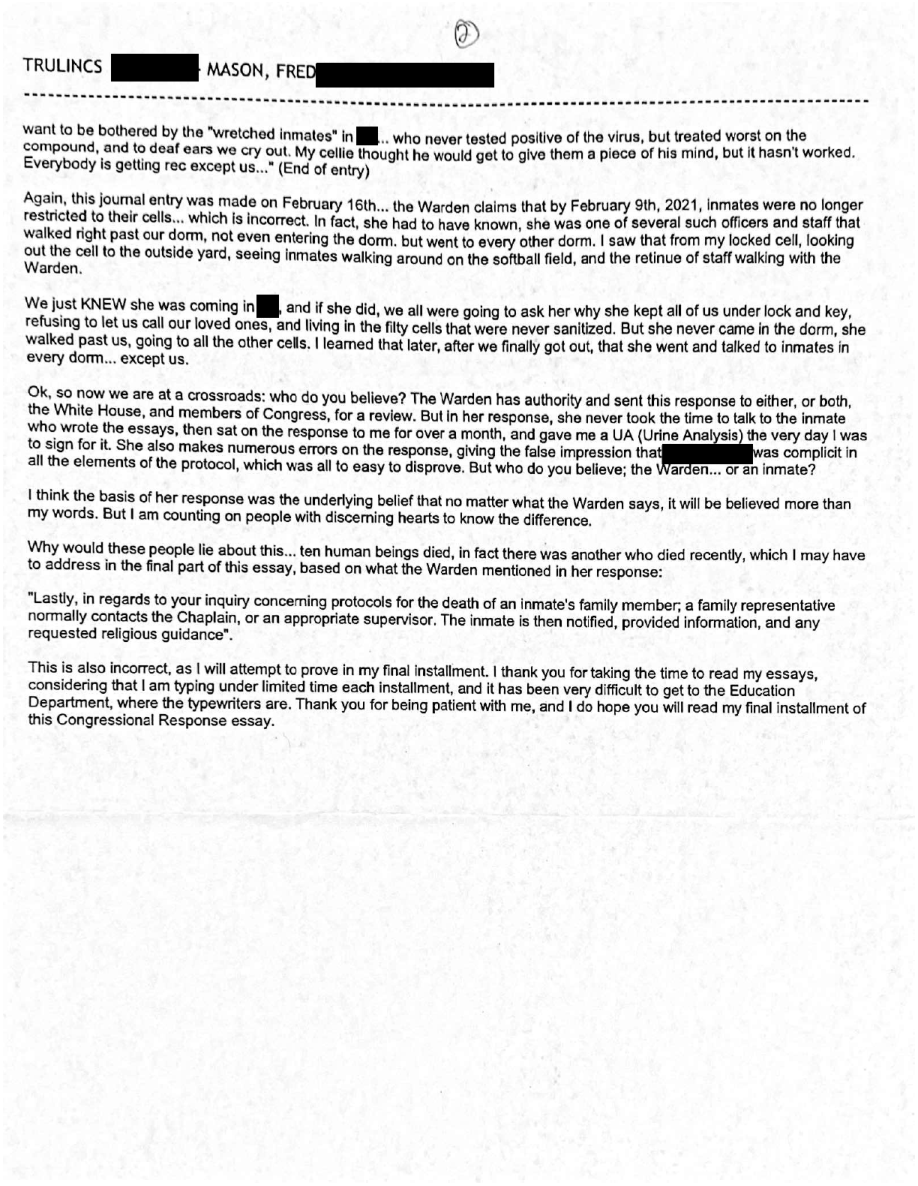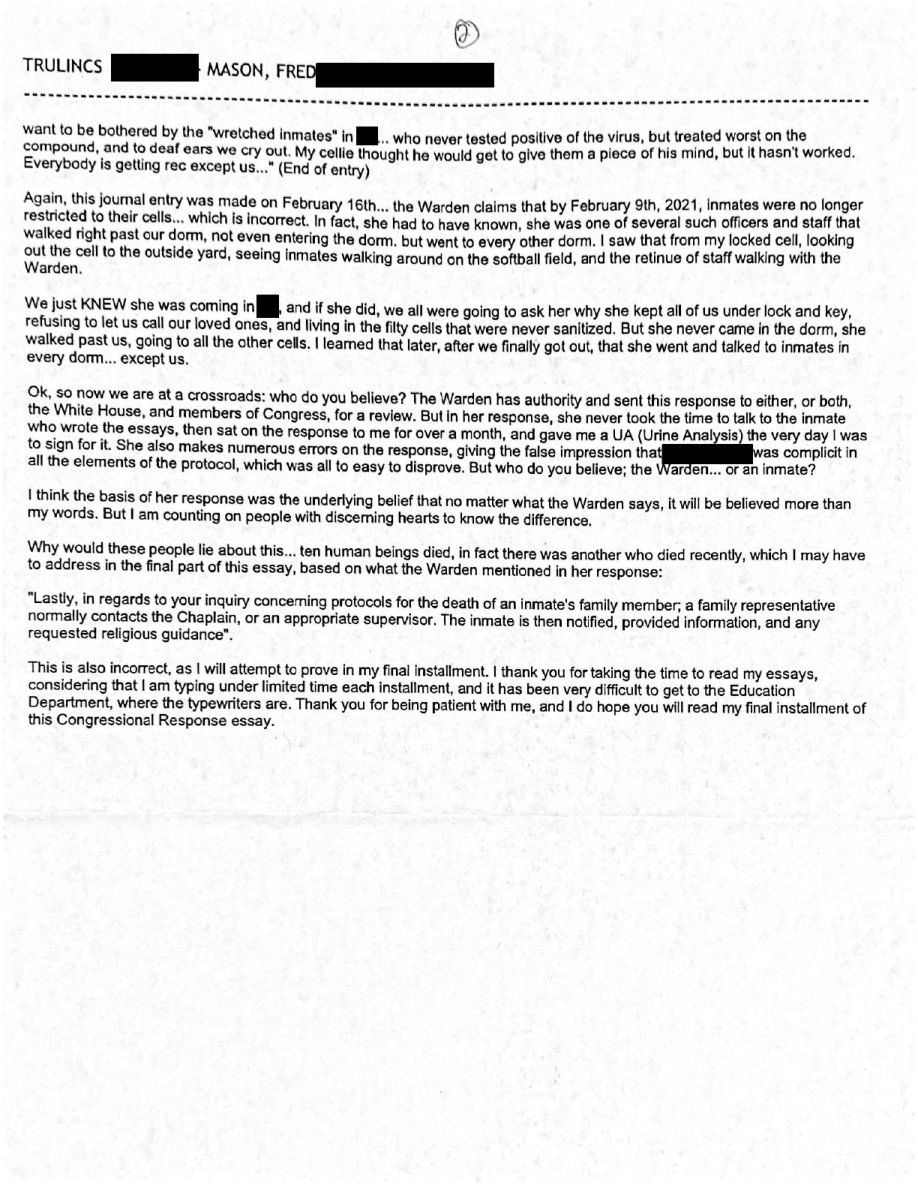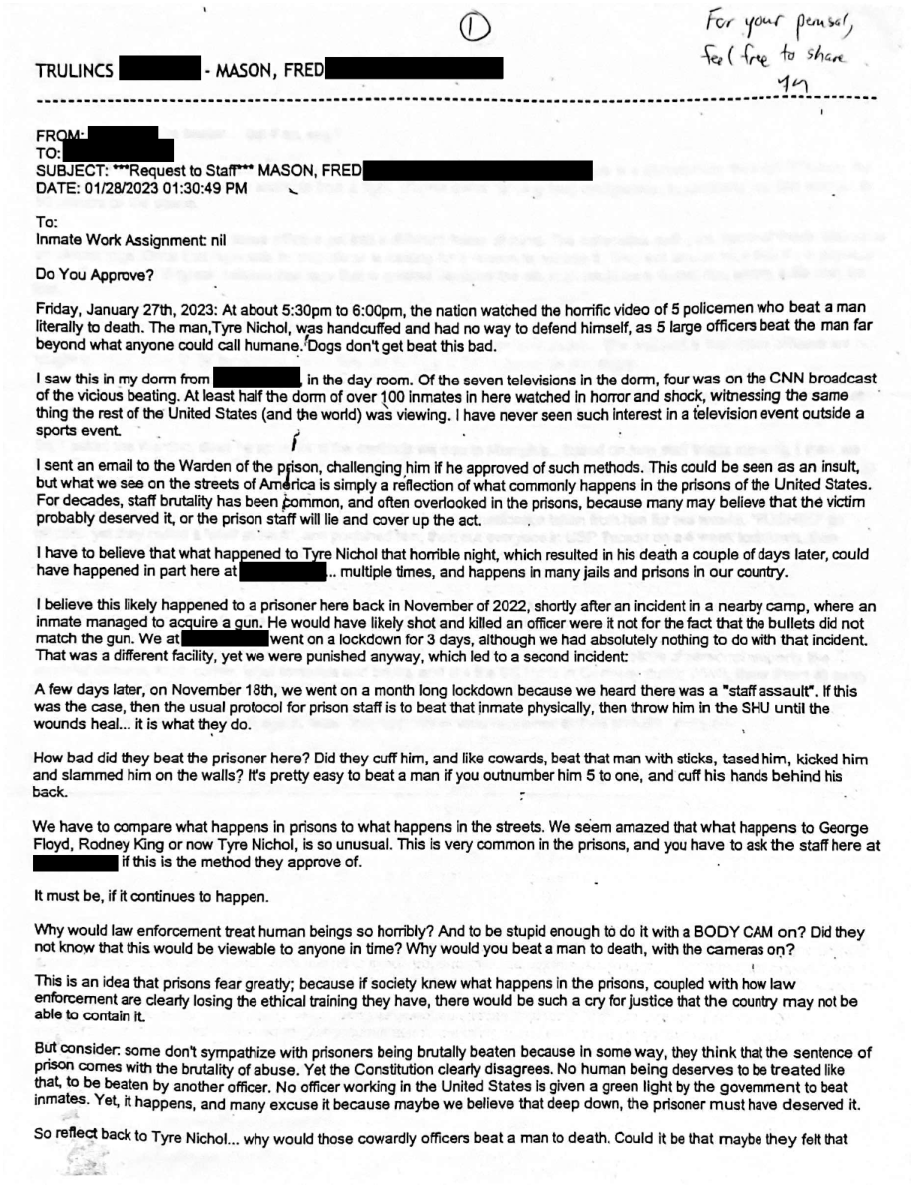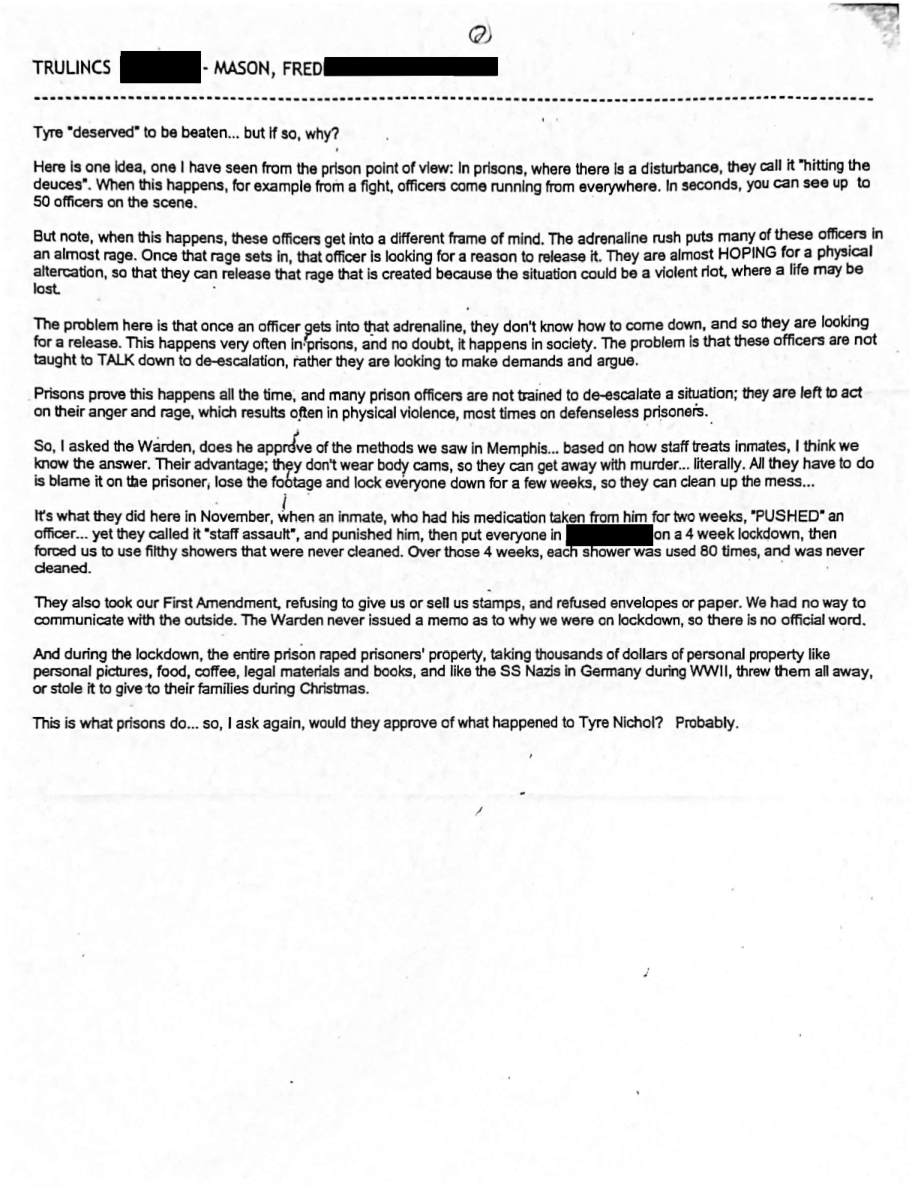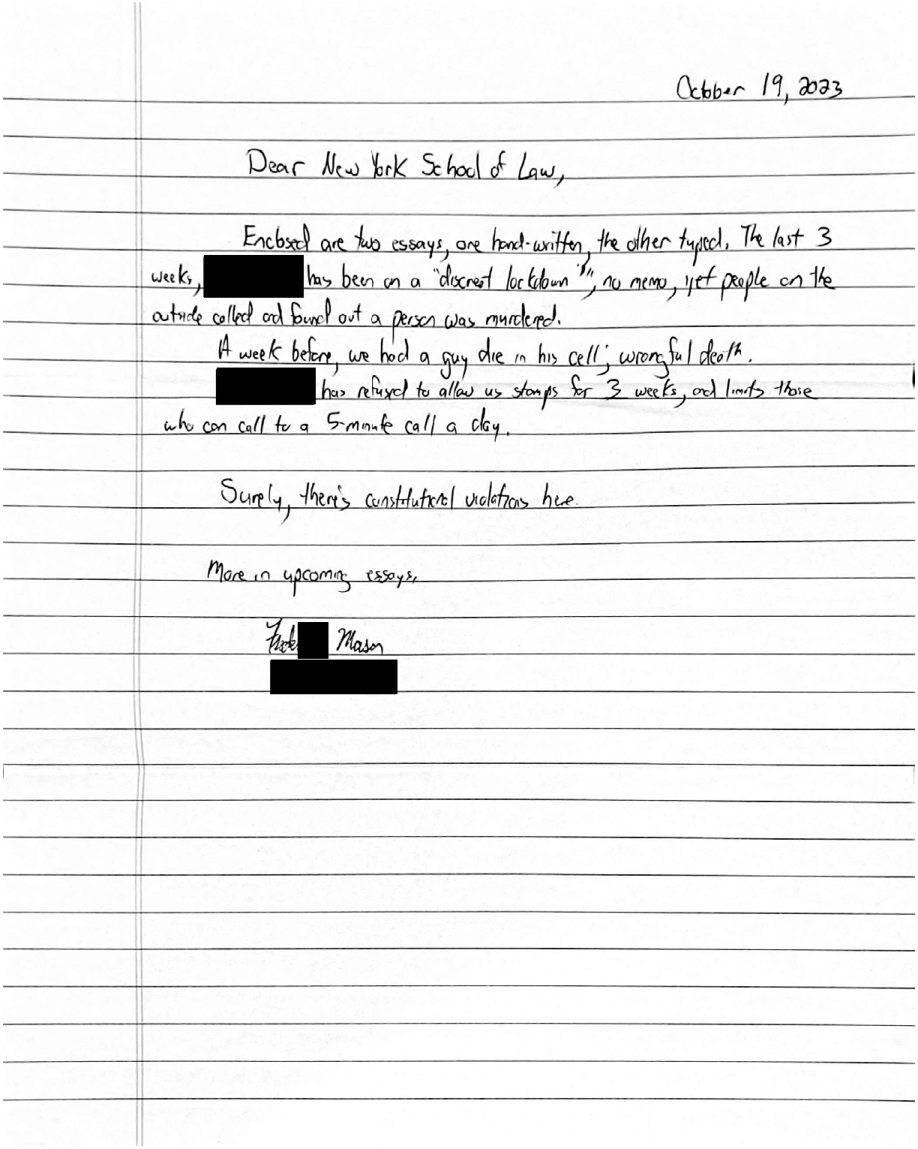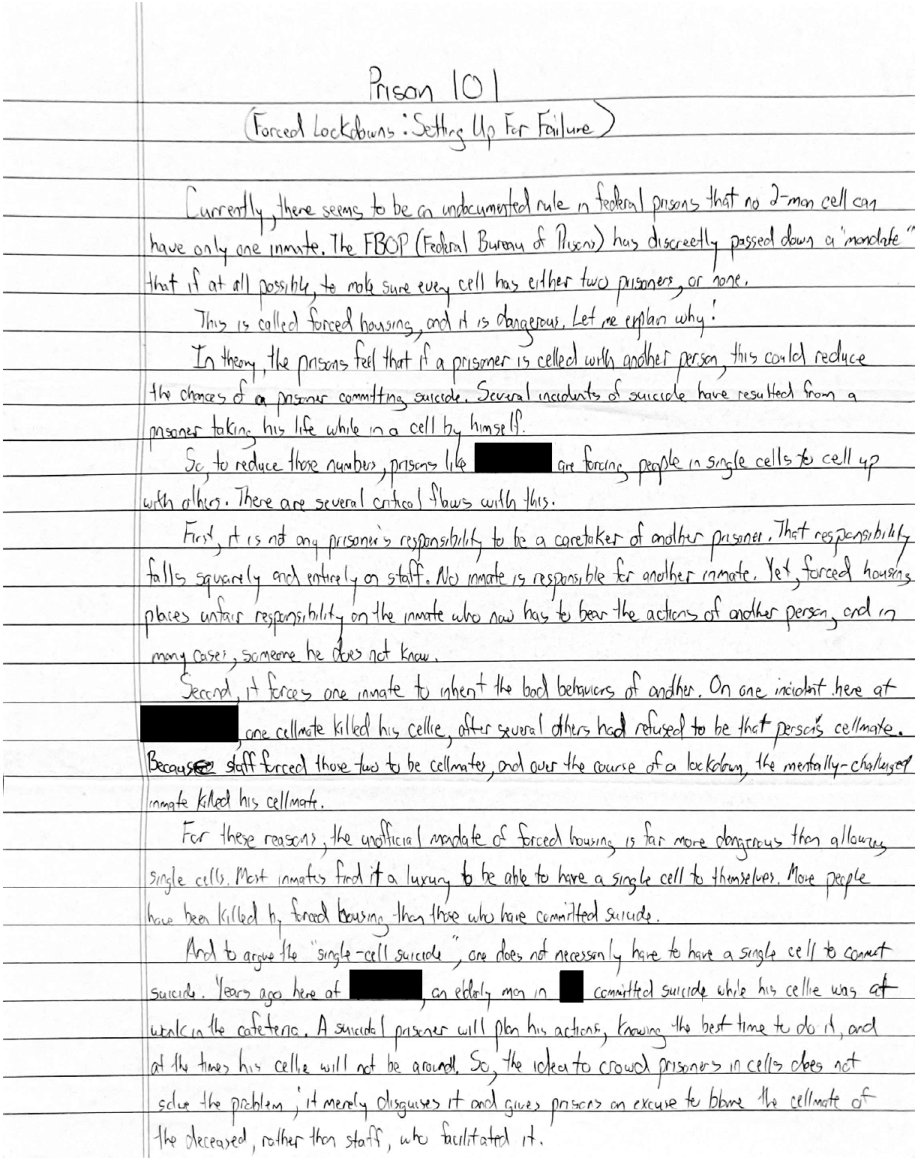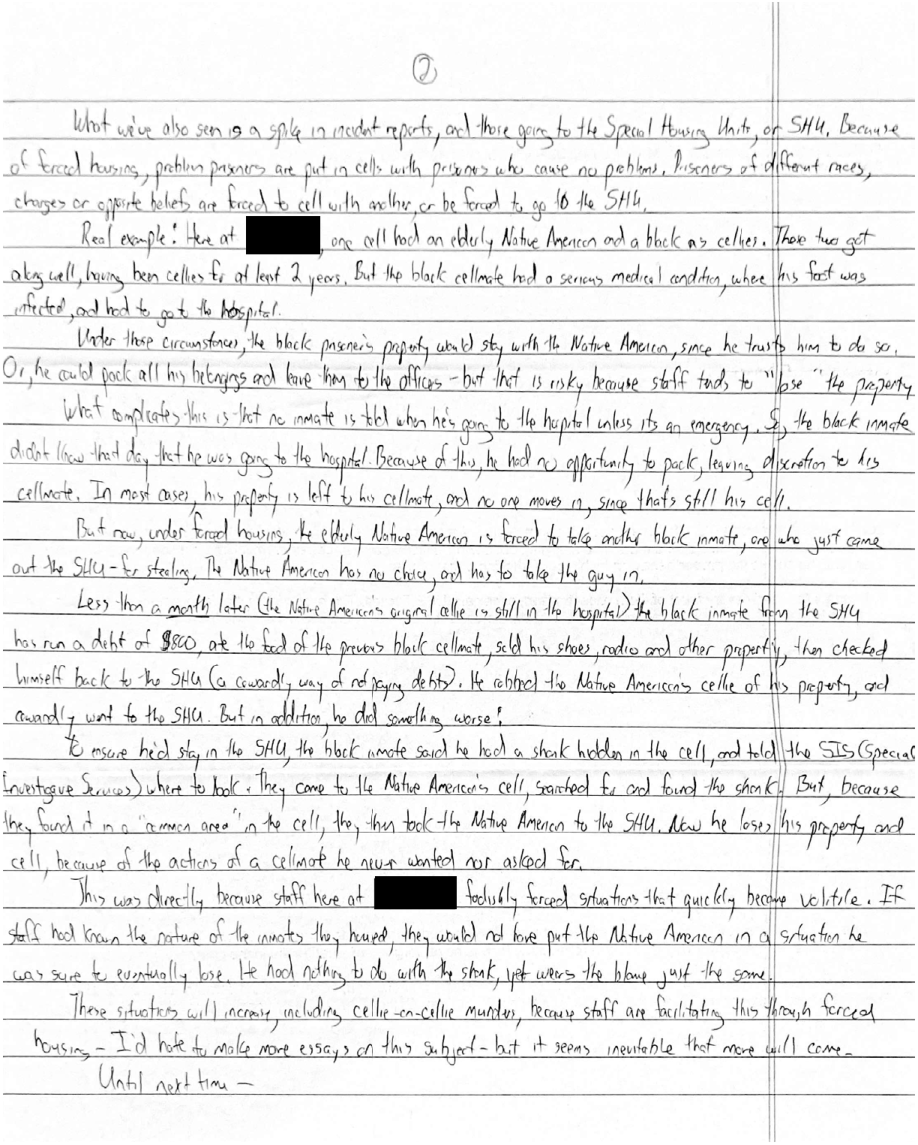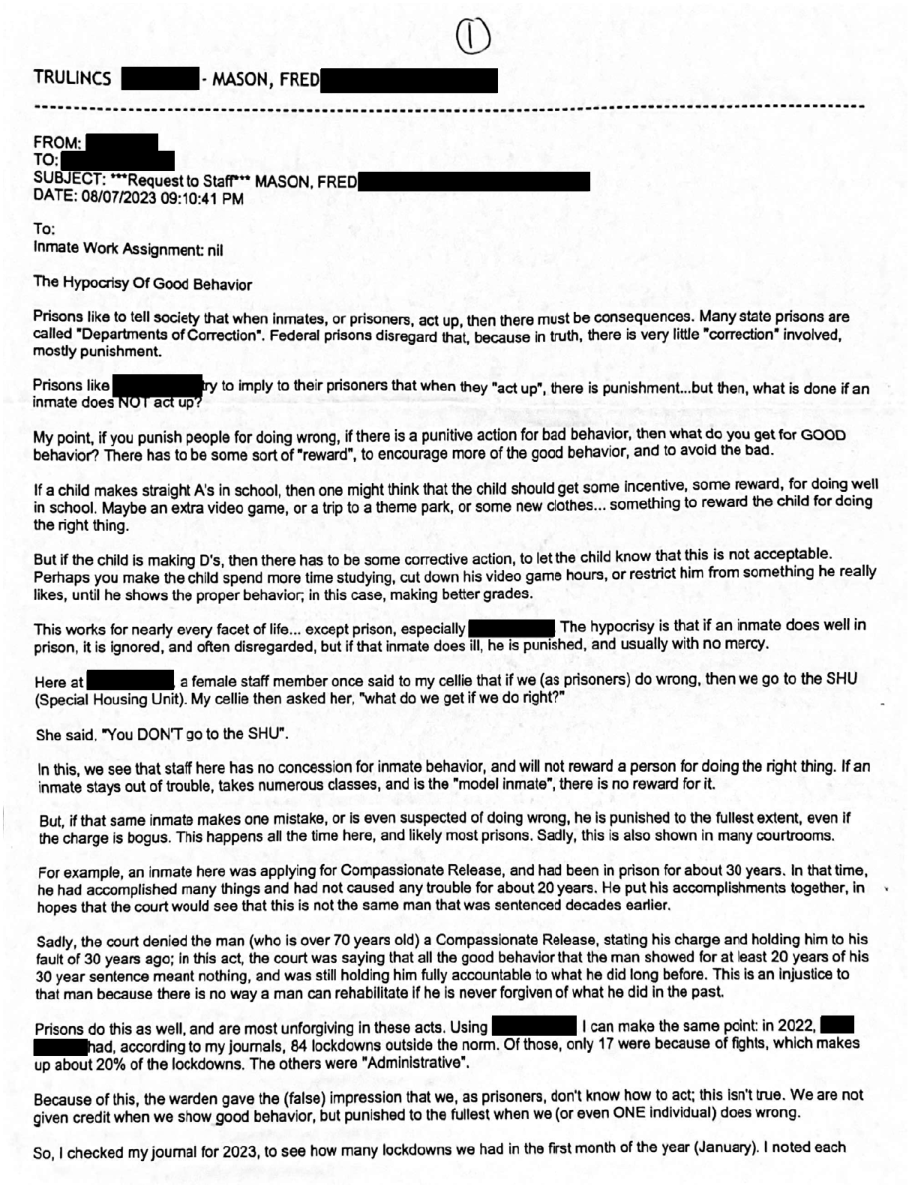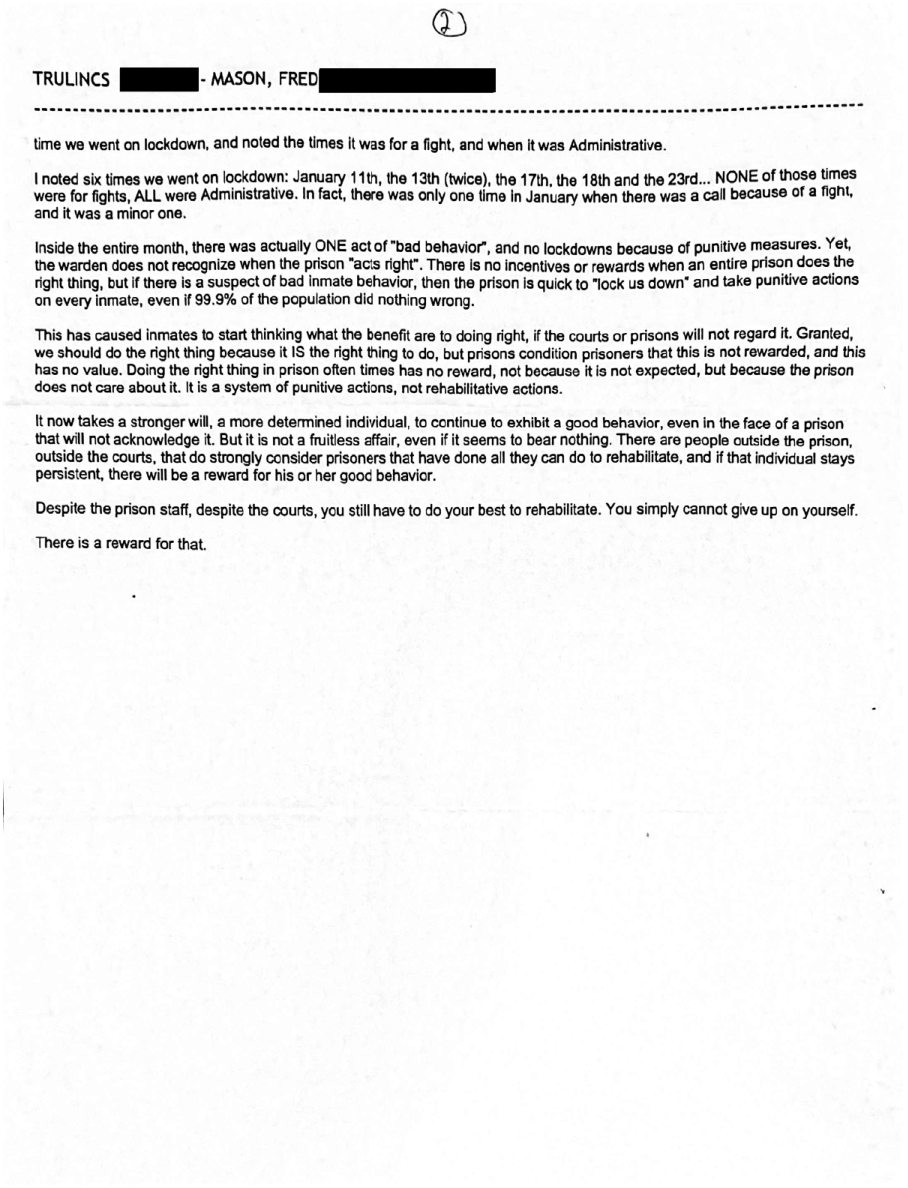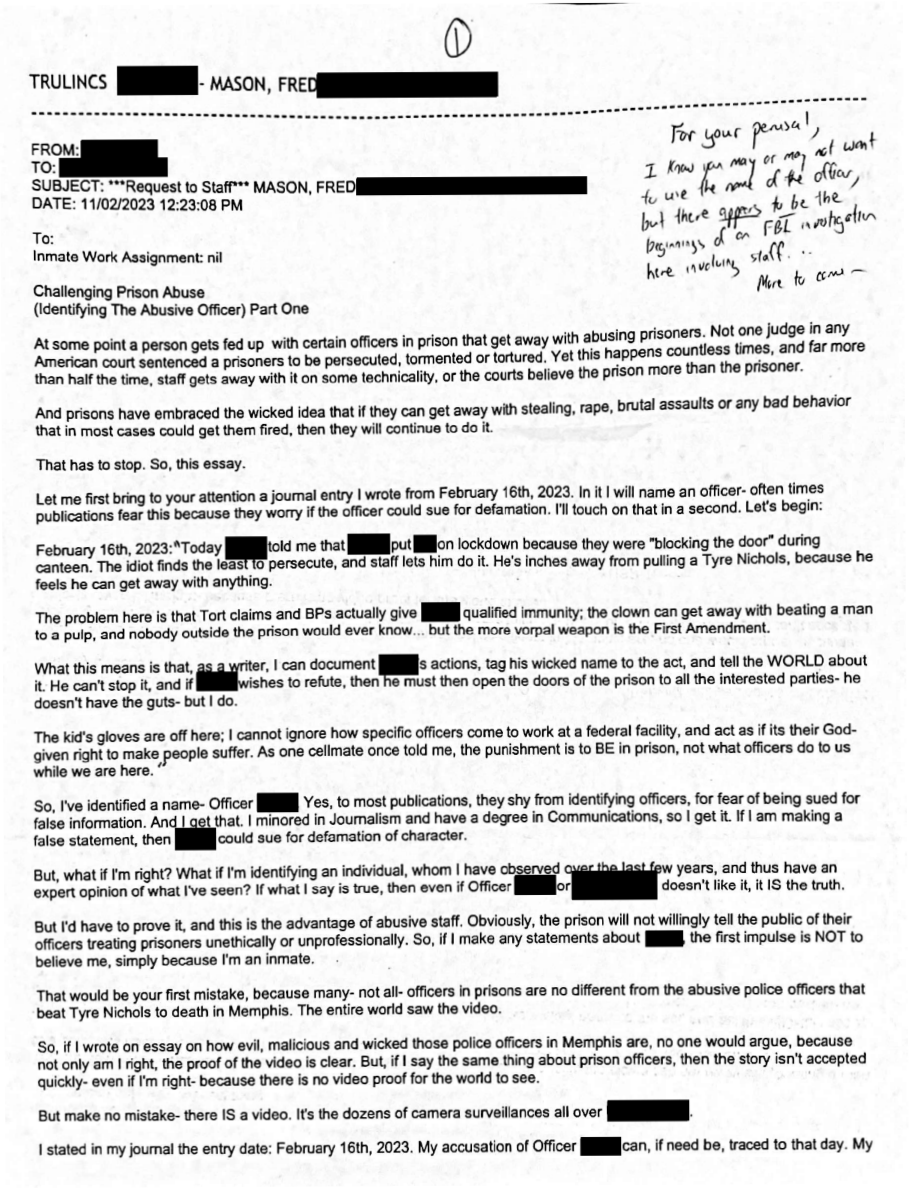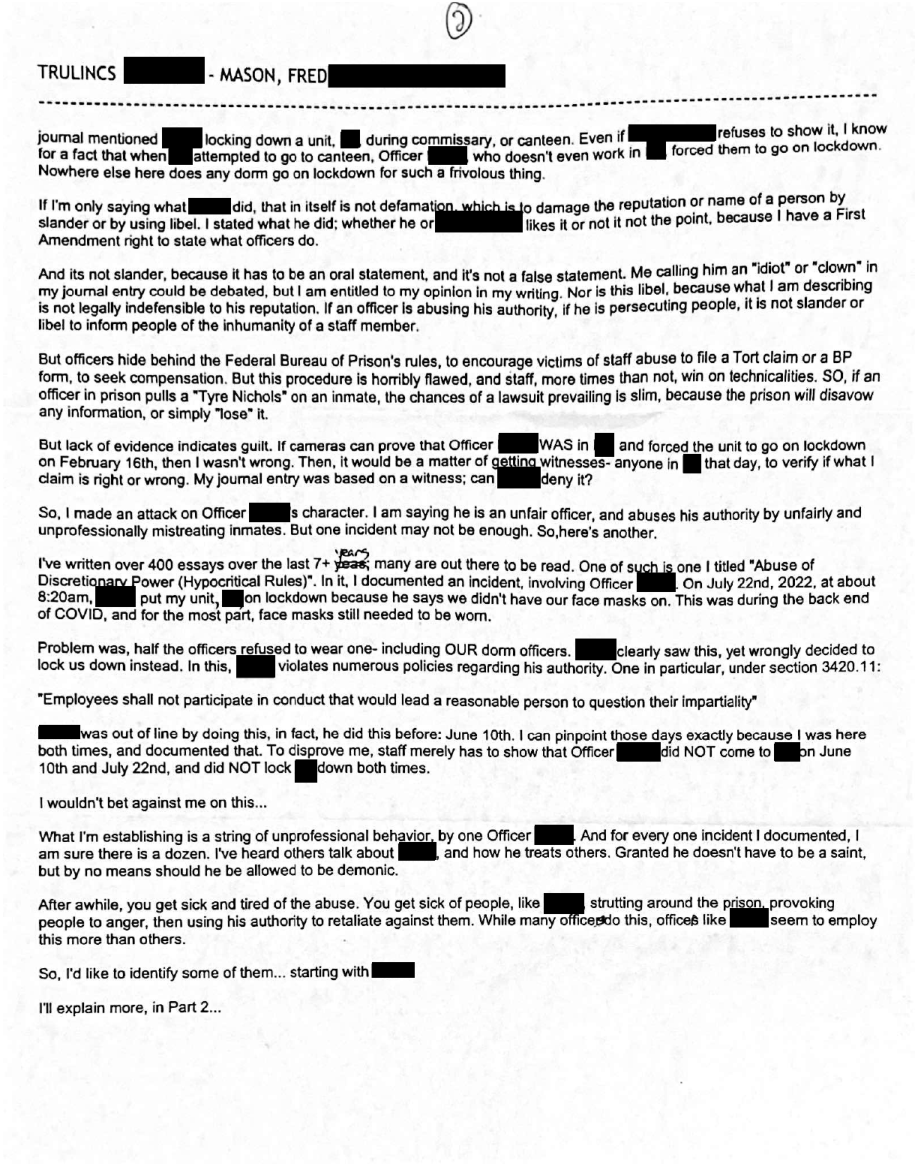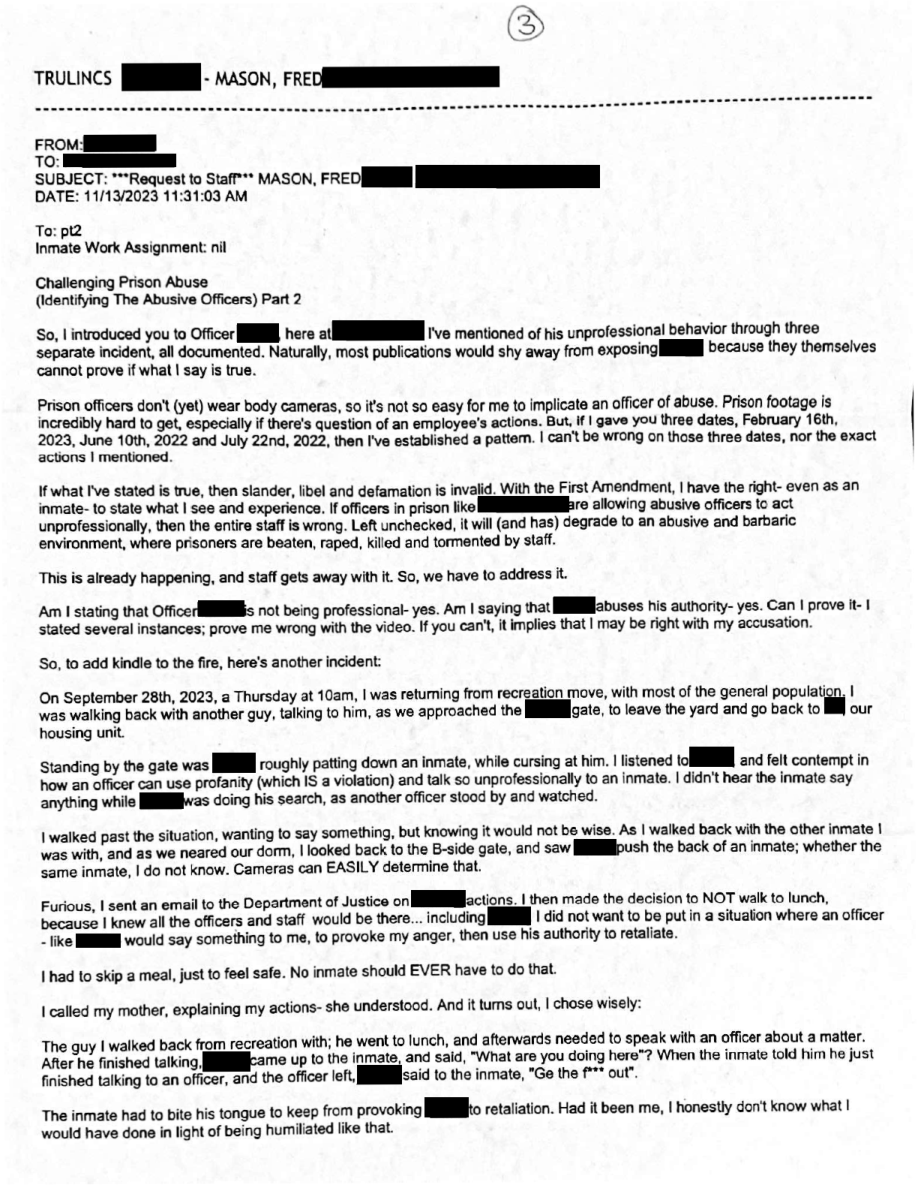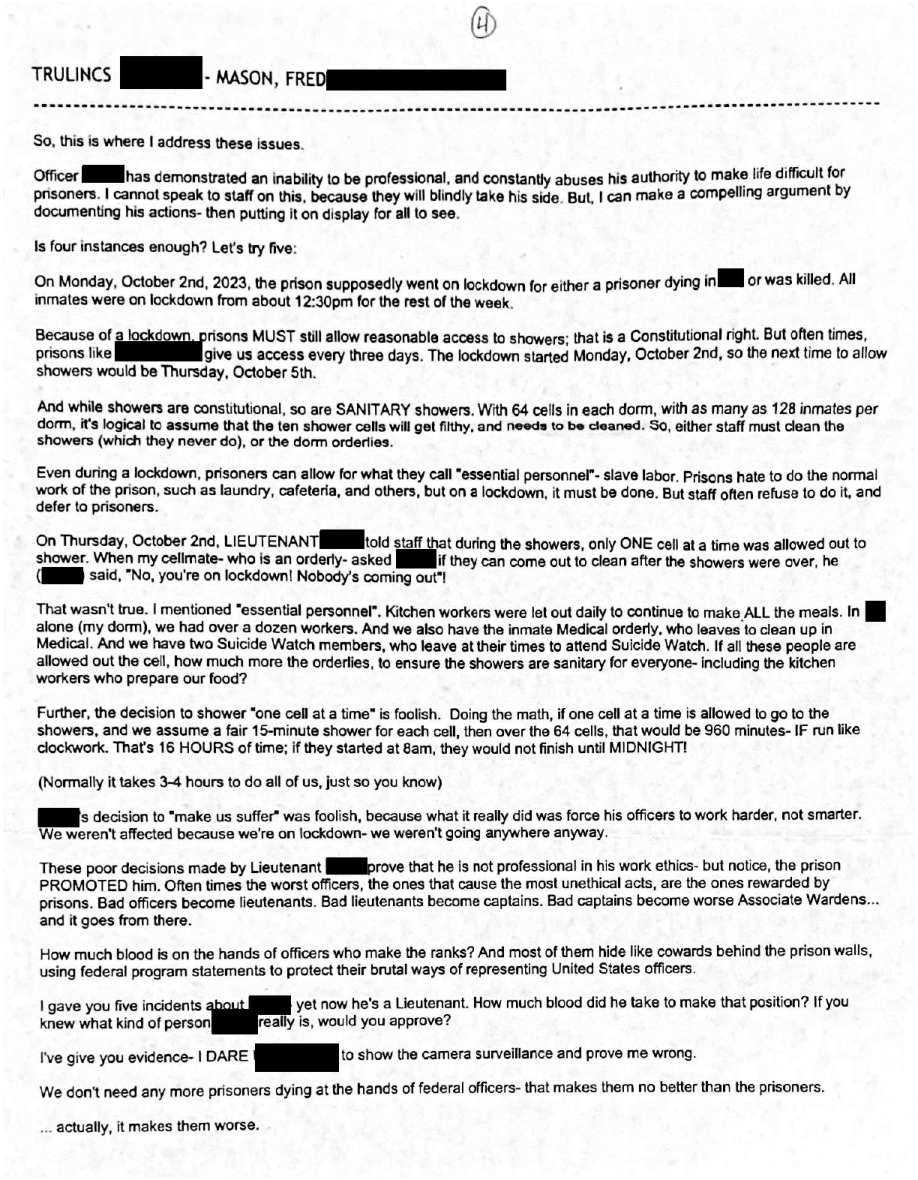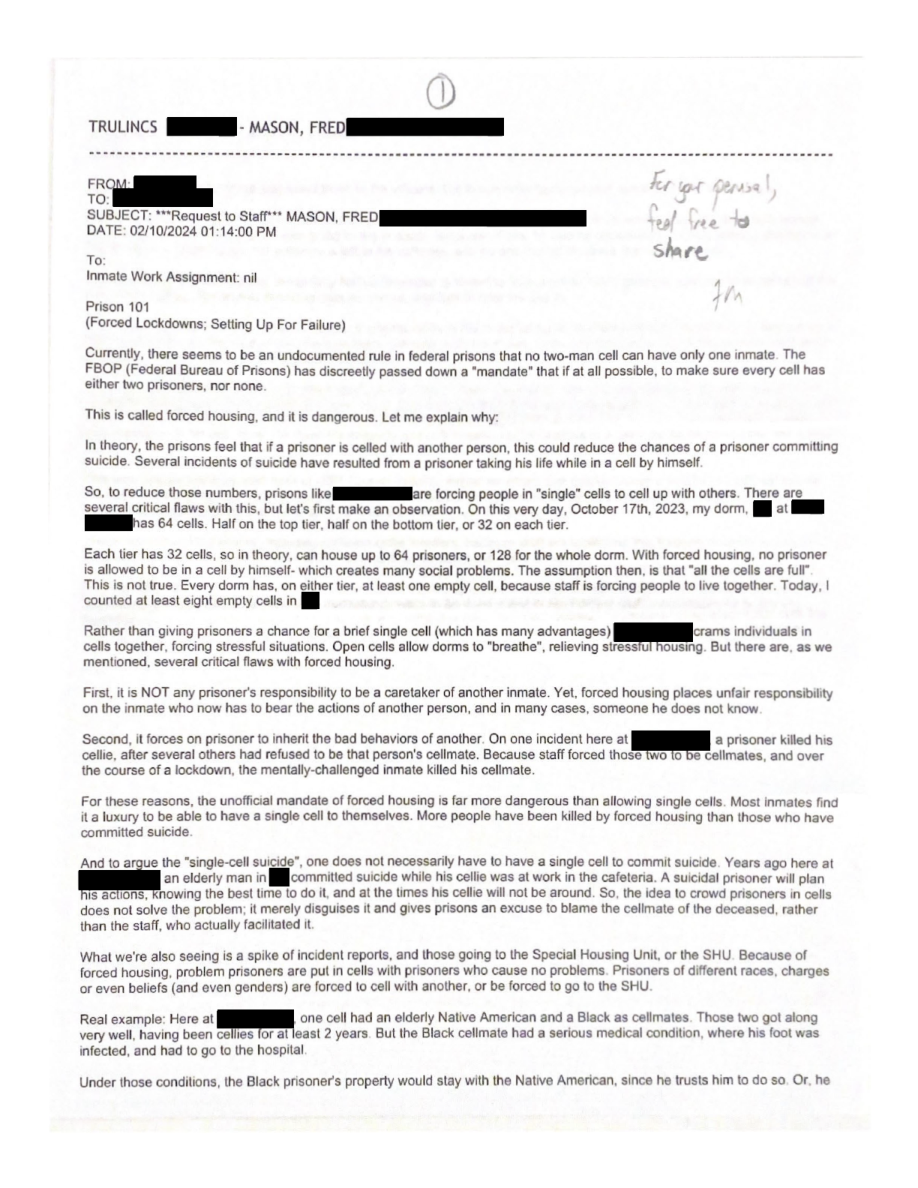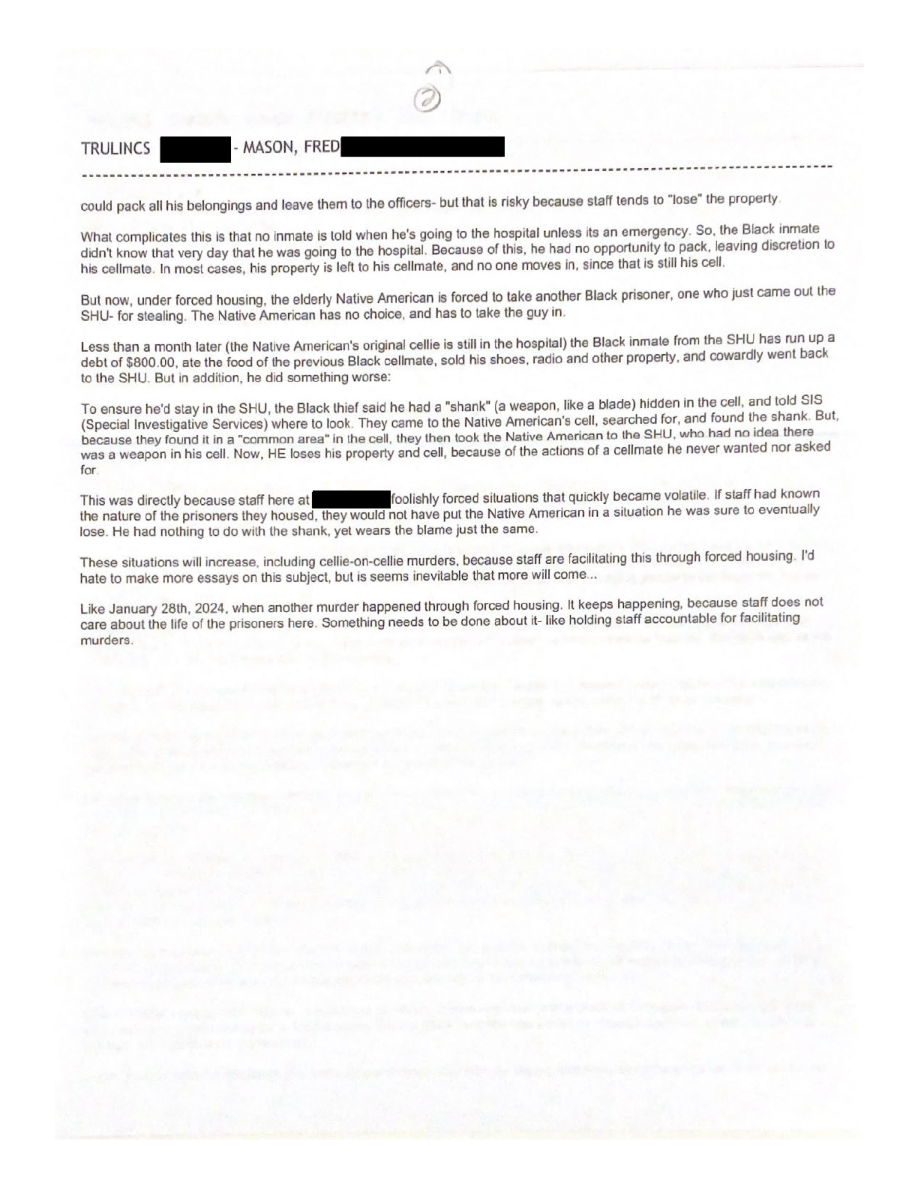Fred Mason
I wish the world could read this letter so that they could know this:- Law libraries
- Addressing class inequities
- Addressing Three Strikes
- Advocacy
- Withholding mail access and oppressive communication policies
- Legal work from the inside
- Care Work
- Being met with silence by organizations
- Mental health care
- Medical neglect
- Addressing Disability Issues
- Addressing war on drugs
- Lack of outside recreation
- Retaliation/abuse of the disciplinary system
- Inconsistent Covid care
- Addressing Racism
- Seeking a bridge/advocate between inside/out
- Price gouging
- Solitary confinement
- Inadequate law libraries and legal resources
Fred Mason
transcription
(1) For your
perusal, feel free
TRULINCS [Redacted] - MASON, FRED - [Redacted] to share
-------------------------------------------------------------------------------------------------
FROM: [Redacted]
TO: [Redacted]
SUBJECT: ***Request to Staff*** [redacted]
DATE: 08/10/2021 08:09:52 AM
To: [Redacted]
Inmate Work Assignment: nil
When Accountability Isn't Held (Part 1)
Let's start with this somber note: tonight, July 7th, 2016, 11 officers were shot in Dallas. To this point, 4 are dead. The shootings
were planned, and executed by at least 2 snipers, which, last I heard, are in custody.
The shootings took place during a protest against police officers killing two black men, one in Louisiana, the other in Minnesota.
From evidence and video, it seemed the deaths were clearly unwarranted- thus the protests and outrage,
I watched with mixed emotions on the television here in the dorm, holding feelings of retribution for the lives ignorantly taken by
abusive officers- but tempered with the idea that not every officer is that wicked.
I saw the video of the officers who killed the man in Louisiana... looks like murder to me. The intent to take a person's life, for
hatred, is murder. I don't care if the guys were wearing uniforms or not. So, when I saw the reports in Dallas, the carnal,
vengeful side of me wanted to say, "Good! That's what they deserve!".
But did they? Those officers in Dallas had nothing to do with what happened in Louisiana. Yet, I was clearly in the minority. Most
inmates here were quite joyful that the 11 police officers were shot, and 4 are dead. But is this justification? Is this justice?
Yet, the argument is just as strong against this. Police officers simply do NOT have a right to take a man's life, especially based
on color, simply because they have the authority. Where's the justice for those killed by bad officers?
How do we deal with this? What can be done, when accountability isn't held?
This strikes home to prisons too. There are THOUSANDS of stories of prisons who abuse inmates, like here at [redacted];
some physically, some ending in death. This MUST be addressed, because we're not entering an age where the authority has
been warped in injustice. Bad authorities are developing their own set of values, to establish their own agenda, which includes
execution.
So somehow, I've got to make sense of this- not as an inmate- but as a person. I certainly cannot condone what happened
tonight, yet when is enough enough? Surely history tells us that abuse prolonged will result in revolt. You abuse a person long
enough, he WILL retaliate. You abuse a people too long, they will retaliate.
And in that retaliation maybe, to those who revolt, a sense of retribution for those innocent lives killed by officers. Does this
justify the action ... right now, I am not so sure. Will peaceful demonstrations stop police brutality? I don't know.
And let's add this too, what we're seeing isn't new at all. It's been going on for decades. We're seeing this only because we're in
the Information Age. Thirty years ago (1986) people didn't have the instant technology we have now. Police brutality was easily
covered up, because up until now, there was little to no accountability. So a bad cop COULD kill an innocent person, and get
away with it, much like how prison officers and staff can break the law against inmates, and get away with it...
After all, who's gonna believe an inmate?
After all, who's gonna believe a BLACK man or woman over a police officer?
And all the protest would mean little, because with no proof to counter a "righteous" authority, all the protests would be is just a
somber funeral march for an innocent life lost.
But today, it's different. Everybody's got a camera. Any event in public could easily be recorded by a dozen people- then put
online for the entire world to see. It's Rodney King 101.
What do we do? How can we heal? CAN we heal?
[Page 2] (2)
TRULINCS [Redacted] - MASON, FRED - [Redacted]
------------------------------------------------------------------------------------------------------------------------------------
There now is a clear indication that police officers, like prison officers, have lost the trust of the African Americans, because the
trend of innocent blacks being killed now shows a devalue of African American lives. If we can't trust officers to not abuse their
authority, and then use that very authority to take lives, how then are we expected to trust or respect them?
My fear tonight, is that this action triggers a domino effect. Tonight its Dallas. By tomorrow morning, there could be riots in Los
Angeles, Detroit, New York, Miami... and dozens of other places across the country, ironically after our Independence Day.
Again, it's Rodney King 101.
Haven't we learned anything?
Apparently not.
Well, let's look at this: look at the pattern. Public officers abuse their authority with physical violence on a helpless man, who is
African American. The footage is captured for all the world to see, and judge. Yet, the justice system shows mercy on those who
abused their authority. In an outrage, the public shows their discontent and riots, showing that the justice system was severely
lacking in accountability, and underestimated society's impatience with injustice.
That sounds about right? History has kinda proved this over and over again, yet we continue to refuse to listen. This is clear in
prisons nationwide as well, and continues on a massive scale. Yet prisons gate keep this information from getting to society,
and continue in draconian fashion to persecute, torment and even torture inmates- especially black inmates- simply because
they believe they have the right to administer such wicked practices, and believe that the government will back them and
protect them.
Sadly, this is horribly true and accurate in today's prisons. I can write hundreds of pages off [Redacted] alone. For example,
here at [Redacted], the staff allows the Education Department to continually harass and persecute black inmates. For years, a
caucasian female working in the department has been known to lie and put black inmates in the Special Housing Department
for false statements. She has also prevented black inmates from Bible Study in the library, and had gotten black inmates fired
over extremely questional means.
Yet, the prison has ALWAYS sided with her, even if they knew she was wrong. Innocent inmates were punished, and the staff,
using biased Disciplinary Officers, found the inmates always guilty ... it's the same like on the streets; officers are abusing their
authority, and no accountability is held.
So, why haven't we gotten it right? We can't be this stupid to go through this over and over again ... unless we never learned it
the first time. At some point, officers must RESPECT the authority they have, because if they don't, sooner or later, people will
get fed up, and take matters into their own hands. Simply put, enough WILL be enough.
And we don't need another Dallas situation. But, if the authorities take no accountability... eventually society will.
[Page 3] (1)
TRULINCS [redacted] - MASON, FRED - [redacted]
----------------------------------------------------------------------------------------------------------------------------------------
FROM: [redacted]
TO: [Redacted]
SUBJECT: ***Request to Staff*** [redacted]
DATE: 08/11/2021 02:51:05 PM
To: [redacted]
Inmate Work Assignment: nil
When Accountability Isn't Held (Part 2)
If you haven't read part one, you kinda need to. It helps walk you into this part, where I'm trying to make sense of 11 police
officers getting shot in Dallas, and 4 (to this point) are dead. This happened tonight (July 7th, 2016), during a protest of the
recent killings of two innocent black men by police officers.
Folks, we've reached the tipping point- the boiling point- the "enough is enough" stage of social confrontation.
As an inmate in a federal prison, how do I deal with it? I do, with all my heart, feel sorry for those officers who were shot. The
humanity in me is as strong as the day I entered the Federal prison system- regardless of how the prisons treat us.
And that is a factor. Most inmates here actually took pleasure in seeing somebody taking retribution. I'm sorry, I can't join that
folly- but inmates have a vested interested in officer abuse. Many prison staff and officers abuse inmates for maybe the same
line of logic that killer officers use. At some point, they take justice and execution into their own hands, ignoring the fact that
they are not in that position to judge- yet they do this quite often.
So, inmates here have great contempt for the authority, because prison officials can be just as brutal to inmates. Let me be
VERY clear here: yes, there are some good officers and staff; people who understand that we are people who made bad
choices, or were unfairly sentenced. They understand that not all inmates are bad people.
Yet, there are LOT of officers, like here at [Redacted], who torment inmates based on color or charge, and do so simply
because they can get away with it. An officer can beat up an inmate and get away with it- simply because he can.
In fact, he can beat an inmate up, throw him in the SHU until his wounds heal, then charge that inmate for assault on an
officer... and the DHO will go along with it 100%. He can do that ... simply because he, or she, can.
An officer can throw away an inmate's personal mail from his family- or open it up and make copies of legal documents- simply
because they can.
An officer can lie to your family and say "we tried to call him for visit, but I guess he just doesn't wanna come see you", and
torment an inmate's family- because they can.
I'm not making this up ... they DO this at federal prisons like [redacted].
They can, and do, because there's no accountability in prisons. So... what makes them any different from the police officers
who kill innocent people? The complete lack of respect is there, in both situations, and often they hide behind the authority, so
they can continue to justify such actions.
An officer can, if he wishes, put an inmate in a life-threatening situation- knowingly, and if the worst happens... so what?
Would YOU like to get a call from the prison, saying "We're sorry to tell you that your son died last night in a fight with another
inmate"...
When what they REALLY should have said was, "We're sorry to tell you that your son was killed by another inmate we knew
would try to kill him, but we read the charges of your son, and felt he didn't deserve to live. So we killed him."
Sounds rough? I know... but it's all too true. Nobody wants to believe an inmate, which is why there is little to no accountability.
Why is this? Because the authority, people that ought to respect every human life, changed the values, and made personal
decisions of the worth of certain individuals, to decide if that person ought to live or not. And if it's not about taking lives, it's
certainly the abuse of power, which only leads inmates to contempt against the authority.
[Page 4]
TRULINCS [redacted] - MASON, FRED - [redacted]
----------------------------------------------------------------------------------------------------------------------------------------
Can you blame the inmates for actually CHEERING what happened in Dallas? Mind you, I stood there, in shock and sadness
of officers shot and killed. I have FRIENDS in Law Enforcement. What if it was one of them?
But I was seething in anger at the videos of the men shot and killed by wicked officers. Anger.. rage, can drive you to change
the moral values you normally have... simply put, enough is enough. Or, on a lightly humorous line by Popeye, "I've stands all I
can stands, and I can't stands no more!"
Folks, we all have our limits; we've seen the results of what happens when some change their values, just as those officers did
as well.
In prison, it's the same. Just a couple of days ago, an inmate here was murdered... in the SHU (Special Housing Unit)- by his
cellmate.
How does the prison explain this to the next of kin? Was this something that could have been prevented, or was this the result
of prison abuse and neglect? In either case, will the prison take accountability of a loss of life, or will they wash their hands of it,
and act as if that life didn't matter.
Are they playing God?
In that case of the murdered inmate, the prison KNEW that the inmate was being put in a cell where the other inmate said "if
you put him in here, I will kill him".
The man was murdered, and the prison won't even tell anyone the officers that put that man in that cell, and sentenced him to
death. In truth, he should have never been put in a cell with another man, it's called ADMINISTRATIVE SEGREGATION, yet
federal prisons like [redacted] almost always put inmates in there with other inmates.
Said a guy that's been there...
So if places like [redacted] want to play God, here is a warning: be careful, lest the REAL God steps in to resolve the
situation. There's a scripture, Hebrews 10:31, that goes, "It is a fearful thing to fall into the hands of the Living God". Every
officer might want to remember that, not those what respect human lives, these are the ones who try to make it tolerable for
inmates, and I will say that for what it is worth, I do appreciate that. They understand mercy, compassion and fairness. We can
respect that, and under such, rehabilitation CAN happen.
But no rehabilitation can ever happen in prisons if staff and officers torment human beings- and their families. If there is no
accountability by prison officers- are they really any different from those that kill innocent people in the streets?
The Education Department here at [redacted] has countless complaints of racial discrimination by the current head of
Education. She has been personally responsible for bearing false witness on inmates to get them fired or put in the SHU, and
yet, the administration is too foolish to continue to let her get away with it, resolving to the inmate, "don't worry, the shot will be
thrown out".
But it isn't.
[Redacted] for years allowed a female Mailroom officer to illegally tamper with legal mail, throwing it away, making copies and
opening it without the presence of the inmate. If any inmate argued it, she would have them put in the SHU, under false
pretenses, and the prison allows her to do so.
[Redacted] saw a man get attacked, stabbed 5 times, and after taking him to the hospital, put him in the SHU, and charged
him with fighting, although everything from the phone call to the video showed he was attacked.
[Redacted], after an inmate died in their custody, refused to tell the inmate population of the man's Memorial Service, and
because of such, only 10 people just happened to be in the Chapel to pay their respects, when so many more, if they had know,
would have gone.
All this adds up to the prison clearly not seeing inmates as people, no different from officers who kill black men on the streets.
It's all summed up in Proverbs 29:2 "When the righteous are in authority, the people rejoice, but when a wicked man (or
[Page 5]
(3)
TRULINCS [redacted] - MASON, FRED - [redacted]
-------------------------------------------------------------------------------------------------------------------------------------
woman) rules, the people groan". (Parenthetical addition mine)
As in prison, as in society. At some point, we REALLY need to address this injustice- before it gets worse...
Or, are we already there?
Hope you enjoyed, I
gladly welcome lettrs -
Fred Mason
transcription
(1) For your perusal
and inclusion in
TRULINCS [Redacted] - MASON, FRED - [Redacted] conversation -
------------------------------------------------------------------------------------------------------------------------
I know it doesn't fit
FROM: [Redacted] the 5 steps; I just
TO: [Redacted] got the message and
SUBJECT: *** Request to Staff *** MASON, FRED [Redacted] book today, and wanted
DATE: 04/24/2021 07:16:33 PM to send something to you
as soon as I could
To: [Redacted] I have over 200 essays
Inmate Work Assignment: nil on sites, hope to share more
What Message Is [Redacted] Sending?
I want to first share a memo, posted by the Warden here at [Redacted], dated 4/7/2021. My essay is based on whether such a
memo was really necessary, and to what end would you share such a memo. I'll follow up with this after I share this with you.
For some, I may have enclosed the memo for authenticity:
[Redacted] Inmate Bulletin
[Redacted] Sentenced to Additional Year of Incarceration for Possessing Contraband
During a 2020 pat search, [Redacted] staff discovered an inmate to be in possession of tobacco and a white powdery
substance later identified to be methamphetamine. The case was referred and accepted by the US Attorney's Office and the
FBI. The [Redacted] inmate was charged with Possessing Contraband in Prison, Providing or Possessing Contraband in
Prison, and Possession of a Prohibited Object by an inmate.
In January of this year, the inmate pleaded guilty to the felony charge of Possessing Contraband in Prison. On March 22, 2021,
the [Redacted] inmate was sentenced to serve more than one year of incarceration past his previous BOP release date. The
inmate was also sentenced to an additional three years of supervised release.
All inmates should be advised that any future attempts to introduce any kind of contraband into any of the federal prisons at
[Redacted] will be investigated and prosecuted to the fullest extent of the law. The potential targets of these investigations and
prosecutions will be the inmate and any family members and/or friends involved in the introduction of contraband.
[Redacted], Complex Warden 4/7/2021
(End of memo)
Now, I want to go back and look at this with a more critical eye. First, why was this posted? It's not an "Inmate Bulletin",
because [Redacted] doesn't have one. This was a direct attack in the face of every inmate, like pushing one's face in the mud.
Let us not forget, rehabilitation is supposed to be the main purpose of the prison, outside of housing. This memo doesn't instill
good morale, only a reminder by staff that all inmates are inferior. There is nothing uplifting about this memo, and to be sure, the
prison never goes out of their way to share the positive things that inmates do.
But, let's look at the memo, it raises some questions, as most inmates who read this pointed out. An inmate was found, during a
pat search in 2020, to have tobacco...
Stop right there. Ask yourself, HOW DID THE INMATE GET THE TOBACCO?
From another inmate... or, from an officer? I say again, an OFFICER?
Here at [Redacted], many officers vape and smoke on the premises. One of the places that seems common is the outer
fences of the softball field. I know, because before the pandemic hit in March of 2020, I used to go out to watch the guys play
softball. I used to go there quite often, and sometimes while walking around the field, I would see cigarette butts on the fence.
Inmates don't buy cigarettes, so ask yourself, how did they get there? Only an officer who smokes would do that. And further, it
opens the door for carelessness or ignorance, that an officer would smoke a cigarette on federal grounds, and just drop the butt
on the sidewalk, where anyone can pick it up.
And inmates do, those who used to smoke. Can you blame them? A man who's been locked up for years, maybe a few
decades, would think it a boon to find a cigarette butt on the sidewalk, and yes, he would pick it up. Sometimes one can find
tobacco chew, spat out by officers and left on the sidewalk... often times right by the Lieutenant's office, I don't smoke, nor have
I every smoked, but I know a number of inmates who have found either chew or cigarette ends on the sidewalk.
[Page 2]
(2)
TRULINCS [Redacted] - MASON, FRED - [Redacted]
-------------------------------------------------------------------------------------------------------------------------------------
My point... who do you think the inmate GOT the tobacco from? It's not like they went to Wal-Mart to buy it.
There is also great question about the "white powdery substance". Consider, this patdown happened when? During the COVID-
19 pandemic? During that time, there was almost NO movement on the compounds. This means inmates didn't leave or come
in. Nor was there any visitation. So, even though the inmate apparently had the illegal substance, the prison failed to ask,
"where did this come from".
And if they had the answer, they certainly wasn't going to admit their fault in the ordeal.
So, what was to gain by the prison? To scare inmates to not accept drugs, while officers vape and smoke on the same
premises? How do you scare an inmate doing 40 years not to add on another year to his sentence, if he can get some tobacco?
Again, I don't smoke, nor have I ever done any drugs in my life (yeah, that's truth, go figure), but I have seen a lot of inmates
here that would do anything to get drugs. It is still a very serious problem in prisons, one that [Redacted] is completely at a
loss to correct.
So, what is the message [Redacted] is sending to inmates? I suppose the most generic is "Don't do it!", and I would agree, but
again, I say this from the perspective of an inmate that has never done drugs. But how is this rehabilitative? It seems more like
a "rubbing one's nose in it", a kind of degrading sense of superiority.
[Redacted] fails in doing the uplifting part of rehabilitation, and chose rather to simply continue to condemn. Not every inmate
here is a trouble maker, in fact, many wasn't even guilty of their charge. Many are simply average human beings that are trying
to do their best to do their time as peacefully as they can.
But it's hard to do that when the prison does not place an equal value on the inmate as they do themselves. The memo clearly
wasn't meant to help anyone, simply to reinforce the idea that "you inmates are scum", which isn't very helpful to the
rehabilitation of the inmate.
Consider, the drug, "K2" is rampant in the prison, and the compound officers are nearly oblivious to it. I remember a few months
ago, I was in my dorm, and it seemed like half the dorm was high. About 3 years ago, the prison, in their attempt to curve or
eliminate the drugs, took away every inmate's privilege of receiving cards. Every holiday, greeting or any other card that came
in was copied in black and white, and the copy was given to the inmate- and the card destroyed.
Don't let them fool you by thinking, as they claim, that the cards are held somewhere else or sent back... they're destroyed.
This was their attempt to stop drugs from entering the prison... it failed miserably, and guys like me, who never do or did drugs,
are negatively affected because I can no longer receive a colorful, beautiful card on a holiday, or birthday, or any day. All the
love our loved ones put into selecting a good card has been reduced to a cheap black and white piece of paper.
So, the prison failed, yet we continue to receive memos like this one, in a poor attempt to remind us that we are simply inmates,
and we have little to no value... while they never consider that in situations like the memo, they really need to consider what part
THEY played...
Again, who do you think brought the drugs in, during a lockdown pandemic...
Think about that...
Fred Mason
transcription
8/14/2021
Dear Jailhouse Lawyers Initiative,
Hello, my name is Fred Mason, currently incarcerated at [Redacted], in
Arizona.
I came across an article by you in the National Lawyers Guild magazine "Guild
Notes "(Vol 46, No. 1/2 Spring/Summer 2021). As an avid winter on prison
issues, I wanted to try to share some of my works.
I read your 5-step process, and thought how helpful it will be to add to
my writing, I've read numerous books on critical writing, how to make compelling
arguments and over the past 5+ years. I've written well over 200 essays. I have at
least 130 on site of American Prison Writing Archive, and many on sites like
CTA Alternatives of Cornell University, and Prison Journalism Project,
My hope is to open doors of discussion about what goes on in prisons, so that
inmates can still be seen a human beings, rather than creatures. Before this incarceration
I write online on prison issues fray 2001-2010 under the name "Nelow", I had at
least 8,000 pages online, writing on prison issues and Christian-themed essays.
I am a college graduates, with a degree in Radio/Television and studied Press
Communications with a miner in Journalism. These skills I brought into prison, to share
through logic, sympathy, faith or even human that there are good people in prisons being
severely mistreated by staff. Persecutions, torments and even torture are common in
prisons like [Redacted], but with the lack of writers, it's hard to at our side of
the story out.
And even if done, often-the prison Mailroom will illegally dispose letters incoming
or outgoing, to prevent the inmate from getting help, For example, over the last 5 years.
I have received letters from the ACLU, CURE, NAACP and other law firms.. out
of at least 50 letters, I can count about twice the mail I got through legal mail;
the rest was opened without my presence (and likely copied)- which is illegal, No telling ->
[Page 2]
(2)
how many were "lost" because it had favorable information in it.
I would like to submit two essays for your perusal; feel free to share it if you'd
like. I didn't have time to write one using your 5- steps, especially since, at the writing
of this letter, we're on lockdown for a fight in my unit. It's been a challenge to get to a
typewriter in the Law Library (all our typewriters are dated 1983) and we have no access to
word processors, and getting to the inmate copier is a story on its own.
I hope I impress a desire to share more works. I have written to, and often
receive letters, from professors at Georgetown Law (Annual Review of Criminal Procedure) quite often. They
have read-and continue to read-dozens of my works. I hope to be privileged to share more with you
soon.
Sincerely.
Fred Mason
[Redacted]
PS: As mentioned, sometimes [Redacted] illegally dumps "favorable" mail. If this may be of
concern, you may send any letters to me and my mother.
[Redacted]
Thank you
Fm.
[Page 2]
Essay #1
(1)
TRULINCS [Redacted] - MASON, FRED [Redacted]
-----------------------------------------------------------------------------------------------------------------------------------
FROM: [Redacted]
TO: [Redacted]
SUBJECT: *** Request to Staff *** MASON, FRED [Redacted]
DATE: 07/21/2021 08:23:37 AM
To: [Redacted]
Inmate Work Assignment: nil
Cause And Effect
(What Caused The Spread)
Before I begin, let me state that of course, I don't have the perfect answer- perhaps no one does- as to why the COVID-19 virus
entered [Redacted], and ended up taking 10 inmate lives. But let us not be completely ignorant that because it DID enter, and
ten people died, there has to be a reason, something to at least start the discussion on how the prison failed ten human being's
lives, and the loved ones who cared about them.
Cause and effect; what caused the virus to enter [Redacted], and who's responsibility was it? As an inmate, as one who was
here from the day it started, one who documented much of what was going on, one who suffered through the pandemic here at
[Redacted], although I never tested positive for the virus, I wanted to share at least one angle, one possibility of how the virus
got in, and killed 10 inmates.
There is a case law. if you can find it, titled Pinson v. Othan, from November 30th, 2020 (US Dist. LEXIS 224305). In this case
an inmate is arguing for [Redacted] to allow inmates to wear facemasks, called N95 masks.
Now, don't lose me here as I step to the side for a second... in the case law, the person refers to himself as "she" because the
inmate here is a transgender. Yet, a transgender is still a human being, and [Redacted] has a responsibility to take care of
every human being in the prison... something they completely failed to do.
So, the inmate filed a suit against [Redacted], to force them to give inmates the N95 masks. Let me share part of that case
law with you, with discussion afterwards:
"Pinson moves the Court to enjoin Defendants 'from refusing to supply N95 masks to all inmates in an equal fashion as the staff
at [Redacted]'. Pinson states that on October 21st, 2020, a COVID-19 outbreak was declared at [Redacted], and since then
she has observed [Redacted] staff wearing N95 masks. She further states that she is 'locked in a prison where she shares
(along with 1300 others) a ventilation system with no filtration to prevent COVID-19 from spreading' and the fact that the prison
staff have recently upgraded their masks indicate 'a sudden and serious change in the risk of COVID-19'"
Simply put, the inmate is saying that when the virus hit the compound, the staff took measures to protect themselves, but did no
such thing for the inmates. Now, let me insert a few things as well. [Redacted] was VERY WELL aware of the dangers of the
virus. About a month before it hit us, I was reading articles in the Prison Legal News about other prisons going through
devastating situations involving the virus. Surely, if I could read this out of a magazine, the BOP had to have known this would
eventually get into [Redacted], unless they were delusional incompetent.
What also needs to be added here is that I was in my dorm when the first cases hit my dorm, a few weeks after C Unit was
ground zero. The prison, under poor leadership, began moving inmates around the prison, bringing COVID-19 positive inmates
out and moving them into other dorms, while moving COVID-19 negative inmates into the very cells those positive inmates left.
Staff did little to nothing to disinfect or even clean the cells. I even overheard other officers murmur how "stupid" all this moving was.
So the argument by this inmate was simply this; "why can't we have masks?" Here we were in November of 2020, and no
inmate had masks. And those who tried to make make-shift masks were told that it was against BOP policy. In fact, the
response by the defense says this:
"Defendants assert that 'the provision of N95 respirators to inmates is not medically indicated, [is] impractical, and poses a
significant security risk to the institution".
So, during a deadly virus which has made it's way into [Redacted], these people are still preventing inmates from a safe
chance to survive the virus... mind you, ten inmates DIED. Humane consideration was thrown out for a few twists of words, to
make the argument more valid for the prison... in light of a GLOBAL PANDEMIC.
[Page 3]
(2)
TRULINCS 55487056 - MASON, FRED - Unit: TCP-B-B
---------------------------------------------------------------------------------------------------------------------------------
in fact, the court bought the side of the defense, because someone with some type of "expertise" said, as in the case law:
"The risk of exposure for staff members is higher than for prisons due to the nature of their jobs and their exposure to hundreds of prisoners"
This comes from [Redacted], who was at the time the Bureau of Prison's BOP Quality Improvement/Infection
Prevention and Control Consultant for the Western Region Health Services Medical Asset Support Team.
What the HECK is that? Who gives out stupid titles like this? And, how did all that expertise work out? Ten people DIED, and
[Redacted] has washed their hands about it.
Because [Redacted] fought against the humane thing to do, the virus continued to spread like wildfire, with a medical staff
completely incapable of dealing with the situation, and a prison who didn't care if we caught it or not; they only cared about
themselves. Consider, the threat of catching the virus wasn't from inmates ... we're locked down. The virus had to enter the
prison. Every single staff member working here, from the Warden down to the dorm officers, they all leave the prison every
single day, and go to their communities. Whether home, Wal-mart, church, the gas station, anywhere out there where the virus
is, and return to [Redacted] every single day.
You tell me, who has the greater chance of introducing a virus into the prison: staff, or inmates who are on lockdown? The
necessity of the masks was imperative, but the prison refused to allow us the decency to protect ourselves. The decision on this
case was as follows:
"Based on this evidence, Pinson cannot show that, absent an injunction for an N95 respirator, she will be exposed to irreparable
harm... DENIED".
Did I mention... ten inmates died because of this? No staff members, just inmates.
Cause and effect: [Redacted] had in their ability the chance, the choice to help inmates protect themselves during a deadly virus, one that clearly was an immense danger to everyone, especially prisons, but actively refused, using rhetoric, to "win an
argument" as opposed to simply doing the right thing. Because of that, and because of a court that was do foolishly blind to see
the humanity of the situation, [Redacted] was hit hard by the virus, and people died.
I grant you, it may not be the primary reason, but it is clearly one of them. Maybe I'll share another one soon...
[Page 4]
Essay # '
(1)
TRULINCS [Redacted] - MASON, FRED [Redacted]
----------------------------------------------------------------------------------------------------------------------------------
FROM: [Redacted]
TO: [Redacted]
SUBJECT: *** Request to Staff *** MASON, FRED[Redacted]
DATE: 07/29/2021 06:01:34 PM
To: [Redacted]
Inmate Work Assignment: nil
Prison Ethics 101
Ethic- A principle or system of right or good conduct.
Ethics- The study of the nature of morals and of moral choices.
From The American Heritage Dictionary 5th Edition
Lesson Three
"The rule is not always right" is the foundation of lesson three. In the previous two lessons, we explored if [Redacted] forcing
inmates to work during a deadly pandemic was actually unethical. Was it the right, or ethical thing to do?
Today we look at a different angle of ethics: the moral, or immoral application of a rule. Normally when we think of a rule, we
naturally assume that the rule is an accepted principle; one that most, if not all, can agree with.
But this doesn't mean the rule was created with righteous intentions. People with a different set of values could develop a rule
that challenges ethics, and indeed undermine what is ethically right or good. Let's use a real example here at [Redacted]: the
prison Mailroom Department.
By Bureau of Prisons (BOP) policy, all incoming mail is inspected for contraband, or other elements that would compromise the
prison's security. For example, this rule is created to keep someone from the outside from sending drugs, or escape plans, to
the outside. None can successfully argue against the logic of the rule, because it is of an absolute necessity, in order for the prison to maintain safety and security.
Yet, to protect inmates from staff who may misuse this rule, there are some minor exceptions, one being what is called "Legal
Mail". The United States Constitution actually protects legal mail being delivered to an inmate. To prevent some staff from prying into an inmate's legal business, the prison must, under the Constitution, receive mail posted "Legal Mail" and open it ONLY in
the presence of the inmate.
Note, this does not mean the mailroom cannot inspect the contents; it means they must do it with the inmate present, to ensure
good faith in handling their legal mail. This implies that the rules in federal and state prisons are based on simple ethics; the
discipline of doing the right thing, yet this works only if the people applying the rules are ethically sound. A good rule is only as
good as the person who adheres to it, and in contrast, a good rule can be corrupted by a person with a different interpretation.
Further, a good rule can be corrupted by a person with unethical practices, as in many cases with legal mail at [Redacted].
Legal entities are recognized by prisons such as [Redacted], by their identification on the envelope of the corresponding letter.
A law office, the Federal Courts, or organizations like the ACLU and NAACP, are nationally recognized as "Legal Mail" and
thereby treated as such. When a prison receives a legal mail, it is then their responsibility (professionally and morally) to hold
and separate such mail from regular mail, then call the inmate so that the legal mail can be opened in his presence, and quickly
checked for contraband. It is not the business of any staff member of the prison- Mailroom officers included- to read through any
legal material sent to an inmate.
The rule prevents, in theory, a prison from interfering with an inmate's legal rights. The rule is there for a reason; because
without it, a twisted form of the rule would allow a prison to mishandle an inmate's legal mail, and compromise his rights to the
courts.
But just because a rule exists doesn't mean it is followed. Again, a good rule is only as good as the person, or organization, who
adheres to it. A person could, in the case of [Redacted], pervert the existing rule to their own interpretation, thus giving them a
"loophole" to ignore the rule, and thus follow a different directive. And when this rule continues unchallenged, and then
supported by the prison, it then replaces the original rule of behavior, creating a new standard, one that in effect replaces the
ethics of the former rule.
[Page 5]
(2)
TRULINCS [Redacted] - MASON, FRED [Redacted]
------------------------------------------------------------------------------------------------------------------------------------
This substitution becomes the new rule, even if it does not pass the tests of ethical standards, because if the authority refuses
to adhere to the original rule, even if said rule is supported by ethical standards, then a corrupted rule then becomes the
established rule, allowing officers to discard the spirit of the old rule, which required and demanded fairness and right conduct,
to now be subjected to a lesser standard, allowing personal prejudices and stereotypes to take equal part in the decision-
discarding the act of simply respecting inmate mail, especially legal mail, and replacing it with a more malicious form of treatment, one that reveals itself into persecution and unfair treatment.
We will explore this belief, as it affects the inmates, in Lesson Four.
End of Lesson Three
Note: This obviously was part of a longer series. I wrote this during the COVID-19
pandemic, and managed to got a few prints, then copies. I wasn't able to get copies (yet) of
Lessons 1, 2 and 4, but because I have the handwritten originals, I can in time be able to
type and make copies of them.
FM
Fred Mason
transcription
1/27/2020
Dear JLI,
Hello my name is Fred Mason, currently on inmate of [redacted], in Arizona. I
received a pocket from you some practice modules of International Human Rights Law.
I found it very informative, and wanted to thank you for taking the time to send me
such information, I have sent to you one of over 300 essays I have written concerning
prison treatment.
I have a lot of my essays online; many are an American Prison Writing Archive,
some on Prison Journalism Project some on The Beat Within, and some at Cornell
University's CTA Alternatives Project.
It is my hope to open doors of understanding, so that there will be some level
of communication between inmates and the outside. I strongly believe the barometer for
social justice is truly measured first in has inmates are treated.
I hope my essay is informative, I get letters often from Georgetown Law, as I
have been sharing essays with them for years. I hope to do the same with you.
Fred Mason
[redacted]
[Page 2]
(1)
TRULINCS [redacted] - MASON, FRED - [redacted]
-----------------------------------------------------------------------------------------------------------
FROM: [redacted]
TO: [redacted]
SUBJECT: *** Request to Staff *** MASON, FRED [redacted]
DATE: 11/28/2021 12:05:44 PM
To: [redacted]
Inmate Work Assignment: nil
What Is The Point of Group Punishment?
Somewhere in the BOP handbook, or some made-up source of information, there seems to be a rule that it is proper
rehabilitation to punish everyone for something one or two people did. Sadly, in prisons like here at [redacted], this seems to
be too common, and I fail to see the logic, reasoning or fairness in such decisions.
This comes off the heels of a recent punishment by [redacted], to reduce- During Christmas Time- the spending limits of ALL
inmates, down to $50 every two weeks, just after coming off a $25 spending limit. Under normal circumstances, inmates were
allowed to spend up to $160 every 2 weeks, especially going into the holidays. BOP then, during such holidays such as
Thanksgiving and Christmas, increases the spending limit to $185, so that inmates can buy the things they need or want over
the holidays.
This is compounded further in that we are all going though a COVID-19 pandemic, and have been on lockdown for the better
part of the year, and including the stimulus checks that many inmates received. With these factors, it would seem to be more
sensible to allow the inmates to be able to do something to create positive morale amongst the population.
However, [redacted] seems to think that group punishment- punishing the innocent along with the guilty- is the way to teach
every inmate how to act. These actions resemble more like slave plantations, where there is no true justice in the prisons
because it is just easier to lash every inmate, guilty or not.
This recent decision by the prison comes after an altercation at the medical pill-line, where a couple of inmates got into a fight.
After the altercation was broken up, the prison took the inmates in question to the Special Housing Unit, then went to punish
every other inmate for something they had nothing to do with.
Let's look at this further, and see the lost logic the prison used, If there was an altercation, it is the prison's job to first identify the
problem, neutralize it, then remove the people in question away from the general population. If these steps are completed, then
there is no need to turn around and punish the rest of the prison for the problem that has been neutralized.
This would be the equivalent of a runaway slave being caught, then hung by the neck, then turning to the rest of the plantation
and giving 10 lashes to every other slave... to "teach them about behavior".
I make these comparisons because as inmates, we are still human beings, and if BOP expects us to go by proper behavior,
there then must also be conditions where those who do NOT cause trouble are not punished for what someone else does. The
A&O Handbook from [redacted] tells us that we are responsible for OUR OWN ACTIONS ... not the other 1300 inmates here
at [redacted]. The prison continually takes the low end, to punish those who did nothing wrong, while those who caused the
problem are removed from the general population.
Personally speaking, I am not responsible for what happened at the pill-line; neither was over 1200 other inmates. Yet, the
prison does not make a difference, yet expects us to respect the authority... perhaps there is none.
If, for example, a fight breaks out, and the prison tries to neutralize it, and does not know what caused it, or who, then they have
the right to lock down the facility to learn what may have happened. Few, if any will argue that this is proper protocol. BUT, if the
problem is identified, neutralized and removed from the population, why then does the prison turn to the rest of the population,
who was doing what was right, and slap them with punishment?
Yet, the hypocrisy is that the prison expects inmates to live under standards that most of society could never do, and yet strain
themselves at their own responsibility. Case in point, the Wednesday before Veteran's Day, the phones went out. Hundreds of
inmates complained to the staff about it, and were not given any answers. The phones came back on Thursday, very briefly,
then was off the rest of Thursday, Friday, Saturday and Sunday.
At no time did [redacted] put up a memo- which would have taken 3 minutes, for the inmate population, letting them know
[Page 3]
TRULINCS [redacted] - MASON, FRED [redacted]
----------------------------------------------------------------------------------------------------------------------------------------
what was going on, and why, during a holiday and COVID-19 pandemic, that we cannot call our families, Some officers lied to
the inmates, one saying it was "nationwide", but would not give us a memo. One staff member implied that we don't really have
a right to phones anyway.
One inmate's family called [redacted], asking why their son had not called. The prison told this inmate's mother "I don't know
why he hasn't called, all the phones are working".
Why would staff lie to our families like that, and refuse to put up a memo for the inmates to be informed? Yet, after the
altercation, the prison went all out to make a full-page color memo about the punishment for the entire compound, based on
what a few others did. Accountability is held at gun-point to inmates, but staff is immune to their own actions.
Having said all this, here we are, reduced to a $50 spending limit, before Christmas, with [redacted] with the foolish belief that
this will install correct inmate behavior. This will not, in any means, because there is no compassion in the decision of the
prison, and is unfair to every inmate who goes by the rules.
What this creates is the belief that here at [redacted], there is no reason to abide by the rules, if you will be punished for
another inmate's actions. If an inmate is here for 5 years, with no shots, no issues, and programs as the prison likes, and does
everything required, he will still be punished like the inmates who get in a fight and are taken to the SHU. So, what then is the
point of doing right, when you will be punished when someone else does wrong?
This is why group punishment does not work, it only creates a slave master/slave mentality, where the authority can get away
with any form of justice they can create. This same type of mentality is seen often in the streets, where a police officer can put
his knee on a man and kill him, and try to justify it. It is the same mentality of a group of vigilantes, who believe they can
administer justice by killing a man.
That same mentality breeds in prisons because too often, staff and officers believe that they can punish every inmate, when the
problem has already been neutralized. And the idea to do this in front of a holiday such a Christmas clearly establishes that
[redacted] never cared about the inmates. They never cared that 10 inmates died because of their incompetence, and
numerous others have serious health problems ignored by the medical department.
In high school, I was in a Spanish 101 class, and on one particular day, we had homework. Only two people did the assignment,
me and a girl named Gretchen. The teacher, upset at the class for not doing their homework, punished the entire class by
making them do busywork. I refused.
When the teacher called that to my attention, I told her, "I'm not doing it". The entire class gasped, hearing me defy the
authority. But I followed, "I don't think it's fair to punish me and Gretchen because we did our homework and no one else did".
The teacher, seeing the situation, understood that I was right... I did what I was supposed to do, and yet I am being punished for
what the rest of the class didn't do. To save face, she sent me to the library, as free time... her way of apologizing.
Prisons need to take a lesson from this. [Redacted] will not gain any respect or rehabilitation from group punishment... it just
won't work, because it is devoid of fairness and compassion. But [redacted] doesn't care about that... they only care about
punishing the slaves... inmates.
What then, is the point of group punishment ... except to torment? And to do it during the Christmas season says much about
staff here at [redacted].
Fred Mason
transcription
8/14/2022
Dear School of Law,
Thank you so very much for the information you're sharing! It is very informative,
and easy to understand. I have shared it with a few guys, and it helps them understand
the very tricky obstacle course that is Law.
Enclosed is one of a few hundred essays I've written, titled "Prison 101 (How To
Kill The First Amendment)". I have regular readers at Georgetown Law's ARCP
(Annual Review of Criminal Procedure). I've been communicating with them for years, and
they are wonderful supporters of my writing.
I hope to share more with you soon; hope my essay creates a little interest
for your group. Again, my thanks -
Sincerely,
Fred Mason
[Redacted]
[Page 2]
Prison 101
(How To Kill The First Amendment)
"When the prison gates slam behind an inmate, he does not lose his human quality; his mind
does not become closed to ideas; his intellect does not cease to feed on a free and open interchange of
opinions; his yearning for self-respect does not end; nor is his quest for self-realization concluded. If
anything, the needs for identity and self respect are more compelling in the dehumanizing prison
environment.". --Justice Thurgood Marshall
Society knows so little of how prisons like [Redacted] aggressively prevent inmates from
talking about what prison officers and staff do to inmates. I have written hundreds of essays addressing
how staff often persecute, torment and even torture inmates in their "care". I am convinced that when
the levies break on what happens in American prisons, there will be an outcry for prison reforms that
stress accountability for what government employees do.
But until then, we struggle to get such information out. One reason is because prisons illegally
block inmates from speaking, which is a violation of an inmate's First Amendment; his right to free speech.
As Justice Thurgood Marshall said, inmates still have the right to free speech. He has a
right to tell the world if staff and officers are treating inmates like slaves or dogs. He has a
right to tell people if an officer beats inmates, then charges the inmate with assault. He has a right
to tell people if the Education Department is nothing but a sham, and does absolutely nothing to
educate inmates or help them rehabilitate -yet claims that they need more funding.
Inmates have the right to tell people that officers in the SHU (Special Housing Units) actually
facilitate rape incidents, they cover them up. Inmates have the right to tell those on the outside
that their Counselor is walking around the dorm with a white sheet on his head, stirring up
racial tensions.
These, and many other things like this, happen at prisons like [Redacted], but staff will
never admit to it. So guys like me write about it. But prisons have had to find creative ways
to prevent such words from getting out. One way to kill the First Amendment is a tactic they
used on me - prevention. -->
I have hundreds of essays out there, many published, as I'm also currently working on
[Page 3]
(2)
a book. I was published in about 8 consecutive publications of "The Beat Within," out of San Francisco.
They publish works from the incarcerated, and have contributors across the nation. Up until April of 2022, I
was published in this circulation.
But shortly before, I had an issue with my Counselor, [Redacted]. I told him that because the prison
(and [Redacted]) were illegally trashing BPs, I was writing an essay on it and sending copies to the White House and
"The Beat Within". And I made good on that promise.
Up until then, I had been published on about 8 consecutive issues of "The Beat Within", and had
not one, but two White House Case Numbers - meaning the White House read, and responded, to my essays.
But since April, I have not received a single letter from "The Beat Within"(as of August 9th, 2022)
and no responses from the White House. Both previous White House Receipts were hand-delivered to me, and
signed, by Counselor [Redacted], who has been absent from his duty since April, when he foolishly walked around
the dorm with a white sheet over his head...
...you think I make this stuff up? This really happened!
[Redacted] has taken a covert act, in preventing me from receiving mail from some entities, while not
informing me why I am not receiving such mail. I was told that I'm on the "Hot List", which puts me in
direct line of fire for retaliation -something I've experienced before.
Killing the First Amendment isn't just preventing me from speaking; it's also blocking, the responses and
support of those trying to communicate with me. [Redacted] will lie and say they're never received it, but
when you suddenly step getting certain mail, considering it was about abuses here at the prison, you don't have
to be a genius to figure out what's going on.
Justice Thurgood Marshall correctly exposes the issues we face; and I fully agree that I did not
lose-nor will I allow prisons to steal -my self respect, while staff and officers dehumanize us.
That makes them just as bad-or worse-than those behind the cell doors.
This is why I write - because I have a right to remain human.
[Campaign letter enclosed, redacted]
Fred Mason
transcription
(1)
For your perusal,
TRULINCS [Redacted] - MASON, FRED - [Redacted] feel free to share.
----------------------------------------------------------------------------------------------------------------------------
FROM: [Redacted]
TO: [Redacted] This is currently an
SUBJECT: *** Request to Staff *** MASON, FRED, [Redacted] 8-part series, I didn't
DATE: 06/27/2022 10:20:45 AM have pt 2 to send, hope
to share it soon
To:
Inmate Work Assignment: nil * Thanks for your info, it is
very educational
Prison 101 7m
(Exorcising the Spirit of the Law)
Part I
I want to start a new series of essays, based on the idea that often times, especially in prison disciplinary actions, there is a void
of applying the "spirit of the law" with the "letter of the law".
To discuss this, I want to first construct a scenario for you, and then slowly break down the details, and try to show you that
often times, what a prison says and does are two completely different things. So, let me first share the scenario:
Let's call the first inmate "Aaron". While here at [Redacted], Aaron gets into a fight, let's say it happened in January... timing is
important, so pay attention. Aaron, while on the phone talking to his loved ones, is attacked by another inmate, and has to
defend himself.
But because of the altercation, Aaron is taken to the SHU (Special Housing Unit) for a month, and found guilty of "fighting". In
Federal prisons, this is known as a 201 shot. Charges or violations are given certain codes, and "fighting" is a "201" shot.
Aaron, found guilty of fighting, appeals because he was defending himself... he was assaulted, which should absolve him from
fighting, since every human being has the right to defend himself. Still, the prison finds him guilty, and punishes him by
sanctioning him from commissary for 2 months.
During the period of time, Aaron has needs (hygiene, stamps, snacks) but cannot go to commissary because of the sanction.
He got in a fight in January, was found guilty of fighting in February, and now cannot go to commissary for the next two months,
which would put it at May.
But Aaron has a good friend, Danny, who is not on any restrictions. Aaron asks Danny if he (Aaron) can have his family put
money in Danny's account, so that he can go to commissary and buy some items for him. Aaron tells Danny that if he is willing
to do so, Aaron will give Danny 20% of the money put in- in this case, $100 will be put in Danny's account, so Danny will get to
keep $20.
Danny agrees, and Aaron calls his family, to put the money in his account. In March, Danny receives the money, then goes to
commissary for Aaron. But, at the same time, one of the staff members, a counselor who was currently under investigation for
unprofessional acts in the dorm, was relegated to phone monitoring, and had spent the last 2 months aggressively writing shots
for every inmate he could... he found Aaron's phone conversation, and wrote Aaron, and Danny, up for a 328, which means,
"giving money or anything of value to, or accepting money or anything of value from another inmate or any other person without
staff authorization".
Aaron and Danny appeal, arguing that the shot is too vague, and that the person who wrote the shot was acting in a retaliatory
manner. The prison does not agree. So, here's the argument: was any of the rules of punishment fairly applied to the inmates?
In this we argue the fighting shot for Aaron, as well as the "giving money" shot on both Aaron and Danny.
In addition, it is important to add in the actions of the Counselor who wrote up the 328 shot for Aaron and Danny. This is an
important segment of the essay for you to know.
Now, I realize there are a lot of elements here, kinda like a mystery drama with several plots. But work with me, there are some
very valid points I want to explore, to help you understand that many times, the punishments prisons use are devoid of the spirit
of the law.
When I say. "spirit of the law", what am I actually talking about, and why does this play a part in prison rules? Every rule has to
have a reason, a true purpose. Rules in prison are not created simply to "shoot the kneecaps". But often times, prisons will
create a rule, and go by the strict "letter of the law", and completely avoid or neglect the "spirit of the law".
[Page 2]
(2)
TRULINCS [Redacted] - MASON, FRED - [Redacted]
----------------------------------------------------------------------------------------------------------------------------------
My argument in this essay, as we unfold the scenario, is that a rule devoid of the "spirit of the law" is not a rule at all, it becomes
a weapon for prisons to simply punish with malice.
This will be extensive, I am sure this will cover several parts, so for this part, I want you to get familiar with the scenario: An
inmate gets in a fight, gets punished, and then sanctioned. Because his sanction involves loss of commissary, he gets a friend
to go to commissary for him, by putting money in his account. But the action was overheard by a Counselor, one who is under
investigation, so both inmates are charged with a violation.
Sounds cut and dry, to the novice. I want to introduce to you that this action MAY be wrong, if I can sell you a compelling
argument that the rules the prison used in that scenario are not accurate, and one-sided. Now note as well, much of what I have
shared is actually from a true occurrence; these things actually happened here at [Redacted], and I will share more on that as
we go.
As you read through this series, remember this: rules are not created to punish. They are created to establish order, yet still
maintain fairness, equality and dignity of human beings. I say this in defense of every inmate, in every prison and jail, because
too often the stereotype is that if an inmate is charged with a wrong, he OBVIOUSLY had to be guilty.
I went through this myself a few years ago. In 2017, I was falsely accused by the Education Department and SIS here at [Redacted]
of "threatening an officer" and "attempting to cause a riot" when they read my letters going out to the NAACP,
Georgetown Law and then Senator Ann Kirkpatrick. They would not let me send those letters out (which by the way, is a
violation of my First Amendment), so I wrote a new essay, exposing what they were doing.
They created a false charge, and put me in the SHU for 40 days, and "found" me guilty of trying to circulate information. None
of this was true, but when I told officers about it, they say, "well, you HAD to have done something wrong". Once I told them the
whole story, they had to change their opinion, now seeing that I was wrongly treated.
We'll get into that, and more, as we continue this series. Stay tuned.
[Page 3]
(3)
TRULINCS [Redacted] - MASON, FRED - [Redacted]
------------------------------------------------------------------------------------------------------------------------------------
FROM: [Redacted]
TO: [Redacted]
SUBJECT: *** Request to Staff *** MASON, FRED [Redacted]
DATE: 07/02/2022 02:16:42 PM
To:
Inmate Work Assignment: nil
Prison 101
(Exorcising the Spirit of the Law)
Part III
"Call me Ishmael ... "
These were the words of the classic book, "Moby Dick", the story of an irrationally challenged captain, obsessed in capturing
and killing a specific whale, as told by one of the ship hands who witnessed the chase of insanity.
Are we not all the same, those who pursue, with absolute conviction, a cause we strongly believe in? Every human being has
things they strongly believe in; whether they pursue them or not is up to them. This includes, and MUST include, inmates.
This belief is often neglected by society, and in the cracks of this, prisons have often neglected to treat inmates like human
beings. Federal prisons, like [Redacted], pull the curtain between their responsibility as federal employees and human beings,
and place a different mask on, one of malicious treatment of inmates.
Much of this is "justified' in the rules and policies they make, which are heavily tilted in the "letter of the law", and light in "the
spirit of the law". One quote I've often used in my essays is, "prisons are careful in protocols that punish, yet careless in
protocols that rehabilitate". So, I wanted to create a platform for discussion, and allow myself to possibly irrationally chase after
my "specific whale".
"Call me then, a type of Ishmael"...
In the previous part of this series, I introduced to you that when we look at the "spirit of the law", there must be implied a
universal and ethic standard- some godly principle, if you will.
We discussed the way the Nazis had rules against the Jews, and expected those victims to adhere to the letter of the law. But
when you look at the spirit of the law- the true reason- we see that their interpretation was immoral, unrighteous and, as history
reports to us, a horrible way to treat human beings.
In this, perhaps we see that when abusive, or unrighteous rules are made, the "spirit" of such rules was never intended to be
moral. We know, for example, that the Nazis never had any honest intentions of treating those victims with any humane respect.
Can we say the same with American prisons?
I gave you a quote from a case law, Southern Pacific Co. vs. Arizona (63 LED 713,249 US 472). It goes, "The reason and spirit
of the law will prevail over its letter". I'd like to apply it now to the scenario I gave you earlier, of how "Aaron" was punished for
fighting, sanctioned from commissary, but had a fellow inmate go to commissary for him by having his people put money in
"Danny's" account.
Let's unpack this slowly, and allow me to guide you through this incident. One piece at a time; first, the "fight".
The story I gave you was that Aaron was assaulted, by another inmate, and had to defend himself. But he was taken to the
SHU (Special Housing Unit), and was eventually punished for "fighting", which is a "201" shot- a high severity act.
Yet, Aaron insists he was DEFENDING himself, and thus, was not "fighting", as the punishment implies. Yet the prison insists on
the letter of the law; Aaron was in a physical alteration, so it was a fight. So, we look at the totality of the rule prohibiting fighting.
Does the rule allow an individual the right to self-defense, and if so, why should any inmate be punished for defending his life?
I used the inmate computer, and did a query of the phrase, "self-defense" of the United States Department of Justice Federal
Bureau of Prisons Program Statements. I came up with 24 hits, using "self-defense"...
[Page 4]
TRULINCS [redacted] - MASON, FRED - [Redacted]
-------------------------------------------------------------------------------------------------------------------------------------------
NONE of them pertain to any inmate.
Every single "hit" referred to a staff member, like self-defense for Chaplains, Newly Hired Correctional Employees, Specialty
Training Programs, PMB-Field Staff Training Requirements and the like. But not ONE reference to allow an inmate the right to
defend himself.
The BOP will train a Chaplain in self-defense, but it may appear that inmates have no right to defend themselves. Yet if he or
she does act in a way to defend himself or herself, that inmate is punished with "fighting", because the definition, as prisons like
[Redacted] define it- is "a physical altercation with another person".
Do you see the flaw in this? If not, let me share a true story:
A few years ago, my former cellie was on the phone, talking to his loved ones, when he was suddenly attacked by another
inmate. The inmate, let's call him "Barry" was stabbed FIVE times. He had to drop the phone, and defend himself before the
officers and staff eventually came. Barry had lost a lot of blood, and had to be taken to the nearby [Redacted] hospital before he
bled to death.
After he recovered, he returned to [Redacted], where they immediately placed him in the SHU, as punishment. I got a chance
to sit and talk to "Barry, and he told me everything.
Now, let me preface this just a bit by challenging you. Please do NOT believe that every inmate is evil, malicious, or some
"monster". I will admit, there are some characters in here, but most of these guys are ok. Barry was one of the "good ones", a
Christian guy who never caused trouble. He treated me with the greatest respect and kindness, and I will bank that against ANY
officer or staff member.
So, Barry gives me the details of the "fight". He was assaulted by his cellie, an inmate the prison forced Barry to take as a cellie,
an inmate who clearly had mental issues that were documented. Yet, staff ignored the signs.
The cellie stabbed Barry five times; he showed me the scars- one was near his eye. The entire dorm saw it, so you've got
about 100 witnesses. Even the officer working saw it, and ORIGINALLY wrote it out as an "assault". But, after Barry went to the
hospital, and came back to the prison, the Lieutenant told him to change it to a "fight".
The letter of the law was important. [Redacted] could not allow themselves to be held accountable for their incompetence, so
they shifted the blame on the victim, and punished him instead. Barry told me that when he went to the Disciplinary Hearing
Officer, she told him that he was guilty of fighting.
Barry argued, "But I was DEFENDING myself!"
The lady countered, "You put your hands up. When you did, that meant you were fighting."
So Barry was found guilty of fighting, and punished; even though the camera, witnesses and an officer clearly saw the man
assaulted while he was on the phone- and nearly died.
[Redacted] went on their interpretation of "fighting", and even changed the language of the original report to favor their
decision. The prison applied only the "letter of the law", but if I've shared this scenario as fair as I could, surely you must see
that they were devoid of the "spirit of the law".
No one will argue that fighting should not be permitted in prisons- but you cannot prevent that in such a negative and violent
environment. It's as foolish as telling a dog not to bark, It's gonna happen; you can't stop it, but you can curtail it. This is what
rules are for. But, WHEN fights happen, it is humane to allow a person the right to defend and protect his life. You cannot punish
a human being for clearly defending himself, especially when ALL evidence points to it. While the letter of the law prohibits
fights, the spirit of the law must allow, in rare occasions, a human being to protect himself.
[Redacted] was greatly in error, by first ignoring the signs of an inmate with a mental illness, and forcing him to cell with Barry,
then not protecting Barry when he was assaulted while on the phone, then changing the language against Barry, then finding
him guilty of the altered charge.
All of this was by [Redacted]'s "letter of the law", but completely devoid of the spirit.
[Page 5]
TRULINCS [Redacted] - MASON, FRED - [Redacted]
---------------------------------------------------------------------------------------------------------------------------------------
In Aaron's case, it was a near carbon-copy version. Aaron had to defend himself, or risk being maimed- or killed. Staff knew
this, but ignored his right to defend himself, and punished him for doing an act (defending himself) that every human being has
a right to do. In this, the spirit of the law was ignored, and where the spirit of the law is ignored, the law is nothing ore than a
lash to lay across the back of those in inhumane servitude.
Such appears to be Aaron. So, he is punished for defending himself. We'll get into that in the next segment. Hope to catch you
there- as I continue to "hunt whales..."
Fred Mason
transcription
(1) For your perusal,
TRULINCS [Redacted] - MASON, FRED - [Redacted] feel free to share
-------------------------------------------------------------------------------------------------------------------------------
FROM: [Redacted] FM
TO: [Redacted]
SUBJECT: *** Request to Staff *** MASON, FRED [Redacted]
DATE: 12/13/2022 10:01:30 AM
To: [Redacted]
Inmate Work Assignment: nil
Why Prisoners MUST Speak
Part 1
There's an ongoing debate as to why prisoners must have rights to the First Amendment, the right to free speech. Prisons often
suffocate prisoners from speaking about what happens in prisons, as if it is a "security" risk. While there are elements that can
pose a prison interest, most times this is not true, but prisons use flimsy excuses to prevent inmates from telling the world what
goes on. Prisons, like [Redacted], use the Las Vegas mantra, "what happens in prison, stays in prison" (even if it's illegal).
Let me share with you an example of prisons illegally suffocating a prisoner's right to tell the public what is going on:
A magazine called Labyrinth published a story about two black prisoners at a federal facility, [Redacted], who died of asthma.
Apparently, in January of 1975, a prisoner died, then in August at the same prison, another black prisoner died of asthma.
During that time, the prison ([Redacted]) had only one respirator, which was known to have been inoperative in January when
the first prisoner died. It wasn't working when the second prisoner died either.
That is negligence. The prison's incompetence cost two black prisoners their lives.
However, when the Labyrinth tried to send their magazines to [Redacted], the prison blocked it, claiming that
the article could be "detrimental to the good order and discipline" of the institution. The courts disagreed, stating that the
incidents in [Redacted], a federal facility, are newsworthy and of "great importance" (Pell v. Procunier, 417 U.S. 817, 830, n. 7.
94 S.Ct 2800, 2808 n. 7, 41 L.Ed 2d 495 (1975)).
In that incident, the necessity to report prison negligence outweighs the prison's vague idea that anything that happens in prison
are not for the public's ears. The public has a tremendous right to know that prisoners are dying in American prisons, and more
so, if those working in prisons are indirectly, or directly, responsible for it.
Prisoners must be allowed to tell society if human beings in American prisons are treated with humane dignity, or like slaves at
a plantation, or Jewish prisoners at a Concentration (and Extermination) camp. Left unchecked, this is exactly where prisons
will gravitate to.
A few years ago, I personally wrote an essay about an inmate here at [Redacted], who was murdered while in the SHU
(Special Housing Unit). I wrote that the staff KNEW that if they put the inmate in a cell with a certain inmate, that he would be
killed. And so it was...
After getting the essay out, I got a letter from a law firm representing the victim's wife. They wanted to talk to me, to get
information about the staff working at the time of the murder, because [Redacted] refused to release such information. Even
though staff was DIRECTLY responsible for a man's death, they refused to give the attorney the information, protecting the
officers that facilitated the murder.
Sadly, I did not have such intel, because while the inmate population all knew what happened, and how, most didn't know who
worked that day. An inmate who was in the SHU that period of time, however, would have known. This is not about "safety and
security"... it's about murder.
Prisoners must be able to inform the public of what goes on in prisons, because if not, then there is no counter to prison staff
brutality. Prisons like [Redacted] can toss every law over their back, and treat inmates like dogs. They can beat a prisoner,
steal their property, rape them, and no one on the outside would ever know. And, if it DID get out, the prison would suppress all
information and "defend the shield". The First Amendment allows prisoners the equalizer, to hold prisons responsible for how
they treat those under their custody.
Let's be clear; prison staff do not have the right to torment or torture inmates, then prevent society from knowing about it. But,
[Page 2]
(2)
TRULINCS 55487056 - MASON, FRED - Unit: TCP-B-B
----------------------------------------------------------------------------------------------------------------------------------------------------
unless prisoners get the word out, prisons will almost ALWAYS violate humane treatment.
Left unchecked, prisons will always gravitate to persecution, torment or torture. And there must be a level of accountability by
prisons, otherwise, there would be no fear in allowing prisoners to speak.
So, let me share another, recent example, of why it is critical for inmates (prisoners or captives) to speak. It is all too easy to
prove that if prisons prohibit inmates from writing, it gives the prison staff a green light to neglect their responsibilities.
On Friday, November 18th, [Redacted] put the entire prison population on an Institutional Lockdown, for an unknown incident.
The week prior, on November 13th, there was a "Code Red", because an inmate at a different facility acquired a GUN, and
would have shot an officer, except the gun didn't fire, because the bullets didn't match the gun...
(Now, let that marinate for a bit ... how the heck did an inmate at a federal facility acquire a GUN... and what provoked such a
person to that extreme? Shouldn't that be an issue the prison needs to look at, as far as how staff treat inmates? It is not always
just an inmate's fault... it takes two to tangle. What did the officer do to provoke a man to such an extremity of hate that he had
to get a gun... but prisons won't look at that. There are other essay on that, but that is another time.)
But, after the incident, and on Sunday, November 18th, another incident involving staff resulted in an immediate (and excessive)
30-day lockdown. All inmates were restricted to their cells (the word "all" really needs to be defined, as certain situations clearly
show that the prison did not go by their own rules) with no outside movement except to the showers every 2-3 days. But, in this,
there were numerous violations by the staff at [Redacted], most with what may be legally called "deliberate intent".
We'll go into this on the next segment. Stay tuned...
[Page 3]
(1)
TRULINCS [Redacted] - MASON, FRED - [Redacted]
----------------------------------------------------------------------------------------------------------------------------------------
FROM: [Redacted]
TO: [Redacted]
SUBJECT: *** Request to Staff *** MASON, FRED [Redacted]
DATE: 12/17/2022 08:31:00 AM
To: [Redacted]
Inmate Work Assignment: nil
Why Prisoners MUST Speak
Part 2
In part one of this series, I was attempting to make a compelling argument about the reasons why it is critical for society to hear
from prisoners. Most times people think that once a person goes into a prison, they lose all of their rights... this is often told to
society by people working in prisons.
This is a lie.
Prisoners walk into American prisons with most of their rights, to include the First Amendment, which is the Freedom of Speech.
This is critical in the prison environment, because left unchecked, it will ALWAYS result in prison abuse by staff. I might sound
extremist when I say "all", but history has clearly shown that if prisons are left to do what they want, without any check on
humane treatment, it ALWAYS gravitates to neglect and abuse of the inmates.
So, the First Amendment allows prisoners to voice their grievance, whether the prison likes it or not, to the people on the
outside who have an interest in what goes on in prisons. We did not lose the right to say what is going on in prisons, in fact,
who has a greater experience than us. Often times, courts use a "hands off" on these issues, usually delegating to the
"expertise" of prison officials. I get that, but expertise does not mean these prison officials use humanitarian elements in their
decision making.
So, I gave you a real example of a situation that happened here at [Redacted]; we were put on a lockdown on Friday
November 18 for what was identified as a "staff assault" in a separate dorm. The prison identified the perpetrator, moved him
out of general population, then turned to the rest of the prison and punished them severely, as if we all had a hand in it. This is
called Mass Punishment, and it is frowned on by many countries... yet the United States continues to use it.
I mentioned in the first part the numerous violations that [Redacted] may have committed, in what is termed "deliberate intent".
This means there was no mistaking the actions the prison took, it was intended to cause harm. Here are some of the violations:
1. The Warden never issued a memo for the official reason the prisoners were on a 30-day lockdown. If a person or people are
to be punished, he or they must know WHY they are being punished, so they can challenge it. This may very well be a violation
of their Due Process, another Constitutional right.
2. [Redacted] prevented inmates from filing a grievance, or a "BP". They simply refused to give them to inmates, and when
inmates asked for them, like in our dorm, or Counselor flatly refused. This alone, is illegal.
3. Unit Team (Unit Manager, Case Manager, Counselor) avoided all inmate questions, except legal calls or when passing out
disciplinary charges. Unit team was working the entire time we were on the lockdown, but deliberately refused to do their job,
avoiding all inmates asking for help or assistance.
4. Unit Team refused to pass out paper, envelopes or writing instruments, prohibiting prisoners from writing. Here is the
deathblow to the First Amendment. If a prisoner is refused these elements, there is no way he can communicate to the outside
world.
5. [Redacted] violated their own policy, forcing kitchen workers to work 10-12 hours a DAY, every day, to prepare and clean
the cafeteria. Inmate Medical orderlies, Laundry workers and selected inmates were forced to work, but refused to allow the
dorm orderlies to clean the showers. This implies that staff deemed certain inmates "less of a security risk" than others, even
though 99% of the prison population had nothing to do with the incident.
And let's touch on the "incident" of the "staff assault". Here is what happened, in a nut shell. [Redacted] brings from a high-
level prison an inmate that is on a high care level, with clear and documented psychological issues. He had only been on the
prison grounds less than a week, and the prison decided to take away his medication... WHY? That makes no sense! He
[Page 4] (2)
TRULINCS [Redacted] - MASON, FRED - [Redacted]
--------------------------------------------------------------------------------------------------------------------------------
obviously needed it for a reason.
So, when the prisoner was refused his medication, he got angry, and assaulted an office... that had nothing to do with the rest
of the prison population. [Redacted] brought that inmate here, then took his medication, knowing he was a high level care
inmate with psychological issues, and needed that medication. That was not our fault... it was [Redacted]'s. Ok, continuing...
6. [Redacted] never allowed prisoners a clean shower. At the point of this essay, each unit had eight shower runs the last 4
weeks. Each of the ten shower cells were used, on average, 80 times, and not once did staff allow the dorm orderlies to clean
it, and the showers were toxic each time inmates had to step in there.
7. [Redacted] prohibited the sale of stamps, nor would distribute stamps, nor would take letters without stamps. This, for 25
days, prevented inmates from any contact with the outside world. Another deathblow to the First Amendment, and obviously,
quite illegal.
This act, the one just mentioned, may be the most malicious, because unless you had stamps before November 18th, you had
no way to communicate with loved ones, an attorney, a church, the media or anyone. [Redacted] violated inmate's First
Amendment for almost a month, and ignored every request and offer to rectify the situation.
Inmates with no stamps had no way to let loved ones know that they were ok, or alive, or if [Redacted] was beating inmates,
stealing property or doing all sorts of things to them. When families and loved ones called the prison, many were told that we
were on a "COVID-19" lockdown... that is a lie. With no accountability, staff were free to be inhumane, for almost a month. This
includes a "shakedown" where the prison took easily tens of thousands of dollars worth of personal and legal property from
inmates, and threw them away... or took them to their families for Christmas.
When prisoners lose their First Amendment, when prisons like [Redacted] rob people of this protected right, it immediately
opens the door to mistreatment... it ALWAYS happens. Without fail. It is said in a case law, Thornburgh v. Abbot, that "A prison
ban on priosns sending leters that complain of internal conditions in the institution restricts the First Amendment in two ways:
one, the prisoner's right to free speech is curtailed and two, the public's right to know what is happening within the prison
system, a right that can only be fulfilled through an informed press, is restricted".
For four weeks, I didn't have the chance to tell people what [Redacted], was doing to us. For 25 days, I could not let my
mother know that I was still alive. For 25 days, I could not tell society that these federal prison staff officers had denied us
humane showers, stole property and practiced slave labor.
For 25 days, we were tortured, and nobody knew... until now.
This is why prisoners MUST write. And just wait until you read what I share after the four weeks ended, and we were finally able
to find out everything that happened around the prison...
Fred Mason
transcription
(1) For your perusal,
feel free to share.
TRULINCS [redacted] - MASON, FRED - [redacted]
----------------------------------------------------------------------------------------------------------------------------------
FROM: [redacted]
TO: [redacted]
SUBJECT: *** Request to Staff *** MASON, FRED [redacted]
DATE: 11/10/2022 12:41:49 PM
To: [redacted]
Inmate Work Assignment: nil
How To Justify Prison Abuse
"We require reassurance that the things we do and the lives we live are proper, that good reasons for our actions exist. If we
can convince ourselves that another group is inferior, immoral, or dangerous, we may feel justified in discriminating against its
members, enslaving them, or even killing them".
-Vincent N. Parrillo, excerpt from "Strangers To These Shores" (1999, 6th edition)
I have written for years about the issues in American prisons, such as the mistreatment of inmates by staff via the mailroom,
where they constantly throw away legal mail or "lose" important letters, or how inmates are mistreated in the SHU, or Special
Housing Unit, where they are put in immediate danger of their lives, and are at high risk to be raped.
These things are not new to prisons like [Redacted], and has been argued for years through grievances (BPs) or law suits.
But for the most part, these issues have been ignored by the prison, courts and general public. This does not mean the
accusations are false, it simply means it hasn't been given proper attention.
But we must ask ourselves, why? Why do we not pay attention to the horrors that happen in American prisons like [Redacted],
why are we not seeking solutions to the abuse that has happened for decades in our prisons? Perhaps one element of reason
is the angle of prejudice society, and certainly staff working in prisons, have against inmates.
I pulled a quote from Vincent N. Parrillo, who wrote on the causes of prejudice. Parrillo discusses the levels of prejudice, and
one of the levels he discusses is "self-justification". On face value, it could mean the allowance of reason by an individual,
based on personal beliefs.
Using the prison environment, and the staff involved, as well as the prison abuse that is rampant, I could try to convince you
that when prison abuse happens, staff are quick to use self-justification instead of logic and sympathy to see if a situation was
truly warranted.
For example, a few years ago, I was thrown in the SHU because I was attempting to write to a congresswoman, the NAACP
and a law school about [Redacted] refusing to allow African Americans to celebrate Black History Month. The female staff
member in the Education Department confiscated my writings and refused to let me mail them out, because she (a white staff
member) justified her actions on three levels:
One: "You don't know what you're talking about". I submit to you, this is already frustrating, because this female officer, who is
Caucasian, is telling me, a black inmate... who also was the SECRETARY of the Black History Month Committee... that I didn't
know what I was talking about... I write all the minutes; nobody knows MORE about what's going on than me.
Two: "You cannot mail multiple letters if they are the same". This is foolish; if I wanted to send a letter to a congresswoman and
the NAACP, I have a right to do that, there is nothing that prevents me from sending similar letters out.
Three: If you want to write a grievance, you have to use the Administrative Remedy Procedure" This is an outright lie, because
what she is telling me is that I have to forgo my First Amendment and attempt to resolve the issue in a VERY flawed and biased
prison system.
In each of these, the staff member attempted to justify (all incorrect and possibly illegal) her reasons for why I was not able to
send those letters out. She was aggressively preventing me from getting the word out to the public about what was going on,
she was actively attacking my right to the First Amendment, and covering up for the wrongs of prison staff.
When I argued this, and told her I would come back later to type the essays again, she created a false witness and had me put
in the SHU for "threatening an officer". I sat in the SHU for 40 days, wrongly accused, because an officer could get away with a
lie, and the staff would back it up and sign for it.
[Page 2]
(2)
TRULINCS [redacted] - MASON, FRED - [redacted]
---------------------------------------------------------------------------------------------------------------------------------
At the Disciplinary hearing, the DHO (Disciplinary Hearing Officer), also a Caucasian female, would not hear of my side, even
though cameras easily proved my incense, as well as the "loss" of numerous essays which were taken. When I questioned the
false statements from the Education staff member, the DHO officer claimed, "I just don't believe (she) would lie to me".
I was found guilty of attempting to distribute information, which took me 7 months to expunge, with simple evidence. After I got
out the SHU, I went to some officers to ask to speak to my Counselor. I explained that I had just gotten out the SHU, to which
the officers said, "what did you do".
I said to the officers, "what makes you think I was guilty?" They said, "well, you must have done SOMETHING"...
In these officers' minds, I had to have deserved whatever happened, because I was punished. Is this not a definition of self-
justification? Staff, especially here at [Redacted], are convinced that every inmate here is "a piece of trash", and are, as
Parrillo defines, "inferior, immoral and dangerous". There are fewer places to acknowledge this than in prison, where certainly
the last two elements may be common to believe. Inmates are, by nature, dangerous, and also immoral, since they, by the
courts, "broke the law". But, are they inferior? This is what staff believes, and as such, we, the inmates then qualify for the belief
that officers have, that they"may feel justified in discriminating against its members, enslaving them, or even killing them".
I cannot tell you the depths of the last accusation, because it is real. A staff member can put an inmate in direct harms, way, and
if he is killed, will justify that the inmate caused the issue, or was deserving of it. Staff can put an inmate in a cell, knowing he
will be raped, and justify it by claiming that they didn't know, or the inmate deserved it.
A few months ago, a black inmate was put in the SHU, and in an incident, was taken out the cell, and put in a torture room,
where they restrained his hands so tightly, it cut off the circulation ... and left it on for at least 2 days. The victim's cellmate said it
was three days.
The inmate lost his hands, and one of his arms, because they had to be amputated... yet staff tried to sell to the inmate
population that he "deserved" it because he was "masturbating in front of a female"...
That's not the story we got from the victim's cellmate, it was something different. But the justification is partly believed by some
of the inmates, which to me is terrible; for the inmate to believe an officer after a man lost his hands. It's like that part wasn't
important; what was more important to staff was that the inmate was brutally punished for something he "may" have done...
This is one of the issues we must face while in prison. Yes, there are inmates that need to be here, and yes, there are some
"bad guys" here. But I have seen that most are not, and many are victims of a biased court, sentence to be further punished by
staff who have used self-justification to increase the persecution, torment and torture on inmates. Until we start creating a
balance, and opposing the false reasons used to mistreat inmates, this will continue, and human beings in American prisons will
continue to be abused by staff, who use prejudice to justify their actions.
Until next time..
PS: Thanks for reading; I've over 300 other essays, and counting. The article come
from the Nov/Dec issue of News + Letters, out of Chicago-
[Page 3]
Shower or cesspool?
Tucson, Artz.-- I want to share with you something I
wrote regarding inhumane sanitation here at [Redacted].
On Feb. 7, 2022, I wrote a BP, or a grievance, on the
issue of filthy showers. As of Aug. 28, there was still no
response from staff.
I rarely write grievances, since the prison will just
ignore them, or "lose" them (which is illegal). But I had to
create a paper trail to fight for the guys.
NATIONWIDE LOCKDOWN
On Jan. 31, federal prisons went on a nationwide
lockdown because two inmates were killed in a Texas fed-
eral prison. On Feb. 2, inmates in B2 in Tucson had show-
ers in uncleaned shower cells. On Feb. 4, staff continued
to run showers, sending prisoners into filthy showers. An
officer said, "I ain't cleaning no showers!"
With 100+ inmates in B2, using nine available
showers, and over the last three shower runs,
means each available shower was used at least 30
times, with not one drop of chemicals used to clean
or disinfect it.
CDC announcements played at least three times a
day about sanitation and apparent Eighth Amendment
violations concerning "safe and humane" conditions. In
the warden's own words, "It is certainly important that
you maintain a high level of sanitation... " Why, then, has
no staff member even attempted to provide us clean and
sanitary showers especially during the pandemic?
RANCID LOCKDOWN MEALS
A lockdown does not disqualify us from sanitary
showers, but when we go on lockdown, staff goes into pu-
nitive and apathetic status. We've been fed trays with no
sporks, the milk has gone bad, or we didn't get any at all,
and the showers were horrid.
Imagine going into a shower after 29 other guys have
already used it, and not once was it cleaned. On Feb. 7, I
asked the officer if anybody was going to clean the shower.
It had been a solid week.
He didn't know. Under this lockdown, no inmate is
allowed out of their cell. Well, last week they took at least
four inmates to Medical, and we're out of the cell when we
take a shower. Or, get the officers to do it. By default, it is
their responsibility anyway.
They found a pump-spray chemical container, and set
it out near the lower tier showers, a perfect match for the
pump-spray container on the upper tier, that sat unused
all last week.
We deserve humane treatment. As long as grievances
are under the authority of the prison, they won't be prop-
erly addressed. So I have to create an essay like this one,
and share it with as many people as I can.
-Fred Mason
Fred Mason
transcription
(1)
TRULINCS [Redacted] - MASON, FRED - [Redacted]
-----------------------------------------------------------------------------------------------------
FROM: [Redacted] For your perusal,
TO: [Redacted] feel free to share_
SUBJECT: *** Request to Staff *** MASON, FRED [Redacted]
DATE: 09/10/2022 08:15:57 AM
To: [Redacted]
Inmate Work Assignment: nil
The Barometer
September 23rd, 2020, the Attorney General of Kentucky tells the American people that a black woman, Breonna Taylor, was
murdered for nothing, and that the policemen who rained bullets on her were justified, even as every bit of evidence implied that
what the officers did was wrong.
The officers get off with a gentle slap on the wrist, guilty of only essentially disturbing the neighbors- while a black woman is
dead.
We... are not evolving.
In an age where the social injustices are increasing, we are seeing more of a paradox of guilt, rather than the necessity of
mankind to clearly see what is wrong, and to summon the courage to fix it.
The nation is searching for answers to a pattern that we have made complicated. A black woman was shot multiple times by
police. She was killed by them.
But no officer is held accountable, regardless of all the evidence.
Her life, apparently, didn't matter.
The nation wonders if there is hope; if we have the ability to truly make change. It's not enough for one group to demand
change if there is opposition. Protests, while important, only encourage and stimulate a temporary surge of sympathy.
But the barometer for change isn't on the streets, nor is it in the nation's capitol. Our nation is a reflection of a collective belief; a
MAJORITY collective belief. And while public opinion is powerful, it cannot unearth the truest belief of a people. The barometer,
one of the truest measures of our ability to change social injustice, starts at the deepest roots of our country; it is measures in
how we treat the "least of the brethren".
It starts in the prisons.
The truest ability for society to overcome social injustice is to see how it is tolerated against the least (as some believe) of the
Americans. We must find the ability to have compassion for one another.
When we, as a whole, ignore torture, persecution, and torment to those that most of society think the least of, we compromise
human dignity. When we ignore opposition to human kindness on any level, when we ignore oppression, we cannot uproot it
successfully on any level. And when it comes to racial injustice and prisoner abuse, the similarities are uncannily similar.
The media and nation knows well about the injustices of Breonna Taylor, but few know of the four inmates at Doggett County
Jail, in Utah, who were tortured from May 2015-February 2017 by officers who forced them to be shocked or bitten by attack
dogs. No one listened to their pleas.
The United States knows well about George Floyd, but few Americans know about Kevin Younger, who was beaten by guards
at a Maryland Classification Center on September 19, 2013. The guards cuffed him, then beat him, and slammed his head on
the toilet, leaving him bloody and with permanent injuries. The guards beat him because they thought he assaulted an officer-
he was actually HELPING the officer. The prison tried to cover it up, and it took seven years before Younger got some justice.
Black and white Americans have learned of Eric Gardner, but few know of Dante Taylor, who, after being hog-tied, beaten and
thrown face-first down the steps at a New York prison, took his own life, having suffered from a history of depression, attempted
suicides and frequent suicidal ideation. Prison guards knew all this, but refused to help him.
[Page 2]
(2)
TRULINCS [Redacted] - MASON, FRED - [Redacted]
------------------------------------------------------------------------------------------------------------------------------------------------
For every racial injustice, there is an injustice in the prisons. The lines are quite congruent, because prison guards and staff
hold positions of authority, no different than police officers. We cannot ignore malicious treatment in the prisons, to justify theft
of a human being's dignity, and then look to the streets and be appalled when it happens on a world stage.
If we turn a blind eye and a deaf ear to the sufferings and mistreatment of American's inmates, leaving them to the dark corners
of society, to be persecuted, beaten and tortured, we then give permission to those abusive men (and women) to leave those
dark corners, and walk back into society's streets, with the same bloody hands and hatred hearts.
Is this any different from what's going on, right now, in society?
The barometer is right in front of us, right at our feet. Will we pay attention, or pay lip service?
Fred Mason
transcription
For your perusal, feel free to share -
The Hypocrisy Of Good Behavior
Fred Mason [Redacted]
Prisons like to tell society that when inmates, or prisoners, act up, then
there must be consequences. Many state prisons are called "Departments of Correction".
Federal prisons disregard that, because in truth, there is very little "correction"
involved, mostly punishment.
Prisons like [redacted] try to imply to their prisoners that when they "act up",
there is punishment... but then, what is done if an inmate does NOT "act up"?
My point, if you punish for doing wrong, if there is a punitive action for bad
behavior, then what do you get for GOOD behavior? There has to be some sort of "re-
ward", to encourage more of the good behavior, and to avoid the bad.
If a child makes straight A's in school, then one might think that the child
should get some incentive, some reward, for doing well in school. Maybe an extra
video game, or a trip to a theme park, or new clothes... something to reward the
child for doing the right thing.
But if the child is making D's, then there has to be some corrective action,
to let that chikd know that this is not acceptable. Perhaps you make the child spend
more time studying, cut down his video game hours, or restrict him from something he
really likes, until he shows the proper behavior- in this case- making better grades.
This works for nearly every facet of life... except prisons, especially [Redacted].
The hypocrisy is that if an inmate does well in prison, it is ignored, and
often disregarded, but if that inmate does ill, he is punished, and usually with
no mercy.
Here at [redacted], a female staff member once said to my cellie that if we
(as prisoners) do wrong, then we go to the SHU (Special Housing Unit). My cellie
then asked her, "what do we get if we do right"?
She said, "You DON'T go to the SHU".
In this, we see that staff here has no concession for inmate good behavior,
and will not reward a person for doing the right thing. If an inmate stays out of
trouble, takes numerous classes, and is the "model inmate", there is no reward for it.
But, if that same inmate makes one mistake, or is even suspected of doing
wrong, he is punished to the fullest extent, even if the charge is bogus. This happens
all the time, and likely most prisons. Sadly, this also is shown in many courtrooms.
For example, an inmate here was applying for Compassionate Release, and had been
in prison for about 30 years. In that time he had accomplished many things and had
not caused any trouble for about 20 years. He put his accomplishments together, in
hopes that the court would see that this is not the same man that was sentenced de-
cades earlier.
Sadly, the court denied the man (who is over 70 years old) a Compassionate
Release, stating his charge and holding him to his fault 30 years ago; in this act,
the court was saying that all the good behavior that man showed for at least 20
years of his 30 years sentence meant nothing, and was still holding him fully ac-
countable to what he did long before. This is an injustice to that man because
there is no way a man can rehabilitate if he is never forgiven of what he did in
the past.
-2-
Prisons do this as well, and are most unforgiving in these acts. Using [redacted],
I can make the same point: In 2022, [redacted] had, according to my journals,
83 lockdowns outside the norm. Of those, only 17 were because of fights, which makes
up about 20% of the lockdowns; the others were "Administrative".
Because of this, the warden gave the (false) impression that we, as prisoners,
don't know how to act; this isn't true. We are not given credit when we show good
behavior, but punished to the fullest when we (or ONE individual) does wrong.
So, I checked my journal for 2023, to see how many lockdowns we had in the first
month of the year (January). I noted each time we went on lockdown, and noted the
times it was for a fight, and when it was Administrative.
I noted 6 times we went on lockdown: January 11th, the 13th (twice), the 17th,
the 18th and the 23rd... NONE of those times were for fights, ALL were Administrative.
In fact, there was only one time in January when there was a call because of a fight,
and it was a minor one.
Inside the entire month, there was actually ONE act of "bad behavior", and no
lockdowns because of punitive measures. Yet, the warden does not recognize when the
prison "acts right". There is no incentives or rewards when an entire prison does
the right, but if there is a suspect of bad inmate behavior, then the prison is
quick to "lock us down" and take punitive actions on every inmate, even if 99.9%
of the population did nothing wrong.
This has caused inmates to start thinking what the benefit is to doing right,
if the courts or prisons will not regard it. Granted, we should do right because
it is the right thing to do, but prisons condition prisoners that this is not re-
warded, and this has no value. Doing the right thing in prison often times has no
reward, not because it is not expected, but because the prison does not care about
it; it is a system of punitive actions, not rehabilitative actions.
It now takes a stronger will, a more determined individual, to continue to
exhibit good behavior, even in the face of a prison that will not acknowledge it.
But it is not a fruitless affair, even if it seems to bear nothing. There are
people outside the prison, outside the courts, that do strongly consider prisoners
that have done all they can to rehabilitate, and if that individual stays per-
sistant, there will be a reward for his or her good behavior.
Despite the prison staff, despite the courts, you still have to do your best
to rehabilitate. You simply cannot give up on yourself:
There is a reward for that ...
Fred Mason
transcription
(1)
For your perusal,
feel free to share
TRULINCS 55487056 - MASON, FRED - Unit: TCP-B-B
-------------------------------------------------------------------------------------------------------------------------------------------
FM .
FROM: [Redacted]
TO: [Redacted]
SUBJECT: *** Request to Staff *** MASON, FRED [Redacted]
DATE: 01/27/2023 06:30:37 PM I sent this to the
warden - no response
To:
Inmate Work Assignment: nil
Do You Approve?
Friday, January 27th, 2023, just before 6pm, CNN showed to the world the events that happened in Memphis, where 5 police
officers beat a man to death.
I have never seen so many guys in the dorm watch the televisions of the same event, outside a sports event, as a brutal assault
on an individual by five officers culminated in the death of that man, as he cried out to his mother for help he would never give,
as "law enforcement" disregarded their ethical duties, and practically murdered that man.
This needs to be addressed not just on the streets, but also in the prisons, because this happens. I have been on the end of
retaliation before, and we know it is common in prisons, especially here at [Redacted]. And, after coming off what, in my
STRONG opinion, was a malicious lockdown that 99.9% of the prison had nothing to do with, there is a need for critical thinking
of how people are being treated by law enforcement... which includes prison staff.
I can't help but think that the individual that pushed an officer on November 18th could easily have been treated that way. I can
imagine the man was cuffed behind the back, as numerous officers took cheap shots at him, very likely breaking bones, but
without a doubt, causing serious harm.
And, for what? And for whatever reason, do you approve?
There is a growing need to address the brutal assault on individuals when we compare that the streets of Memphis are not
much different from the dorms at [Redacted]. I looked with great disgust with what happened, as did nearly every person in my
dorm, and likely every inmate here at [Redacted], and every inmate in the FBOP, and every citizen of the United States.
But, apparently, not everyone would feel that way. Some would approve of such grotesque forms of "justice".
There will be shockwaves immediately based on the video we have all seen; only a fool would approve of this, right?
Surely, no officer or staff member would say, in PUBLIC, that what happened to that poor man was justified in any way... yet
why does this happen so often? To punish people to the extreme for something clearly not worth it is not the American way, yet
it happens.
To punish us for 4 weeks for something we had nothing to do with... is this not the same thing? What was supposed to be
learned by our "punishment"? Respect for the rules or the law? What did that man learn as he was beaten, kicked, tased and
brutally beaten, with his hands behind his back, and clearly in submission?
You put a memo of a transgender meeting: isn't this of a greater importance; to close the gaps of distrust between staff and
inmates? If no attempt is made, and there has not been any, what are supposed to believe? That maybe you approve of these
methods?
I am concerned for the welfare of every inmate, even if [Redacted] does not care. I don't want to see anyone harmed, or killed,
through such a thoughtless and senseless form of brutality. But I also have a right to expect staff and officers to not be toasting
to a black man being murdered by officers (even as the officers were black).
There is no color to injustice.
Even now, as I type this, at 6:25pm, CNN is still showing the video; there is a sense of anger amongst the guys here, and
rightfully so, for an extreme refusal of acceptance that what those officers did was right in any way, shape or form... but isn't this
common in prisons?
And if so ... do you approve? Is this what happens to inmates who speak about prison injustice? Is this what happens to inmates
[Page 2]
(2)
TRULINCS [Redacted] - MASON, FRED - [Redacted]
------------------------------------------------------------------------------------------------------------------------------------------
who are suing the prison? Is this what happens when a vague "staff assault" happens in prisons? At what point do we sit down
and start holding staff and officers accountable for THEIR actions? We were raped of 4 weeks of programming, sent to filthy
showers, refused stamps, paper, envelopes and any writing instruments, then had our cells robbed of thousands of dollars
worth of personal property.
Is this any different from what we're watching on CNN now? This video is shocking to everyone, and puts a horrid taste in the
eyes of the public about our law enforcement ... but this is only a mirror of what happens in prisons. As we prepare to enter Black
History Month, and attempt to celebrate the advancements of my race, I can't help but think that even though you may consider
inmates here as "trash", because your actions from November 18th to December 12 clearly showed it, it seems that as a black
man, my value to prisons may be even less.
Would you do to us as those evil officers did to that man in Memphis... would you approve? I fear to know the answer...
Fred Mason
transcription
In Case You Didn't Get The Memo ...
By: Fred Mason [Redacted]
Today is November 30th, 202, as we are in the Christmas season -and we're on lockdown.
Now, there's a lot of questions here... and we have them too. Society has no idea how lockdowns work, and the
process the prisons -particularly [redacted] -goes through.
Now take careful note: what I am about to share is not an issue of the "safety and security" interest of the
prison. Nothing, I'm sharing compromises the security of the prison. What I am sharing is the complete disregard
of rules by staff. This goes back to a saying I've used on numerous essays: "Prisons lila [redacted] are
careful about protocols that punish inmates, but careless about protocols that rehabilitate".
What I mean by that, if it is punitive and makes our time harder, they fully commit to it. But, if there is
a Constitutional right we should have, the neglect it, or claim an innocent oversight.
So, we went on another clandestine lockdown. As I write this, we've been on a Institutional Lockdown since November
13th... yet nobody here can tell us exactly why. There has been no meno as to why all inmates in [Redacted] are being punished
with a lockdown. We never (to this point) got the memo, which is standard protocol. So, let's back up and examine the events, and
you can get an idea about why we're on this unknown lockdown, and if this is even legal.
Turn back the clock to Sunday, November 13th. As we're coming back from the cafeteria, during lunch , there was a "Code
Red as heard on the officer's hand ands. It said something about somebody having a gun... at the nearly prison camp.
We here at [Redacted] went on lockdown - although, as many of us, and even officers said, it had nothing to do with us.
Yet, we were kept on lockdown for 3 days. Again , we had nothing to do with that incident; why were we being punished?
Several guys head and saw on the local news what happened: a disgruntled inmate managed to acquire a gun (a complete
violation of every rule regarding "safely and security") and would have very likely killed an officer , but by the grace of God,
the bullets didn't match the gun, so it didn't fire.
So, in some twisted form of retaliation, the person puts us on lockdown, even though the camp where the incident took
place is at least a mile from us. Again, we had nothing to do with that situation, yet were being punished.
After three days, on a Wednesday, we're allowed some limited movement, but only inside the dorms. But it's frustrating
being punished for something we had no part in. We could not go outside; most dorms didn't get to go to canteen to get the
things they need. It was frustrating for the inmate population, nor was there any memo telling us why we were being punished,
even though the incident made the local news.
On Friday, November 18th, about 7pm, there was an incident in one of the dorms. Each form is completely separate from
another, so an incident in one dorm is separate from all others. We went back on an Institutional Lockdown that Friday for
what staff said was a "staff assault", but there's been no memo to support this. Even almost two weeks later, we had
no official word or memo as to why we're on lockdown, even though from multiple sources, it was likely some form of
a staff assault, even if exaggerated by staff.
So we're back on a lockdown, and for what we're heard, for a month. Yet there's still, as of November 30th, no
official memo as to why we're on lockdown. Additionally, few of the lockdown procedures are being folowed, Such as!
Inmate population must be informed as to why there is such an extreme and excessive punishment.
Staff have arrogantly refused to have inmate showers cleaned, meaning on average, a shower run in each form will have
about ten inmates separately using each of the ten shower cells. Over 4 shower runs, which we are currently at, each shower
cell has been used 40 times... and has not been cleaned once. Staff acknowledges an inmate's right to have a shower, but
ignores that a sanitary shower is also a Constitutional right.
(war) ->
(2)
Staff has prohibited inmates from acquiring envelopes, paper and stamps, effectively cutting off all communication
to the outside, to tell the public what is going on , or informing loved ones that they are ok-and alive. This is a clear
illegal act, in perhaps an attempt to prevent inmates from informing the public of what's going on, while also suffocating
every inmate's First Amendment rights.
The latter act has prohibited all except those who happen to have stamps from mailing. So, the prison gains an
unholy advantage over the damage control by blocking nearly all attempts to send letters out, while prohibiting anyone from
even getting postage stamps to mail.
The issue about the unsanitary showers, and the totality of the lockdown is hypocritical, because the prison has
pulled "inmate personnel" out to work in the cafeteria from 5:30 am - 5pm, essentially creating slave labor. No inmate
should be out on an Institutional Lockdown; if some are allowed out, it does not make them any less guilty of punishment
than the 99% of the rest of the compound, who equally had nothing to do with it.
But, if we weren't on lockdown; you'd already been told this... but we never get the memo.
So, in case you didn't get the memo.. neither did we.
Fred Mason
transcription
(1) Wanted to share part
of a multi - part series
TRULINCS [Redacted] - MASON, FRED [Redacted] Feel free to share -
--------------------------------------------------------------------------------------------------------------------------------------------------
FM
FROM: [Redacted]
TO: [Redacted]
SUBJECT: *** Request to Staff *** MASON, FRED [Redacted]
DATE: 10/08/2021 02:21:41 PM
To: [Redacted]
Inmate Work Assignment: nil
The Congressional Response Part 4
(What [Redacted] ISN'T Saying)
In the previous parts of this essay, I have had to put together an argument, a counter if you will, to the response from the
Warden of [Redacted] to the Congressional Response under CTS666149 and White House Number 816286. In this, as you
may have read in the previous essays, I had alleged that during the COVID-19 pandemic, inmates at [Redacted] (and every
other Federal prison) were subjected to horrid treatment by incompetence and/or malicious treatment by most of the staff and
officers. I wrote many essays sharing my experiences of this, and other issues, and mailed them out to members of Congress,
and to the White House, looking for sympathetic ears, or someone who would care more than the BOP.
Apparently someone cared, and contacted the Federal Bureau of Prisons, who in turn contacted [Redacted], to answer the
issues I presented. Now, one might ask, why didn't I address them to the Warden?
Simply... no trust. Moving on...
So let's pick up on some other issues addressed in the response. I wanted to go back to something Warden [Redacted]
mentioned in the response:
"Specifically, you allege inmates who tested negative for COVID-19 were locked in their cells and prohibited from
communicating with their families; whereas, COVID-19 positive inmates were allowed to make phone calls, go outside, and
spend $160.00 at the commissary every two weeks".
I'd like to attack that, using a journal entry I wrote on February 1st, 2021. Remember what I said in the last essay; that quoting
policy does NOT mean that it is true. The Warden is simply stating something that cannot be verified; it is almost a challenge
that a prison staff or officer can say anything and the public will believe it before they believe an inmate.
Friends... they can lie too..
So, let me share with you part of my journal; those who know my writings know that I have been sharing journal entries from as far back as
2013. In this case, I am sharing a journal entry from February 1st, 2021. At the time, I was confined to a cell in the
[Redacted] Unit at [Redacted], and with everyone else in that unit, were NOT allowed out except every 3 days, for a shower... nothing
more. The Warden makes mention of my allegation, permit me to go further, by sharing my entry:
February 1st, 2021: Day 319, a frustrating Monday. We find out AGAIN that we're not getting canteen until ... get this- FRIDAY!
WHY? Clearly there's torture going on here, regardless of what Lt. Durante says. And we had 3 test positive, so we're down to...
103. Today, the CO's were trying to rush showers, and one said, "Hurry up, you got 2 more minutes or we'll turn the water off!"
I said , as I was spraying the showers after I got done, "13,000 are dead in this state because of that attitude!" They rush us to
get showers, but won't lift a finger to disinfect the showers, which is THEIR job. So, after showers, we find out that we're not
getting canteen until Friday- we were told MONDAY!
Now, everyone is furious; this is the 3rd week we've been screwed, while everyone working here is clueless as to why [Redacted] has
been skipped for 3 weeks for canteen. People demanded the lieutenant to be called, and he comes by, "assuring" us that he
talked to Trust Fund and they will give us canteen Friday. But to be honest, I'm not buying it. Lt. Durante said he'll pass out a
memo on the canteen schedule- why wasn't this done a MONTH ago?
We've had to hear every staff member lie to us, even Psychology, as the guy in room 116 threatens to cut himself. It's pathetic
listening to her (Psychology) try to talk him down. She asks if he needs a radio- if you can get a radio, you can get canteen!.
It's incredibly frustrating. The Lt. acknowledges that we've done nothing wrong, but claims that it isn't malicious.
Are you kidding me? We've been limited to only $20, and was skipped the last 3 weeks straight! I put no faith in the memo, nor
over ->
[Page 2]
(2)
TRULINCS [Redacted] - MASON, FRED [Redacted]
-------------------------------------------------------------------------------------------------------------------------------------
do I have faith in Friday. Very discouraging day. 12:55" (End of entry)
From this entry, I was extremely frustrated that the staff kept telling us that we would get canteen, but we never got it. In that
same time, other units were going to canteen; we could see them through the window coming back with bags full of snacks,
hygiene and other items, far over the $20 limit they had put on us. We had only gone to canteen once since October, and it was
limited to only $20, then the next 3 weeks, while everyone else was going to canteen, and using the phones, and moving
around, we were stuck in the cell for 99% of the time we were on this COVID-19 modified movement.
We kept asking to staff why WE were contained in the cell, with no chance to even call family, while other units were able to
move about. No staff member could give us an honest answer. I even remember when [Redacted] became the new Warden, it
was in February when she started making rounds... except to [Redacted].
I remember that clearly because I was looking outside at other inmates on the softball field, and a contingent of staff walking
with the new Warden. We all said that if she comes in here, we would surely be able to call her and ask her why we were still
confined to the cell.
Apparently, staff must have known this too, because in her inspection, she never set foot in our unit. She skipped us, and went
to the next dorm. So we were left in the cell, with no venue to ask why we were confined in the cell.
These are the things staff won't tell you, but will gloss over the basic, claiming that if they simply quote policy, then it is true. I
allege, as she put it, that we WERE punished for not testing positive for COVID-19, because no unit was restricted more than
us; it even got so bad that some guys WANTED to get COVID, so they could get out of the unit and then be able to call family
and go to canteen.
Staff simply didn't care about our welfare, and it didn't help that they paraded every staff member through every dorm, with a
great possibility of bringing in the virus from outside the prison. The odds of an inmate passing the virus is quite unlikely,
compared to 300 staff members leaving the prison daily, going home, moving around, and coming back to the prison... every
single day.
And added to this the pathetic routine of staff, refusing us to even clean showers after use, during this pandemic. I simply MUST
tell you how that process works... maybe the next part will share that info. Again, as mentioned in my previous parts, I am
limited to a short period of time, so I will try to pick up on this subject on the next entry. Thank you for reading and caring.
[Page 3]
(1)
TRULINCS [Redacted] - MASON, FRED [Redacted]
------------------------------------------------------------------------------------------------------------------------------------------
FROM: [Redacted]
TO: [Redacted]
SUBJECT: *** Request to Staff *** MASON, FRED [Redacted]
DATE: 10/09/2021 08:06:44 AM
To: [Redacted]
Inmate Work Assignment: nil
The Congressional Response Part 5
(What [Redacted] ISN'T Saying)
In the last part of my essay, I mentioned the problems with sanitation, and how, in the Congressional Response, the Warden
claims that the staff of [Redacted] began "implementing a comprehensive multi-phased COVID-19 action plan to protect the
health of the inmates... "
I have made mention during the course of these essays, that to simply quote policy does NOT mean that they are adhering to
them. The implication is that if they can correctly quote policy- what they are SUPPOSED to be doing- then we must then
believe and trust that the staff and officers of [Redacted] are doing what they should be doing.
This isn't the case at all.
And while there are numerous errors, here, let me go back for moment and touch on two issues. The first is what the Warden
says in the response (Congressional Response CTS666149 and White House Case No. 816286):
"In your letter, you express numerous concerns regarding staff misconduct and mistreatment of inmates at the [Redacted].
As your statements surrounding staff misconduct are vague, I am unable to properly assess your
concerns. However, if you would provide additional details, I will take necessary action".
There is a problem here, not sure if you can detect it. Let's put dates to this: The letter says that "Your correspondence
addressed to the White House was forwarded to this office on August 17, 2021 for response".
I signed for the response receipt on October 5th... why did it take so long for me to get this receipt, and further, why didn't I ever
get the letter? I have no record at all what is regarding Congressional Response CTS666140 and White House Case No.
816286. I have to assume then, that after all this time, if I didn't get it, it is because [Redacted] trashed it, and refused to give
it to me. To properly "assess" the situation means at some time, somebody has to contact me... no one ever did.
This then creates a lack of trust between inmates and staff, and the idea that [Redacted] has a horrid history of mishandling
legal mail. Thousands of complaints come from inmates who find that certified letters were never sent, or the receipt delivered
weeks after the letter left. Numerous legal correspondence was opened without an inmate being there, and legal work illegally
copied...
I could go on, but let's get back to the dates. [Redacted] received letters from the White House in August, to respond. I got the
receipt on October 5th, which was dated September 1st by the Warden. This means they had already responded to the White
House before I got the receipt.
It takes about 3 minutes to walk the response to me, or to have me walk there to pick it up. Why did it take 30+ days to give me
this copy? This also puts in their fault that the opportunity to discuss the situation was clearly available, not that I would have
been too happy to discuss anything with them, because what we have learned during the COVID-19 pandemic is that staff was
never willing to be honest with inmates.
The initiative to discuss the mistreatment of the inmates was on staff, because THEY are responsible for every life at [Redacted],
not just staff, but the human beings in the cells as well. They have a godly responsibility to do their best to make sure
that during this deadly pandemic, that inmates were given the best chance to survive. Ten inmates (at least) died, likely from
their incompetence and lack of sympathy.
So, the Warden then tries to place the ball in my court, by insisting that if I would provide additional details... If this was
important, staff would have called me to try to discuss it. They didn't, and instead gave a response without even telling me what
was going on, and waited a month before I got to sign the receipt. They made no attempt whatsoever to discuss the issues,
which is what I believed in the first place.
[Page 4]
(2)
TRULINCS [Redacted] - MASON, FRED [Redacted]
------------------------------------------------------------------------------------------------------------------------------------
One of the issues of great concern was the lack of sanitation, and how [Redacted] staff refused to adhere to the simple
guidelines. Case in point, we get chemicals to clean the showers, so that inmates can take a shower in a clean, and sanitized
shower cell.
The first day of this modified movement, all inmates were confined to their cells, and on shower days (every 3 days), the staff
would come out and, using chemical sprayers, spray each of the 10 shower cells, then allow inmates to use each of the single-
shower cells.
After the inmate finished, it was the officer's responsibility to go back, spray the shower and let the chemicals sit for 10 minutes
before the next inmate was allowed to go in. I think anyone can check CDC guidelines about sanitizing areas and know that I
am right on mark with that.
Staff STARTED out that way; the first wave of inmates (the first 10) took their shower, then when they got out and went back to
their cells, staff would spray the shower, wait 10 minutes, then let the next wave in. But after the first wave, staff realized that
this was taking too long, and decided to take short cuts, and simply spray it and get the next inmate in immediately. By doing
this, they were saving themselves time, but now no shower was property sanitized.
As a week or so passed, they got even lazier, and stopped spraying it, enlisting dorm orderlies to spray it, while they stayed far
away from the showers. They began to rush inmates in and out the shower, because they wanted to make sure to give every
inmate a quick shower so they can "check a box".
When I was in [Redacted], the officers there didn't even spray the showers at all, nor let orderlies spray them. They left the sprayers
out on the floor, and after you finished your shower, you could just walk back to your cell. It took me a few days before I realized
that maybe I should spray the shower cell before the next guy went in. So, I began to do that, and if I saw an empty shower cell,
I would go spray it as well, since nobody else was doing it. I noticed the officers were at least 30 feet away from the showers, as
if they were afraid of being near the showers.
So, the showers were never truly sanitized except on the first wave of the first day of showers. After that, nobody every
exercised proper sanitizing procedures. It may explain why each week, we had 20 guys test positive for COVID-19. The idea,
as the Warden puts it in the response, "to limit exposure and mitigate the spread of the virus" was poorly implemented, as staff
got lazier by the week and took shortcuts to prevent doing too much work.
Even now, October 9th, we find it hard to get chemicals to clean our cells, and staff has abandoned the idea of getting orderlies
out to clean the dorm. They have taken the easiest and laziest way to deal with the pandemic, yet quoting the policies as if they
are "on top of it".
I want to touch on the subject mentioned in the response next time, but here is what the Warden said concerning restrictions:
"At the time of your correspondence, dated February 9, 2021, inmates were no longer restricted to their cells and had access to
phones, computers and commissary on a rotating schedule." We'll discuss that next time, as I get more time to share these
issues.
[Page 5]
(1)
TRULINCS [Redacted] - MASON, FRED [Redacted]
------------------------------------------------------------------------------------------------------------------------------------
FROM: [Redacted]
TO: [Redacted]
SUBJECT: *** Request to Staff *** MASON, FRED [Redacted]
DATE: 10/10/2021 08:35:27 PM
To: [Redacted]
Inmate Work Assignment: nil
The Congressional Response Part 6
(What [Redacted] ISN'T Saying)
In this part of the essay, I wanted to continue to bring to your attention some of the things the Warden here at [Redacted]
addressed, concerning the essays I wrote to the White House and to numerous members of Congress.
To recap, I received on October 5th of 2021 a Congressional Response Receipt, which was a response by Warden [Redacted] of
[Redacted], dated September 1st, 2021. Why I got this receipt THIRTY THREE+ days later leaves me to think that there was
either incompetence or malicious reasonings behind it. It would appear to me, if the prison got a Congressional response, they
([Redacted]) had the responsibility to contact me, and make the response. The response, dated in September, and delivered
to me in October, implies that the prison never intended to talk to me about it.
Fine, then I'll talk about it.
One point I try to emphasize throughout this essay is that quoting policy does not mean that the entity is doing the right thing.
Anybody can quote policy, but the actions of the entity- in this case [Redacted]- truly determine if they are doing the right thing
or not. This is what I want to further prove, by sharing an except of my journal.
Part of the Congressional Response (case number CTS666149 and White House Case No. 816286) addressed the Warden's
claims about inmates being able to move around. I had made an allegation that when we tested for COVID-19 [Redacted]
locked all those who never tested positive and refused them movement to call family, go outside or order canteen, while those
who did test positive enjoyed such benefits. Note what Warden [Redacted] says:
"With each phase of [Redacted]'s recovery, which progressed greatly due to a high percentage of staff and inmate
vaccinations, operations were modified to give all inmates more freedoms. At the time of your correspondence, dated
FEBRUARY 9, 2021, inmates were no longer restricted to their cells and had access to phones, computers and commissary, on
a rotating schedule... "
This isn't true at all. In fact, here is my journal entry from February 16th, 2021:
"February 16th, 2021- Day 333, at 9.20am, as I hear "[Redacted] Programs Move". What?? Earlier they had CMS Work Call, and about
a half hour ago, a CMS crew (Electricity Crew) were in here; everything SEEMS normal, but if so, why are we in A1 STILL ON
LOCKDOWN? Why is Medical here, taking temps and oxy readings? We're supposed to be out and about. If we're supposed to
be going back to dorms, then we should be good enough to come out of the cells; this punishment should be long over the
second it was determined that we'd be moving back- we're CLEAN, and have been since October! Something isn't right; we
should have the same privileges as the rest of the compound, yet we're still under the punishment we've been suffering the last
116 days.
Maybe we'll move today, but if the idea IS to move us, why do we have to stay on lockdown until the door opens? We don't
magically become "clean" when the door opens. We'll see what happens... "
As you can see, we were NOT in such movement, as the Warden suggested. Continuing...
"[Redacted] was on the yard- why aren't we in A1 out of our cells? 4:07pm, as we're told that the "Director" is supposed to come by at 5,
so for us to remove stuff from windows. But, are they REALLY coming? We went through this before, when they cleaned the
unit from top to bottom- and nobody came. Why should we comply? They got us in here like dogs, for 4 months, now they want
us to look like clean-shaven men when brass comes by.
Later, at 8:15pm, as I listen to a Christian song, "A Little More Like Jesus". Gosh, we're losing that battle, where are the people
who can't see past themselves in a world of hurting ... lyrics in the song. Nobody cares about us in [Redacted] below water. Even the
Director of BOP, the Warden and their minions walked by- I said BY, because they completely left the [Redacted] unit alone; they didn't
[Page 6]
(2)
TRULINCS [Redacted] - MASON, FRED [Redacted]
-------------------------------------------------------------------------------------------------------------------------------------------
want to be bothered by the "wretched inmates" in [Redacted]... who never tested positive of the virus, but treated worst on the
compound, and to deaf ears we cry out. My cellie thought he would get to give them a piece of his mind, but it hasn't worked.
Everybody is getting rec except us... " (End of entry)
Again, this journal entry was made on February 16th ... the Warden claims that by February 9th, 2021, Inmates were no longer
restricted to their cells ... which is incorrect. In fact, she had to have known, she was one of several such officers and staff that
walked right past our dorm, not even entering the dorm, but went to every other dorm. I saw that from my locked cell, looking
out the cell to the outside yard, seeing inmates walking around on the softball field, and the retinue of staff walking with the
Warden.
We just KNEW she was coming in [Redacted], and if she did, we all were going to ask her why she kept all of us under lock and key,
refusing to let us call our loved ones, and living in the filty cells that were never sanitized. But she never came in the dorm, she
walked past us, going to all the other cells. I learned that later, after we finally got out, that she went and talked to inmates in
every dorm... except us.
Ok, so now we are at a crossroads: who do you believe? The Warden has authority and sent this response to either, or both,
the White House, and members of Congress, for a review. But in her response, she never took the time to talk to the inmate
who wrote the essays, then sat on the response to me for over a month, and gave me a UA (Urine Analysis) the very day I was
to sign for it. She also makes numerous errors on the response, giving the false impression that [Redacted] was complicit in
all the elements of the protocol, which was all to easy to disprove. But who do you believe; the Warden ... or an inmate?
I think the basis of her response was the underlying belief that no matter what the Warden says, it will be believed more than
my words. But I am counting on people with discerning hearts to know the difference.
Why would these people lie about this ... ten human beings died, in fact there was another who died recently, which I may have
to address in the final part of this essay, based on what the Warden mentioned in her response:
"Lastly, in regards to your inquiry concerning protocols for the death of an inmate's family member, a family representative
normally contacts the Chaplain, or an appropriate supervisor. The inmate is then notified, provided information, and any
requested religious guidance".
This is also incorrect, as I will attempt to prove in my final installment. I thank you for taking the time to read my essays,
considering that I am typing under limited time each installment, and it has been very difficult to get to the Education
Department, where the typewriters are. Thank you for being patient with me, and I do hope you will read my final installment of
this Congressional Response essay.
Fred Mason
transcription
(1)
5/21/2023
Dear JLI,
Thank you so very much for the informative correspondence you send me. As an avid
writer, I try to open lanes of understanding and communication between the inside of prisons to the
outside. In the years I've been writing, I've found that there is support for the incarcerated, but
there has to be an effort by the writers in prison to write compelling arguments, to appeal to
the dignity of human beings, and to be persistant - to simply keep writing.
I'm not sure if I've shared the enclosed with you before, "What They Don't Tell You About
Law", parts 1+2. Feel free to share it. I think I'm on part 3, but as of Tuesday, May 9th,
[REDACTED] has been on an Institutional Lockdown when a prisoner was assaulted and nearly killed. Only
4 days later, on Saturday, May 13th, while on lockdown, another prisoner was assaulted and killed- by
his cellmate.
[REDACTED] has been admitting violent prisoners from other compounds, which has turned
this prison into a very unsafe one. Yet these two incidents were not on the local news (as we
know it), which implies the prison is covering un their incompetence.
I've got so much to write, and while I'm on lockdown, I got a possible writer's
grant agreement from Authors Inside (out of California). I also may have some action in
court, but I can't do anything until we get of this lockdown, which likely won't be until
June (we hope).
Keep up the good work!
[Page 2]
(1)
TRULINCS [REDACTED]- Mason, Fred = [REDACTED]
-------------------------------------------------------------------------------------------------------------------------------------
FROM: [REDACTED]
TO: F Unit/Unidad F
SUBJECT: *** Request to Staff *** Mason, Fred, [REDACTED]
DATE: 04/10/2023 09:01:56 P.M.
To:
Inmate Work Assignment: nil
What They Don't Tell You About Law
(Part One)
I wanted to start a (hopefully) short series designed to not so much undercut the principles of Law and Justice; we need both,
but we need it in a fair way, something I am about to share that isn't always true. There is a saying I like to use often when it
comes to Law:
"Justice may be blind, but not the people who administer it".
Think about that for a second; we all know what the laws are in theory, and we know what is, in most areas of society, what is
right and what is wrong. But the justice system has many times proved that even when the law is clear, those who administer it
choose to look the other way, and find a "loophole" to violate the justice that they are supposed to honor.
Case in point, the Rodney King trial. We all saw what happened; a black man being beaten by a number of officers, and the
video was there for all to see, the whole world saw it. Yet the courts found a loophole to allow those crooked officers to get off
Scott-free, which caused riots all over California.
A second example, the murder of young Emmitt Till. The young boy was abducted, taken to another location, then tortured to
death, and thrown into the river. When all the facts clearly said that the murders were guilty, the court said otherwise, and found
loopholes to let the guilty go free.
These are sadly a couple of the thousands of court decisions that are so wickedly opinionated, one has to wonder how a judge
got to that position, if he or she is supposed to be impartial. That is perhaps the greatest attribute of a judge, that no matter
what they believe in, they MUST follow the guidelines and ethics of the law, and rule what is right, not what the majority might
think.
So, I wanted to share with you an example of how this is very common in court cases involving prisoners. The foundation of my
argument will come from a case law, Pinson v Blanckensee, to which there has been a few different rulings on, since this
prisoner has sued [REDACTED] more than once.
Now, if you check it out, I encourage you to read what the courts say, and gird thy loins. I'm coming after that thought with
information from the inside, not what some person in a court thinks they know. It is a hint of reality that for the large part, courts
will not recognize prisoners as having a credible angle of an argument. Yes, there have been a few cases won by prisoners, but
for every one that is won, maybe 500 were unfairly decided by courts, based on very poor information and prejudice against
prisoners and in full support of abusive staff and officers.
What I want to do is peel a few layers from what the courts said, because from one who is on the inside, and one who actually
knew of Pinson, and one who has written easily over 1000 pages on my experiences here at [REDACTED], I assure you that
what you read in the Pinson case isn't as accurate as the courts say.
Am I saying they are lying? Maybe not, but I will say they are horribly misinformed, and incredibly biased against prisoners,
which alone kills any justice for inmates. But before I begin, let me tell you why my side of the story has credibility:
I didn't know Pinson personally, like a friend or associate, but I knew of Pinson. Pinson was a pretty decent person, and a
transgender, so if you see "she" in the case, that is why. Yet, Pinson was pretty quiet, but very knowledgeable in law. Some say
she was a paralegal in the outside world, and it showed. I go to the library very often, and Pinson was often in there, doing legal
work or helping others in their legal work.
The reputation of Pinson, to prisoners, is a good one. She was very helpful, and quite lethal in her work. She knew what she
was doing, and inspired others to be more knowledgeable in their legal research. Lots of guys in prison are still fighting their
cases, because they believe the courts did not give them a fair trial...there is much truth to this, but society does not hear much
[Page 3]
(2)
TRULINCS [REDACTED] - MASON, FRED - [REDACTED]
-------------------------------------------------------------------------------------------------------------------------------------
about that. Trust me, that's another 500 essays alone.
Take a moment to find, when you can, Pinson v. Blanckensee, 2022 U.S. Dist LEXIS 146260, August 16, 2022. I will share parts
of that in this short series, and break down what the courts said, and then peel a few layers and show you that what they are
saying isn't all true. Again, am I calling them liars- not at all, but I will prove that they are grossly unfair and prejudiced to the
Bureau of Prisons, allowing them the benefit of doubt, and giving no inch to the prisoner. History in American courts have shown
that even if a person is right, the person who runs the court can abuse the obligation to do the right thing, and rule in favor of
who he or she wants to win.
One of the key arguments we will discuss is one from this following quote from the case:
"Respondent provided a copy of Petitioner's administrative remedy history from April 9th, 2019 to the January 30, 2019.
Petitioner's administrative history during the time period provided establishes that Petitioner was "advised of [her] right to
appeal ... under the Administrative Remedy Procedure". However, the record lacks any indication that the Petitioner exhausted
her administrative remedies despite her claim in the Petition that she did so".
The court implies here that the prisoner, Pinson is CLAIMING that she exhausted the Administrative Remedy Procedure, known
in federal prisons as a BP, and the court seems to imply that she did not.
To that point, in federal prisons, if you want to take a staff member, or prison to court, you have to go through their BP process;
which is created to be exhaustive and minimize attempts to get a prisoner to court. On the court's side, they tell you that it
minimizes the frivolous lawsuits, which I will grant them. After all, if I try to sue [REDACTED] because the cake I got for lunch
was not "tasty enough", then that does need to be discarded. I get that.
The problem with this, as the PLRA (Prison Litigation Reform Act) has done, is allowed prisons to create a series of obstacles
designed to discourage or halt prisoners from filing against them. This created a number of wicked loopholes for prisons like
[REDACTED] to use, which has killed thousands of legitimate argument of prison abuse. For example, the form that prisoners
have to fill out to begin the informal part of the remedy procedure is a BP-8. The problem is, there is no carbon form with it; just
a white sheet of paper.
When you tum that paper in, staff can (and often) "lose" the form, and won't tell you for weeks, which plays into the obstruction
of your issue, because you can be time barred from a lawsuit if the prison fights you every step of the way. If you don't have a
copy, you have no proof. The courts act as if this is procedure, that staff will give prisoners a copy ... they may be delusional in
thinking that staff act in such an honorable way.
And yet, there is much more, we'll pick up on this next time. Read the Pinson v. Blanckensee case and join me next time.
[Page 4]
(2)
TRULINCS [REDACTED] - MASON, FRED - [REDACTED]
------------------------------------------------------------------------------------------------------------------------------------
FROM: [REDACTED]
TO: F Unit/Unidad F
SUBJECT: *** Request to Staff *** MASON, FRED, [REDACTED]
DATE: 04/11/2023 09:02:45 PM
To: pt2
Inmate Work Assignment: nil
What They Don't Tell You About Law
(Part Two)
In part one of this (hopefully) short series, I wanted to bring to your attention that while we certainly need a Justice System,
there have been a lot of issues regarding the justice for prisoners. There seems to be some unethical belief that if you are a
prisoner, then you cannot be right, even if the law is broken over your head.
I say this to bring in a case law, Pinson v. Blanckensee,(2022 U.S. Dist. LEXIS 146260, 9th Cir. August 16, 2022). I made
mention one of the quotes from the case law, setting up the argument that the court doesn't really seem to believe that Pinson
was honest in their appeal. I don't want to put words into the court's mouth, but when you read what they said, the last thing
they said was :
"However, the record lacks any indication that Petitioner exhausted her administrative remedy despite her claim in the Petition
that she did so".
Pinson (who is a transgender), is telling the court that [REDACTED] has been illegally obstructing the Administrative Remedy
Procedure, and the courts don't believe it, because there is no "proof". I intend to attack that idea, and show why prisoners can
be right, and the courts still not grant justice.
So, I mentioned the case law, Pinson v. Blanckensee. I told you who Pinson was, as I knew of her while here at [REDACTED],
the other name was the warden at the time, Blanckensee. When you attempt to take the prison to court, you have to list the
warden, because that person is ultimately responsible for how the prison is run.
But one tactic (amongst many) to protect staff, even if they are dead wrong, is that when a person leaves their position, like the
warden, you can't sue them anymore. When Blanckensee left [REDACTED], the lawsuit against her was no longer valid. So, now
you have to file against the new warden, who obviously had NOTHING to do with the current situation ... doesn't make sense. I'll
have to write a separate essay on "qualified immunity", because it factors here.
But getting back to the essay at hand, I wanted to share a little more about the case, using this following statement. Read this
carefully, and we'll try to walk through it slowly:
"Petitioner claims in her reply that he prepared an appeal on the BP-10 incident form, "attached the DHO report to it, placed it
into a sealed envelope bearing [two] 2 first-class stamps addressed to the Regional Director on June 4, 2019, and handed it to
[REDACTED] for mailing" She claims that [REDACTED] was on institutional lockdown status in "May/June 2019" and during this
time, "unit staff handled outgoing legal mail". Petitioner avers that on June 13, 2019, she was placed in SHU under an SIS
investigation" and her access to BP-11 forms to appeal "the non-response to [her] BP-10 was strictly through Counselor [REDACTED]
who did not bring [her] a single BP-11 form ... between June 13, 2019 and October 23, 2019."
Let's pause here a sec, so you can catch up. Remember, a BP is like a grievance form, where prisoners in federal prisons are
supposed to be allowed to address issues or wrong treatment or rules. I will tell you right now, [REDACTED] has a HORRIBLE
history of neglecting to turn in or process BPs, I stake every essay I've ever written on it, and dare anyone to prove me wrong.
The DHO stands for Disciplinary Hearing Officer, which is a sort of a biased judge (although it is SUPPOSED to be unbiased). I
had a bad run in with one when I was falsely accused of a charge by the Education staff and SIS (Special Investigative
Services) for trying to write to a congresswoman, the NAACP and Georgetown Law. That is another essay.
The SHU stands for Special Housing Unit, which is where prisons put people who "break the rules". But this is also used for
retaliation- something I've had done to me.
Now, note the detail that Pinson gives in her attempt to try to go through the Administrative Remedy procedure. She details
exactly what she did in how she sent the information in a sealed envelope with stamps, and exactly who she handed it to. You
[Page 5]
(2)
TRULINCS [REDACTED] - MASON, FRED - [REDACTED]
------------------------------------------------------------------------------------------------------------------------------
don't really make this stuff up, unless you're a superior writer. At any rate, if Pinson handed this to an officer from the
SHU, where there are NO cameras, there is no proof on video. It becomes Pinson's word against an officer, and guess who the
courts tend to believe?
Let's finish the next part, and begin to examine where the courts seem to have given [REDACTED], and federal prisons, too
much credit:
In light of the foregoing, there is no dispute that Petitioner failed to exhaust her administrative remedies. Indeed, Petitioner
admits to failing to submit a BP-11 form. Instead, Petitioner claims that she should be excused from the exhaustion requirement
because she was in the SHU and Counselor [REDACTED] did not bring her "single BP-11 form". Petitioner appears to be contending
that the prison officials have prevented her from appealing the adverse disciplinary decisions.
To the average person outside the prison system, it seems that the court is righteous in what they are saying. But to one who is
in prison, and one that knows how the Administrative Remedy procedure goes, there are serious flaws here, ones that the court
either is not experienced to catch, or clearly disregarded.
Let me put this to rest immediately before we delve further: [REDACTED] DOES obstruct the Administrative Remedy Procedure
very often, as I am sure many federal prisons. The court seems to be suggesting to any reader that Pinson should be doubted,
because no officer or staff member of the federal prisons would obstruct the Administrative Remedy process.
And when you read the response, the word "failed" is used in a negative context, not so much that Pinson "couldn't" but that
she "wouldn't" complete the process. Using that context made it easy to dismiss Pinson's argument without really looking to see
if she was right... I mean, she COULD be right.
Pinson is not admitting that she failed... she is telling the courts that [REDACTED] is aggressively breaking the law by
obstructing her from completing the procedure. THAT is what is at stake here, not that she appeared to disregard procedure.
[REDACTED] did that.
I'll have to add another entry to go more into this, check out the next essay next time...
Fred Mason
transcription
TRULINCS [redacted] - MASON, FRED [redacted]
-------------------------------------------------------------------------------------------------------------------------------
For your personal,
FROM: [redacted] feel free to share.
TO: [redacted] One of about 400
SUBJECT: ***Request to Staff*** MASON, FRED [redacted] essays I've written; they
turned into an 8-part series
To: UNICOR
Inmate Work Assignment nil
Prison 101
FRP Payments: Breach of Contract?
I wanted to start a new essay; one on a subject that may entitle a longer explanation, so to do so, I wanted to take time to
explain what we will be discussing. This essay is about federal prisons and the Financial Responsibility Program, or FRP, to be
short. I suppose it requires a bit of explanation:
When you go to court, and are found guilty, the sentencing court creates, for most, a payment plan for court fees and the such.
In other cases, there may be fines or restitution. Al these things are configured in some plan, and the court makes the decision
to the soon-to-be inmate that he has to pay that amount, whatever that is.
That person is then somewhat then responsible for making that payment...
But if I may, let me explain some elements that courts and prisons don't tell you:
In a nutshell, it's hard to get "blood out of a rock". I mean, when federal courts sentence people, usually they have already taken
all their money. so the person enters the prison literally broke. How then, is he expected to make payments of either hundreds,
or thousands of dollars, if he has no money?
So, looking at this, a person enters the federal prisons and is given the option of entering the Inmate Financial Responsibility
Program, or IFRP, or FRP. Now, let me inject this piece of information immediately, this is not, as the courts or prisons say,
"voluntary".
The impression that is given on case laws is that an inmate, entering the prison, AGREES to pay these fines as he is doing his
time. This is not true. The inmate is given an option. ether join the program and pay the fees, or go immediately on what is
called "FRP Refusal". An inmate on FRP refusal is then subject to a number of punishments, including limited lo about $25 a
month in buying items.
I have written an essay or two on how important It is for inmates to be able to buy things while they are doing time. I won't go
into that here, but please understand, it is a HUGE morale boost for an inmate to be able to do that. Strip that away from an
innmate, and his time becomes profoundly more difficult. But this is how the FRP program works.
I call it 'knife to spine", because any inmate doing time needs the ability to buy things he needs, not to be limited to only $25 a
month. But this is how the FRP program works. When you enter the prison, you are "forced" to sign the form, or a contract, to
begin paying fees, of $25 quarterly.
This is the basic plan, courts usually establish that inmates on FRP pay the minimum of $25 every 3 months As I said, this
usually is the cost of court fees and the such, but sometimes for some inmates, it may include a fine, or restitution. But in any
case, the rate of payment is usually $25 a month.
I say all this to set up my argument that it might be possible that the FRP may be in a violation of constitutional rights, and
possibly contract law. Now let me be clear, I am not saying the payment ITSELF is in violation, but I am challenging, in this
essay, the procedures that courts have allowed prisons to do can very well be a violation of constitutional rights, and I believe
clear violations of contract law.
But to do this, I have to set the situation up and give you the parameters, and "shoot from the hip" to start. What I hope to get
readers to understand through this series is that while I have no problem with the idea of paying the FRP, what has been
happening lately is that prisons have been changing the amounts of payment, and forcing inmates to pay more, or go on FRP
Refusal.
This has been made complicated by case laws, in where courts have had a "hands off" on how prisons access the payment
[Page 2]
TRULINCS [redacted] - MASON, FRED [redacted]
------------------------------------------------------------------------------------------------------------------------------------
plan. Let me give you an example: John is an inmate who was found guilty in a federal court (whether he got a fair trial or not is
not the issue, although I can write essays on that). He gets 40 years and is sentenced to a federal prison.
When he gets to prison, the staff "encourage" him to sign the contract to enter the Financial Responsibility Program. John signs
the contract and is told that he has to pay $25 every quarter, on the first weeks of March, June, September and December.
For 10 years, John has faithfully made his payments, never missing the scheduled payment. Over that time, he has loved ones
who support him, putting money in his account so he can buy the things he needs: hygiene, clothing, food, coffee, a radio, an
MP3, medication, and other things.
But because he has been getting money regularly, the prison believes that they can get more payments out of John. After
getting $300 for Christmas, the Counselor calls John to the back room, and tells him that because he is getting money regularly,
they are going to increase his FRP payment to $75 quarterly, and want him to make a $100 payment the next month.
John protests, saying that it is not fair to change the contract on him, especially since he has been making payments the last 10
years. He also says that technically, it is not his money, the money comes from his loved ones. So, to increase the payment on
him is to also put a burden on his family, who now MUST sent more money to pay John's bill, or John will be punished by being
put on FRP Refusal.
The Counselor says that the BOP has the right to do that, based on computations of income received by the inmate over
a period of time. John does not agree, and refuses to agree to make the increased payment. The Counselor puts John on FRP
Refusal, and now John can only spend $25 a month on items, severely limiting him from buying anything from the inmate
Commissary.
This is a growing problem in the prisons, one I have seen through many inmates, and many have sought litigation on this. But
many case laws on this defer to the prisons, stating that they have the right to change the payments as they see fit. Yet, I have
also seen case laws where the courts have deemed that it is NOT the responsibility of the BOP to become "bill collectors".
This sets up the foundation of my essay, one I will give more details and definitions on. I hope to convince the readers that the
FRP that the prisons are doing is somewhat fair by the original contract, but to allow staff members to change the contract
because people on the outside is sending more money does not seem fair.
Think about that your iphone is based on a contract. If you have been making your payments for years, based on your job,
what happens if you get a promotion in your job, or get a better job. Your provider for your phone finds out (legally or illegally)
that you now make more money, can they then change the contract and force you to make higher and more frequent
payments?
Of course not, that is a violation of Contract Law, and other violations. We'll talk more about that later, as we continue this
series. Stay tuned.
[Page 3]
(1)
TRULINCS [Redacted] - MASON, FRED [Redacted]
----------------------------------------------------------------------------------------------------------------------------------
FROM: [redacted]
TO: [redacted]
SUBJECT: ***Request to Staff*** MASON, FRED [redacted]
DATE: 10/02/2022 08:46:37 AM
To:
Inmate Work Assignment: nil
Prison 101
FRP Payments: Breach of Contract (Pt 2)
This is part two of a multi-part series, which will over the length of this essay, allow me to open up some areas for discussion
about the fairness of inmates paying what is called "FRP", or "Financial Responsibility Program", payments.
In a nutshell, the FRP is a bill the court levies on the inmate (most of them) when they are sentenced, in particular, the federal
prisons. There are court fees and in some cases, fines or restitutions, that the guilty are based to have to pay. When those
people enter the BOP (Bureau of Prisons) they must sign an agreement to make these payments, usually in the form of $25
quarterly, on the months of March, June, September and December.
I gave an example of an inmate, who was sentenced (legally or illegally) to 40 years, and over the first 10 years of his sentence,
has paid his FRP payments faithfully, with no issues. But, over that course of time, his loved ones supported him by sending
him money so he can buy clothes, hygiene, food and other things.
However, the Case Manager of the inmate noticed that since the inmate was getting more money he decided to change the
FRP payments and require the inmate to pay, instead of $25 quarterly, an increased amount of $75 every quarter, and an
additional $100 the next month. The inmate thought this was not right, but the Case Manager insists that he has the right to do
that.
This is a growing problem at prisons like [redacted], where inmates are being forced to either increase the payments, or be
put on FRP refusal, which then limits the inmate to spending $25 a month. Many inmates believe that this has to be some
violation of some kind, while the prison insists they can do what they want. But we have to consider, are prison staff now bill
collectors, and is this possibly some violation of some right or law?
There's a lot to unpack here, so let's try to take this slow. I want you to compare what the inmates are going through to what you
may experience: would It be fair, if you are making your payments on your iphone, to have the rates jump just because you are
making more money, got a better job, or came into some extra money? Wouldn't there be some violation of a contract law, in
that you signed to make a certain amount of payments, on a certain time, for a certain time?
Why then, would your provider insist that you now pay double, or triple, so that they can get their money faster? In the same
way, this is what prisons are doing. Now I will admit, I do not believe It is the courts that are doing this; because as I mentioned
in the first part of the essay. the sentencing courts are responsible for assigning a payment plan. It is from there that the inmate
is instructed of what he must pay, how much, and the time period.
The problem comes when that delegation of authority is assumed by staff, and they start making personal decisions... this I
believe, is where the problems begin.
This brings in a Latin saying, "Where the law is uncertain, there is no law". I also couple that with this Latin saying, "good faith
requires that what is agreed upon should be done".
As we go through this essay, understand that I am not arguing that a payment must be made, in that I will consent, but I will
argue the procedure, which I think is maliciously applied to inmates by staff. The FRP payments are made unclear, because
inmates do not believe that it is up to staff to "jack up" the payments, especially if they have been consistent for so long. The
inmate in my example worked in good faith to make his payment, and yet seems to be punished because his loved ones sent
him more money.
I want to inject a segment from the Administrative Law, which says, in part:
"Positive law must leave room for resolving the never-ending issues that involve dealing with offenders... decision making
outside the perimeters of positive law results in most of the litigation in correctional law. Decisions of prison administrators form
[Page 2] (2)
TRULINCS [Redacted] - MASON, FRED - [Redacted]
----------------------------------------------------------------------------------------------------------------------------------
a substantial part of correctional litigation. Many prison administrators have brought this legal deluge upon themselves. Bad
judgments, blatant violations of elementary principles of human dignity, and naive concepts and applications of nineteenth-
century justice by prison officials have made judicial intervention into the correction process inevitable".
What we may be saying here, by the information from Constitutional Law and Administrative Law, is that there has to be some
balance of fairness and rules. I wrote an essay on the difference of "the letter of the law" and "the spirit of the law", and basically
what it means is to use common sense. Applying only the letter of the law creates foolish and malicious intents, where as the
spirit of the law gives a universal meaning, a more ethical approach to the situation. In a case law, Steel v Phoenix Ins Co, 38
LED 1064, 154 US 490, it says:
"The construction we have given to this policy is in accordance with common sense, which is said to be the soul and spirit of the
law. It is in unison with sound, legal, and universally recognized interpretations of written instructions as well as with the justice
and equity of the case".
The law, rule or policy has to make sense not just to the lawgiver, but also the one who has to abide by it. In the situation
involving FRP, the inmate has to understand his obligations, and it should not be vague, and subject to a staff member's
interpretation. It should not be ambiguous, or the state of being subject to two or more interpretations.
Again, no one is arguing that a FRP payment has to be made. But if the sentencing court has made the payment plan, the it is
not up to staff to create a reason to force an inmate to pay more than he is already paying. That inmate is making his payments
in good faith, and under the contract that he signed. By definition, a contract is "a promise or a set of promises for the breach of
which the law gives a remedy, or the performance of which the law in some way recognizes a duty" (From The Law Dictionary).
So, are staff in the BOP, such as here at [redacted], breaching a contract with the inmate, by first forcing him to agree to the
FRP or be put on FRP Refusal, then change the payments when the inmate is receiving more money from his family? How is
this fair, or even legal.
For example, let's say we're in the Christmas season. Family and friends of an inmate want to send their loved one more money
over the holidays so that he can buy more food, clothing, maybe a tablet (now that they are available) and items. But when the
staff sees that this inmate now has an increase of funds, they now tell him that he has to pay more on his FRP, even though his
contract by the sentencing court has levied the payment fees for the inmate, and that should not be subject to change. Now the
inmate is being punished because his loved ones are sending him money How is that fair?
Or, when the goverment sent stimulus checks to all UNITED STATES citizens, and inmates were included. Many sent money
home to struggling families. would it be right for staff to determine that the government money sent to inmate subjects inmates
to pay more fees, putting a much greater strain on the inmates to make payments they normally could not do?
This is the basis of what inmates are going through, and I believe it is wrong So. thus the essay that I am writing, to hopefully
convince you that there is a flaw in this FRP procedure. We'll go through more of this next time...
Fred Mason
transcription
(1)
One of over 400
TRULINCS [Redacted] - MASON, FRED [Redacted] essays I wrote.
------------------------------------------------------------------------------------------------------------------------------
This was part 4 of a 7 pt
FROM: [Redacted] series. Hope you can use
TO: [Redacted] part of this -
SUBJECT: *** Request to Staff *** MASON, FRED [Redacted]
DATE: 10/10/2021 08:35:27 PM
To: [Redacted]
Inmate Work Assignment: nil
The Congressional Response Part 6
(What [Redacted] ISN'T Saying)
In this part of the essay, I wanted to continue to bring to your attention some of the things the Warden here at [Redacted]
addressed, concerning the essays I wrote to the White House and to numerous members of Congress.
To recap, I received on October 5th of 2021 a Congressional Response Receipt, which was a response by Warden [Redacted] of
[Redacted], dated September 1st, 2021. Why I got this receipt THIRTY THREE+ days later leaves me to think that there was
either incompetence or malicious reasonings behind it. It would appear to me, if the prison got a Congressional response, they
([Redacted]) had the responsibility to contact me, and make the response. The response, dated in September, and delivered
to me in October, implies that the prison never intended to talk to me about it.
Fine, then I'll talk about it.
One point I try to emphasize throughout this essay is that quoting policy does not mean that the entity is doing the right thing.
Anybody can quote policy, but the actions of the entity- in this case [Redacted]- truly determine if they are doing the right thing
or not. This is what I want to further prove, by sharing an except of my journal.
Part of the Congressional Response (case number CTS666149 and White House Case No. 816286) addressed the Warden's
claims about inmates being able to move around. I had made an allegation that when we tested for COVID-19 [Redacted]
locked all those who never tested positive and refused them movement to call family, go outside or order canteen, while those
who did test positive enjoyed such benefits. Note what Warden [Redacted] says:
"With each phase of [Redacted]'s recovery, which progressed greatly due to a high percentage of staff and inmate
vaccinations, operations were modified to give all inmates more freedoms. At the time of your correspondence, dated
FEBRUARY 9, 2021, inmates were no longer restricted to their cells and had access to phones, computers and commissary, on
a rotating schedule..."
This isn't true at all. In fact, here is my journal entry from February 16th, 2021:
"February 16th, 2021- Day 333, at 9.20am, as I hear "A2 Programs Move". What ?? Earlier they had CMS Work Call, and about
a half hour ago, a CMS crew (Electricity Crew) were in here; everything SEEMS normal, but if so, why are we in [Redacted] STILL ON
LOCKDOWN? Why is Medical here, taking temps and oxy readings? We're supposed to be out and about. If we're supposed to
be going back to dorms, then we should be good enough to come out of the cells; this punishment should be long over the
second it was determined that we'd be moving back- we're CLEAN, and have been since October! Something isn't right; we
should have the same privileges as the rest of the compound, yet we're still under the punishment we've been suffering the last
116 days.
Maybe we'll move today, but if the idea IS to move us, why do we have to stay on lockdown until the door opens? We don't
magically become "clean" when the door opens. We'll see what happens..."
As you can see, we were NOT in such movement, as the Warden suggested. Continuing...
"[Redacted] was on the yard- why aren't we in [Redacted] out of our cells? 4:07pm, as we're told that the "Director" is supposed to come by at 5,
so for us to remove stuff from windows. But, are they REALLY coming? We went through this before, when they cleaned the
unit from top to bottom- and nobody came. Why should we comply? They got us in here like dogs, for 4 months, now they want
us to look like clean-shaven men when brass comes by.
Later, at 8:15pm, as I listen to a Christian song, "A Little More Like Jesus". Gosh, we're losing that battle, where are the people
who can't see past themselves in a world of hurting... lyrics in the song. Nobody cares about us in [Redacted] below water. Even the
Director of BOP, the Warden and their minions walked by- I said BY, because they completely left the [Redacted] unit alone; they didn't
[Page 2]
(2)
TRULINCS [Redacted] - MASON, FRED [Redacted]
---------------------------------------------------------------------------------------------------------------------------------------------------
want to be bothered by the "wretched inmates" in [Redacted]... who never tested positive of the virus, but treated worst on the
compound, and to deaf ears we cry out. My cellie thought he would get to give them a piece of his mind, but it hasn't worked.
Everybody is getting rec except us... " (End of entry)
Again, this journal entry was made on February 16th... the Warden claims that by February 9th, 2021, Inmates were no longer
restricted to their cells... which is incorrect. In fact, she had to have known, she was one of several such officers and staff that
walked right past our dorm, not even entering the dorm, but went to every other dorm, I saw that from my locked cell, looking
out the cell to the outside yard, seeing inmates walking around on the softball field, and the retinue of staff walking with the
Warden.
We just KNEW she was coming in [Redacted], and if she did, we all were going to ask her why she kept all of us under lock and key,
refusing to let us call our loved ones, and living in the filty cells that were never sanitized. But she never came in the dorm, she
walked past us, going to all the other cells. I learned that later, after we finally got out, that she went and talked to inmates in
every dorm... except us.
Ok, so now we are at a crossroads: who do you believe? The Warden has authority and sent this response to either, or both,
the White House, and members of Congress, for a review. But in her response, she never took the time to talk to the inmate
who wrote the essays, then sat on the response to me for over a month, and gave me a UA (Urine Analysis) the very day I was
to sign for it. She also makes numerous errors on the response, giving the false impression that [Redacted] was complicit in
all the elements of the protocol, which was all to easy to disprove. But who do you believe; the Warden... or an inmate?
I think the basis of her response was the underlying belief that no matter what the Warden says, it will be believed more than
my words. But I am counting on people with discerning hearts to know the difference.
Why would these people lie about this... ten human beings died, in fact there was another who died recently, which I may have
to address in the final part of this essay, based on what the Warden mentioned in her response:
"Lastly, in regards to your inquiry concerning protocols for the death of an inmate's family member, a family representative
normally contacts the Chaplain, or an appropriate supervisor. The inmate is then notified, provided information, and any
requested religious guidance".
This is also incorrect, as I will attempt to prove in my final installment. I thank you for taking the time to read my essays,
considering that I am typing under limited time each installment, and it has been very difficult to get to the Education
Department, where the typewriters are. Thank you for being patient with me, and I do hope you will read my final installment of
this Congressional Response essay.
Fred Mason
transcription
(1) For your perusal,
feel free to share
TRULINCS [REDACTED] - MASON, FRED [REDACTED] FM
-----------------------------------------------------------------------------------------------------------
FROM: [REDACTED]
TO: [REDACTED]
SUBJECT: *** Request to Staff" ** MASON, FRED [REDACTED]
DATE: 01/28/2023 01:30:49 PM
To:
Inmate Work Assignment nil
Do You Approve?
Friday, January 27th, 2023: At about 5:30pm to 6:00pm, the nation watched the horrific video of 5 policemen who beat a man
literally to death. The man, Tyre Nichol, was handcuffed and had no way to defend himself, as 5 large officers beat the man far
beyond what anyone could call humane. Dogs don't get beat this bad.
I saw this in my dorm from [Redacted], in the day room. Of the seven televisions in the dorm, four was on the CNN broadcast
of the vicious beating. At least half the dorm of over 100 inmates in here watched in horror and shock, witnessing the same
thing the rest of the United States (and the world) was viewing. I have never seen such interest in a television event outside a
sports event.
I sent an email to the Warden of the prison, challenging him if he approved of such methods. This could be seen as an insult,
but what we see on the streets of America is simply a reflection of what commonly happens in the prisons of the United States.
For decades, staff brutality has been common, and often overlooked in the prisons, because many may believe that the victim
probably deserved it, or the prison staff will lie and cover up the act.
I have to believe that what happened to Tyre Nichol that horrible night, which resulted in his death a couple of days later, could
have happened in part here at [Redacted]... multiple times, and happens in many jails and prisons in our country.
I believe this likely happened to a prisoner here back in November of 2022, shortly after an incident in a nearby camp, where an
inmate managed to acquire a gun. He would have likely shot and killed an officer were it not for the fact that the bullets did not
match the gun. We at [Redacted] went on a lockdown for 3 days, although we had absolutely nothing to do with that incident.
That was a different facility, yet we were punished anyway, which led to a second incident:
A few days later, on November 18th, we went on a month long lockdown because we heard there was a "staff assault", If this
was the case, then the usual protocol for prison staff is to beat that inmate physically, then throw him in the SHU until the
wounds heal... it is what they do.
How bad did they beat the prisoner here? Did they cuff him, and like cowards, beat that man with sticks, tased him, kicked him
and slammed him on the walls? It's pretty easy to beat a man if you outnumber him 5 to one, and cuff his hands behind his
back.
We have to compare what happens in prisons to what happens in the streets. We seem amazed that what happens to George
Floyd, Rodney King or now Tyre Nichol, is so unusual. This is very common in the prisons, and you have to ask the staff here at
[Redacted] if this is the method they approve of.
It must be, if it continues to happen.
Why would law enforcement treat human beings so horribly? And to be stupid enough to do it with a BODY CAM on? Did they
not know that this would be viewable to anyone in time? Why would you beat a man to death, with the cameras on?
This is an idea that prisons fear greatly; because if society knew what happens in the prisons, coupled with how law
enforcement are clearly losing the ethical training they have, there would be such a cry for justice that the country may not be
able to contain it.
But consider: some don't sympathize with prisoners being brutally beaten because in some way, they think that the sentence of
prison comes with the brutality of abuse. Yet the Constitution clearly disagrees. No human being deserves to be treated like
that, to be beaten by another officer. No officer working in the United States Is given a green light by the government to beat
inmates. Yet, it happens, and many excuse it because maybe we believe that deep down, the prisoner must have deserved it.
So reflect back to Tyre Nichol ... why would those cowardly officers beat a man to death. Could it be that maybe they felt that
[Page 2]
TRULINCS [REDACTED] - MASON, FRED [REDACTED]
----------------------------------------------------------------------------------------------------------------------------------
Tyre "deserved" to be beaten... but if so, why?
Here is one idea, one I have seen from the prison point of view: In prisons, where there is a disturbance, they call it "hitting the
deuces". When this happens, for example from a fight, officers come running from everywhere. In seconds, you can see up to
50 officers on the scene.
But note, when this happens, these officers get into a different frame of mind. The adrenaline rush puts many of these officers in
an almost rage. Once that rage sets in, that officer is looking for a reason to release it. They are almost HOPING for a physical
altercation, so that they can release that rage that is created because the situation could be a violent riot, where a life may be
lost.
The problem here is that once an officer gets into that adrenaline, they don't know how to come down, and so they are looking
for a release. This happens very often in prisons, and no doubt, it happens in society. The problem is that these officers are not
taught to TALK down to de-escalation, rather they are looking to make demands and argue.
Prisons prove this happens all the time, and many prison officers are not trained to de-escalate a situation; they are left to act
on their anger and rage, which results often in physical violence, most times on defenseless prisoners.
So, I asked the Warden, does he approve of the methods we saw in Memphis... based on how staff treats inmates, I think we
know the answer. Their advantage; they don't wear body cams, so they can get away with murder... literally. Al they have to do
is blame it on the prisoner, lose the footage and lock everyone down for a few weeks, so they can clean up the mess...
It's what they did here in November, when an inmate, who had his medication taken from him for two weeks, "PUSHED" an
officer... yet they called it "staff assault", and punished him, then put everyone in [Redacted] on a 4 week lockdown, then
forced us to use filthy showers that were never cleaned. Over those 4 weeks, each shower was used 80 times, and was never
cleaned.
They also took our First Amendment, refusing to give us or sell us stamps, and refused envelopes or paper. We had no way to
communicate with the outside. The Warden never issued a memo as to why we were on lockdown, so there is no official word.
And during the lockdown, the entire prison raped prisoners' property, taking thousands of dollars of personal property like
personal pictures, food, coffee, legal materials and books, and like the SS Nazis in Germany during WWII, threw them all away,
or stole it to give to their families during Christmas.
This is what prisons do ... so, I ask again, would they approve of what happened to Tyre Nichol? Probably.
Fred Mason
transcription
October 19, 2023
Dear New York School of Law,
Enclosed are two essays, are hand- written, the other typed, The last 3
weeks, [Redacted] has been on a "discreet lockdown", no memo, yet people on the
outside called and found out a person was murdered.
A week before we had a guy die in his cell; wrongful death.
[Redacted] has refused to allow us stamps for 3 weeks, and limits those
who can call to a 5-minute call a day.
Surely, there's constitutional violations here.
More in upcoming essays,
Fred Mason
[Redacted]
[Page 2]
Prison 101
(Forced Lockdowns: Setting Up For Failure)
Currently there seems to be an undocumented rule in federal prisons that no 2-man cell can
have only one inmate. The FBOP (Federal Bureau of Prisons) has discreetly passed down a "mandate"
that if at all possible, to make sure every cell has either two prisoners, or none.
This is called forced housing, and it is dangerous. Let me explain why!
In theory the prisons feel that if a prisoner is called with another person, this could reduce
the chances of a prisoner committing suicide. Several incidents of suicide have resulted from a
Prisoner taking his life while in a cell by himself.
So to reduce these numbers, prisons like [redacted] are forcing people in single cells to cell up
with others. There are several critical flaws with this.
First, it is not any prisoner's responsibility to be a caretaker of another prisoner. That responsibility
falls squarely and entirely on staff. No inmate is responsible for another inmate. Yet, forced housing
places unfair responsibility on the inmate who now has to bear the actions of another person, and in
many cases, someone he does not know.
Second, it forces one inmate to intent the bad behaviors of another. On one incident here at
[Redacted] one cellmate killed his cellie, after several others had refused to be that person's cellmate.
Because staff forced those two to be cellmates, and over the course of a lockdown, the mentally-challenged
inmate filed his cellmate.
For these reasons, the unofficial mandate of forced housing is far more dangerous than allowing
single cells. Most inmates find it a luxury to be able to have a single cell to themselves. More people
have killed by fond housing than those who have committed suicide.
And to argue the "single-cell suicide", one does not necessarily have to have a single cell to commit
suicide. Years ago here at [redacted], an elderly man in [Redacted] committed suicide while his cellie was at
work in the cafeteria. A suicidal prisoner will plan his actions, knowing the best time to do it, and
at the times his cellie will not be around. So, the idea to crowd prisoners in cells does not
solve the problem; it merely disguises it and gives prisoners an excuse to blame the cellmate of
the deceased, rather than staff, who facilitated it.
[Page 2]
(2)
What we've also seen is a spike in incident reports, and those going to the Special Housing Units, or SHU. Because
of forced housing, problem prisoners are put in cells with prisoners who cause no problems. Prisoners of different races,
charges or opposite beliefs are forced to call with another or be forced to the SHU.
Real example: Here at [Redacted] one call had an elderly Native American and a black as cellies. These two got
along well, having been cellies for at least 2 years, But the block cellmate had a serious medical condition, where his foot was
infected, and had to go to the hospital.
Under those circumstances, the black prisoner's property would stay with the Native American, since he trusts him to do so.
Or, he could pack all his belongings and have them to the offices -but that is risky because staff tends to "lose" the property.
What complicates the is that no inmate is told when he's come to the hospital unless its an emergency, So, the black inmate
didn't know that day that he was come to the hospital. Because of this, he had no opportunity to pack, leaving discretion to his
cellmate. In most cases, his property is left to his cellmate, and no one moves in since that's still his cell.
But now, under forced housing, the elderly Native American is forced to take another block inmate, and who just came
out the SHU-for stealing, The Native American has no choice, and has to take the guy in.
Less than a month later (the Native American's original cellie is still in the hospital) the black inmate from the SHU
has run a debt of $800, ate the food of the previous block cellmate, sold his shoes, radio and other properties, then checked
himself back to the SHU (a cowardly way of repaying debts). He robbed the Native American's cellie of his property, and
cowardly want to the SHU. But in addition, he did something worse!
To ensure he'd stay in the SHU, the block inmate said he had a shank hidden in the cell, and told the SIS (Special
Investigative Services) where to look. They come to the Nature America's cell, searched for and found the shank. But, because
they found it in a "common area" in the cell, they they took the Native American to the SHU. Now he loses his property and
cell, because of the actions of a cellmate he never wanted nor asked for.
This was directly because staff here at [Redacted] foolishly forced situations that quickly become volitile. If
Staff had known the nature of the inmates they housed, they would not have put the Native American in a situation he
was sure to eventually lose. He had nothing to do with the shank, yet wears the blame just the same.
These situations will increase including cellie-on-cellie murder, because staff are facilitating this through forced
housing- I'd hate to make more essays on this subject- but it seems inevitable that more will come.
Until next time -
[Page 3]
(1)
TRULINCS [Redacted] - MASON, FRED [Redacted]
------------------------------------------------------------------------------------------------------------------------------------------
FROM: [Redacted]
TO: [Redacted]
SUBJECT: *** Request to Staff *** MASON, FRED [Redacted]
DATE: 08/07/2023 09:10:41 PM
To:
Inmate Work Assignment: nil
The Hypocrisy Of Good Behavior
Prisons like to tell society that when inmates, or prisoners, act up, then there must be consequences. Many state prisons are
called "Departments of Correction". Federal prisons disregard that, because in truth, there is very little "correction" involved,
mostly punishment.
Prisons like [Redacted] try to imply to their prisoners that when they "act up", there is punishment... but then, what is done if an
inmate does NOT act up?
My point, if you punish people for doing wrong, if there is a punitive action for bad behavior, then what do you get for GOOD
behavior? There has to be some sort of "reward", to encourage more of the good behavior, and to avoid the bad.
If a child makes straight A's in school, then one might think that the child should get some incentive, some reward, for doing well
in school. Maybe an extra video game, or a trip to a theme park, or some new clothes ... something to reward the child for doing
the right thing.
But if the child is making D's, then there has to be some corrective action, to let the child know that this is not acceptable.
Perhaps you make the child spend more time studying, cut down his video game hours, or restrict him from something he really
likes, until he shows the proper behavior; in this case, making better grades.
This works for nearly every facet of life... except prison, especially [Redacted]. The hypocrisy is that if an inmate does well in
prison, it is ignored, and often disregarded, but if that inmate does ill, he is punished, and usually with no mercy.
Here at [Redacted], a female staff member once said to my cellie that if we (as prisoners) do wrong, then we go to the SHU
(Special Housing Unit). My cellie then asked her, "what do we get if we do right?"
She said, "You DON'T go to the SHU".
In this, we see that staff here has no concession for inmate behavior, and will not reward a person for doing the right thing. If an
inmate stays out of trouble, takes numerous classes, and is the "model inmate", there is no reward for it.
But, if that same inmate makes one mistake, or is even suspected of doing wrong, he is punished to the fullest extent, even if
the charge is bogus. This happens all the time here, and likely most prisons. Sadly, this is also shown in many courtrooms.
For example, an inmate here was applying for Compassionate Release, and had been in prison for about 30 years. In that time,
he had accomplished many things and had not caused any trouble for about 20 years. He put his accomplishments together, in
hopes that the court would see that this is not the same man that was sentenced decades earlier.
Sadly, the court denied the man (who is over 70 years old) a Compassionate Release, stating his charge and holding him to his
fault of 30 years ago; in this act, the court was saying that all the good behavior that the man showed for at least 20 years of his
30 year sentence meant nothing, and was still holding him fully accountable to what he did long before. This is an injustice to
that man because there is no way a man can rehabilitate if he is never forgiven of what he did in the past.
Prisons do this as well, and are most unforgiving in these acts. Using [Redacted], I can make the same point: in 2022, [Redacted]
had, according to my journals, 84 lockdowns outside the norm. Of those, only 17 were because of fights, which makes
up about 20% of the lockdowns. The others were "Administrative".
Because of this, the warden gave the (false) impression that we, as prisoners, don't know how to act; this isn't true. We are not
given credit when we show good behavior, but punished to the fullest when we (or even ONE individual) does wrong.
So, I checked my journal for 2023, to see how many lockdowns we had in the first month of the year (January). I noted each
[Page 4]
(2)
TRULINCS [Redacted] - MASON, FRED - [Redacted]
----------------------------------------------------------------------------------------------------------------------------------
time we went on lockdown, and noted the times it was for a fight, and when it was Administrative.
I noted six times we went on lockdown: January 11th, the 13th (twice), the 17th, the 18th and the 23rd... NONE of those times
were for fights, ALL were Administrative. In fact, there was only one time in January when there was a call because of a fight,
and it was a minor one.
Inside the entire month, there was actually ONE act of "bad behavior", and no lockdowns because of punitive measures. Yet,
the warden does not recognize when the prison "acts right". There is no incentives or rewards when an entire prison does the
right thing, but if there is a suspect of bad inmate behavior, then the prison is quick to "lock us down" and take punitive actions
on every inmate, even if 99.9% of the population did nothing wrong.
This has caused inmates to start thinking what the benefit are to doing right, if the courts or prisons will not regard it. Granted,
we should do the right thing because it IS the right thing to do, but prisons condition prisoners that this is not rewarded, and this
has no value. Doing the right thing in prison often times has no reward, not because it is not expected, but because the prison
does not care about it. It is a system of punitive actions, not rehabilitative actions.
It now takes a stronger will, a more determined individual, to continue to exhibit a good behavior, even in the face of a prison
that will not acknowledge it. But it is not a fruitless affair, even if it seems to bear nothing. There are people outside the prison,
outside the courts, that do strongly consider prisoners that have done all they can do to rehabilitate, and if that individual stays
persistent, there will be a reward for his or her good behavior.
Despite the prison staff, despite the courts, you still have to do your best to rehabilitate. You simply cannot give up on yourself.
There is a reward for that.
Fred Mason
transcription
(1)
TRULINCS [Redacted] - MASON, FRED [Redacted]
-----------------------------------------------------------------------------------------------------------------------------
FROM: [Redacted] For your perusal,
TO: [Redacted] I know you may or may not want
SUBJECT: *** Request to Staff" ** MASON, FRED [Redacted] to use the name of the officer,
DATE: 11/02/2023 12:23:08 PM but there appears to be the
beginnings d'on FBI neotigation
To: here involving staff...
Inmate Work Assignment: nil More to come -
Challenging Prison Abuse
(Identifying The Abusive Officer) Part One
At some point a person gets fed up with certain officers in prison that get away with abusing prisoners. Not one judge in any
American court sentenced a prisoners to be persecuted, tormented or tortured. Yet this happens countless times, and far more
than half the time, staff gets away with it on some technicality, or the courts believe the prison more than the prisoner.
And prisons have embraced the wicked idea that if they can get away with stealing, rape, brutal assaults or any bad behavior
that in most cases could get them fired, then they will continue to do it.
That has to stop. So, this essay.
Let me first bring to your attention a journal entry I wrote from February 16th, 2023. In it I will name an officer- often times
publications fear this because they worry if the officer could sue for defamation. I'll touch on that in a second. Let's begin:
February 16th, 2023:"Today [Redacted] told me that [Redacted] put [Redacted] on lockdown because they were "blocking the door" during
canteen. The idiot finds the least to persecute, and staff lets him do it. He's inches away from pulling a Tyre Nichols, because he
feels he can get away with anything.
The problem here is that Tort claims and BPs actually give [Redacted] qualified immunity; the clown can get away with beating a man
to a pulp, and nobody outside the prison would ever know... but the more vorpal weapon is the First Amendment.
What this means is that, as a writer, I can document [Redacted]'s actions, tag his wicked name to the act, and tell the WORLD about
it. He can't stop it, and if [Redacted] wishes to refute, then he must then open the doors of the prison to all the interested parties- he
doesn't have the guts- but I do.
The kid's gloves are off here; I cannot ignore how specific officers come to work at a federal facility, and act as if its their God-
given right to make people suffer. As one cellmate once told me, the punishment is to BE in prison, not what officers do to us
while we are here.'
So, I've identified a name- Officer [Redacted]. Yes, to most publications, they shy from identifying officers, for fear of being sued for
false information. And I get that. I minored in Journalism and have a degree in Communications, so I get it. If I am making a
false statement, then [Redacted] could sue for defamation of character.
But, what if I'm right? What if I'm identifying an individual, whom I have observed over the last few years, and thus have an
expert opinion of what I've seen? If what I say is true, then even if [Redacted] or [Redacted] doesn't like it, it IS the truth.
But I'd have to prove it, and this is the advantage of abusive staff. Obviously, the prison will not willingly tell the public of their
officers treating prisoners unethically or unprofessionally. So, if I make any statements about [Redacted], the first impulse is NOT to
believe me, simply because I'm an inmate.
That would be your first mistake, because many- not all- officers in prisons are no different from the abusive police officers that
beat Tyre Nichols to death in Memphis. The entire world saw the video.
So, if I wrote on essay on how evil, malicious and wicked those police officers in Memphis are, no one would argue, because
not only am I right, the proof of the video is clear. But, if I say the same thing about prison officers, then the story isn't accepted
quickly- even if I'm right- because there is no video proof for the world to see.
But make no mistake- there IS a video. It's the dozens of camera surveillances all over [Redacted].
I stated in my journal the entry date: February 16th, 2023. My accusation of [Redacted] can, if need be, traced to that day. My
[Page 2]
(2)
TRULINCS [Redacted] - MASON, FRED - [Redacted]
---------------------------------------------------------------------------------------------------------------------------------
journal mentioned [Redacted] locking down a unit, [Redacted], during commissary, or canteen. Even if [Redacted] refuses to show it, I know
for a fact that when [Redacted] attempted to go to canteen, Officer [Redacted], who doesn't even work in [Redacted], forced them to go on lockdown.
Nowhere else here does any dorm go on lockdown for such a frivolous thing.
If I'm only saying what [Redacted] did, that in itself is not defamation, which is to damage the reputation or name of a person by
slander or by using libel. I stated what he did; whether he or [Redacted] likes it or not it not the point, because I have a First
Amendment right to state what officers do.
And its not slander, because it has to be an oral statement, and it's not a false statement. Me calling him an "idiot" or "clown" in
my journal entry could be debated, but I am entitled to my opinion in my writing. Nor is this libel, because what I am describing i
s not legally indefensible to his reputation. If an officer is abusing his authority, if he is persecuting people, it is not slander or
libel to inform people of the inhumanity of a staff member.
But officers hide behind the Federal Bureau of Prison's rules, to encourage victims of staff abuse to file a Tort claim or a BP
form, to seek compensation. But this procedure is horribly flawed, and staff, more times than not, win on technicalities. SO, if an
officer in prison pulls a "Tyre Nichols" on an inmate, the chances of a lawsuit prevailing is slim, because the prison will disavow
any information, or simply "lose" it.
But lack of evidence indicates guilt. If cameras can prove that Officer [Redacted] WAS in [Redacted], and forced the unit to go on lockdown
on February 16th, then I wasn't wrong. Then, it would be a matter of getting witnesses- anyone in [Redacted] that day, to verify if what I
claim is right or wrong. My journal entry was based on a witness; can [Redacted] deny it?
So, I made an attack on Officer [Redacted]'s character. I am saying he is an unfair officer, and abuses his authority by unfairly and
unprofessionally mistreating inmates. But one incident may not be enough. So, here's another.
I've written over 400 essays over the last 7+ years, many are out there to be read. One of such is one I titled "Abuse of
Discretionary Power (Hypocritical Rules)". In it, I documented an incident, involving Officer [Redacted]. On July 22nd, 2022, at about
8:20am, [Redacted] put my unit, [Redacted], on lockdown because he says we didn't have our face masks on. This was during the back end
of COVID, and for the most part, face masks still needed to be worn.
Problem was, half the officers refused to wear one- including OUR dorm officers. [Redacted] clearly saw this, yet wrongly decided to
lock us down instead. In this, [Redacted] violates numerous policies regarding his authority. One in particular, under section 3420.11:
"Employees shall not participate in conduct that would lead a reasonable person to question their impartiality"
[Redacted] was out of line by doing this, in fact, he did this before: June 10th. I can pinpoint those days exactly because I was here
both times, and documented that. To disprove me, staff merely has to show that Officer [Redacted] did NOT come to [Redacted] on June
10th and July 22nd, and did NOT lock [Redacted] down both times.
I wouldn't bet against me on this...
What I'm establishing is a string of unprofessional behavior, by one Officer [Redacted]. And for every one incident I documented, I
am sure there is a dozen. I've heard others talk about [Redacted], and how he treats others. Granted he doesn't have to be a saint,
but by no means should he be allowed to be demonic.
After awhile, you get sick and tired of the abuse. You get sick of people, like [Redacted], strutting around the prison, provoking
people to anger, then using his authority to retaliate against them. While many officers do this, officers like [Redacted] seem to employ
this more than others.
So, I'd like to identify some of them... starting with [Redacted]
I'll explain more, in Part 2...
[Page 3]
(3)
TRULINCS [Redacted] - MASON, FRED [Redacted]
---------------------------------------------------------------------------------------------------------------------------------------------
FROM: [Redacted]
TO: [Redacted]
SUBJECT: *** Request to Staff *** MASON, FRED [Redacted]
DATE: 11/13/2023 11:31:03 AM
To: pt2
Inmate Work Assignment: nil
Challenging Prison Abuse
(Identifying The Abusive Officers) Part 2
So, I introduced you to Officer [Redacted], here at [Redacted]. I've mentioned of his unprofessional behavior through three
separate incident, all documented. Naturally, most publications would shy away from exposing [Redacted], because they themselves
cannot prove if what I say is true.
Prison officers don't (yet) wear body cameras, so it's not so easy for me to implicate an officer of abuse. Prison footage is
incredibly hard to get, especially if there's question of an employee's actions. But, if I gave you three dates, February 16th,
2023, June 10th, 2022 and July 22nd, 2022, then I've established a pattern. I can't be wrong on those three dates, nor the exact
actions I mentioned.
If what I've stated is true, then slander, libel and defamation is invalid. With the First Amendment, I have the right- even as an
inmate- to state what I see and experience, If officers in prison like [Redacted] are allowing abusive officers to act
unprofessionally, then the entire staff is wrong. Left unchecked, it will (and has) degrade to an abusive and barbaric
environment, where prisoners are beaten, raped, killed and tormented by staff.
This is already happening, and staff gets away with it. So, we have to address it.
Am I stating that Officer [Redacted] is not being professional- yes. Am I saying that [Redacted] abuses his authority- yes. Can I prove it- I
stated several instances; prove me wrong with the video. If you can't, it implies that I may be right with my accusation.
So, to add kindle to the fire, here's another incident:
On September 28th, 2023, a Thursday at 10am, I was returning from recreation move, with most of the general population. I
was walking back with another guy, talking to him, as we approached the [Redacted] gate, to leave the yard and go back to [Redacted], our
housing unit.
Standing by the gate was [Redacted], roughly patting down an inmate, while cursing at him. I listened to [Redacted], and felt contempt in
how an officer can use profanity (which IS a violation) and talk so unprofessionally to an inmate. I didn't hear the inmate say
anything while [Redacted] was doing his search, as another officer stood by and watched.
I walked past the situation, wanting to say something, but knowing it would not be wise. As I walked back with the other inmate I
was with, and as we neared our dorm, I looked back to the [Redacted] gate, and saw [Redacted] push the back of an inmate; whether the
same inmate, I do not know. Cameras can EASILY determine that.
Furious, I sent an email to the Department of Justice on [Redacted]'s actions. I then made the decision to NOT walk to lunch,
because I knew all the officers and staff would be there... including [Redacted]. I did not want to be put in a situation where an officer
- like [Redacted]- would say something to me, to provoke my anger, then use his authority to retaliate.
I had to skip a meal, just to feel safe. No inmate should EVER have to do that.
I called my mother, explaining my actions- she understood. And it turns out, I chose wisely:
The guy I walked back from recreation with; he went to lunch, and afterwards needed to speak with an officer about a matter.
After he finished talking, [Redacted] came up to the inmate, and said, "What are you doing here"? When the inmate told him he just
finished talking to an officer, and the officer left, [Redacted] said to the inmate, "Ge the f *** out".
The inmate had to bite his tongue to keep from provoking [Redacted] to retaliation. Had it been me, I honestly don't know what I
would have done in light of being humiliated like that.
[Page 4]
(4)
TRULINCS [Redacted] - MASON, FRED [Redacted]
-----------------------------------------------------------------------------------------------------------------------------------------------
So, this is where I address these issues.
Officer [Redacted] has demonstrated an inability to be professional, and constantly abuses his authority to make life difficult for
prisoners. I cannot speak to staff on this, because they will blindly take his side. But, I can make a compelling argument by
documenting his actions- then putting it on display for all to see.
Is four instances enough? Let's try five:
On Monday, October 2nd, 2023, the prison supposedly went on lockdown for either a prisoner dying in [Redacted], or was killed. All
inmates were on lockdown from about 12:30pm for the rest of the week.
Because of a lockdown, prisons MUST still allow reasonable access to showers; that is a Constitutional right. But often times,
prisons like [Redacted] give us access every three days. The lockdown started Monday, October 2nd, so the next time to allow
showers would be Thursday, October 5th.
And while showers are constitutional, so are SANITARY showers. With 64 cells in each dorm, with as many as 128 inmates per
dorm, it's logical to assume that the ten shower cells will get filthy, and needs to be cleaned. So, either staff must clean the
showers (which they never do), or the dorm orderlies.
Even during a lockdown, prisoners can allow for what they call "essential personnel"- slave labor. Prisons hate to do the normal
work of the prison, such as laundry, cafeteria, and others, but on a lockdown, it must be done. But staff often refuse to do it,
and defer to prisoners.
On Thursday, October 2nd, LIEUTENANT [Redacted] told staff that during the showers, only ONE cell at a time was allowed out to
shower. When my cellmate- who is an orderly- asked [Redacted] if they can come out to clean after the showers were over, he
([Redacted]) said, "No, you're on lockdown! Nobody's coming out"!
That wasn't true. I mentioned "essential personnel". Kitchen workers were let out daily to continue to make ALL the meals. In [Redacted]
alone (my dorm), we had over a dozen workers. And we also have the inmate Medical orderly, who leaves to clean up in
Medical. And we have two Suicide Watch members, who leave at their times to attend Suicide Watch. If all these people are
allowed out the cell, how much more the orderlies, to ensure the showers are sanitary for everyone- including the kitchen
workers who prepare our food?
Further, the decision to shower "one cell at a time" is foolish. Doing the math, if one cell at a time is allowed to go to the
showers, and we assume a fair 15-minute shower for each cell, then over the 64 cells, that would be 960 minutes- IF run like
clockwork. That's 16 HOURS of time; if they started at 8am, they would not finish until MIDNIGHT!
(Normally it takes 3-4 hours to do all of us, just so you know)
[Redacted]'s decision to "make us suffer" was foolish, because what it really did was force his officers to work harder, not smarter.
We weren't affected because we're on lockdown- we weren't going anywhere anyway.
These poor decisions made by Lieutenant [Redacted] prove that he is not professional in his work ethics- but notice, the prison
PROMOTED him. Often times the worst officers, the ones that cause the most unethical acts, are the ones rewarded by
prisons. Bad officers become lieutenants. Bad lieutenants become captains. Bad captains become worse Associate Wardens...
and it goes from there.
How much blood is on the hands of officers who make the ranks? And most of them hide like cowards behind the prison walls,
using federal program statements to protect their brutal ways of representing United States officers.
I gave you five incidents about [Redacted]- yet now he's a Lieutenant. How much blood did he take to make that position? If you
knew what kind of person [Redacted] really is, would you approve?
I've give you evidence- I DARE [Redacted] to show the camera surveillance and prove me wrong.
We don't need any more prisoners dying at the hands of federal officers- that makes them no better than the prisoners.
...actually, it makes them worse.
Fred Mason
transcription
(1)
TRULINCS [Redacted] - MASON, FRED [Redacted]
----------------------------------------------------------------------------------------------------------------------
FROM: [Redacted] For your perusal,
TO: [Redacted] feel free to
SUBJECT: *** Request to Staff"*" MASON, FRED [Redacted] share
DATE: 02/10/2024 01:14:00 PM FM
To:
Inmate Work Assignment: nil
Prison 101
(Forced Lockdowns; Setting Up For Failure)
Currently, there seems to be an undocumented rule in federal prisons that no two-man cell can have only one inmate. The
FBOP (Federal Bureau of Prisons) has discreetly passed down a "mandate" that if at all possible, to make sure every cell has
either two prisoners, nor none.
This is called forced housing, and it is dangerous. Let me explain why:
In theory, the prisons feel that if a prisoner is celled with another person, this could reduce the chances of a prisoner committing
suicide. Several incidents of suicide have resulted from a prisoner taking his life while in a cell by himself.
So, to reduce those numbers, prisons like [Redacted] are forcing people in "single" cells to cell up with others. There are
several critical flaws with this, but let's first make an observation. On this very day, October 17th, 2023, my dorm, [Redacted],
at [Redacted] has 64 cells. Half on the top tier, half on the bottom tier, or 32 on each tier.
Each tier has 32 cells, so in theory, can house up to 64 prisoners, or 128 for the whole dorm. With forced housing, no prisoner
is allowed to be in a cell by himself- which creates many social problems. The assumption then, is that "all the cells are full".
This is not true. Every dorm has, on either tier, at least one empty cell, because staff is forcing people to live together. Today, I
counted at least eight empty cells in [Redacted].
Rather than giving prisoners a chance for a brief single cell (which has many advantages) [Redacted] crams individuals in
cells together, forcing stressful situations. Open cells allow dorms to "breathe", relieving stressful housing. But there are, as we
mentioned, several critical flaws with forced housing.
First. it is NOT any prisoner's responsibility to be a caretaker of another inmate. Yet, forced housing places unfair responsibility
on the inmate who now has to bear the actions of another person, and in many cases, someone he does not know.
Second, it forces on prisoner to inherit the bad behaviors of another. On one incident here at [Redacted], a prisoner killed his
cellie, after several others had refused to be that person's cellmate. Because staff forced those two to be cellmates, and over
the course of a lockdown, the mentally-challenged inmate killed his cellmate.
For these reasons, the unofficial mandate of forced housing is far more dangerous than allowing single cells. Most inmates find
it a luxury to be able to have a single cell to themselves. More people have been killed by forced housing than those who have
committed suicide.
And to argue the "single-cell suicide", one does not necessarily have to have a single cell to commit suicide. Years ago here at
[Redacted], an elderly man in C1 committed suicide while his cellie was at work in the cafeteria. A suicidal prisoner will plan
his actions, knowing the best time to do it, and at the times his cellie will not be around. So, the idea to crowd prisoners in cells
does not solve the problem; it merely disguises it and gives prisons an excuse to blame the cellmate of the deceased, rather
than the staff, who actually facilitated it.
What we're also seeing is a spike of incident reports, and those going to the Special Housing Unit, or the SHU Because of
forced housing, problem prisoners are put in cells with prisoners who cause no problems. Prisoners of different races, charges
or even beliefs (and even genders) are forced to cell with another, or be forced to go to the SHU.
Real example: Here at [Redacted], one cell had an elderly Native American and a Black as cellmates. Those two got along
very well, having been cellies for at least 2 years. But the Black cellmate had a serious medical condition, where his foot was
infected, and had to go to the hospital.
Under those conditions, the Black prisoner's property would stay with the Native American, since he trusts him to do so. Or, he
[Page 2]
(2)
TRULINCS [Redacted] - MASON, FRED [Redacted]
-----------------------------------------------------------------------------------------------------------------------------------
could pack all his belongings and leave them to the officers- but that is risky because staff tends to "lose" the property.
What complicates this is that no inmate is told when he's going to the hospital unless its an emergency. So, the Black inmate
didn't know that very day that he was going to the hospital. Because of this, he had no opportunity to pack, leaving discretion to
his cellmate. In most cases, his property is left to his cellmate, and no one moves in, since that is still his cell.
But now, under forced housing, the elderly Native American is forced to take another Black prisoner, one who just came out the
SHU- for stealing. The Native American has no choice, and has to take the guy in.
Less than a month later (the Native American's original cellie is still in the hospital) the Black inmate from the SHU has run up a
debt of $800.00, ate the food of the previous Black cellmate, sold his shoes, radio and other property, and cowardly went back
to the SHU. But in addition, he did something worse:
To ensure he'd stay in the SHU, the Black thief said he had a "shank" (a weapon, like a blade) hidden in the cell, and told SIS
(Special Investigative Services) where to look. They came to the Native American's cell, searched for, and found the shank. But, because they found it in a "common area" in the cell, they then took the Native American to the SHU, who had no idea there
was a weapon in his cell. Now, HE loses his property and cell, because of the actions of a cellmate he never wanted nor asked
for.
This was directly because staff here at [Redacted] foolishly forced situations that quickly became volatile. If staff had known
the nature of the prisoners they housed, they would not have put the Native American in a situation he was sure to eventually
lose. He had nothing to do with the shank, yet wears the blame just the same.
These situations will increase, including cellie-on-cellie murders, because staff are facilitating this through forced housing, I'd
hate to make more essays on this subject, but is seems inevitable that more will come...
Like January 28th, 2024, when another murder happened through forced housing. It keeps happening, because staff does not
care about the life of the prisoners here. Something needs to be done about it- like holding staff accountable for facilitating murders

